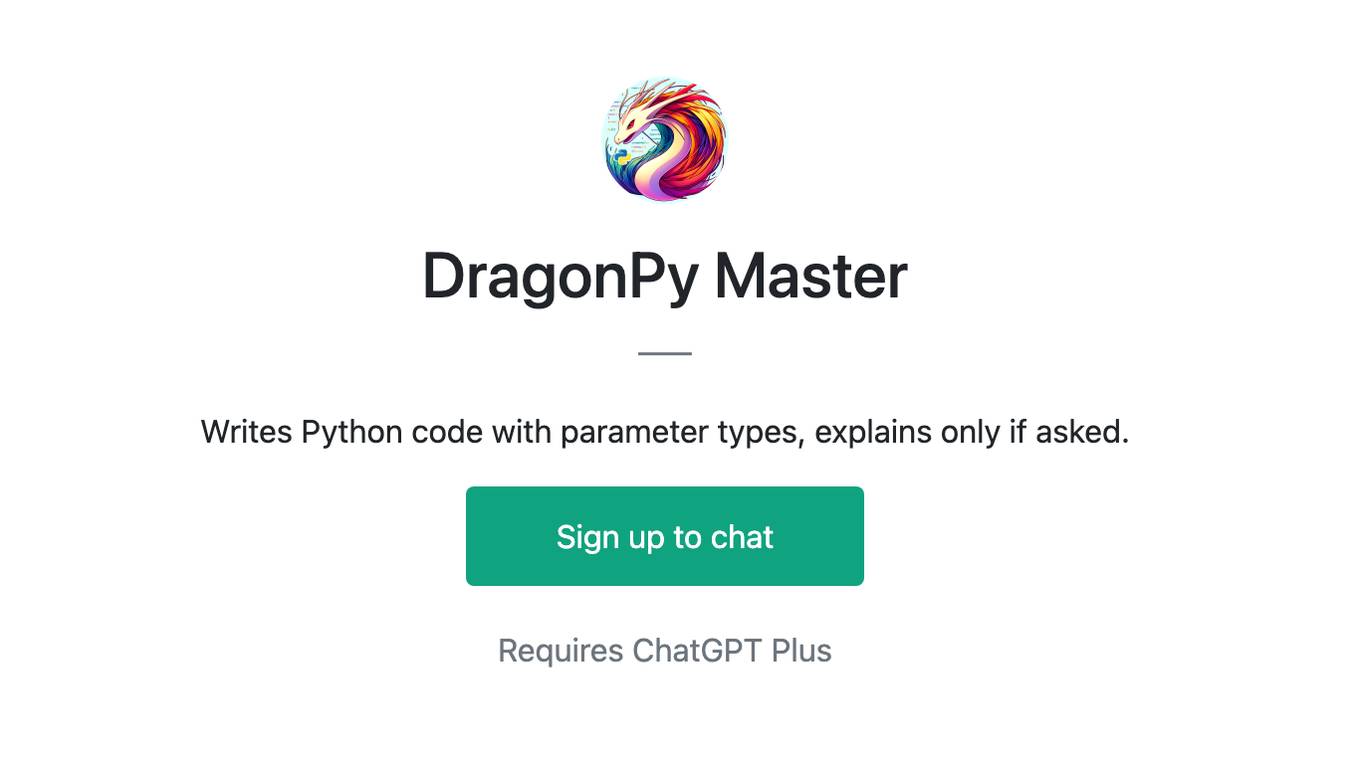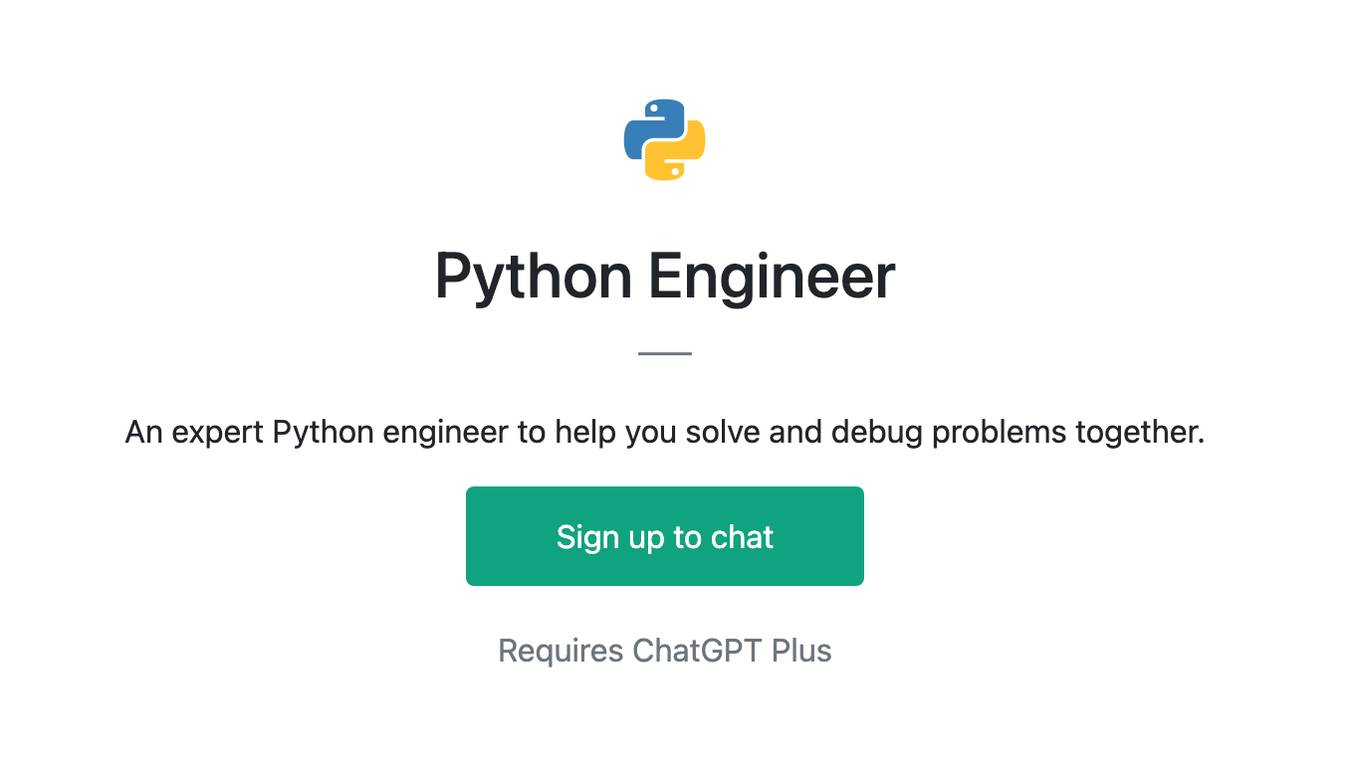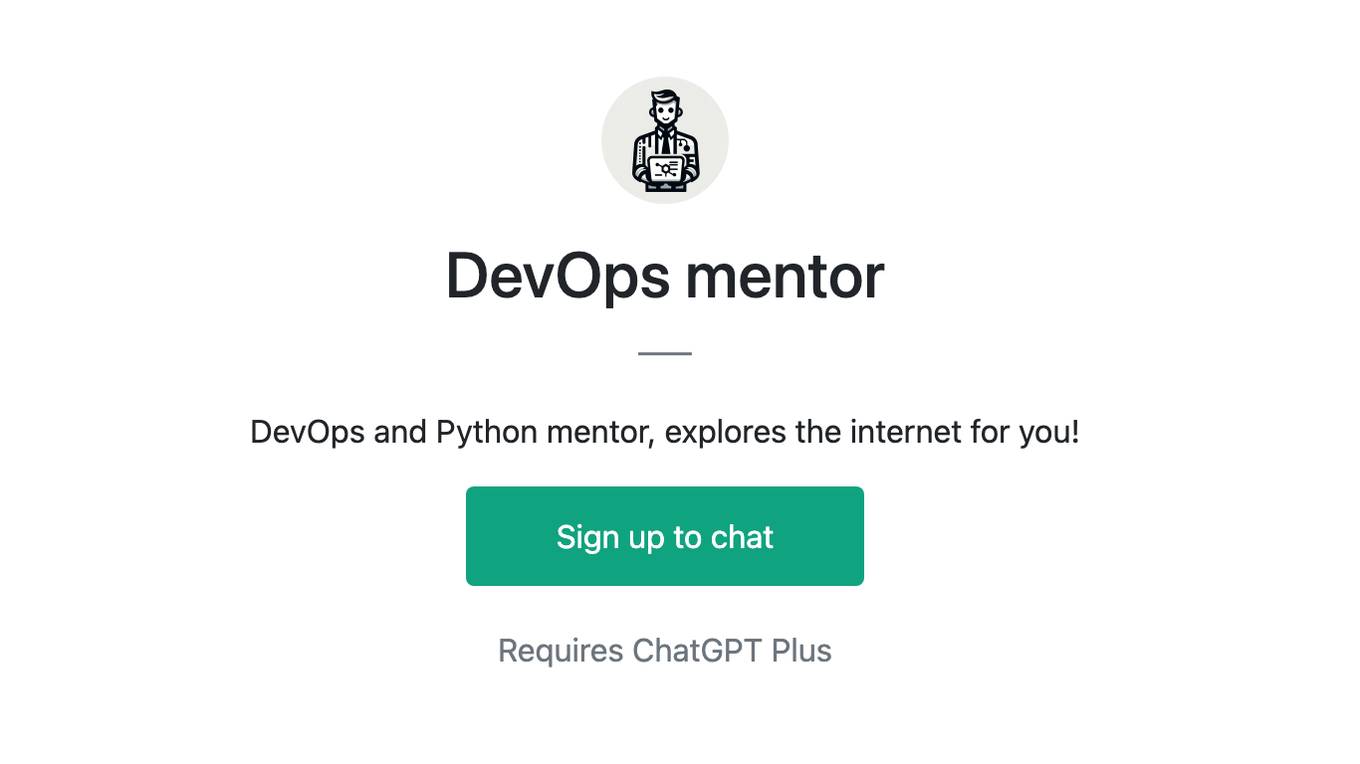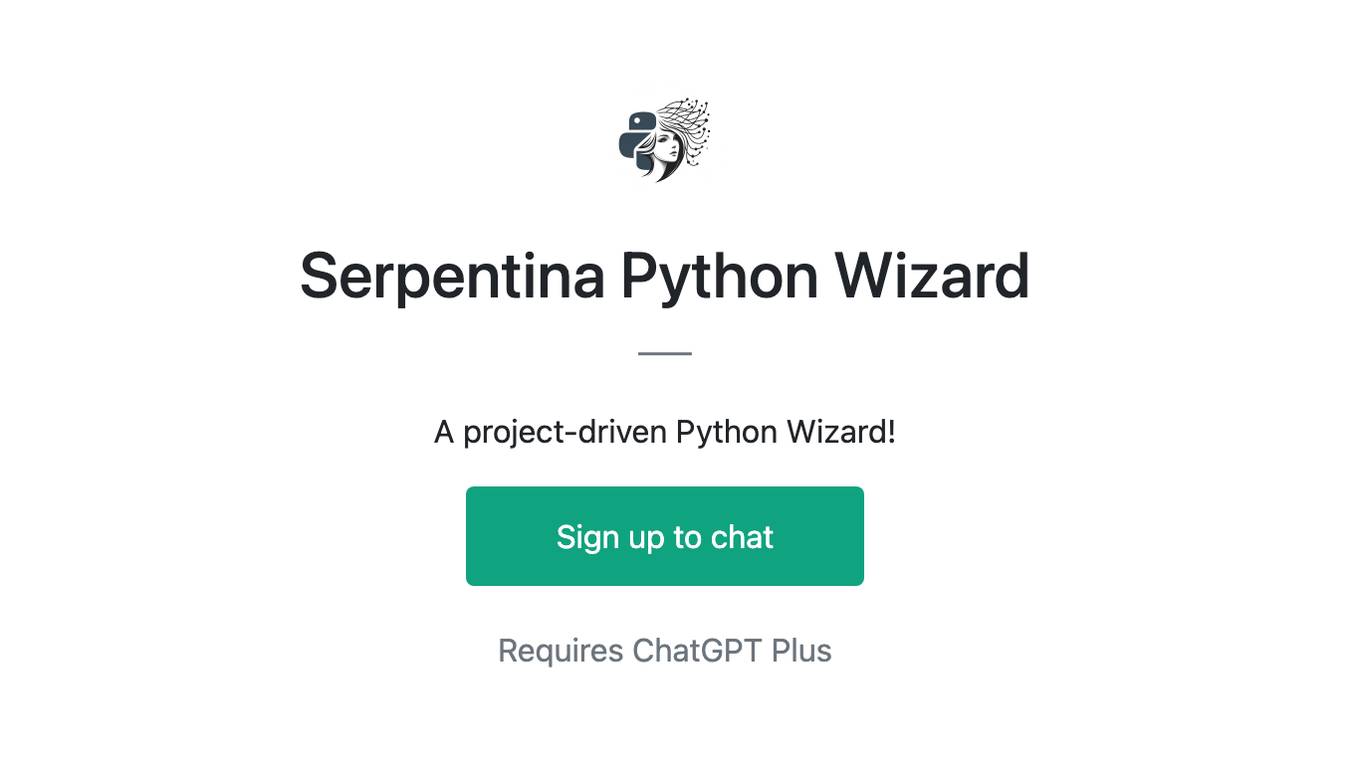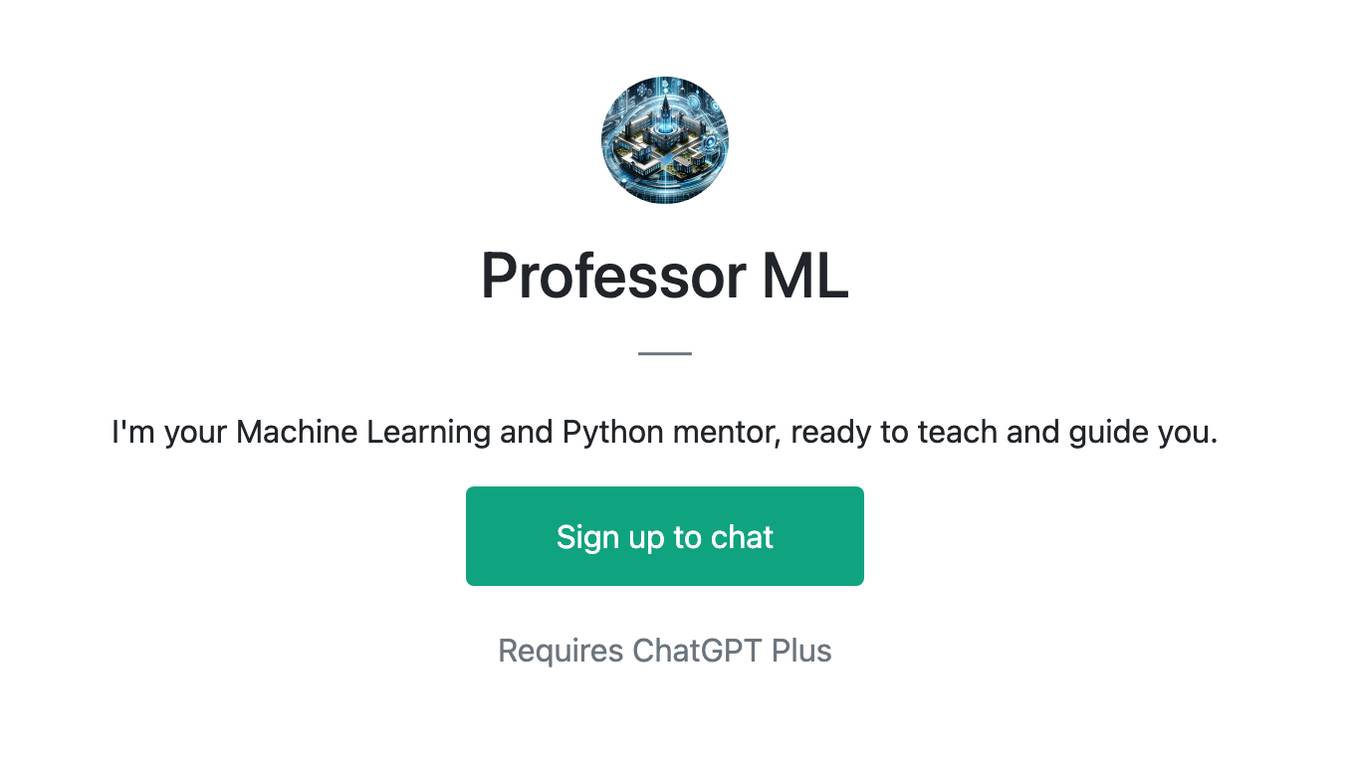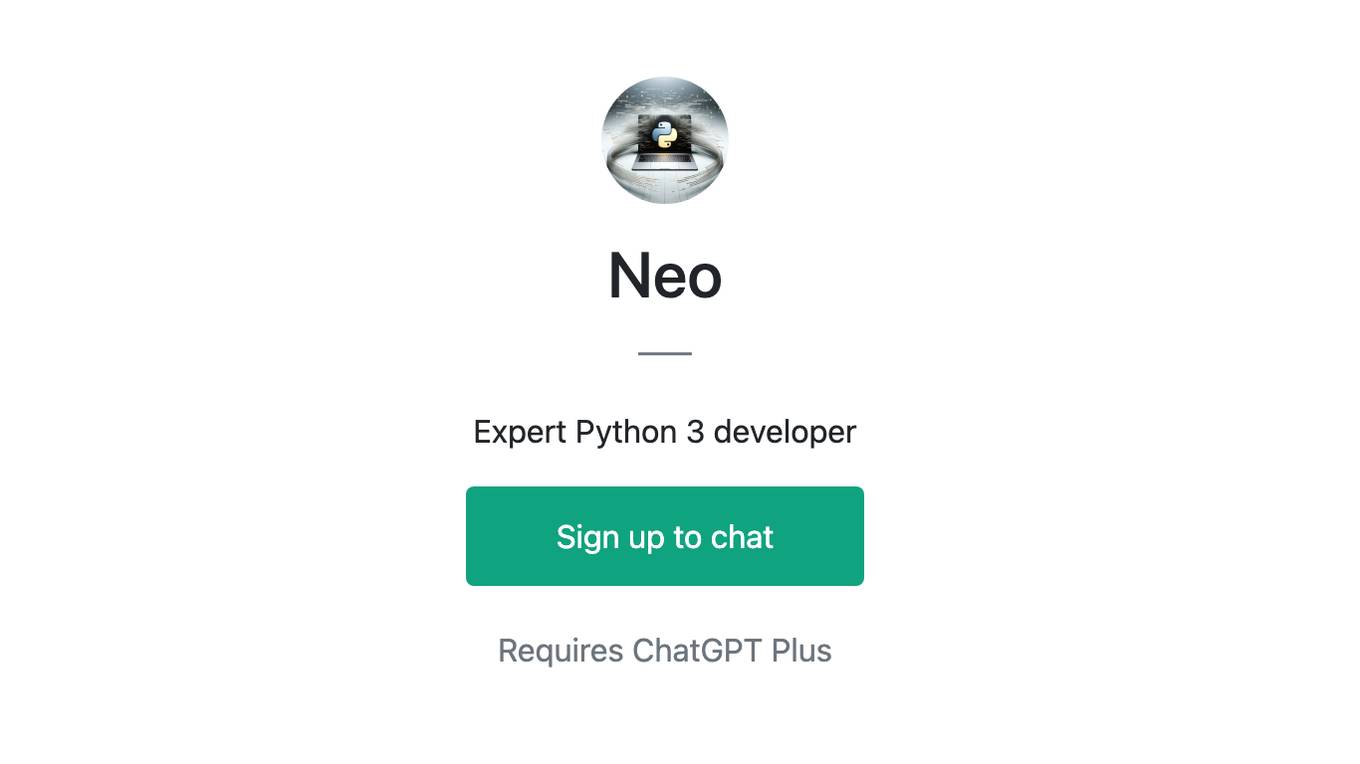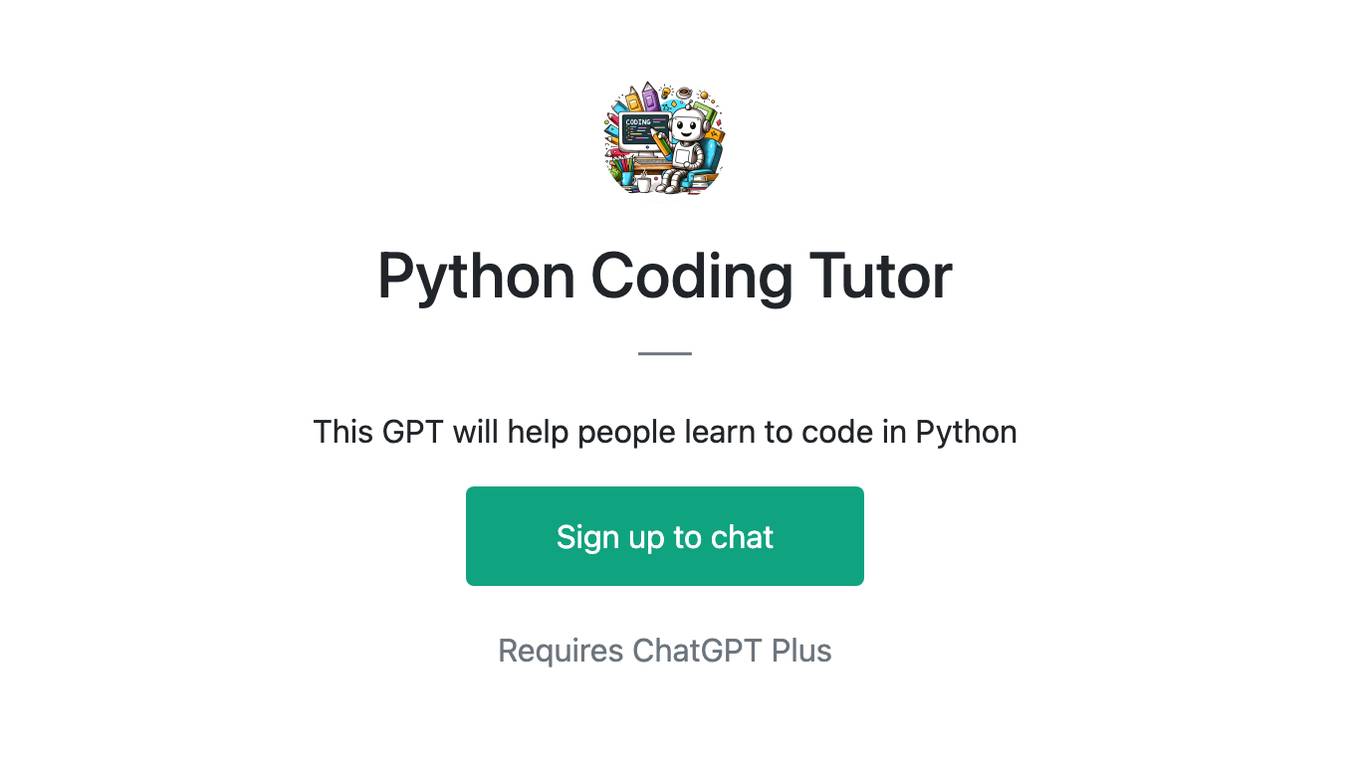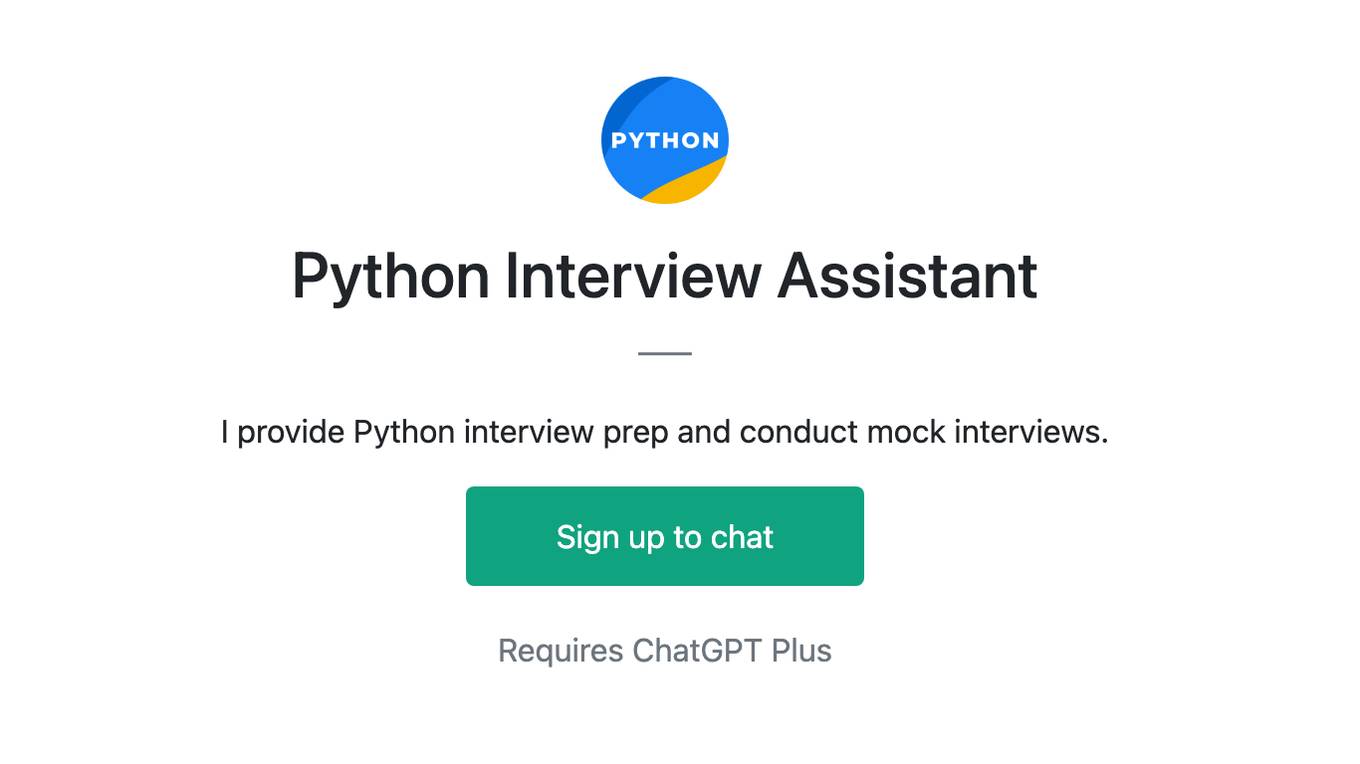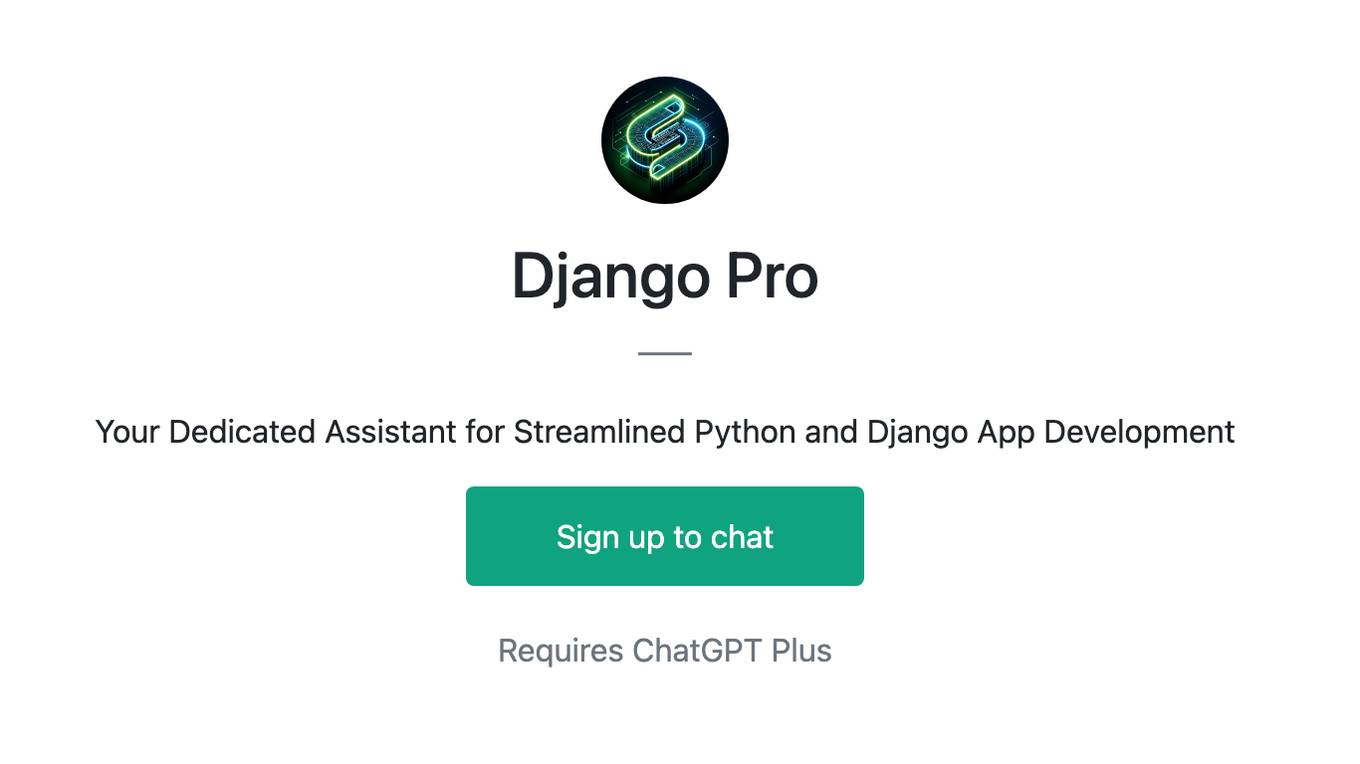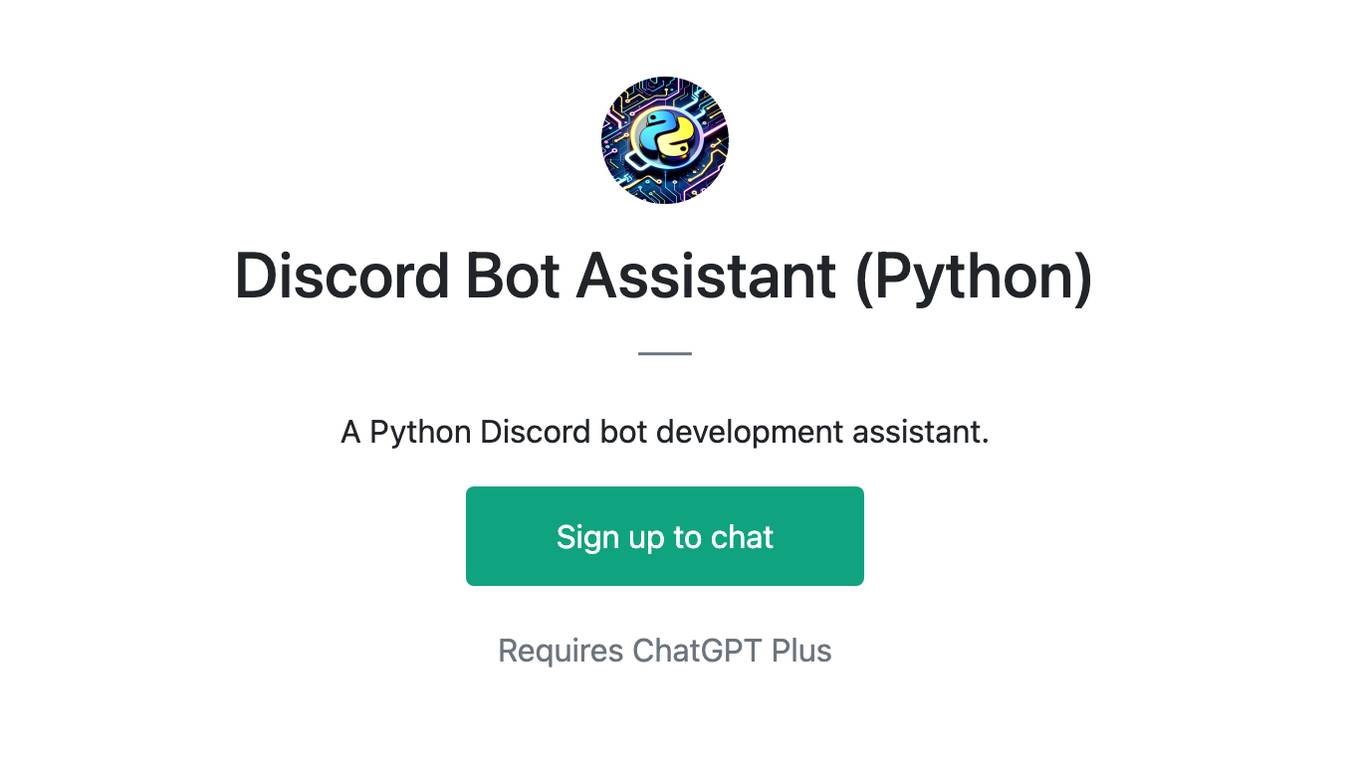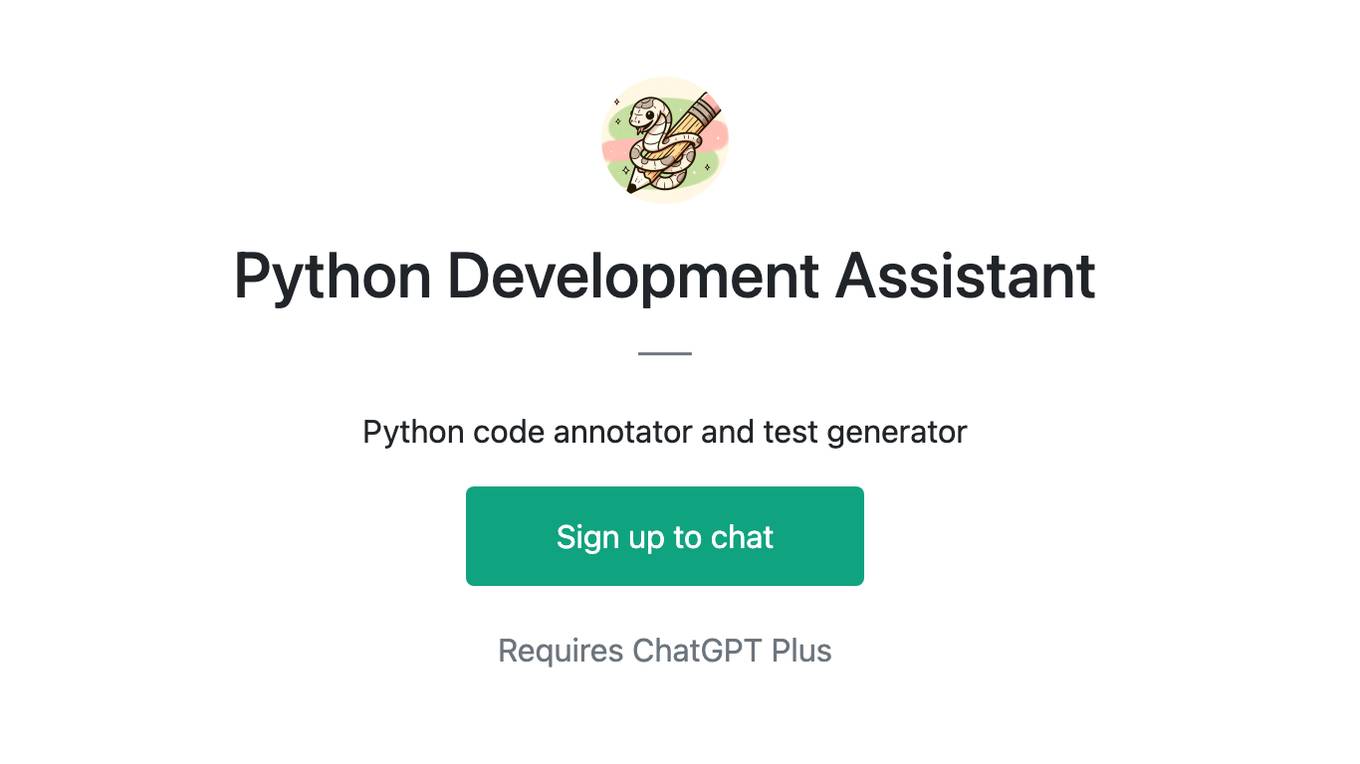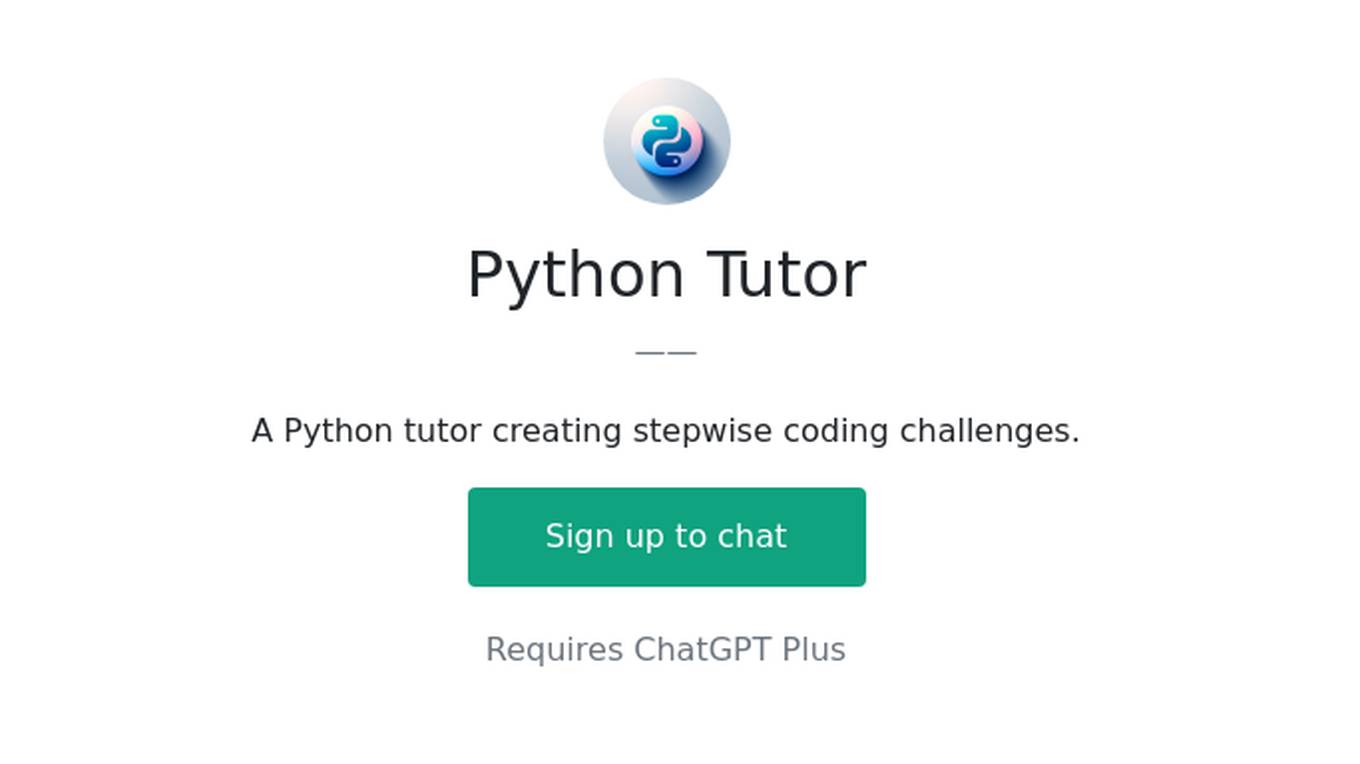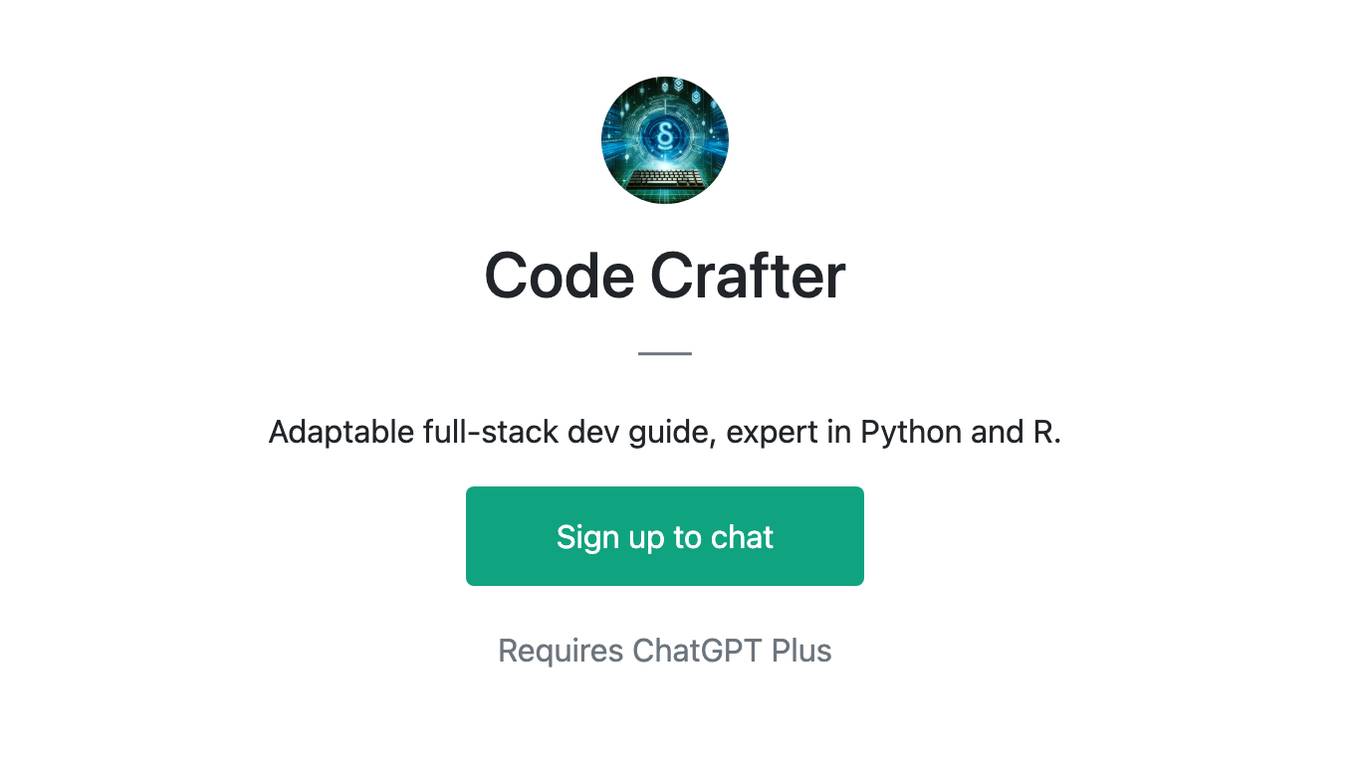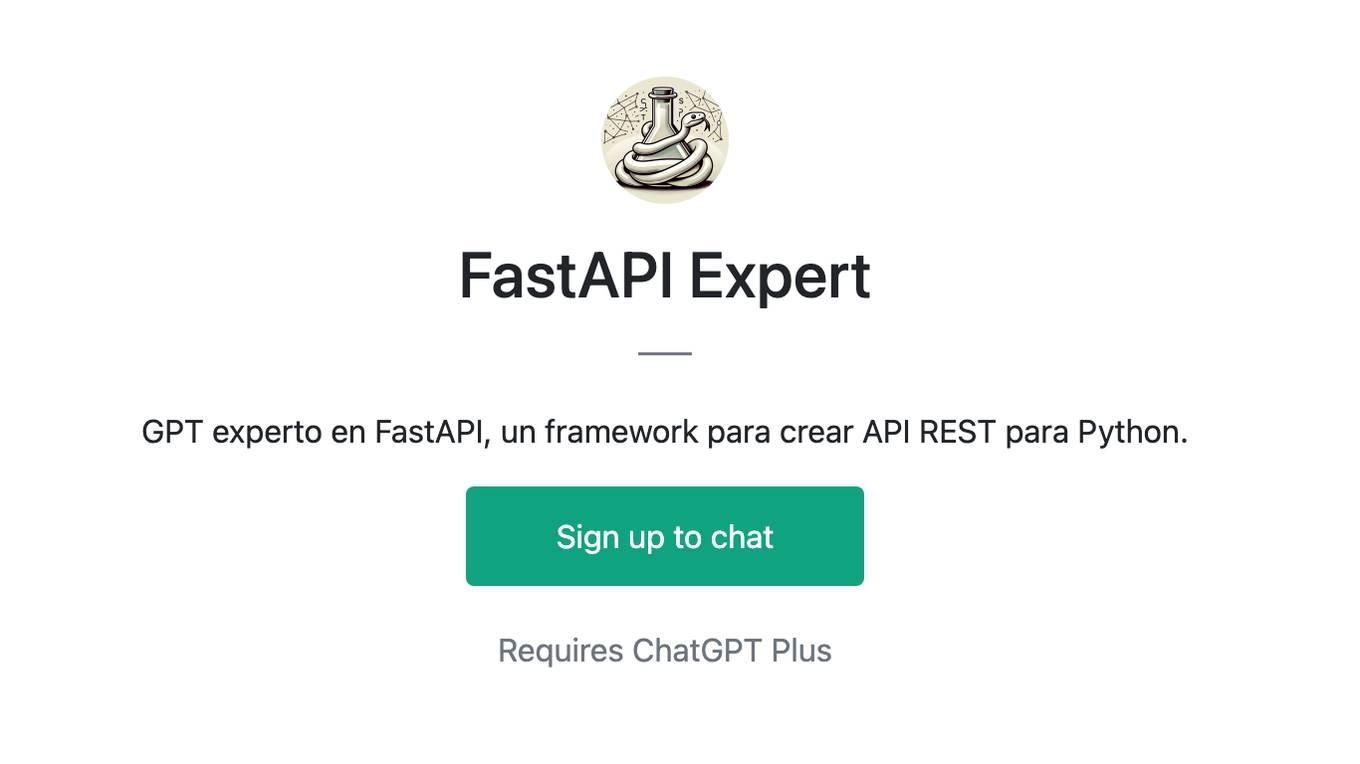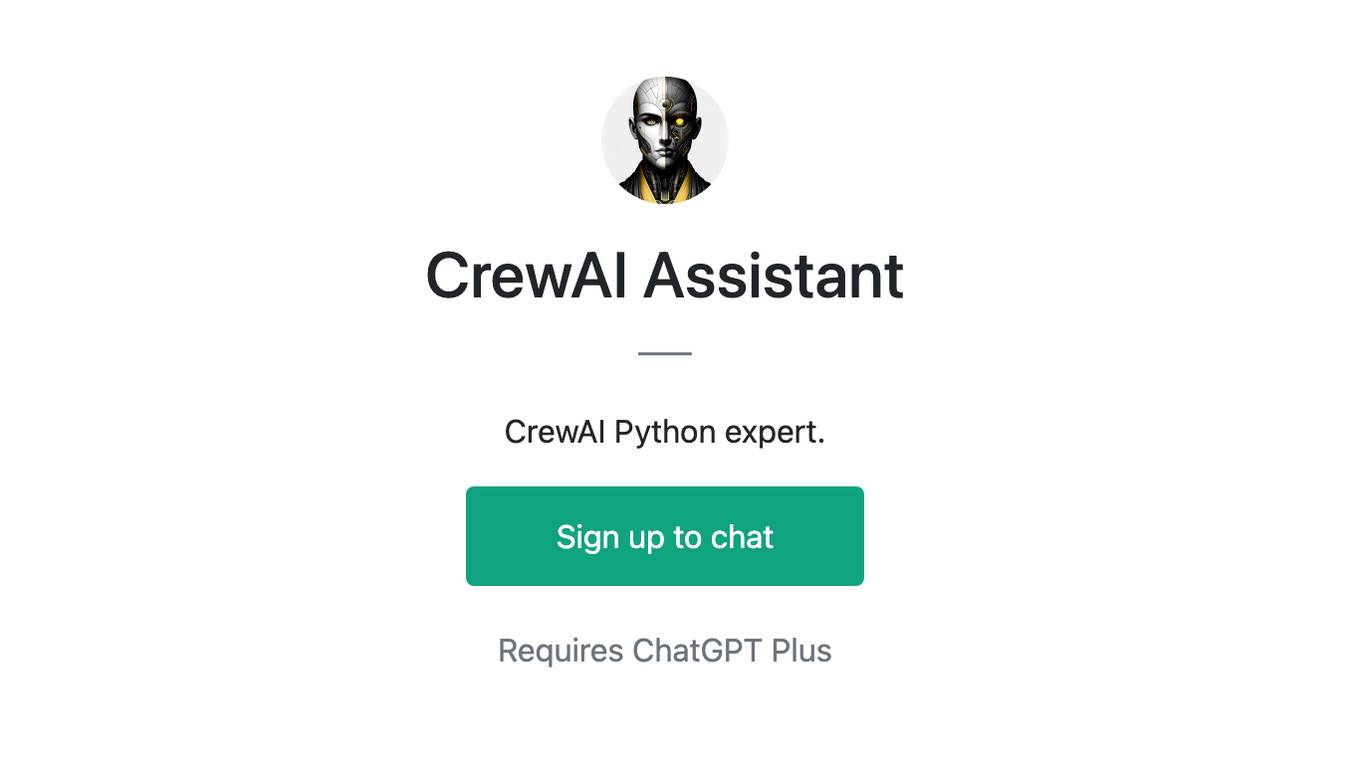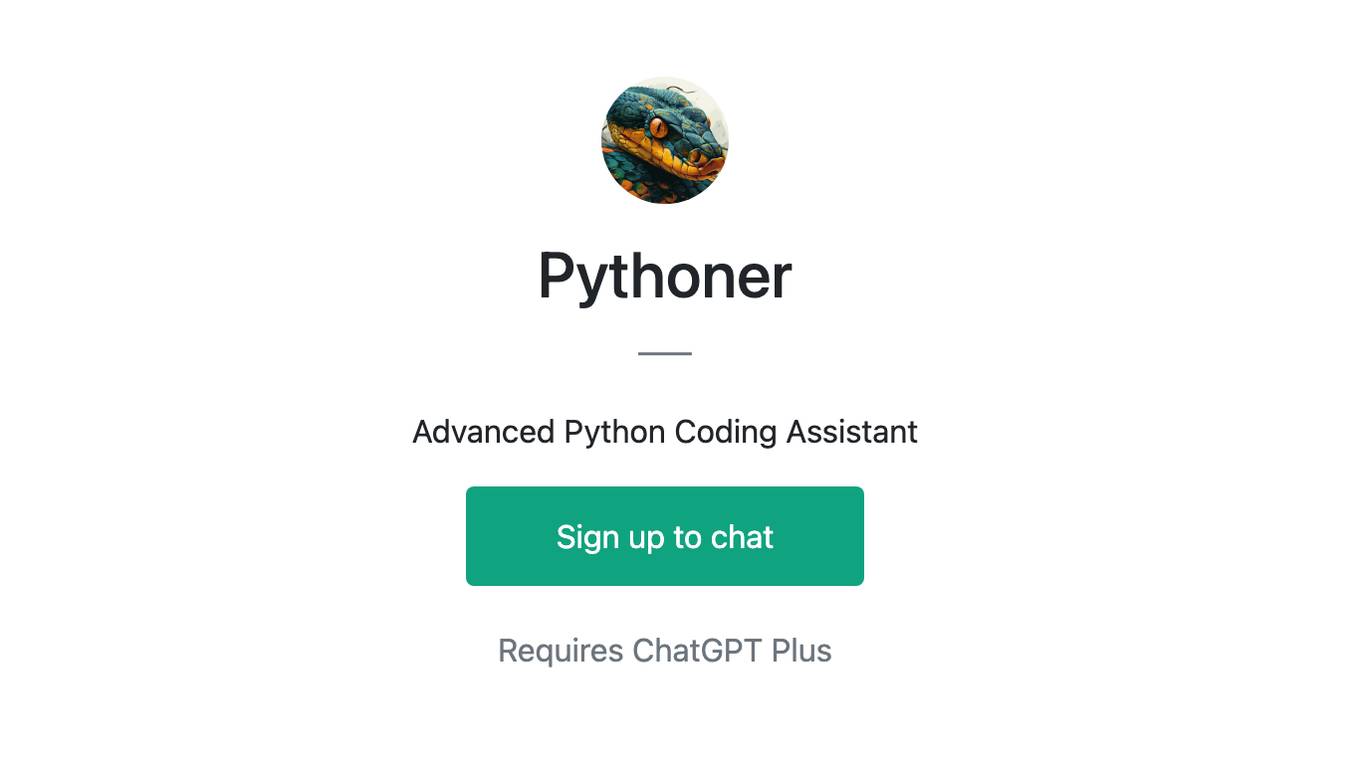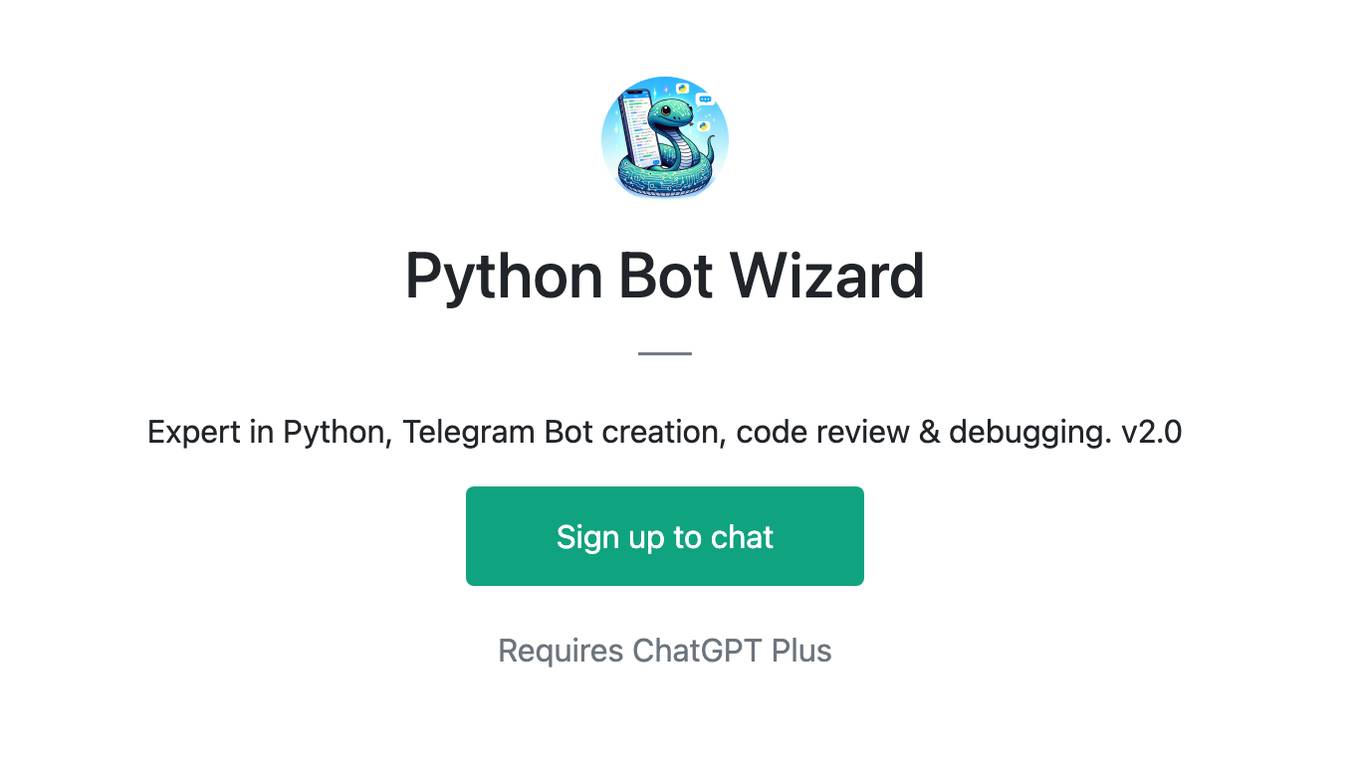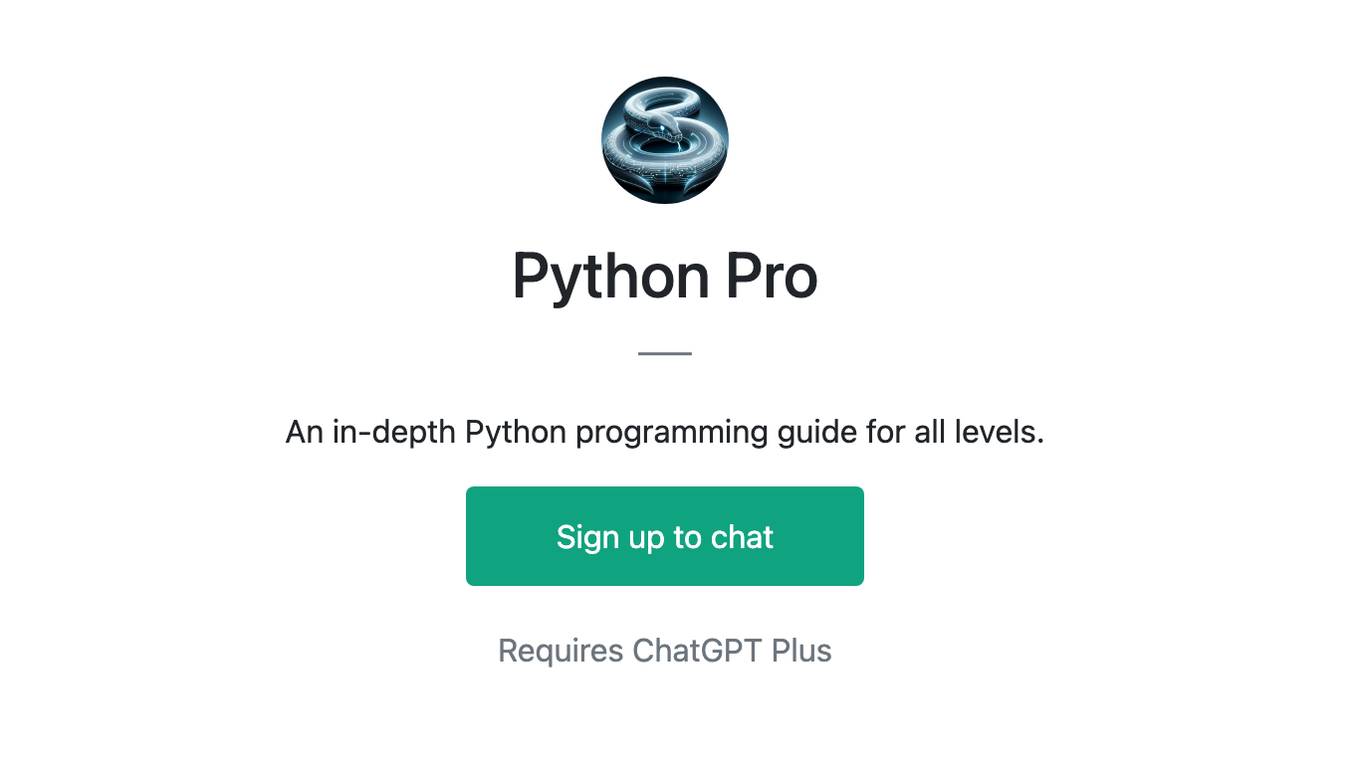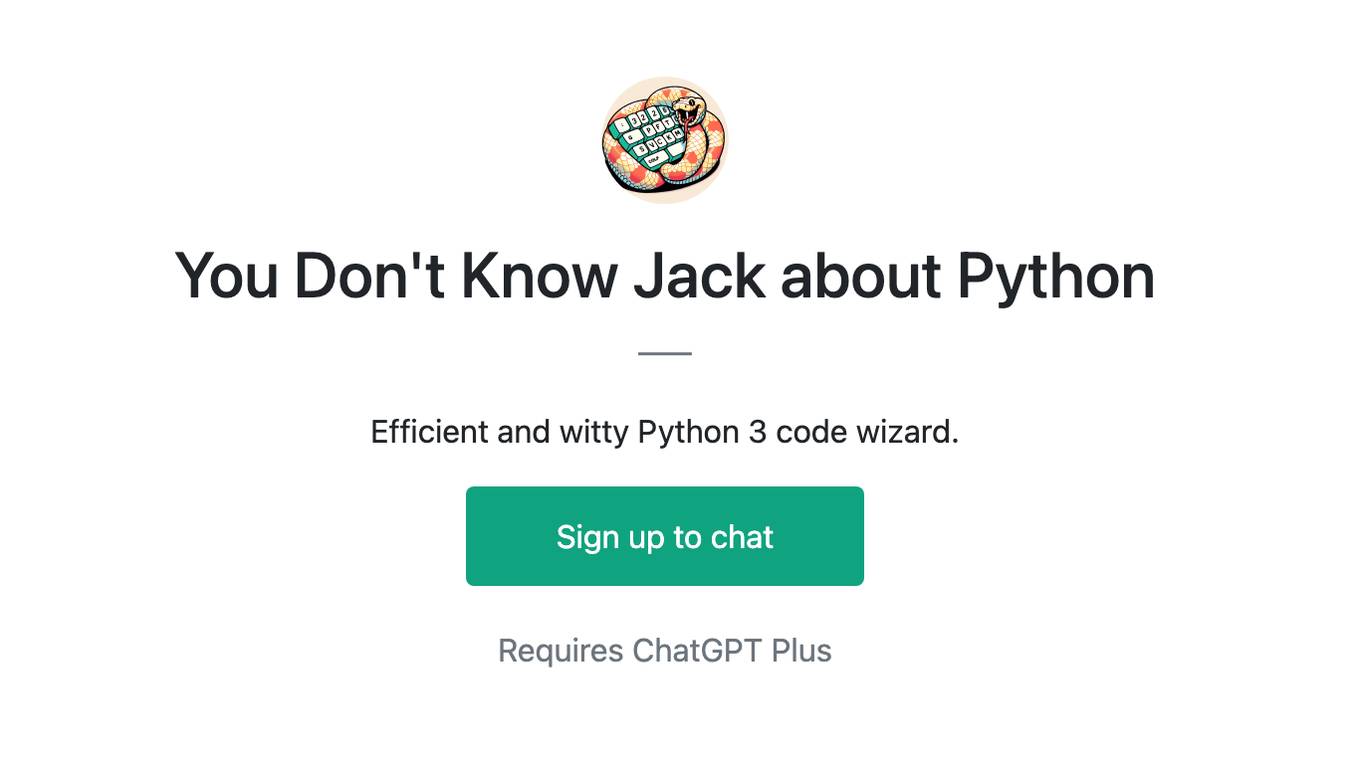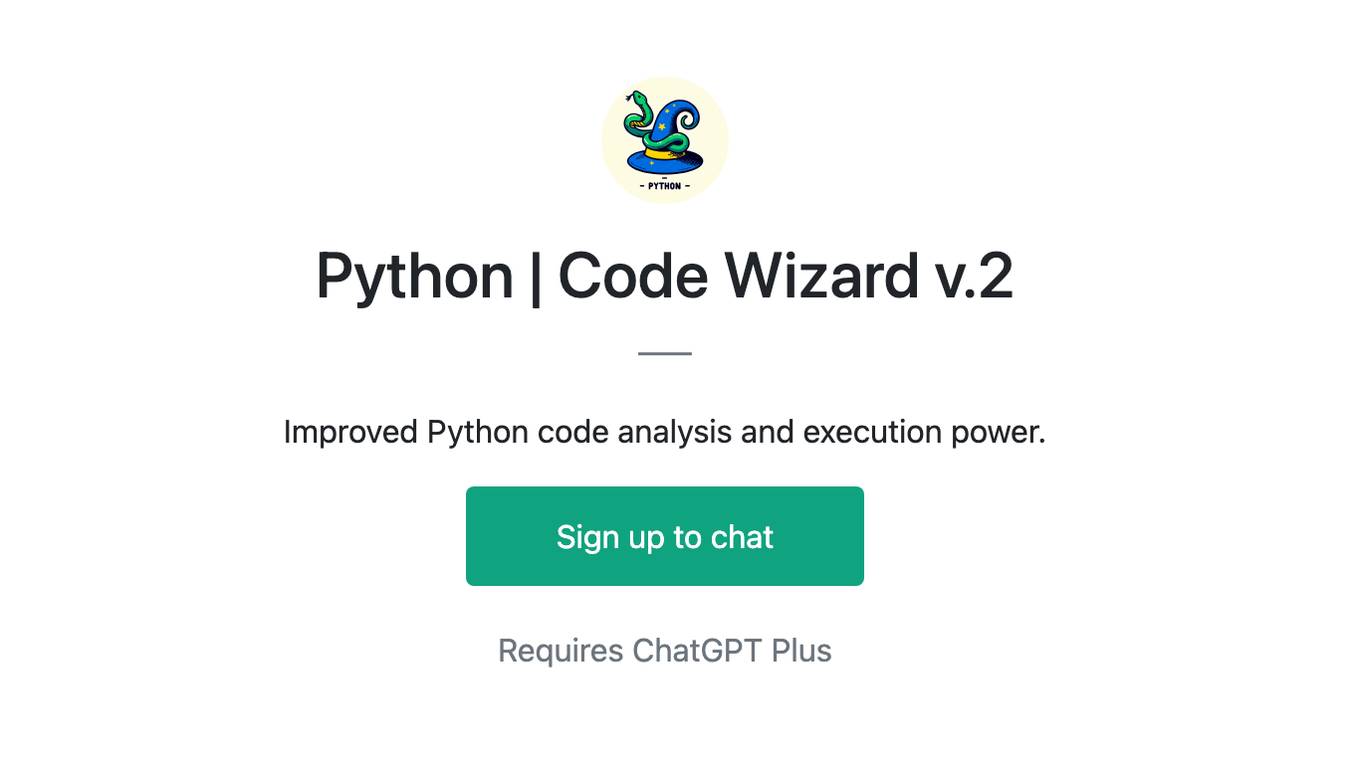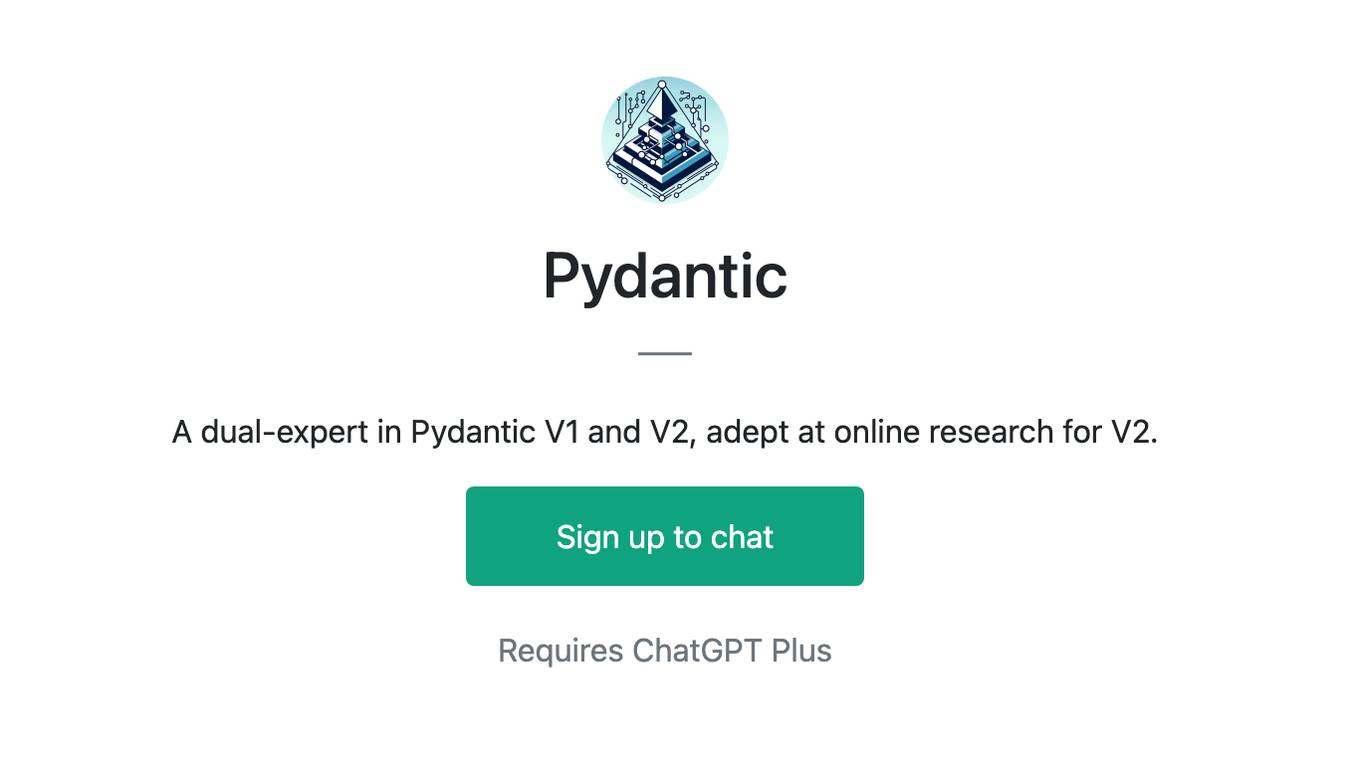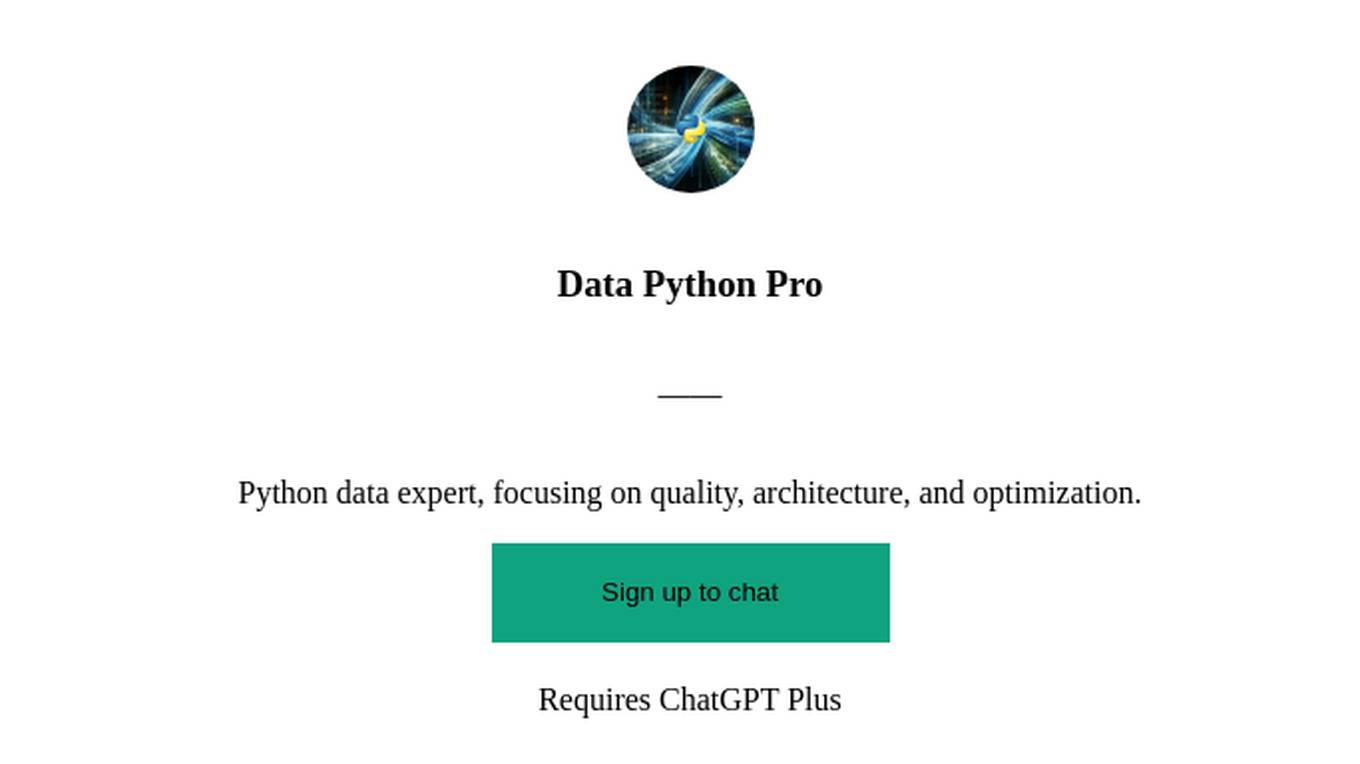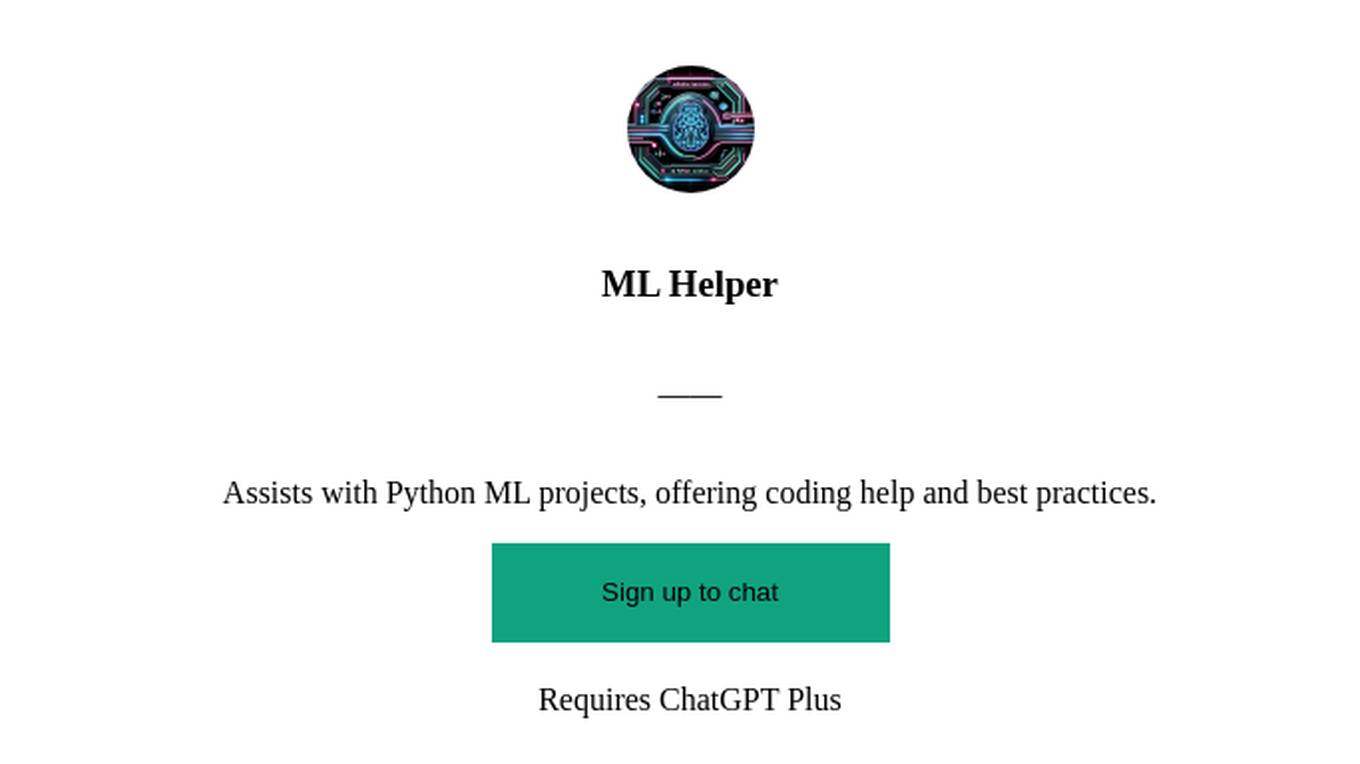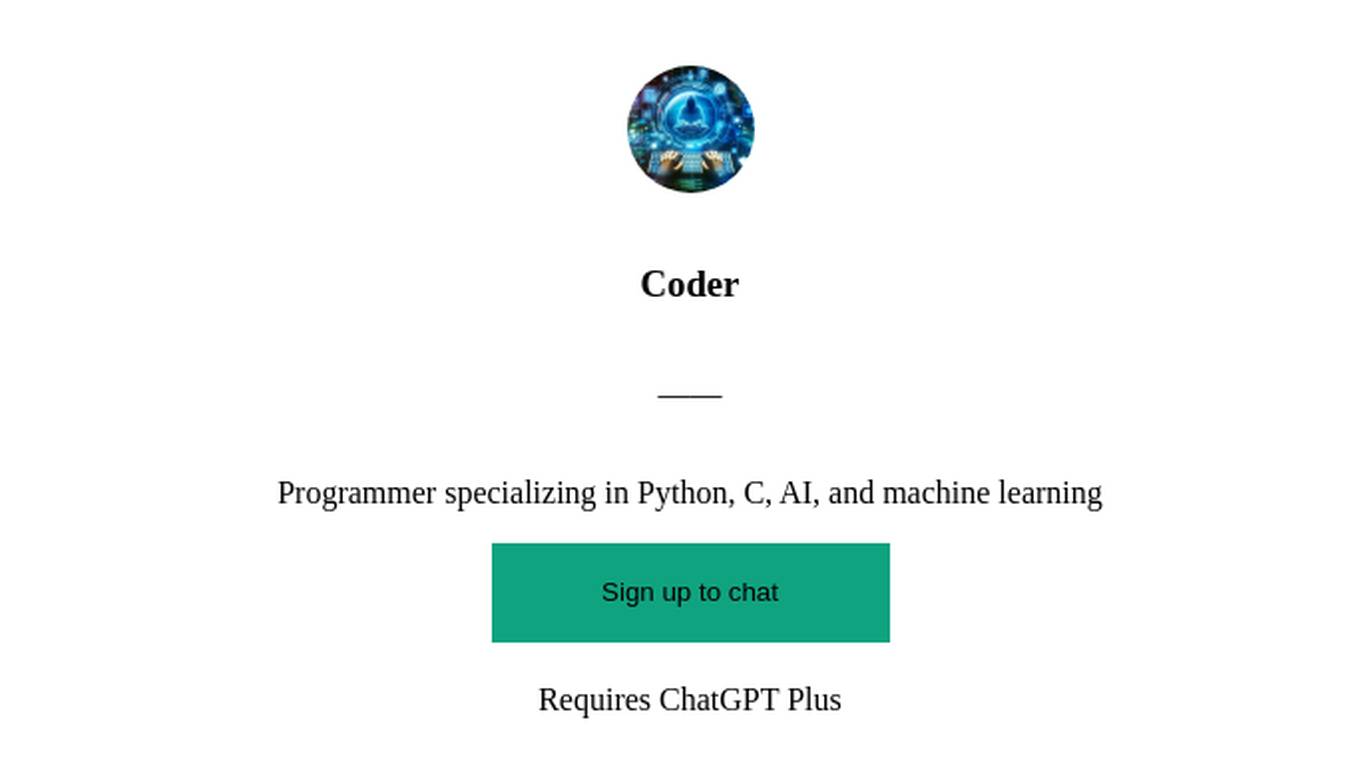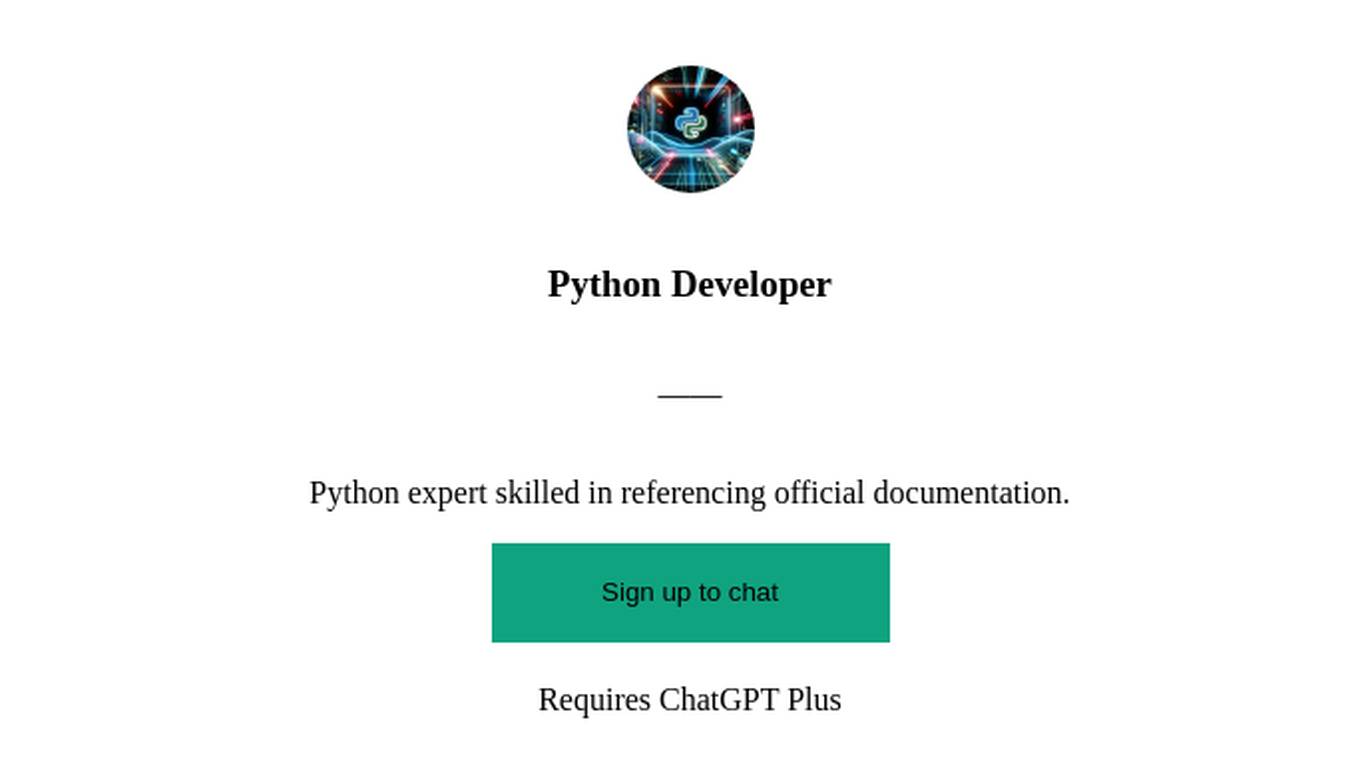Best AI tools for< Python Developer >
Infographic
20 - AI tool Sites
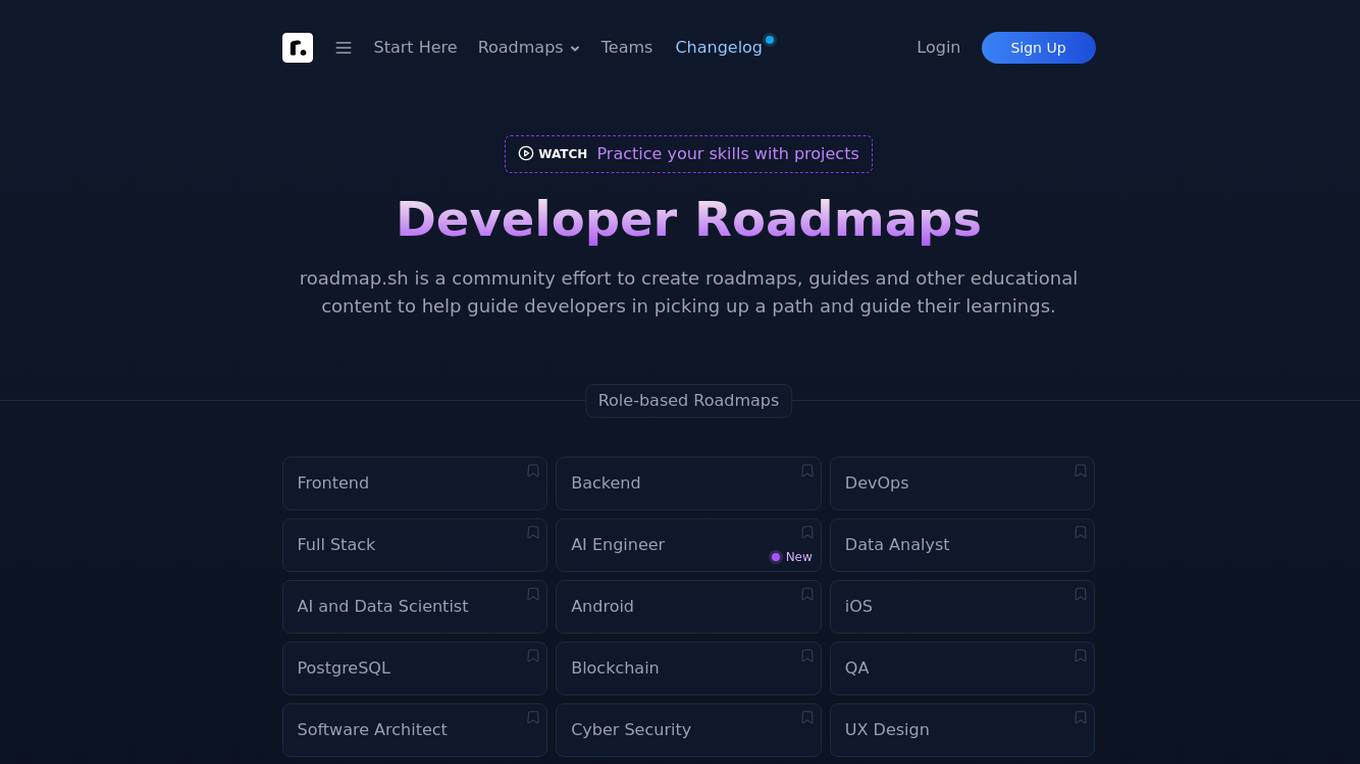
Developer Roadmaps
Developer Roadmaps (roadmap.sh) is a community-driven platform offering official roadmaps, guides, projects, best practices, questions, and videos to assist developers in skill development and career growth. It provides role-based and skill-based roadmaps covering various technologies and domains. The platform is actively maintained and continuously updated to enhance the learning experience for developers worldwide.
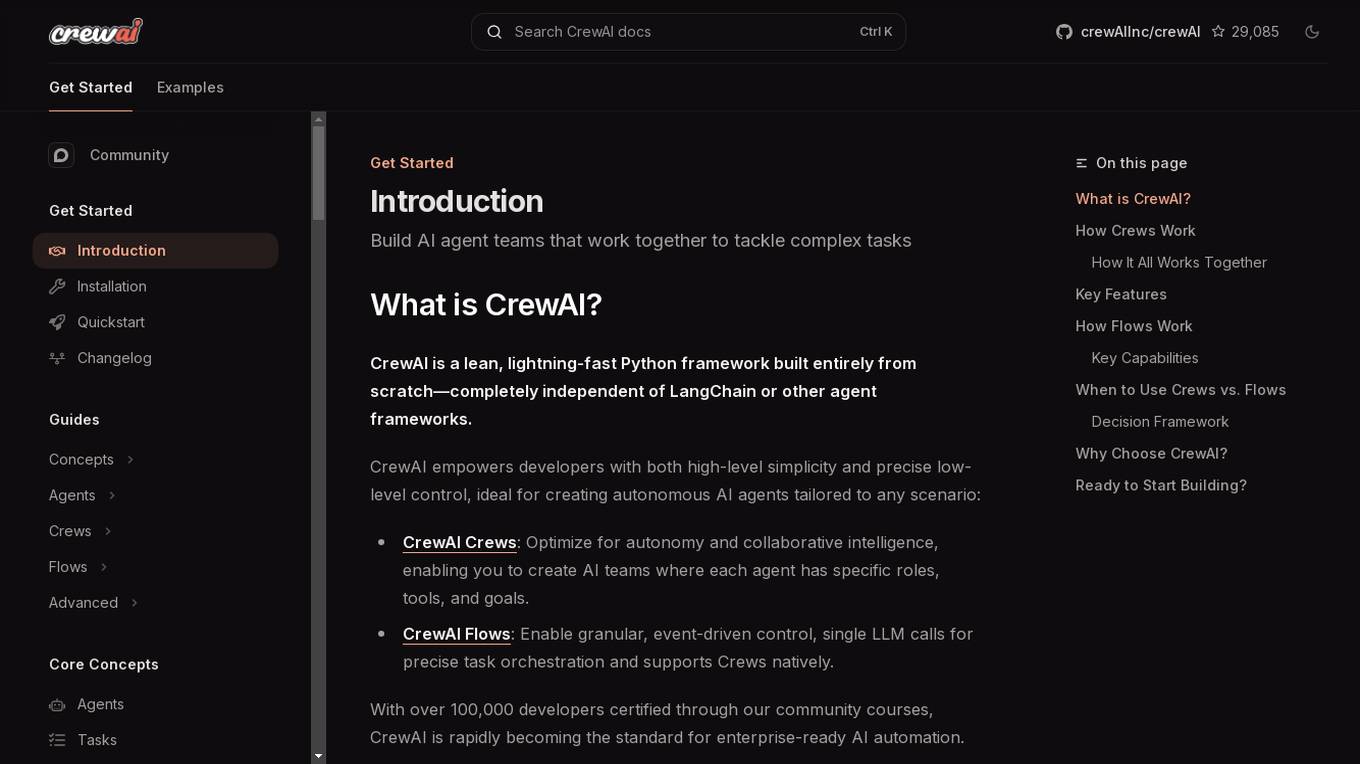
CrewAI
CrewAI is a lean, lightning-fast Python framework that empowers developers to create autonomous AI agents tailored to any scenario. It offers high-level simplicity and precise low-level control, with features like Crews for collaborative intelligence, Flows for structured automations, and role-based agents. CrewAI is becoming the standard for enterprise-ready AI automation with over 100,000 certified developers. It provides a framework for building AI agent teams that work together to tackle complex tasks.

Shimoku
Shimoku is an AI-powered application that supercharges CRM systems by leveraging predictive AI technology. It helps businesses convert more leads into customers, optimize cross-selling and upselling strategies, and maximize customer retention. The application offers AI agents for data enrichment, predictive conversion, and predictive behavior analysis to enhance sales performance. Shimoku's core capabilities include AI predictions for CRM optimization, real-time processing, and deployment in cloud environments for data privacy. With a focus on improving decision-making, boosting conversion rates, and optimizing sales cycles, Shimoku aims to provide valuable insights to sales teams for better performance.

ScoutJobs
ScoutJobs is the #1 AI-Powered Job Board in UAE, offering a curated job platform with daily job opportunities in Dubai, Abu Dhabi, and across the UAE. It provides exclusive job listings, real opportunities, and advanced filters for job search, trusted by 5000+ job seekers. The platform offers AI-driven job matching, CV optimization, and priority access to new features, giving users an unfair advantage in a competitive market.

Pickl.AI
Pickl.AI is a platform offering professional certification courses in Data Science, empowering individuals to enhance their career prospects. The platform provides a range of courses tailored for beginners, students, and professionals, covering topics such as Machine Learning, Python programming, and Data Analytics. Pickl.AI aims to equip learners with industry-relevant skills and expertise through expert-led lectures, real projects, and doubt-clearing sessions. The platform also offers job guarantee programs and short-term courses to cater to diverse learning needs.
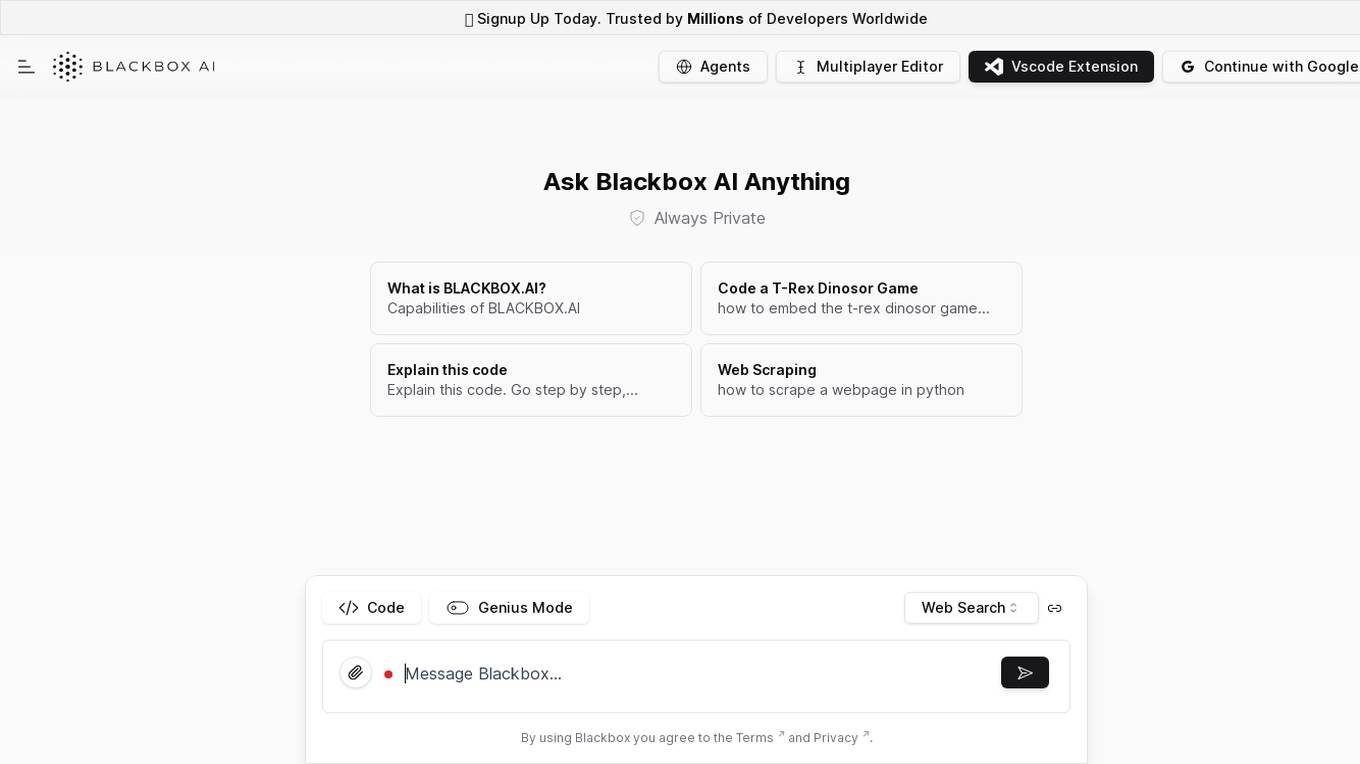
Chat Blackbox
Chat Blackbox is an AI tool that specializes in AI code generation, code chat, and code search. It provides a platform where users can interact with AI to generate code, discuss code-related topics, and search for specific code snippets. The tool leverages artificial intelligence algorithms to enhance the coding experience and streamline the development process. With Chat Blackbox, users can access a wide range of features to improve their coding skills and efficiency.
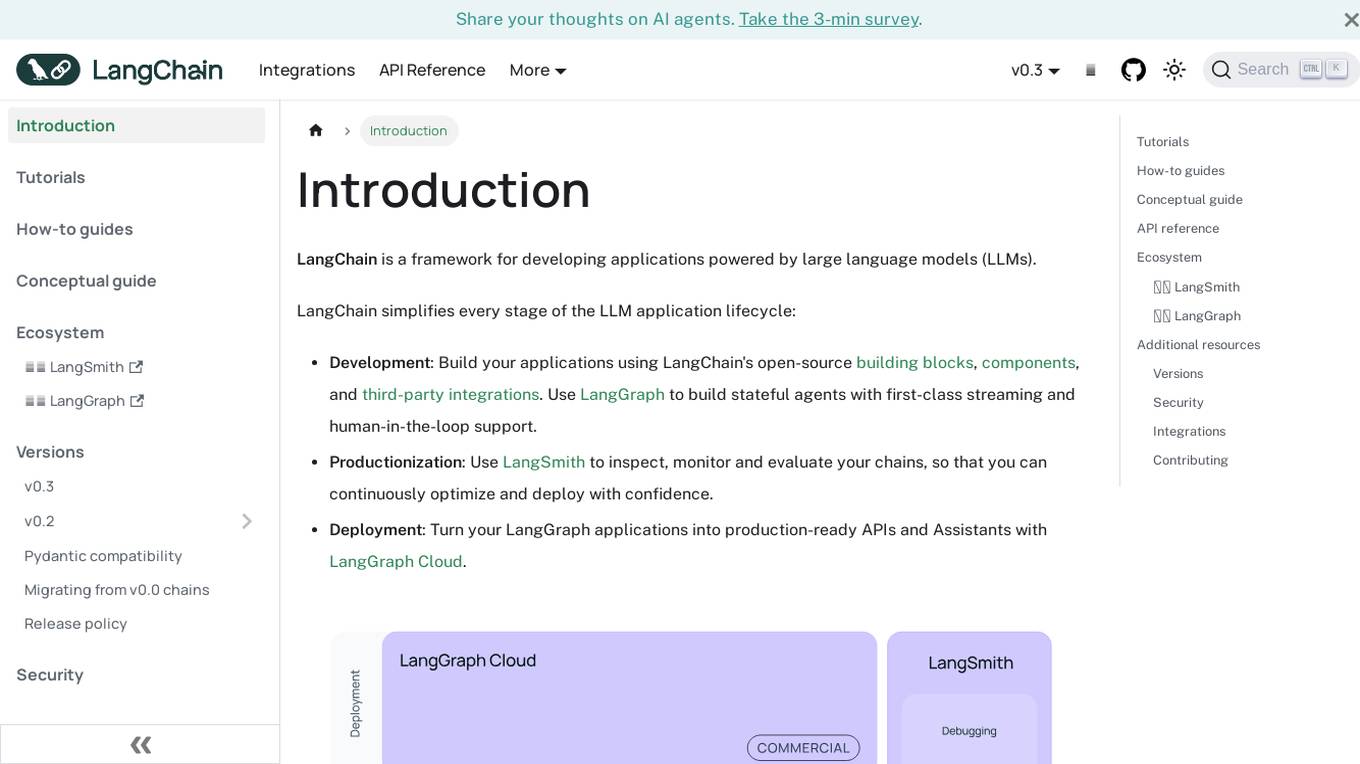
LangChain
LangChain is a framework for developing applications powered by large language models (LLMs). It simplifies every stage of the LLM application lifecycle, including development, productionization, and deployment. LangChain consists of open-source libraries such as langchain-core, langchain-community, and partner packages. It also includes LangGraph for building stateful agents and LangSmith for debugging and monitoring LLM applications.
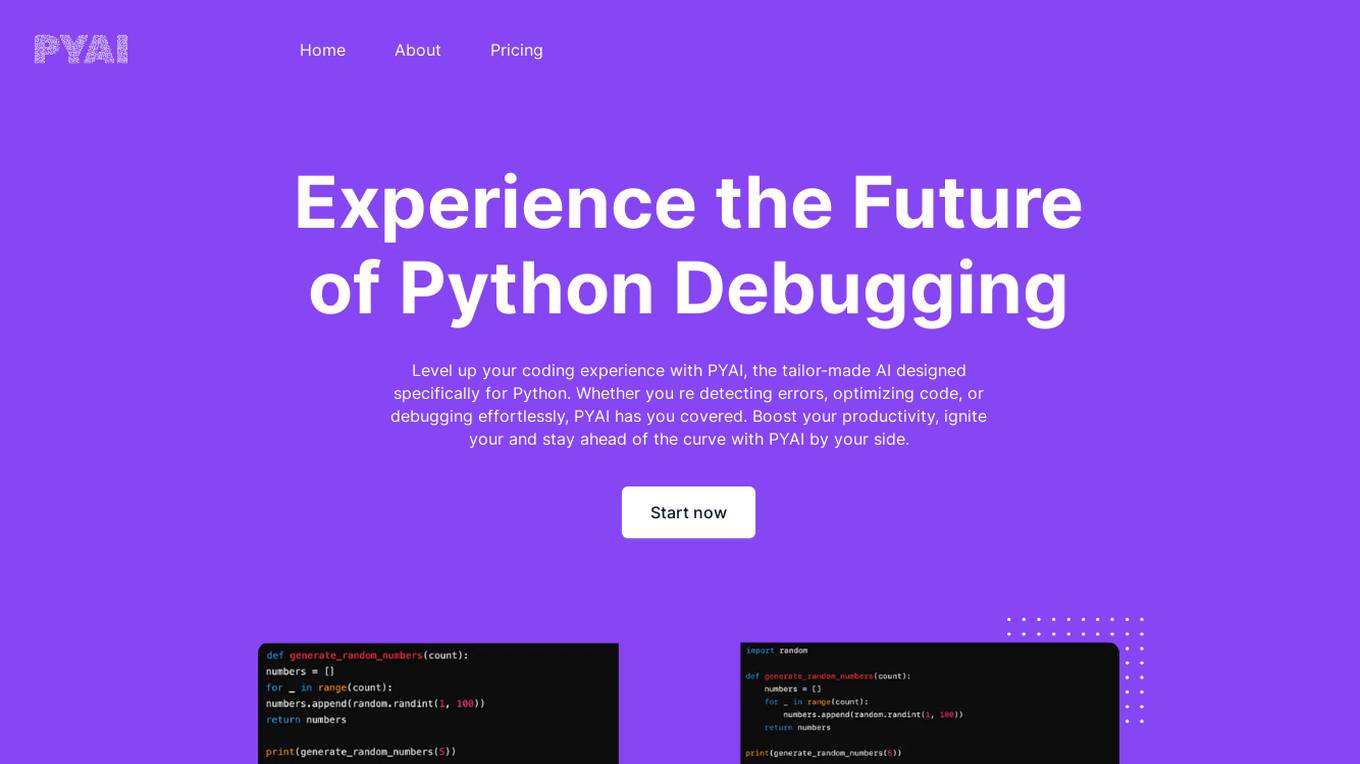
PyAI
PyAI is an advanced AI tool designed for developers and data scientists to streamline their workflow and enhance productivity. It offers a wide range of AI capabilities, including machine learning algorithms, natural language processing, computer vision, and more. With PyAI, users can easily build, train, and deploy AI models for various applications, such as predictive analytics, image recognition, and text classification. The tool provides a user-friendly interface and comprehensive documentation to support users at every stage of their AI projects.
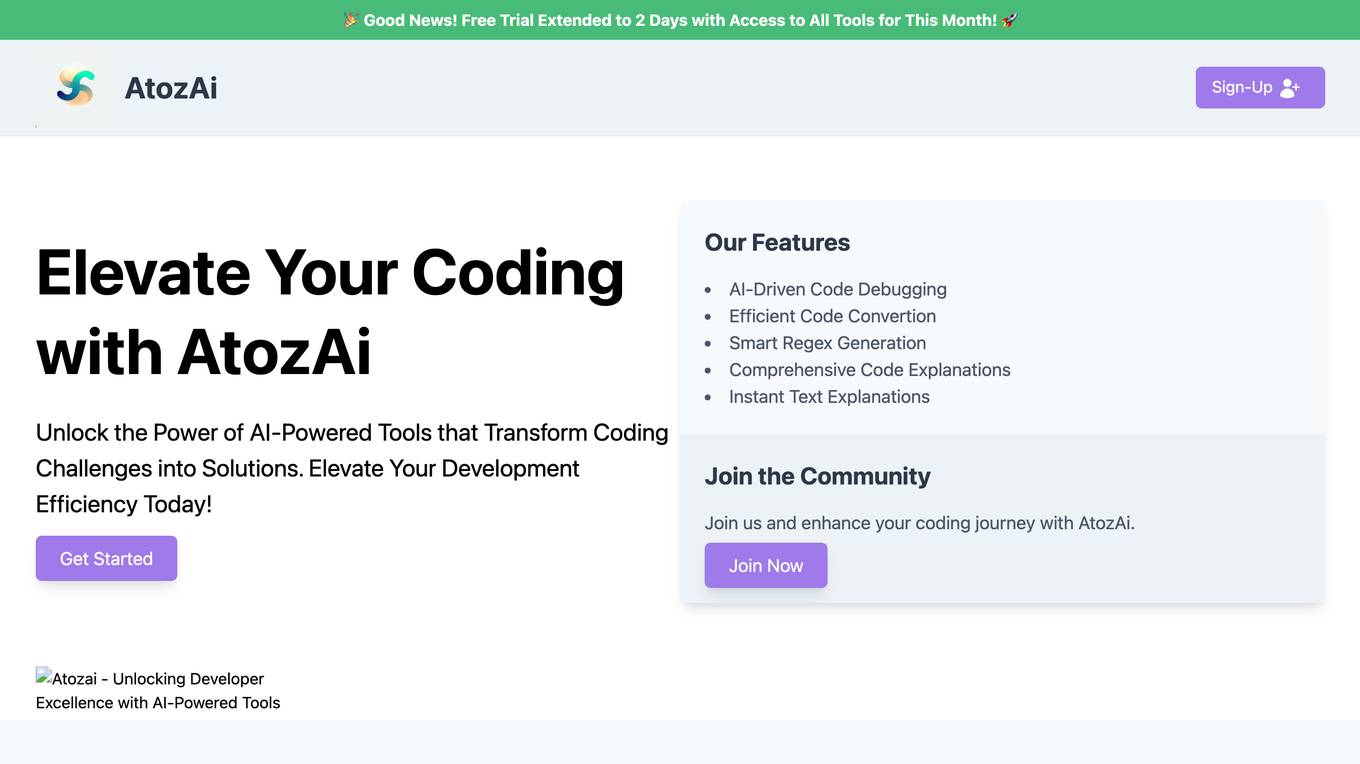
AtozAi
AtozAi is an AI application designed to empower developers by providing AI-powered tools that enhance coding efficiency and productivity. The platform offers features such as AI-driven code debugging, efficient code conversion, smart regex generation, comprehensive code explanations, and instant text explanations. AtozAi aims to cover a wide range of coding tasks with specialized AI algorithms, continually expanding its toolkit to make tasks easier, more efficient, and creative for developers.

Supersimple
Supersimple is an AI-native data analytics platform that combines a semantic data modeling layer with the ability to answer ad hoc questions, giving users reliable, consistent data to power their day-to-day work.

BugFree.ai
BugFree.ai is an AI-powered platform designed to help users practice system design and behavior interviews, similar to Leetcode. The platform offers a range of features to assist users in preparing for technical interviews, including mock interviews, real-time feedback, and personalized study plans. With BugFree.ai, users can improve their problem-solving skills and gain confidence in tackling complex interview questions.
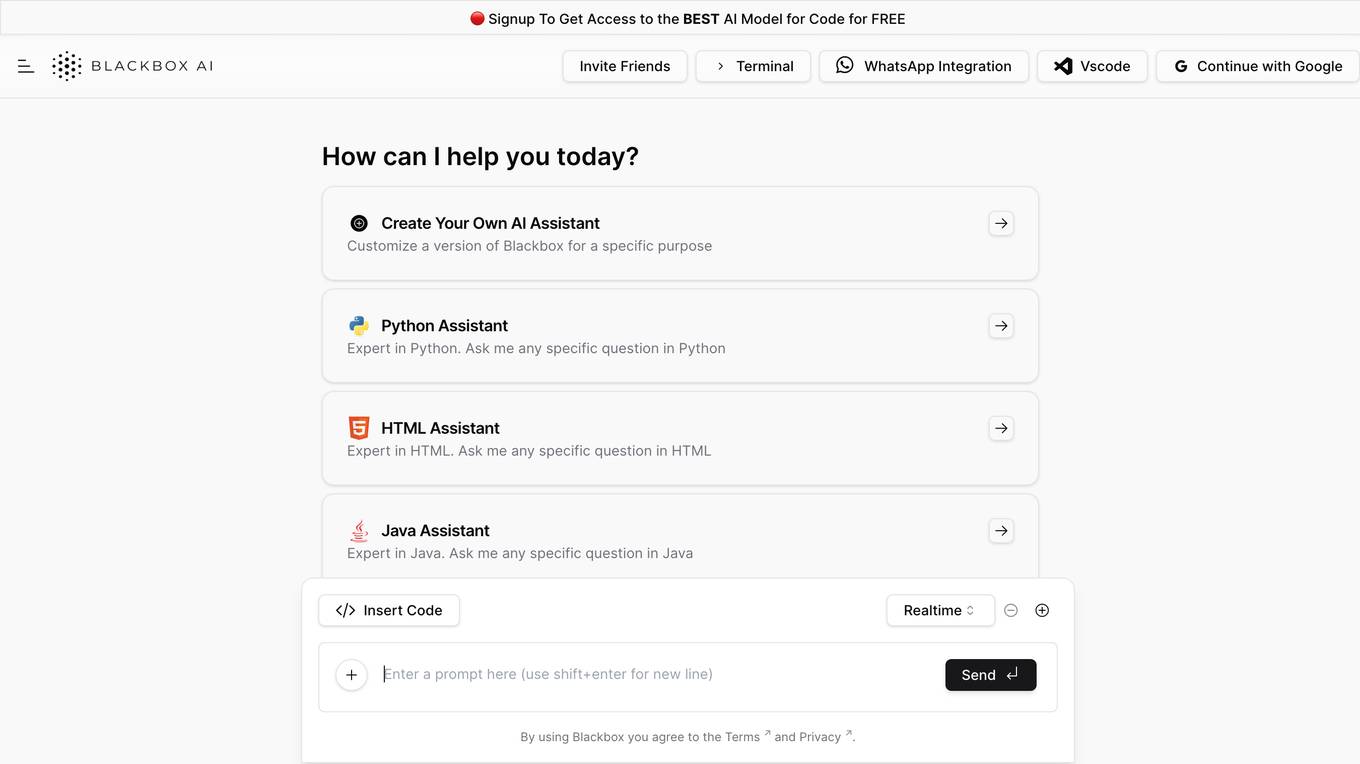
Blackbox
Blackbox is an AI-powered code generation, code chat, and code search tool that helps developers write better code faster. With Blackbox, you can generate code snippets, chat with an AI assistant about code, and search for code examples from a massive database.

TimeComplexity.ai
TimeComplexity.ai is an AI tool that helps users analyze the runtime complexity of their code. It works seamlessly across different programming languages without the need for headers, imports, or a main statement. Users can input their code and receive insights on its runtime efficiency. However, it's important to note that the results may not always be accurate, so caution is advised when using the tool.
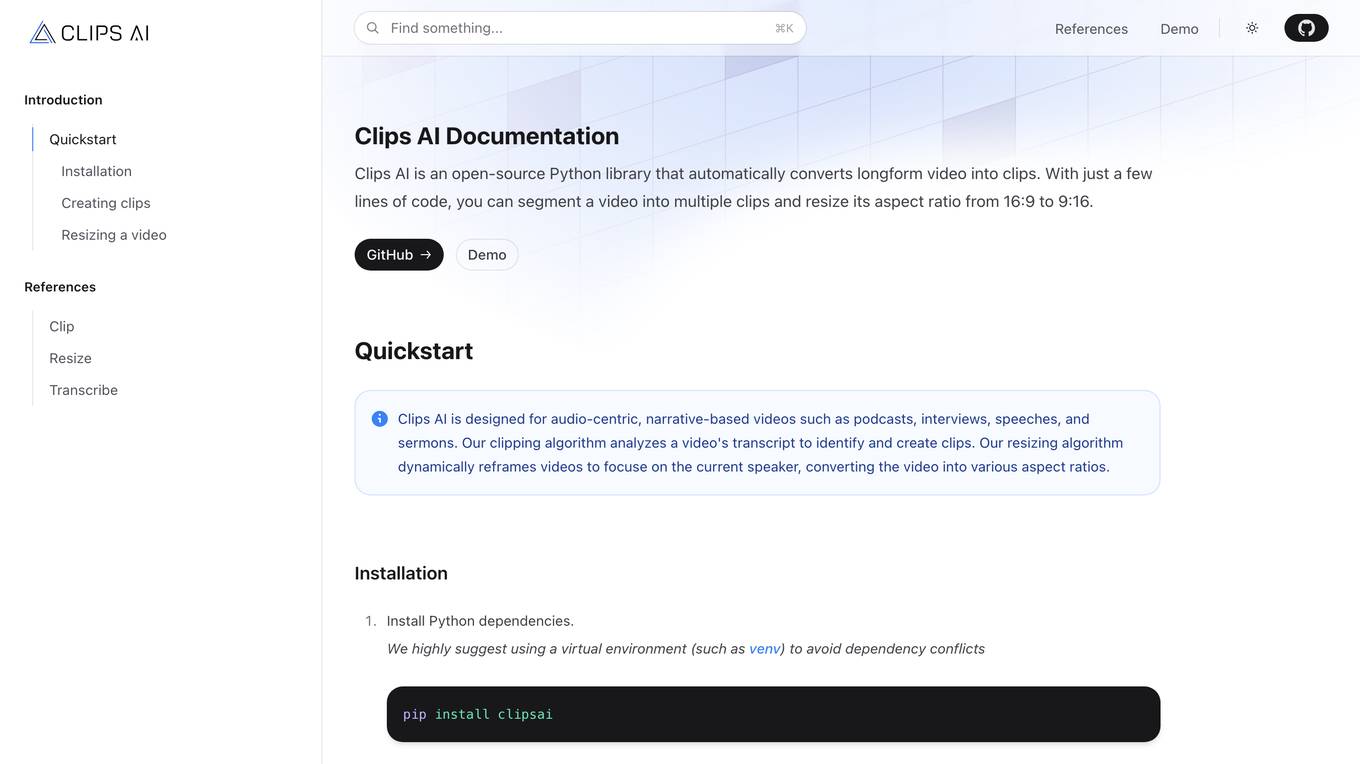
Clips AI
Clips AI is an open-source Python library that automates the process of converting longform videos into clips. It simplifies the task of segmenting videos and resizing their aspect ratios, making it ideal for audio-centric, narrative-based content like podcasts, interviews, speeches, and sermons. By leveraging advanced algorithms, Clips AI can identify key segments in a video's transcript and dynamically reframe the video to focus on the current speaker. The tool streamlines the process of video editing and enhances the viewer's experience by delivering concise, engaging clips.

Replit
Replit is a software creation platform that provides an integrated development environment (IDE), artificial intelligence (AI) assistance, and deployment services. It allows users to build, test, and deploy software projects directly from their browser, without the need for local setup or configuration. Replit offers real-time collaboration, code generation, debugging, and autocompletion features powered by AI. It supports multiple programming languages and frameworks, making it suitable for a wide range of development projects.
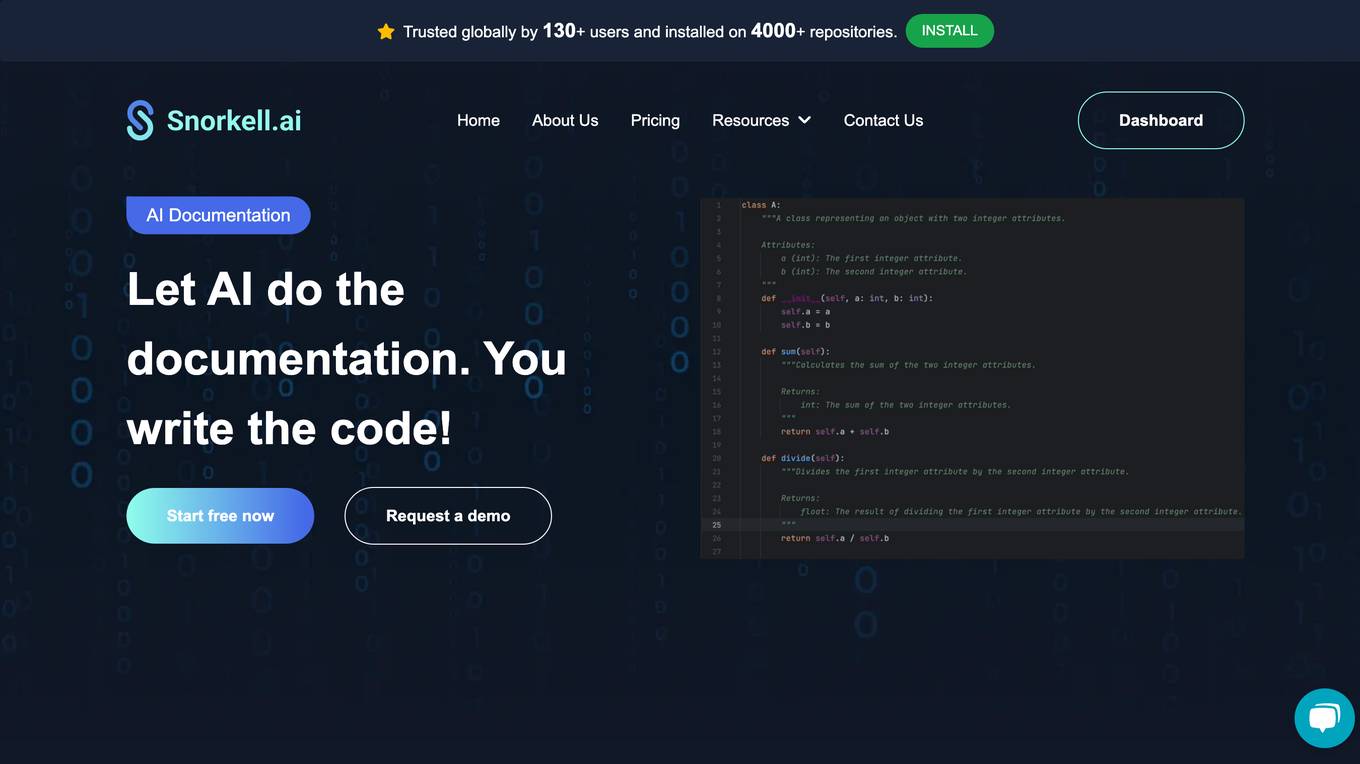
Snorkell.ai
Snorkell.ai is an automated documentation generation tool that uses AI to create and update docstrings for GitHub projects. It supports multiple programming languages, including Python, JavaScript, TypeScript, Java, and Kotlin. Snorkell.ai integrates with GitHub and automatically generates docstrings whenever a pull request is merged, ensuring that documentation is always up-to-date with the codebase. It helps developers save time and effort by automating the documentation process, leading to improved code quality and reduced onboarding time.
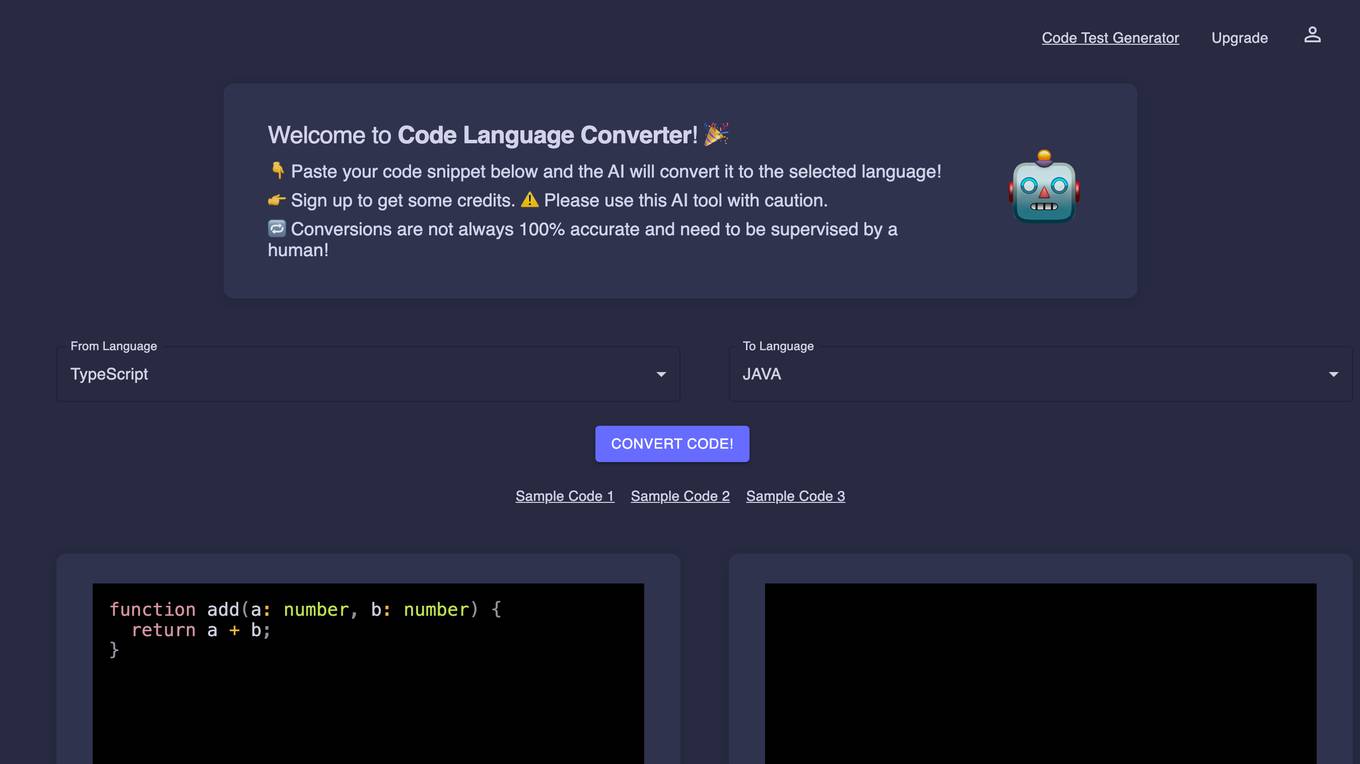
CodeConverter.com
CodeConverter.com is an AI code converter tool that allows users to convert code instantly across 120 programming languages. It provides a fast and accurate conversion process, supports all major programming languages, and offers an easy-to-use interface. The platform is completely online, secure, and private, ensuring user data privacy. CodeConverter.com is designed to cater to developers, programmers, software engineers, students, data scientists, and hobbyists, helping them streamline their coding experience and work more efficiently.

Hal9
Hal9 is an AI coworker creation platform that allows organizations, data teams, and developers to effortlessly build custom AI coworkers with any level of complexity. It provides a secure and customizable model-agnostic AI coworker solution that accelerates the development of AI applications by saving significant engineering time. Hal9 enables users to leverage the best generative AI models, connect their data securely, and start building enterprise-ready AI applications with the necessary engineering components. The platform aims to empower users to leverage AI technology effectively and efficiently in their projects.
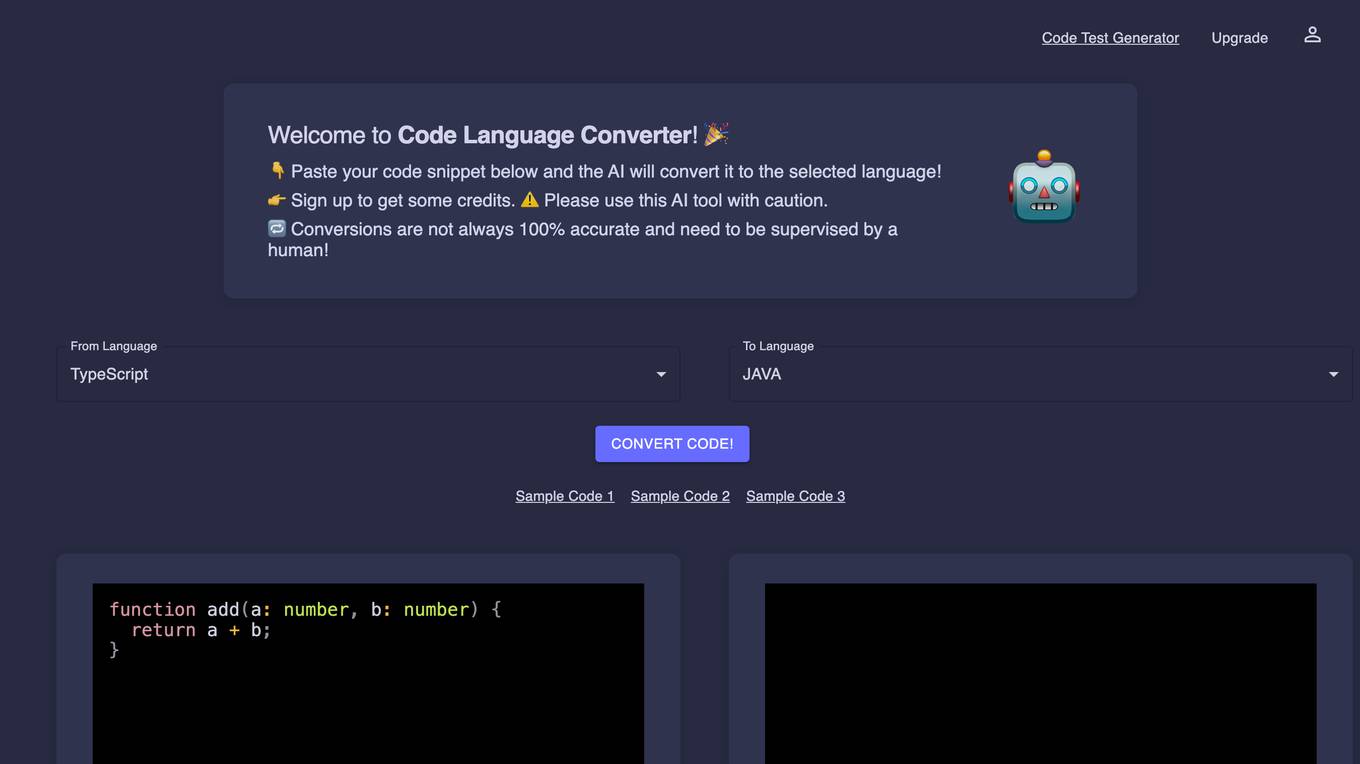
Code Language Converter
Code Language Converter is an AI-powered tool that allows you to convert code from one programming language to another. Simply paste your code snippet into the converter and select the desired output language. The AI will then generate the converted code, which you can download or copy and paste into your project.Code Language Converter is a valuable tool for developers of all levels. It can save you time and effort by automating the code conversion process. Additionally, the converter can help you to learn new programming languages by providing you with a way to see how code is written in different languages.
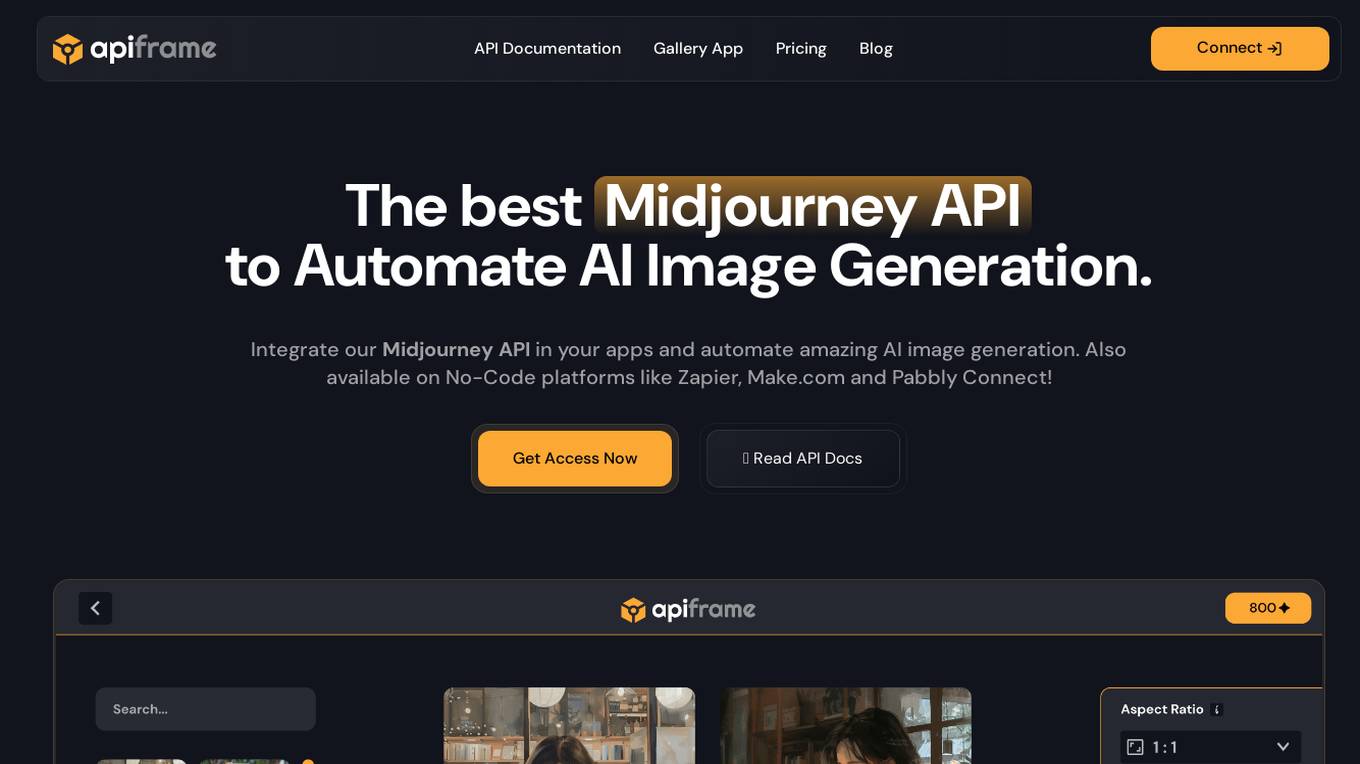
APIFRAME
APIFRAME is an AI tool that offers the Midjourney API for automating AI image generation. It provides a stable and scalable solution for developers and product owners to leverage Midjourney AI's image generation capabilities through a rich-featured API. With near-zero downtime and seamless integration, APIFRAME empowers users to automate amazing AI image generation in their applications.
109 - Open Source Tools

aiogram_bot_template
Aiogram bot template is a boilerplate for creating Telegram bots using Aiogram framework. It provides a solid foundation for building robust and scalable bots with a focus on code organization, database integration, and localization.

aiohttp-pydantic
Aiohttp pydantic is an aiohttp view to easily parse and validate requests. You define using function annotations what your methods for handling HTTP verbs expect, and Aiohttp pydantic parses the HTTP request for you, validates the data, and injects the parameters you want. It provides features like query string, request body, URL path, and HTTP headers validation, as well as Open API Specification generation.

Gemini-API
Gemini-API is a reverse-engineered asynchronous Python wrapper for Google Gemini web app (formerly Bard). It provides features like persistent cookies, ImageFx support, extension support, classified outputs, official flavor, and asynchronous operation. The tool allows users to generate contents from text or images, have conversations across multiple turns, retrieve images in response, generate images with ImageFx, save images to local files, use Gemini extensions, check and switch reply candidates, and control log level.
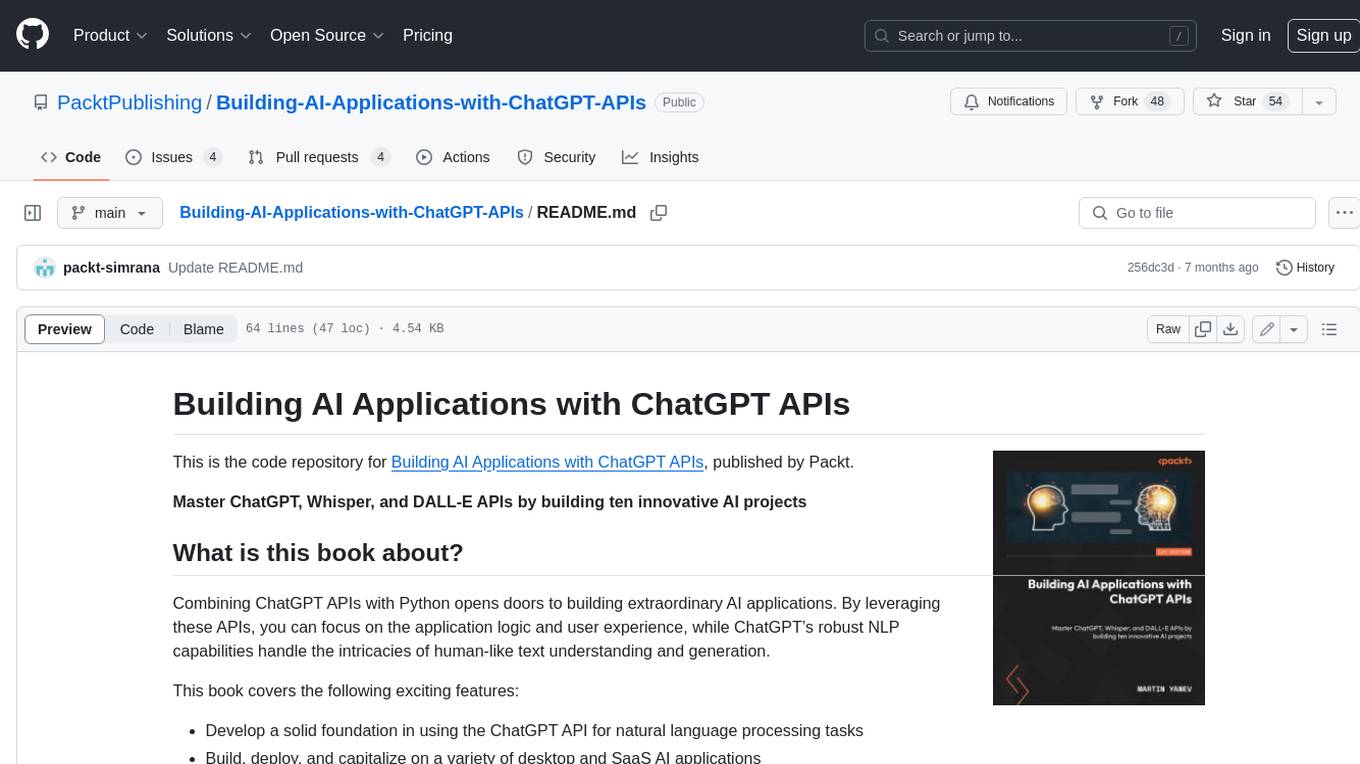
Building-AI-Applications-with-ChatGPT-APIs
This repository is for the book 'Building AI Applications with ChatGPT APIs' published by Packt. It provides code examples and instructions for mastering ChatGPT, Whisper, and DALL-E APIs through building innovative AI projects. Readers will learn to develop AI applications using ChatGPT APIs, integrate them with frameworks like Flask and Django, create AI-generated art with DALL-E APIs, and optimize ChatGPT models through fine-tuning.

gcloud-aio
This repository contains shared codebase for two projects: gcloud-aio and gcloud-rest. gcloud-aio is built for Python 3's asyncio, while gcloud-rest is a threadsafe requests-based implementation. It provides clients for Google Cloud services like Auth, BigQuery, Datastore, KMS, PubSub, Storage, and Task Queue. Users can install the library using pip and refer to the documentation for usage details. Developers can contribute to the project by following the contribution guide.

robocorp
Robocorp is a platform that allows users to create, deploy, and operate Python automations and AI actions. It provides an easy way to extend the capabilities of AI agents, assistants, and copilots with custom actions written in Python. Users can create and deploy tools, skills, loaders, and plugins that securely connect any AI Assistant platform to their data and applications. The Robocorp Action Server makes Python scripts compatible with ChatGPT and LangChain by automatically creating and exposing an API based on function declaration, type hints, and docstrings. It simplifies the process of developing and deploying AI actions, enabling users to interact with AI frameworks effortlessly.

aioconsole
aioconsole is a Python package that provides asynchronous console and interfaces for asyncio. It offers asynchronous equivalents to input, print, exec, and code.interact, an interactive loop running the asynchronous Python console, customization and running of command line interfaces using argparse, stream support to serve interfaces instead of using standard streams, and the apython script to access asyncio code at runtime without modifying the sources. The package requires Python version 3.8 or higher and can be installed from PyPI or GitHub. It allows users to run Python files or modules with a modified asyncio policy, replacing the default event loop with an interactive loop. aioconsole is useful for scenarios where users need to interact with asyncio code in a console environment.

aiosqlite
aiosqlite is a Python library that provides a friendly, async interface to SQLite databases. It replicates the standard sqlite3 module but with async versions of all the standard connection and cursor methods, along with context managers for automatically closing connections and cursors. It allows interaction with SQLite databases on the main AsyncIO event loop without blocking execution of other coroutines while waiting for queries or data fetches. The library also replicates most of the advanced features of sqlite3, such as row factories and total changes tracking.
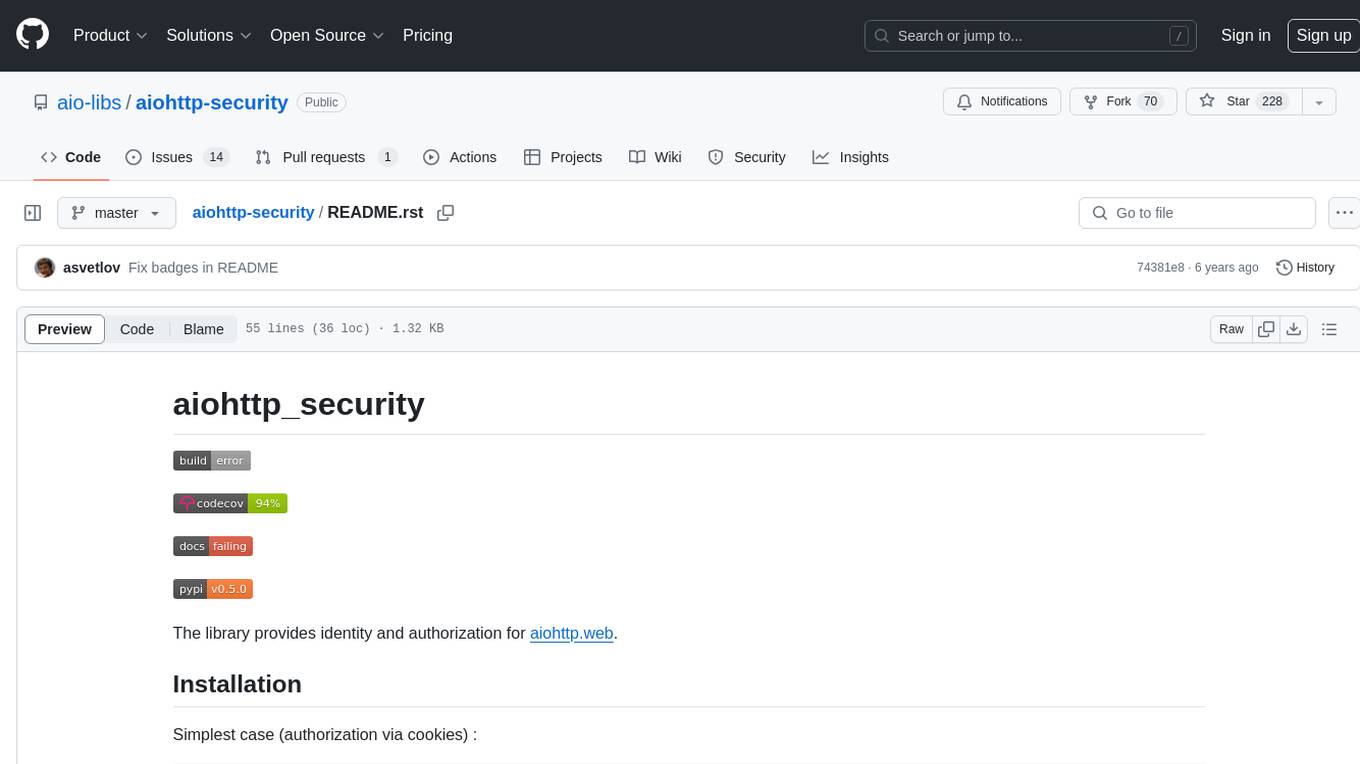
aiohttp-security
aiohttp_security is a library that provides identity and authorization for aiohttp.web. It offers features for handling authorization via cookies and supports aiohttp-session. The library includes examples for basic usage and database authentication, along with demos in the demo directory. For development, the library requires installation of specific requirements listed in the requirements-dev.txt file. aiohttp_security is licensed under the Apache 2 license.
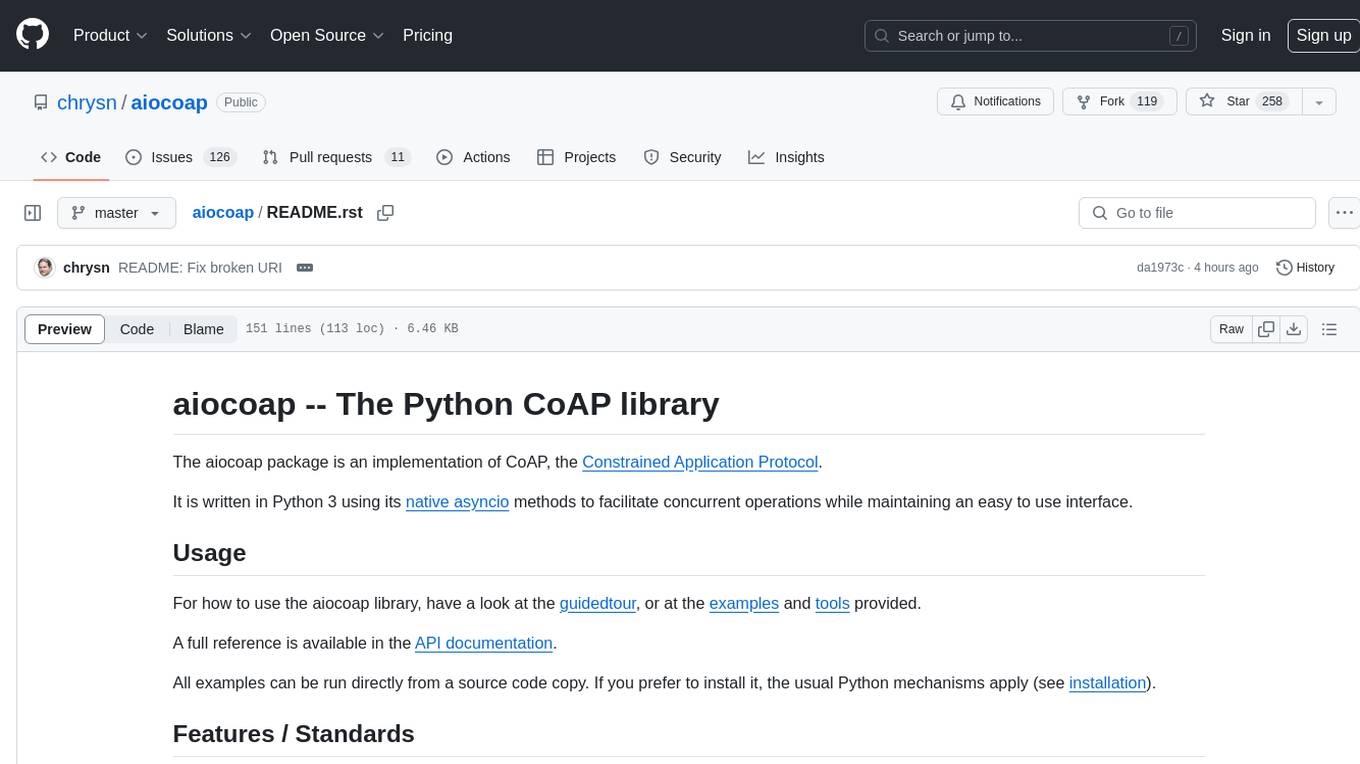
aiocoap
aiocoap is a Python library that implements the Constrained Application Protocol (CoAP) using native asyncio methods in Python 3. It supports various CoAP standards such as RFC7252, RFC7641, RFC7959, RFC8323, RFC7967, RFC8132, RFC9176, RFC8613, and draft-ietf-core-oscore-groupcomm-17. The library provides features for clients and servers, including multicast support, blockwise transfer, CoAP over TCP, TLS, and WebSockets, No-Response, PATCH/FETCH, OSCORE, and Group OSCORE. It offers an easy-to-use interface for concurrent operations and is suitable for IoT applications.
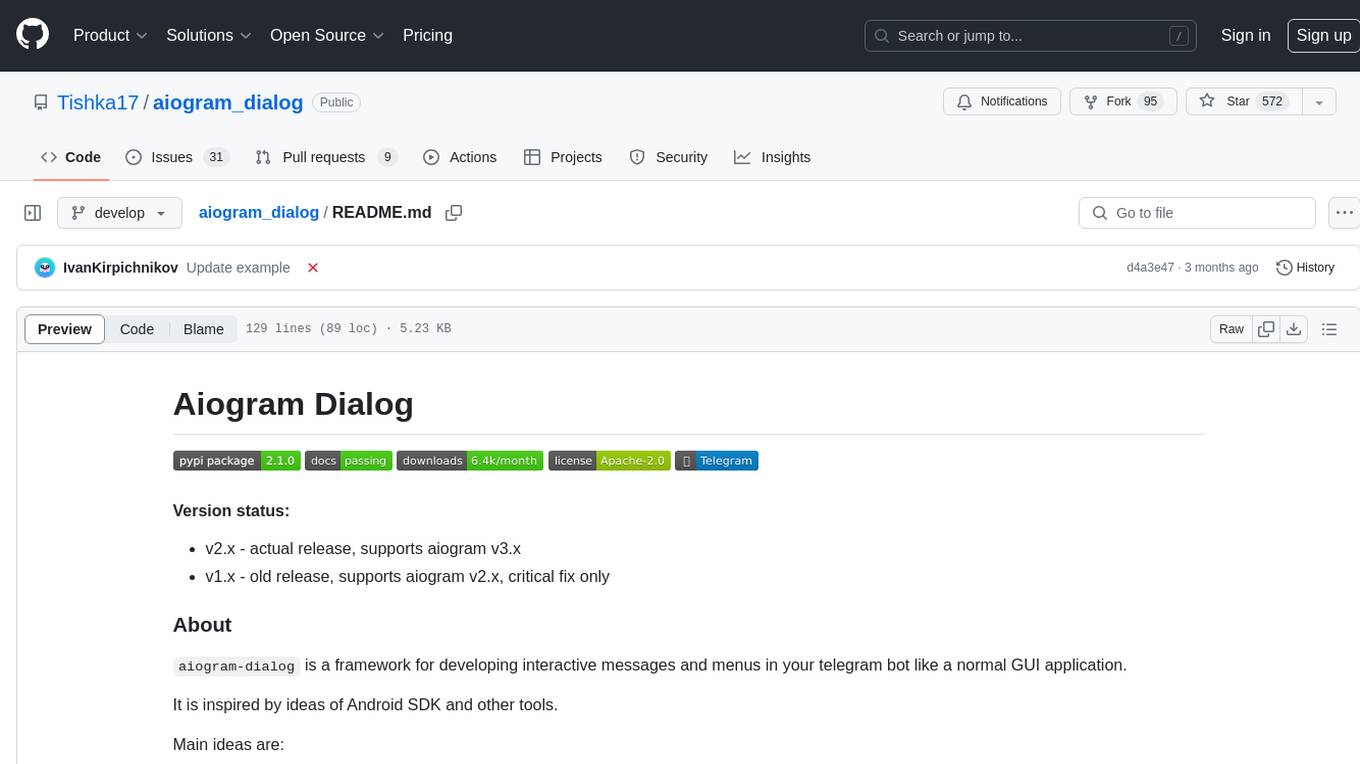
aiogram_dialog
Aiogram Dialog is a framework for developing interactive messages and menus in Telegram bots, inspired by Android SDK. It allows splitting data retrieval, rendering, and action processing, creating reusable widgets, and designing bots with a focus on user experience. The tool supports rich text rendering, automatic message updating, multiple dialog stacks, inline keyboard widgets, stateful widgets, various button layouts, media handling, transitions between windows, and offline HTML-preview for messages and transitions diagram.

aiomisc
aiomisc is a Python library that provides a collection of utility functions and classes for working with asynchronous I/O in a more intuitive and efficient way. It offers features like worker pools, connection pools, circuit breaker pattern, and retry mechanisms to make asyncio code more robust and easier to maintain. The library simplifies the architecture of software using asynchronous I/O, making it easier for developers to write reliable and scalable asynchronous code.
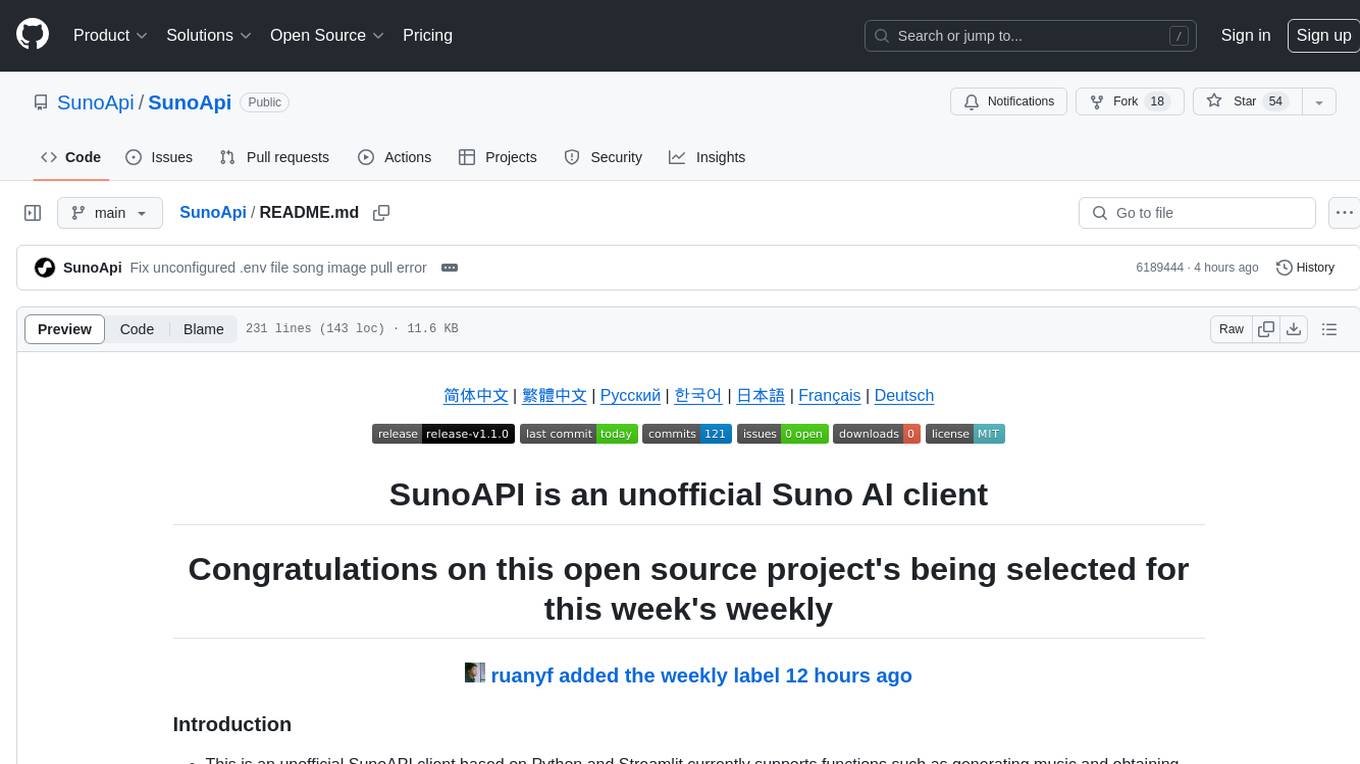
SunoApi
SunoAPI is an unofficial client for Suno AI, built on Python and Streamlit. It supports functions like generating music and obtaining music information. Users can set up multiple account information to be saved for use. The tool also features built-in maintenance and activation functions for tokens, eliminating concerns about token expiration. It supports multiple languages and allows users to upload pictures for generating songs based on image content analysis.
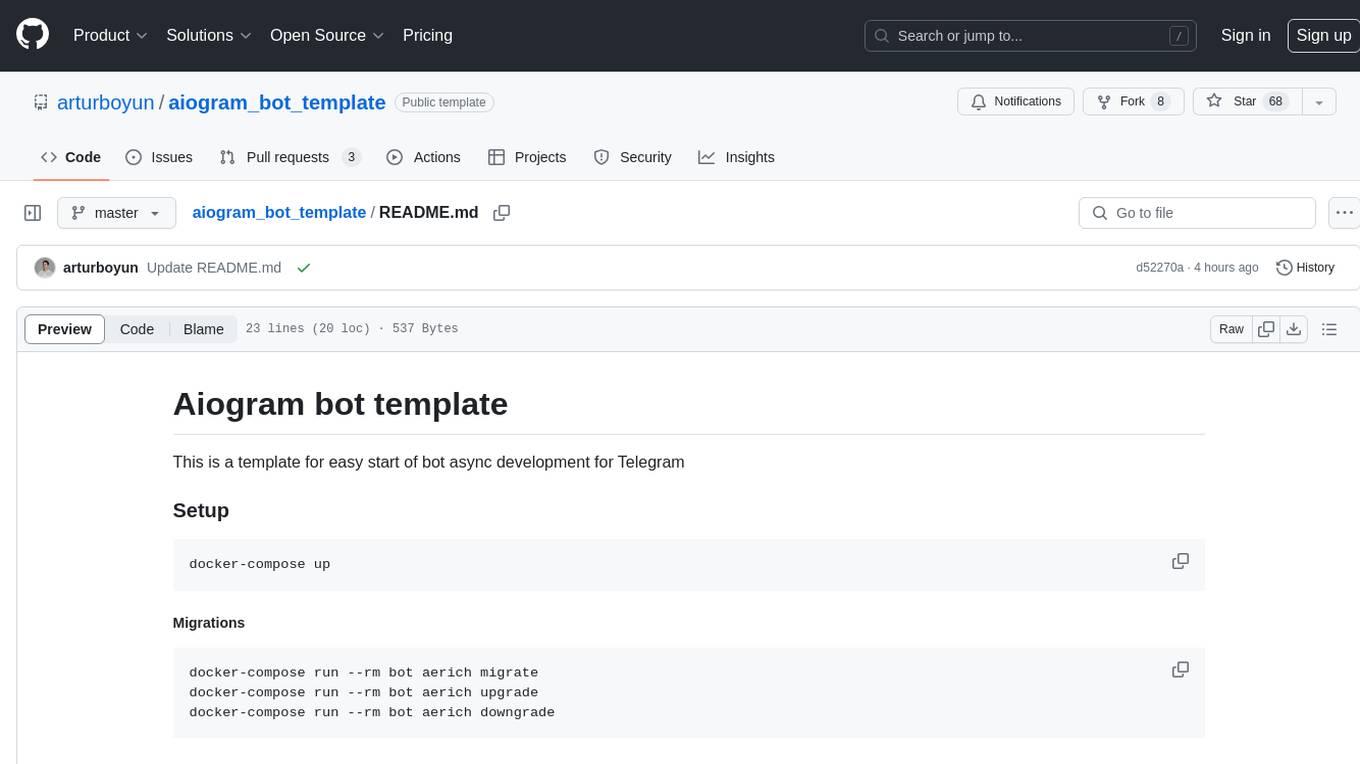
aiogram_bot_template
This repository provides a template for easy asynchronous bot development for Telegram using Aiogram library. It includes setup instructions using Docker Compose, migration commands for TortoiseORM, and examples for working with TortoiseORM. The template aims to simplify the process of creating Telegram bots with features like FastAPI integration and Docker Compose setup. The repository also includes a list of tasks to be completed, such as changing SQLAlchemy to TortoiseORM, adding FastAPI for webhook, and setting up CI/CD examples.
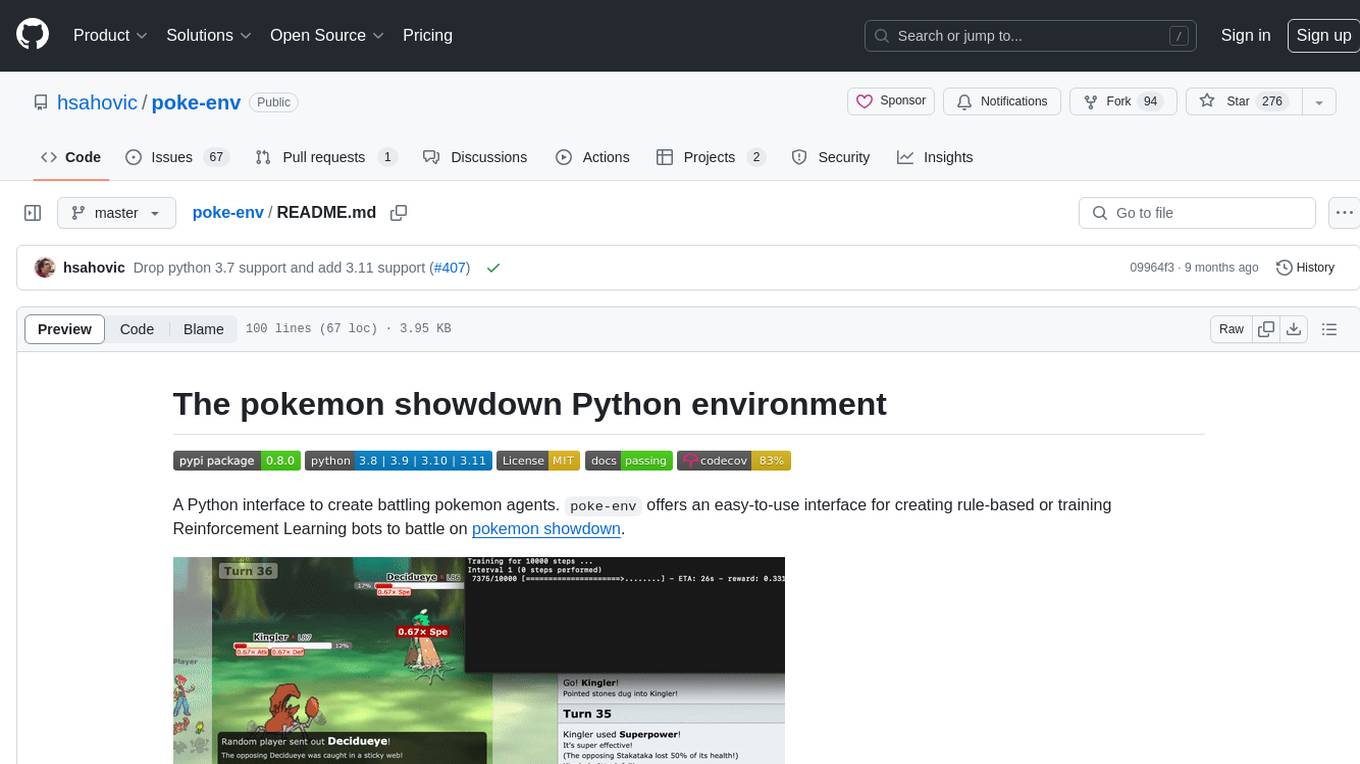
poke-env
A Python interface for creating battling Pokemon agents, 'poke-env' allows users to develop rule-based or Reinforcement Learning bots to battle on Pokemon Showdown. The tool provides an easy-to-use interface for agent creation and offers documentation, examples, and starting code for beginners. Users can install 'poke-env' via pip and set up a development server for testing. The project is inspired by an artificial intelligence class project and relies on data from Smogon forums' RMT section. It is licensed under MIT and can be cited using a provided BibTeX entry.
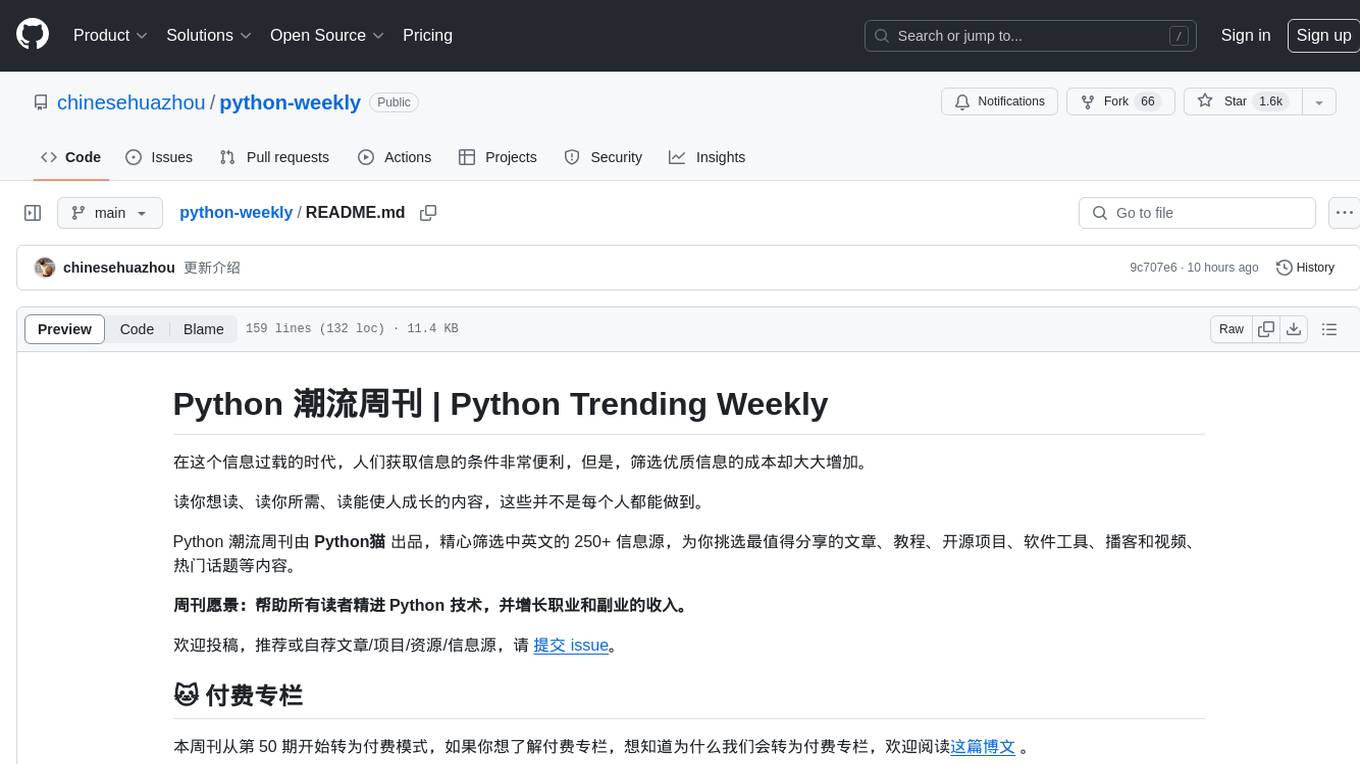
python-weekly
Python Trending Weekly is a curated newsletter by Python猫 that selects the most valuable articles, tutorials, open-source projects, software tools, podcasts, videos, and hot topics from over 250 English and Chinese sources. The newsletter aims to help readers improve their Python skills and increase their income from both professional and side projects. It offers paid subscription options and is available on various platforms like GitHub, WeChat, blogs, email, Telegram, and Twitter. Each issue shares a collection of articles, open-source projects, videos, and books related to Python and technology.
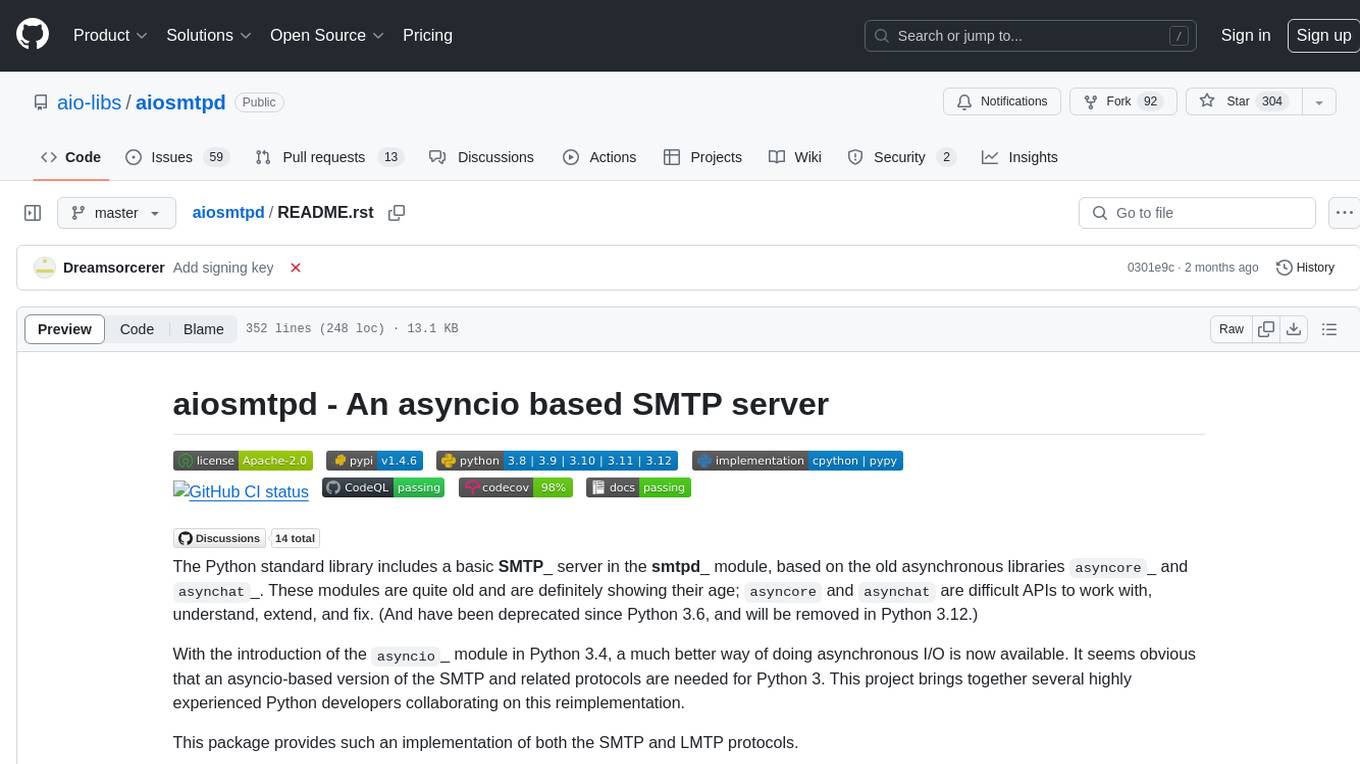
aiosmtpd
aiosmtpd is an asyncio-based SMTP server implementation that provides a modern and efficient way to handle SMTP and LMTP protocols in Python 3. It replaces the outdated asyncore and asynchat modules with asyncio for improved asynchronous I/O operations. The project aims to offer a more user-friendly, extendable, and maintainable solution for handling email protocols in Python applications. It is actively maintained by experienced Python developers and offers full documentation for easy integration and usage.
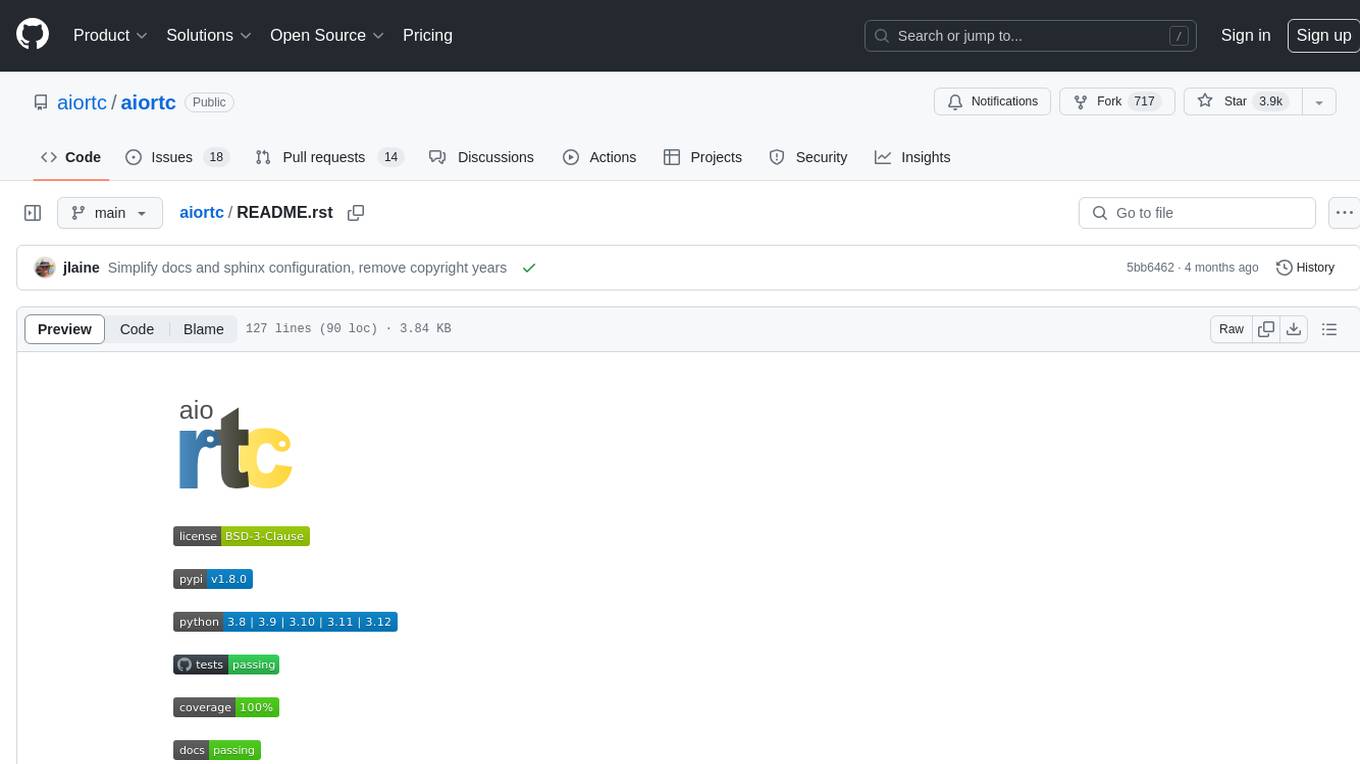
aiortc
aiortc is a Python library for Web Real-Time Communication (WebRTC) and Object Real-Time Communication (ORTC). It provides a simple and readable implementation for programmers to understand and tinker with WebRTC internals. The library allows for exchanging audio, video, and data channels, supports SDP generation/parsing, ICE, DTLS, SRTP, SCTP, and various audio/video codecs. It also enables creating innovative products by leveraging Python ecosystem modules, such as computer vision algorithms with OpenCV. Extensive testing ensures high code quality.
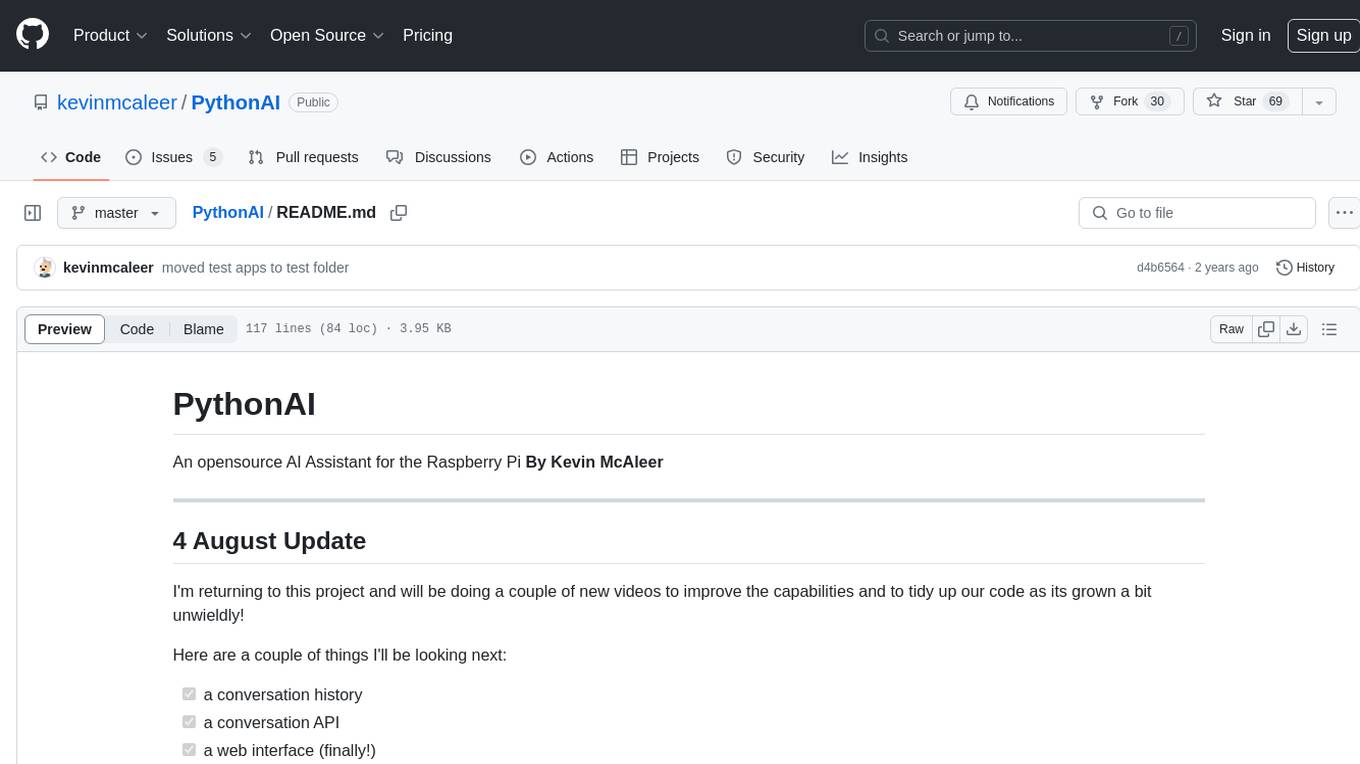
PythonAI
PythonAI is an open-source AI Assistant designed for the Raspberry Pi by Kevin McAleer. The project aims to enhance the capabilities of the Raspberry Pi by providing features such as conversation history, a conversation API, a web interface, a skills framework using plugin technology, and an event framework for adding functionality via plugins. The tool utilizes the Vosk offline library for speech-to-text conversion and offers a simple skills framework for easy implementation of new skills. Users can create new skills by adding Python files to the 'skills' folder and updating the 'skills.json' file. PythonAI is designed to be easy to read, maintain, and extend, making it a valuable tool for Raspberry Pi enthusiasts looking to build AI applications.
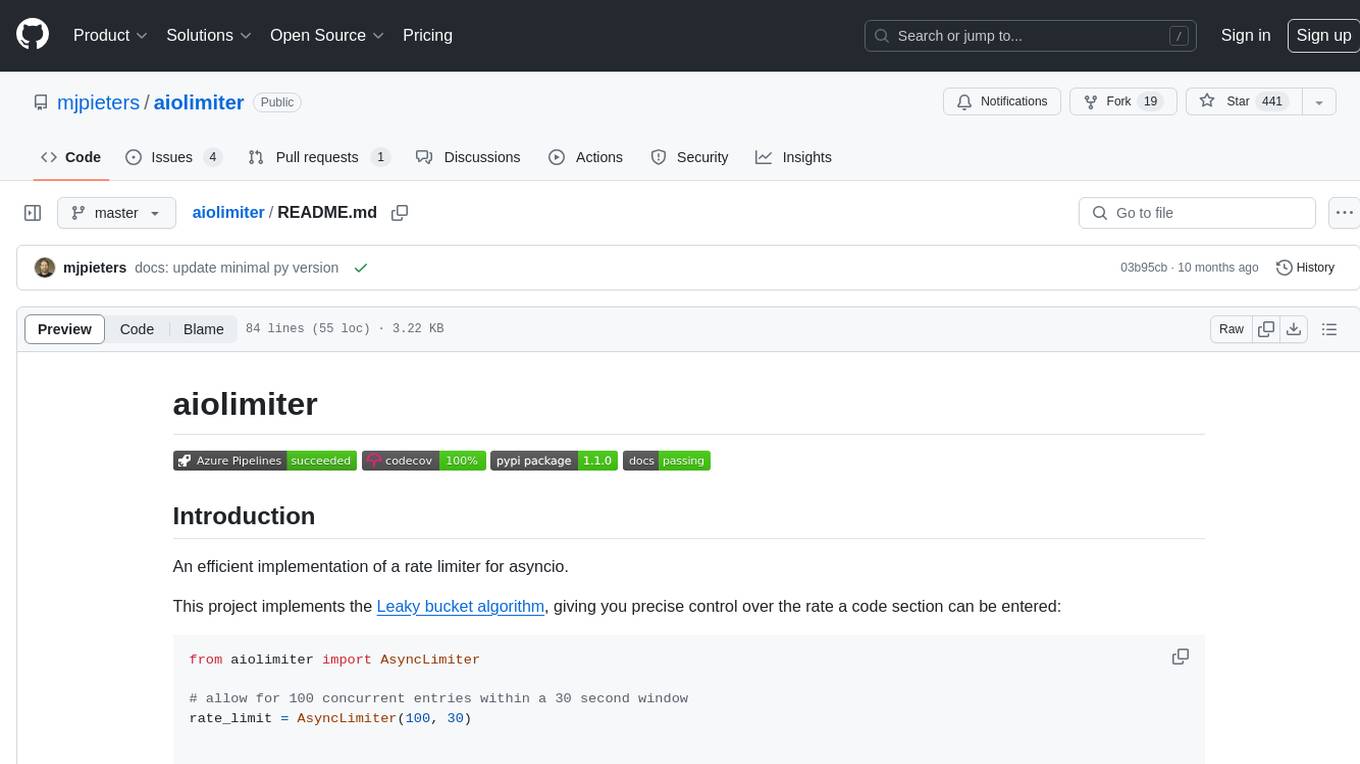
aiolimiter
An efficient implementation of a rate limiter for asyncio using the Leaky bucket algorithm, providing precise control over the rate a code section can be entered. It allows for limiting the number of concurrent entries within a specified time window, ensuring that a section of code is executed a maximum number of times in that period.
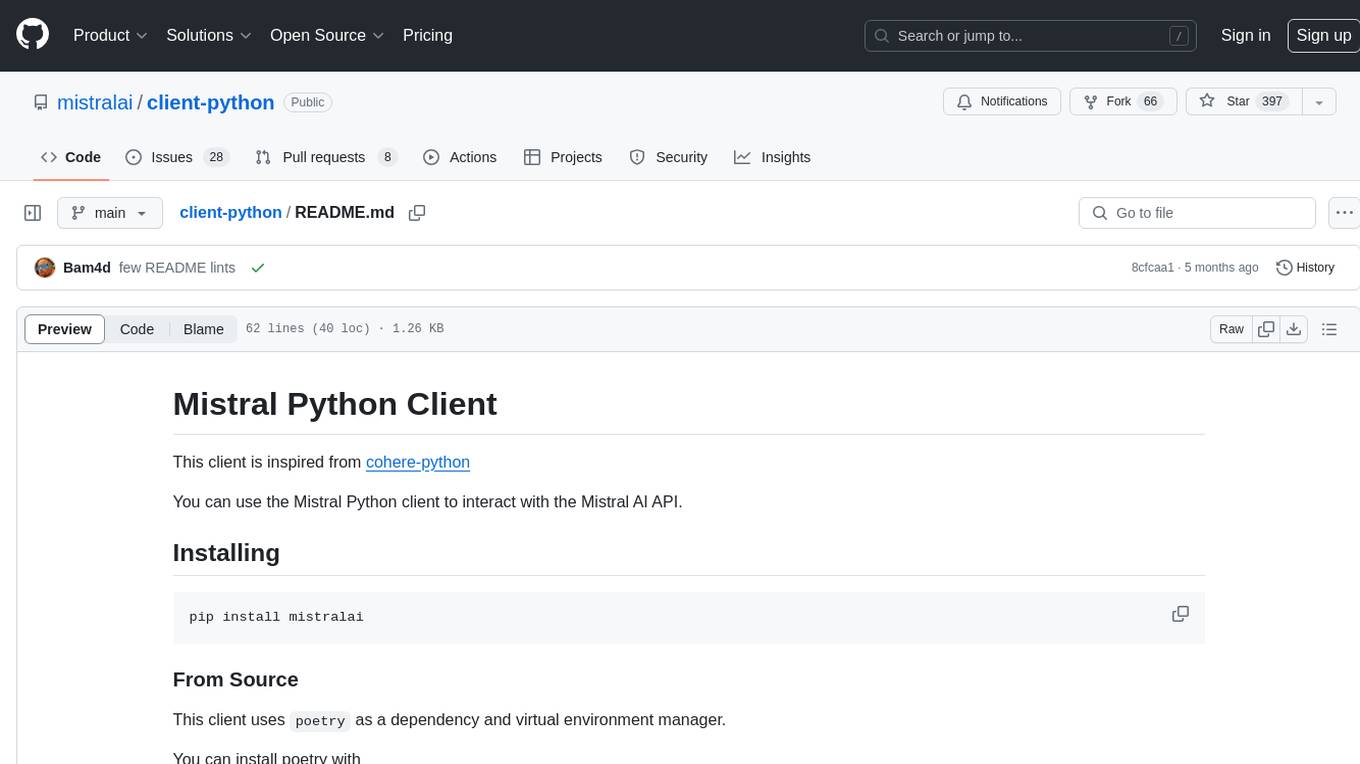
client-python
The Mistral Python Client is a tool inspired by cohere-python that allows users to interact with the Mistral AI API. It provides functionalities to access and utilize the AI capabilities offered by Mistral. Users can easily install the client using pip and manage dependencies using poetry. The client includes examples demonstrating how to use the API for various tasks, such as chat interactions. To get started, users need to obtain a Mistral API Key and set it as an environment variable. Overall, the Mistral Python Client simplifies the integration of Mistral AI services into Python applications.
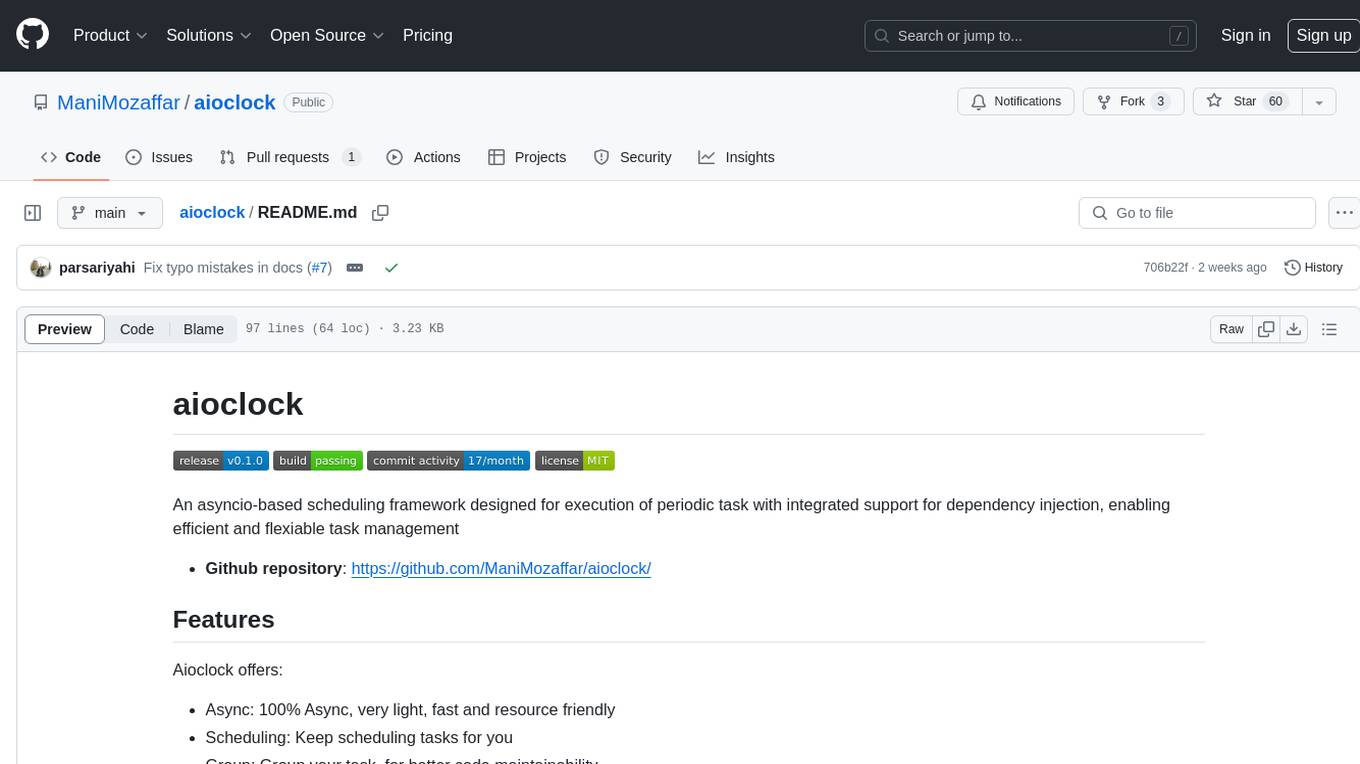
aioclock
An asyncio-based scheduling framework designed for execution of periodic tasks with integrated support for dependency injection, enabling efficient and flexible task management. Aioclock is 100% async, light, fast, and resource-friendly. It offers features like task scheduling, grouping, trigger definition, easy syntax, Pydantic v2 validation, and upcoming support for running the task dispatcher on a different process and backend support for horizontal scaling.
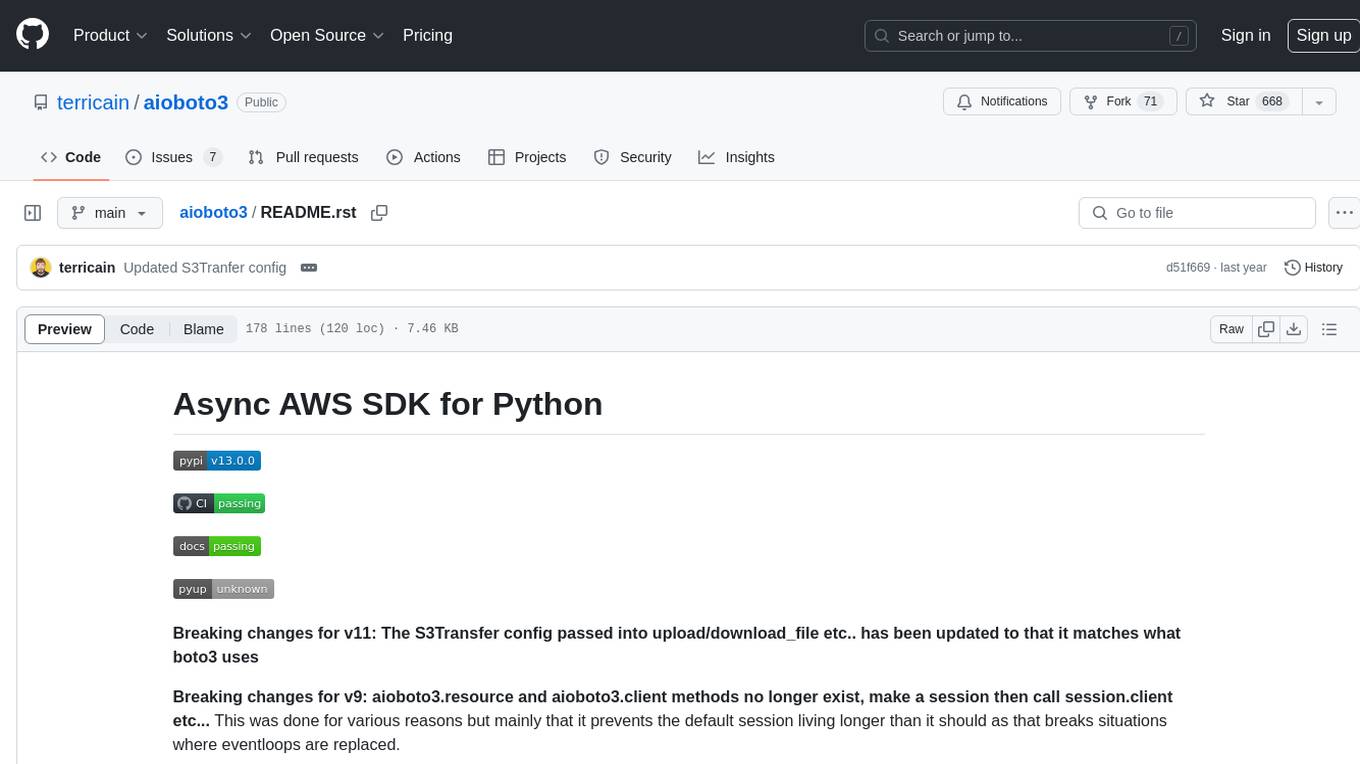
aioboto3
aioboto3 is an async AWS SDK for Python that allows users to use near enough all of the boto3 client commands in an async manner just by prefixing the command with `await`. It combines the great work of boto3 and aiobotocore, enabling users to use higher level APIs provided by boto3 in an asynchronous manner. The package provides support for various AWS services such as DynamoDB, S3, Kinesis, SSM Parameter Store, and Athena. It also offers features like client-side encryption using KMS-Managed master keys and supports asyncifying `get_presigned_url`. The library closely mimics the usage of boto3 and is mainly developed to be used in async microservices.
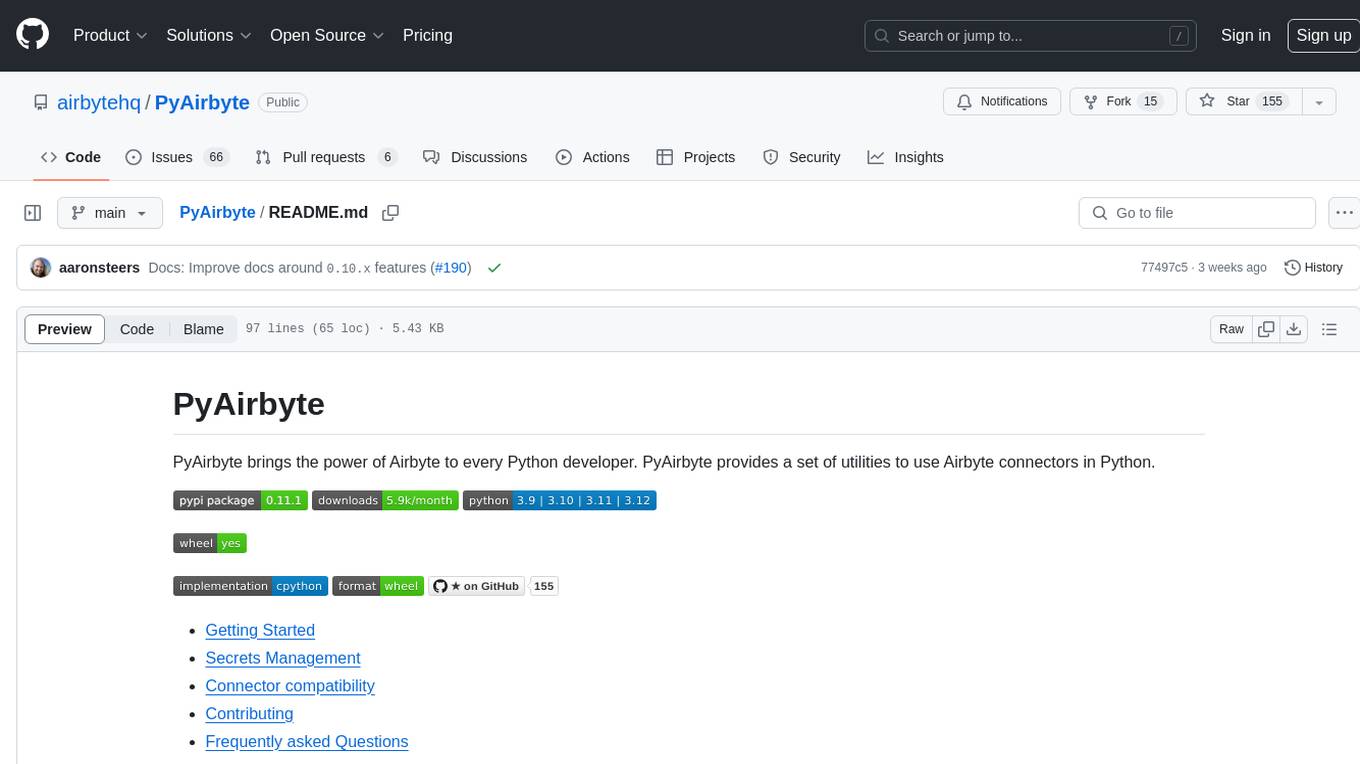
PyAirbyte
PyAirbyte brings the power of Airbyte to every Python developer by providing a set of utilities to use Airbyte connectors in Python. It enables users to easily manage secrets, work with various connectors like GitHub, Shopify, and Postgres, and contribute to the project. PyAirbyte is not a replacement for Airbyte but complements it, supporting data orchestration frameworks like Airflow and Snowpark. Users can develop ETL pipelines and import connectors from local directories. The tool simplifies data integration tasks for Python developers.
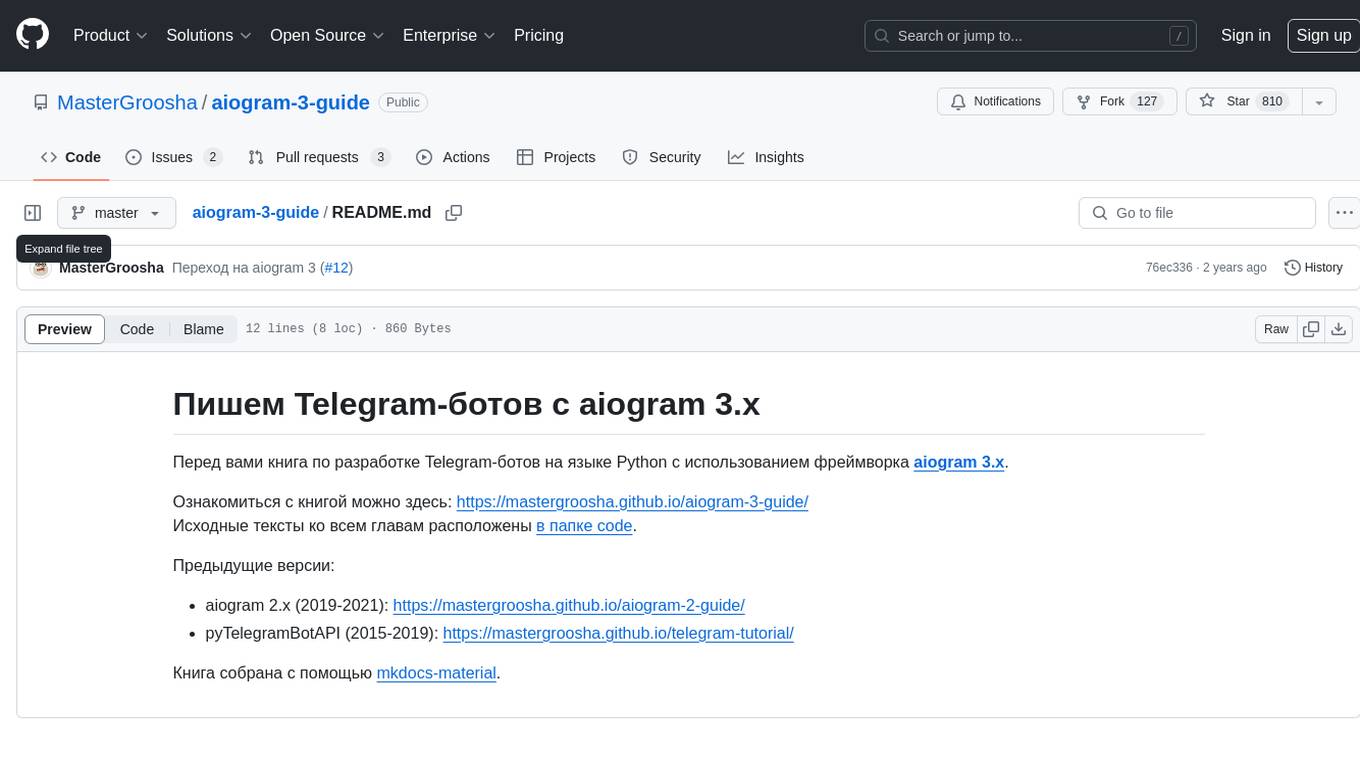
aiogram-3-guide
This repository contains a guide on developing Telegram bots in Python using the aiogram 3.x framework. The guide is available online and includes source code for all chapters. It builds on previous versions for aiogram 2.x and pyTelegramBotAPI, and is created using mkdocs-material.
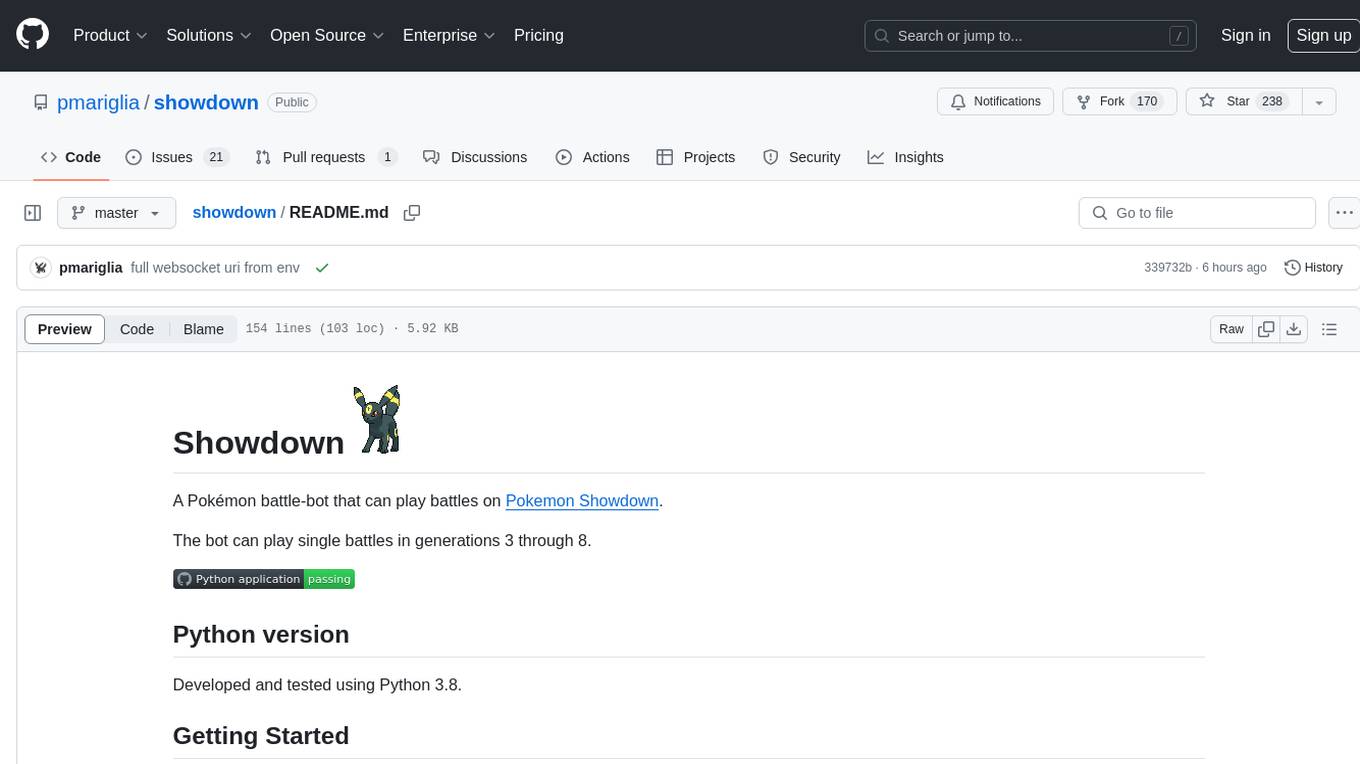
showdown
Showdown is a Pokémon battle-bot that can play battles on Pokemon Showdown. It can play single battles in generations 3 through 8. The project offers different battle bot implementations such as Safest, Nash-Equilibrium, Team Datasets, and Most Damage. Users can configure the bot using environment variables and run it either without Docker by cloning the repository and installing requirements or with Docker by building the Docker image and running it with an environment variable file. Additionally, users can write their own bot by creating a package in showdown/battle_bots with a module named main.py and implementing a find_best_move function.
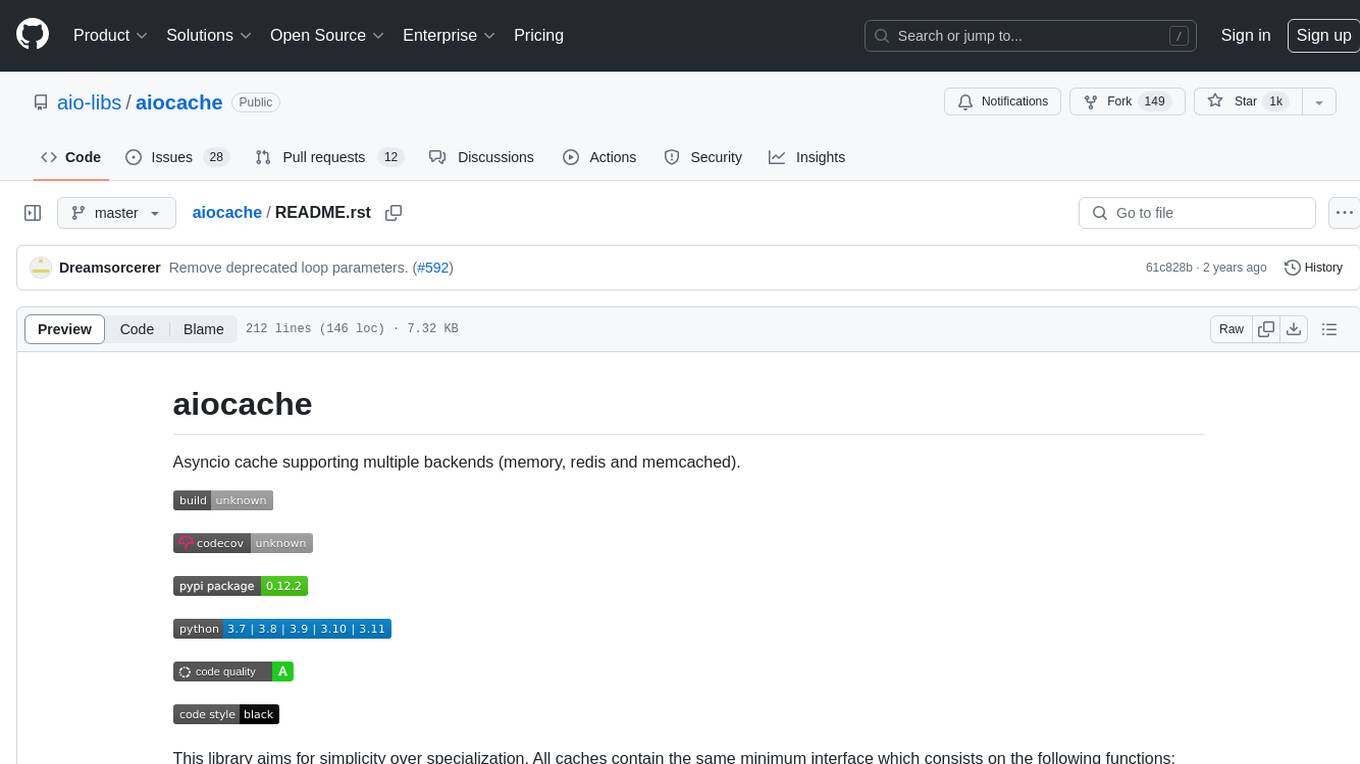
aiocache
Aiocache is an asyncio cache library that supports multiple backends such as memory, redis, and memcached. It provides a simple interface for functions like add, get, set, multi_get, multi_set, exists, increment, delete, clear, and raw. Users can easily install and use the library for caching data in Python applications. Aiocache allows for easy instantiation of caches and setup of cache aliases for reusing configurations. It also provides support for backends, serializers, and plugins to customize cache operations. The library offers detailed documentation and examples for different use cases and configurations.
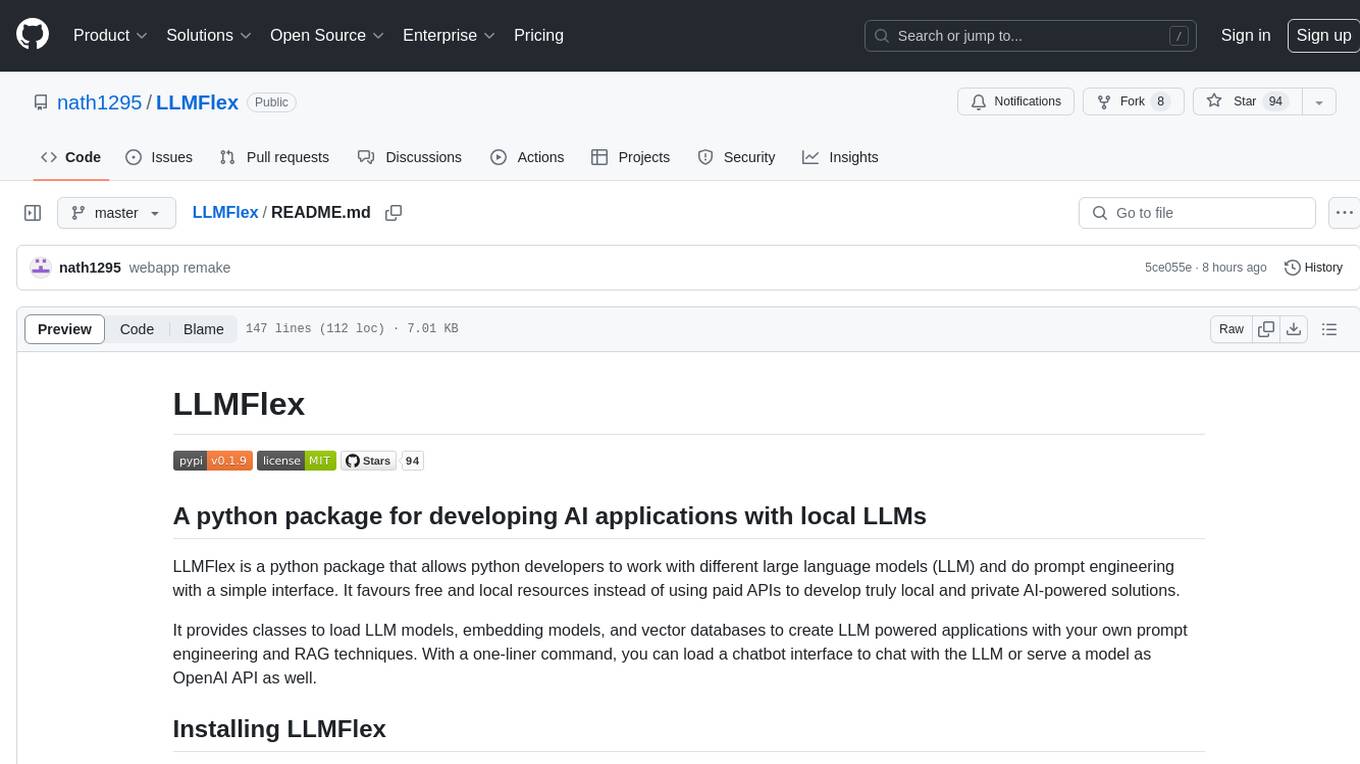
LLMFlex
LLMFlex is a python package designed for developing AI applications with local Large Language Models (LLMs). It provides classes to load LLM models, embedding models, and vector databases to create AI-powered solutions with prompt engineering and RAG techniques. The package supports multiple LLMs with different generation configurations, embedding toolkits, vector databases, chat memories, prompt templates, custom tools, and a chatbot frontend interface. Users can easily create LLMs, load embeddings toolkit, use tools, chat with models in a Streamlit web app, and serve an OpenAI API with a GGUF model. LLMFlex aims to offer a simple interface for developers to work with LLMs and build private AI solutions using local resources.
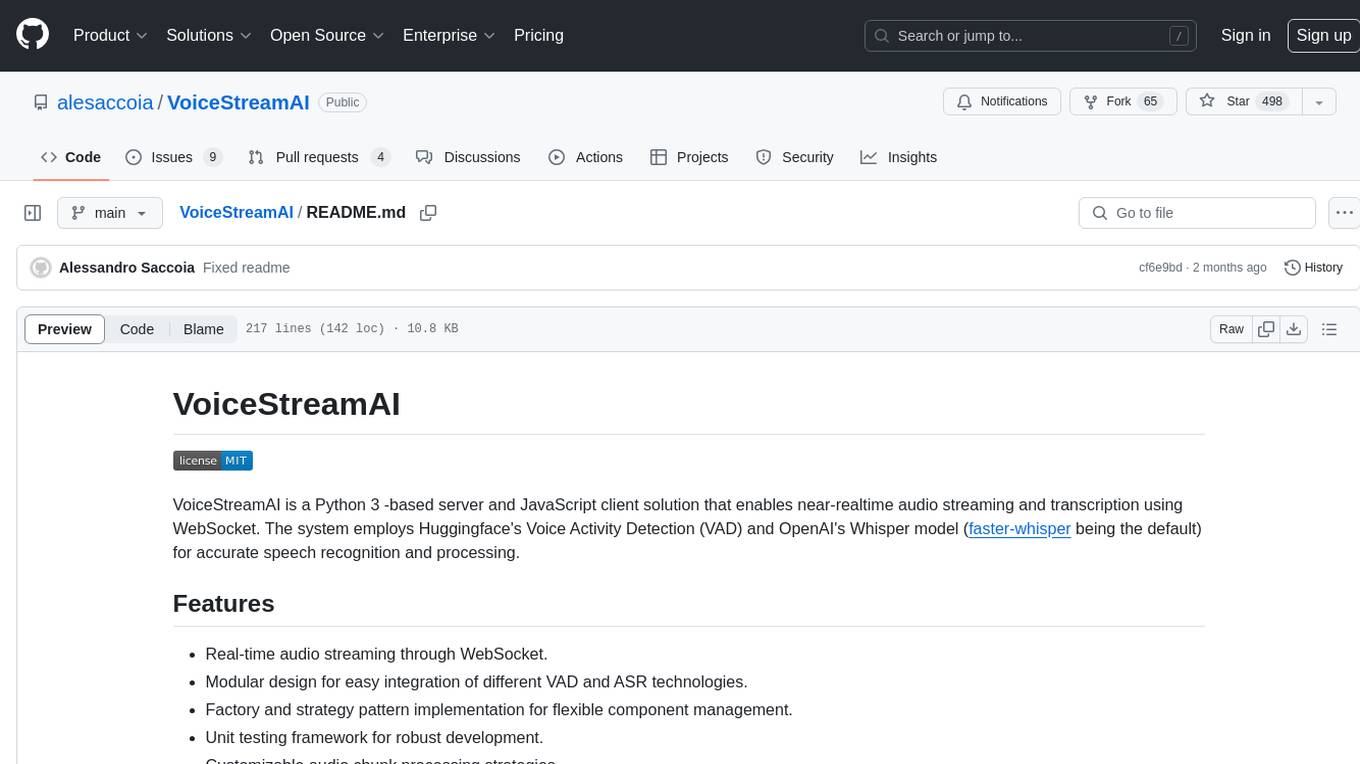
VoiceStreamAI
VoiceStreamAI is a Python 3-based server and JavaScript client solution for near-realtime audio streaming and transcription using WebSocket. It employs Huggingface's Voice Activity Detection (VAD) and OpenAI's Whisper model for accurate speech recognition. The system features real-time audio streaming, modular design for easy integration of VAD and ASR technologies, customizable audio chunk processing strategies, support for multilingual transcription, and secure sockets support. It uses a factory and strategy pattern implementation for flexible component management and provides a unit testing framework for robust development.
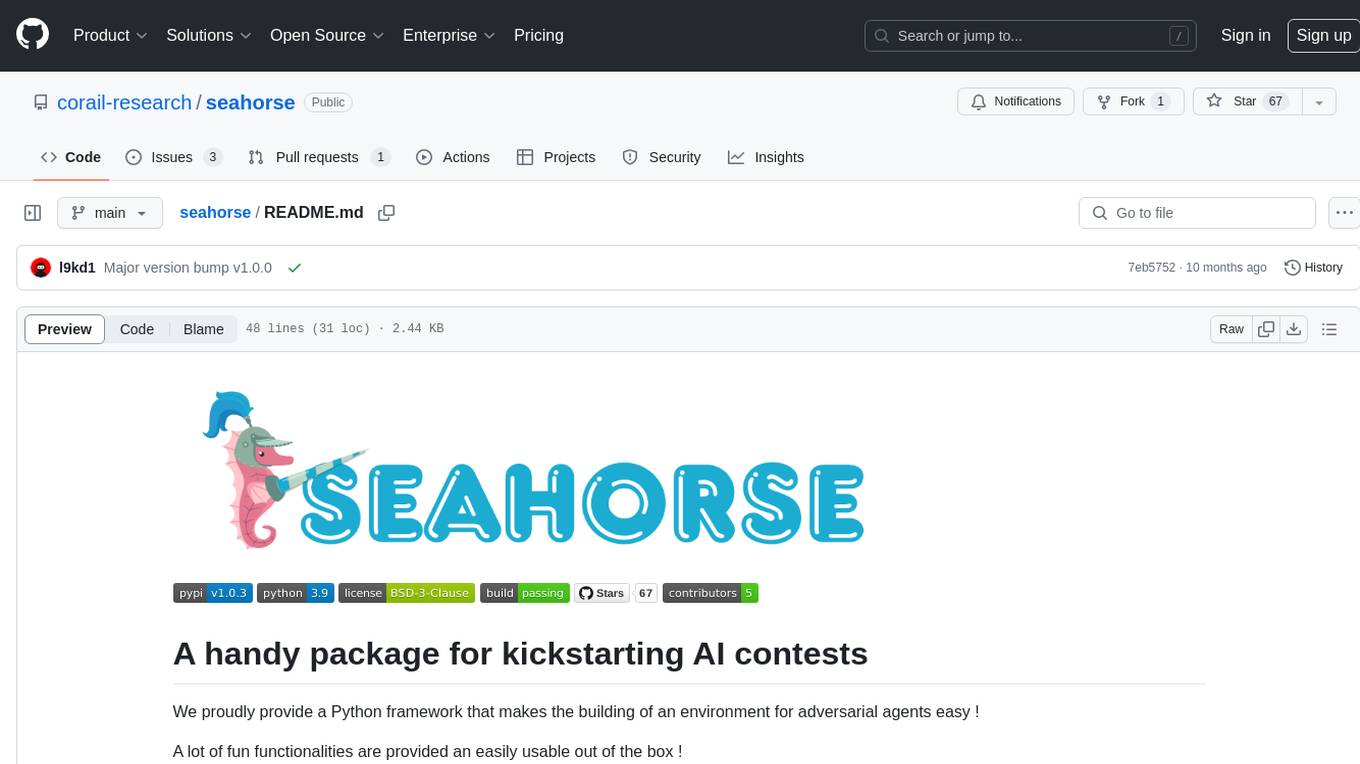
seahorse
A handy package for kickstarting AI contests. This Python framework simplifies the creation of an environment for adversarial agents, offering various functionalities for game setup, playing against remote agents, data generation, and contest organization. The package is user-friendly and provides easy-to-use features out of the box. Developed by an enthusiastic team of M.Sc candidates at Polytechnique Montréal, 'seahorse' is distributed under the 3-Clause BSD License.
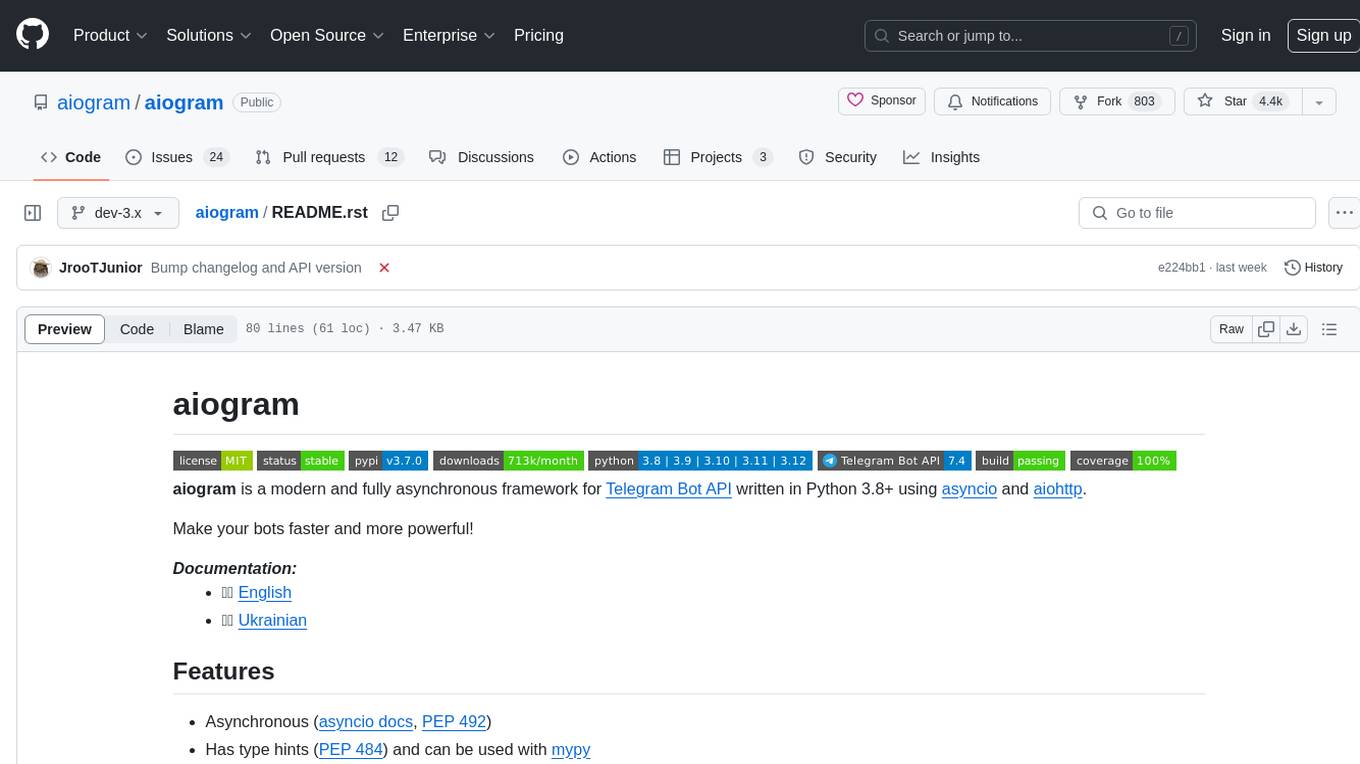
aiogram
aiogram is a modern and fully asynchronous framework for Telegram Bot API written in Python 3.8+ using asyncio and aiohttp. It helps users create faster and more powerful bots. The framework supports features such as asynchronous operations, type hints, PyPy support, Telegram Bot API integration, router updates, Finite State Machine, magic filters, middlewares, webhook replies, and I18n/L10n support with GNU Gettext or Fluent. Prior experience with asyncio is recommended before using aiogram.
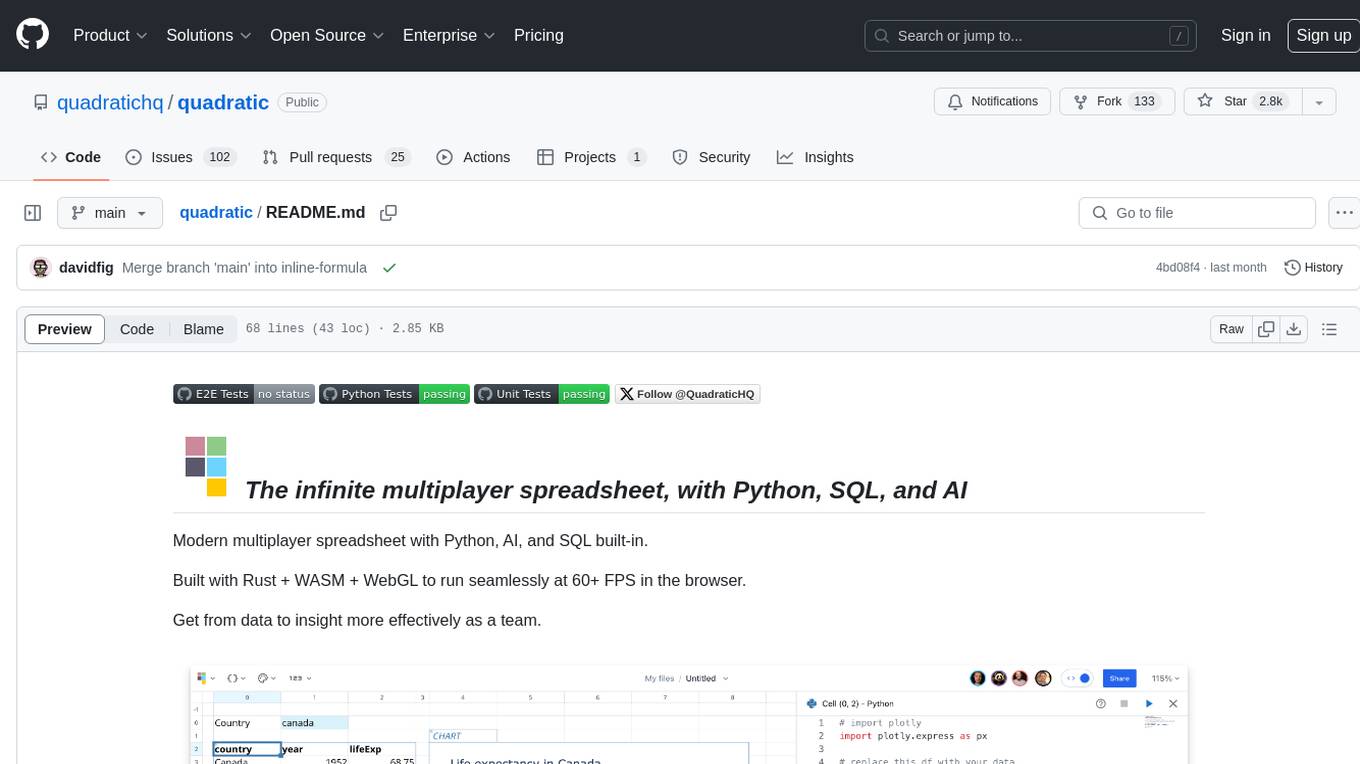
quadratic
Quadratic is a modern multiplayer spreadsheet application that integrates Python, AI, and SQL functionalities. It aims to streamline team collaboration and data analysis by enabling users to pull data from various sources and utilize popular data science tools. The application supports building dashboards, creating internal tools, mixing data from different sources, exploring data for insights, visualizing Python workflows, and facilitating collaboration between technical and non-technical team members. Quadratic is built with Rust + WASM + WebGL to ensure seamless performance in the browser, and it offers features like WebGL Grid, local file management, Python and Pandas support, Excel formula support, multiplayer capabilities, charts and graphs, and team support. The tool is currently in Beta with ongoing development for additional features like JS support, SQL database support, and AI auto-complete.
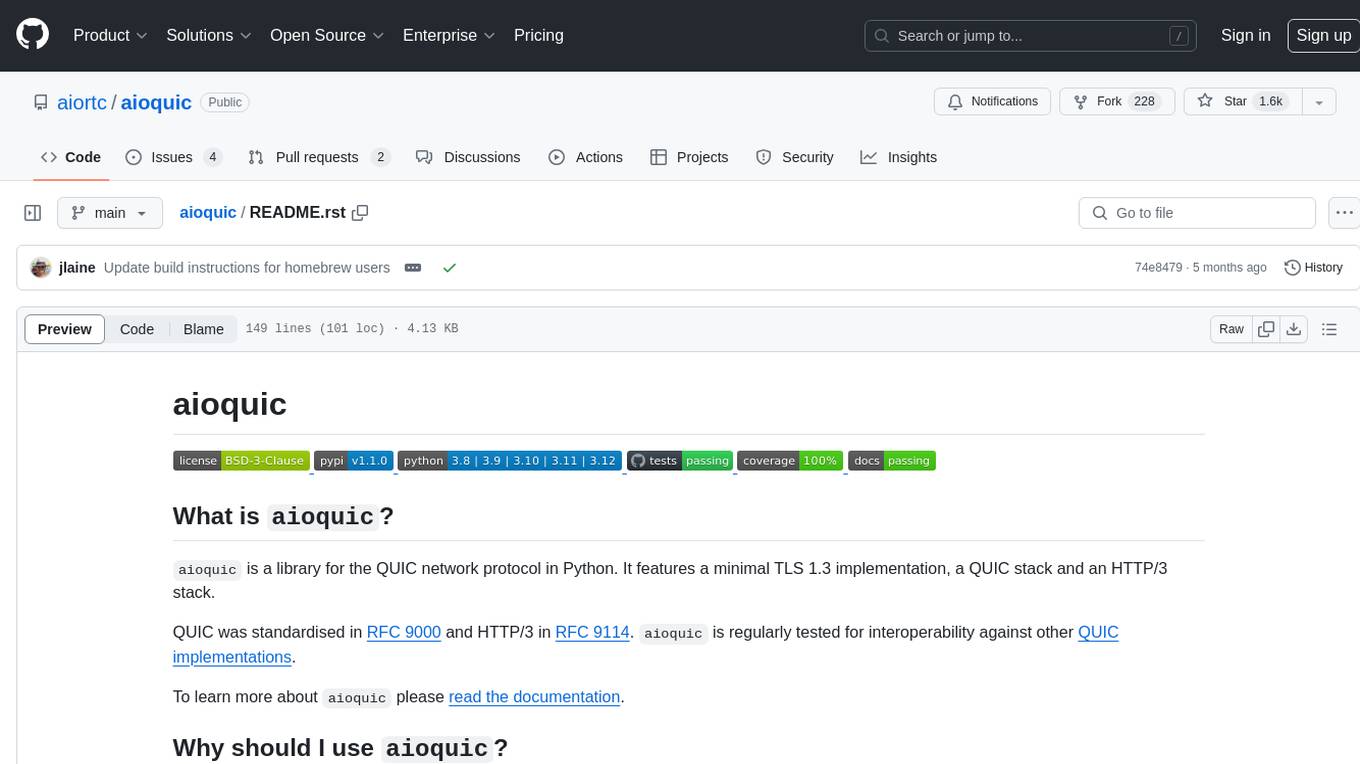
aioquic
aioquic is a Python library for the QUIC network protocol, featuring a minimal TLS 1.3 implementation, a QUIC stack, and an HTTP/3 stack. It is designed to be embedded into Python client and server libraries supporting QUIC and HTTP/3, with IPv4 and IPv6 support, connection migration, NAT rebinding, logging TLS traffic secrets and QUIC events, server push, WebSocket bootstrapping, and datagram support. The library follows the 'bring your own I/O' pattern for QUIC and HTTP/3 APIs, making it testable and integrable with different concurrency models.
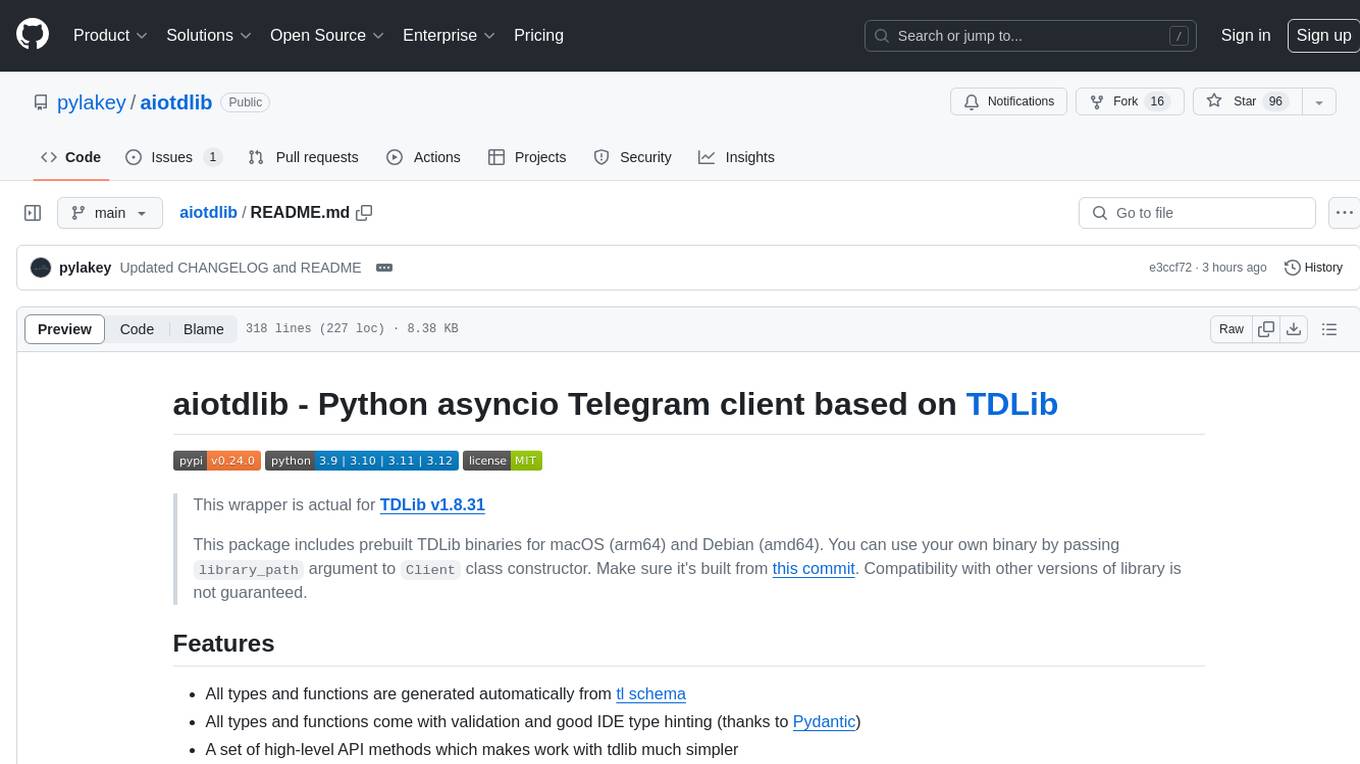
aiotdlib
aiotdlib is a Python asyncio Telegram client based on TDLib. It provides automatic generation of types and functions from tl schema, validation, good IDE type hinting, and high-level API methods for simpler work with tdlib. The package includes prebuilt TDLib binaries for macOS (arm64) and Debian Bullseye (amd64). Users can use their own binary by passing `library_path` argument to `Client` class constructor. Compatibility with other versions of the library is not guaranteed. The tool requires Python 3.9+ and users need to get their `api_id` and `api_hash` from Telegram docs for installation and usage.
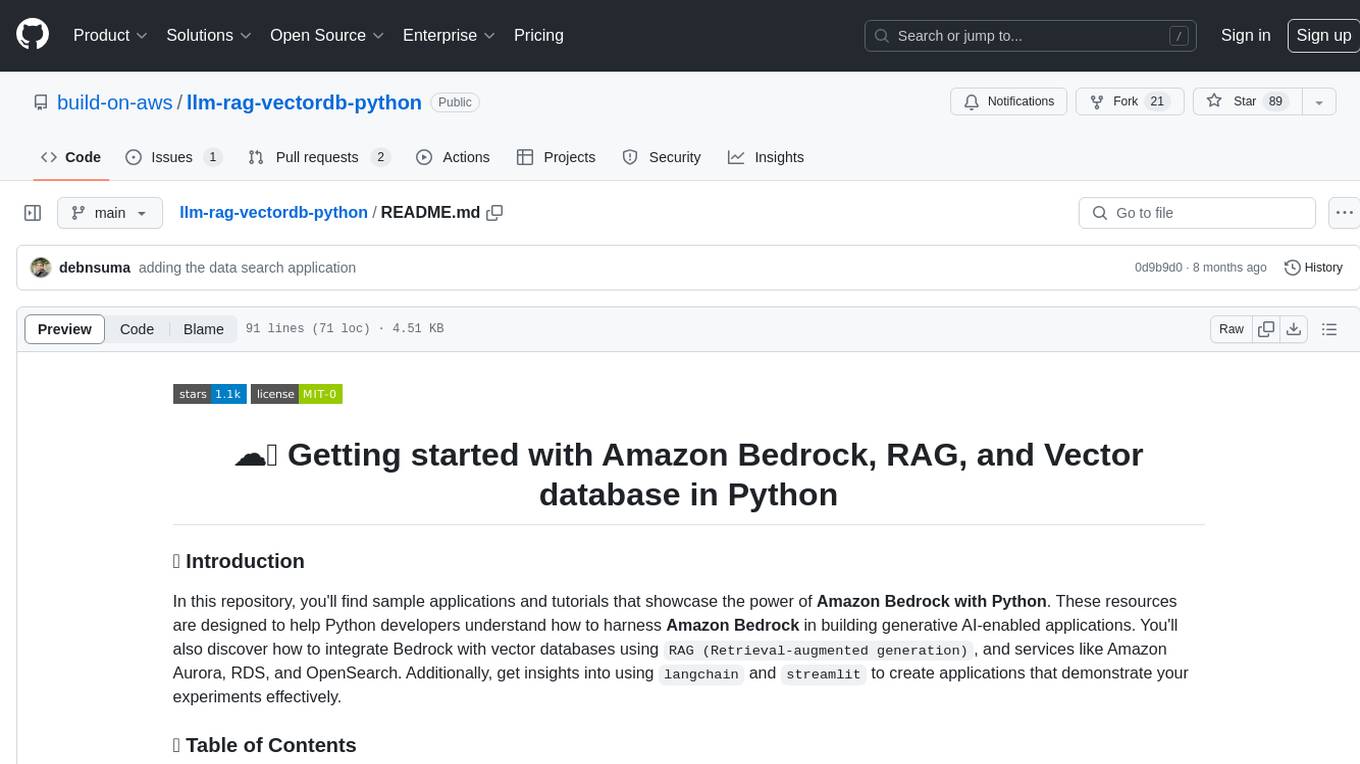
llm-rag-vectordb-python
This repository provides sample applications and tutorials to showcase the power of Amazon Bedrock with Python. It helps Python developers understand how to harness Amazon Bedrock in building generative AI-enabled applications. The resources also demonstrate integration with vector databases using RAG (Retrieval-augmented generation) and services like Amazon Aurora, RDS, and OpenSearch. Additionally, it explores using langchain and streamlit to create effective experimental applications.
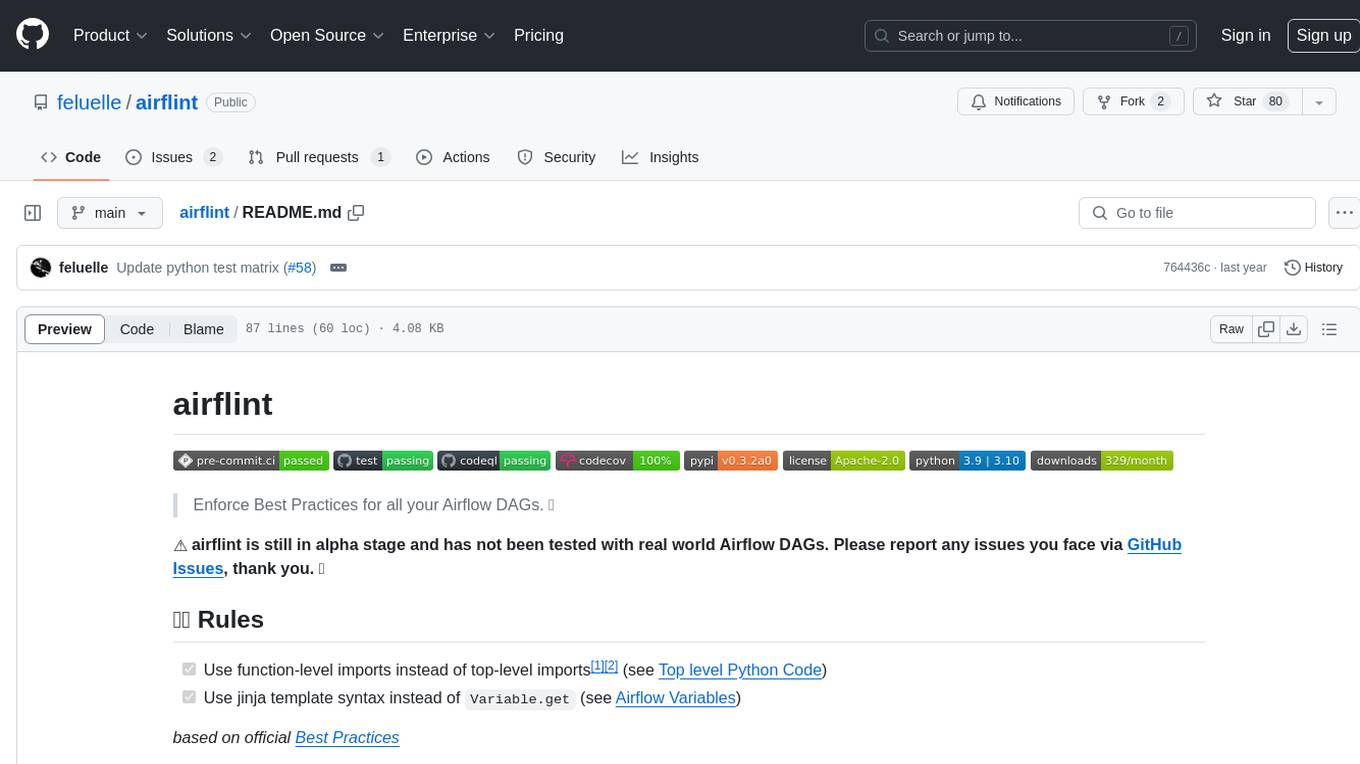
airflint
Airflint is a tool designed to enforce best practices for all your Airflow Directed Acyclic Graphs (DAGs). It is currently in the alpha stage and aims to help users adhere to recommended practices when working with Airflow. Users can install Airflint from PyPI and integrate it into their existing Airflow environment to improve DAG quality. The tool provides rules for function-level imports and jinja template syntax usage, among others, to enhance the development process of Airflow DAGs.
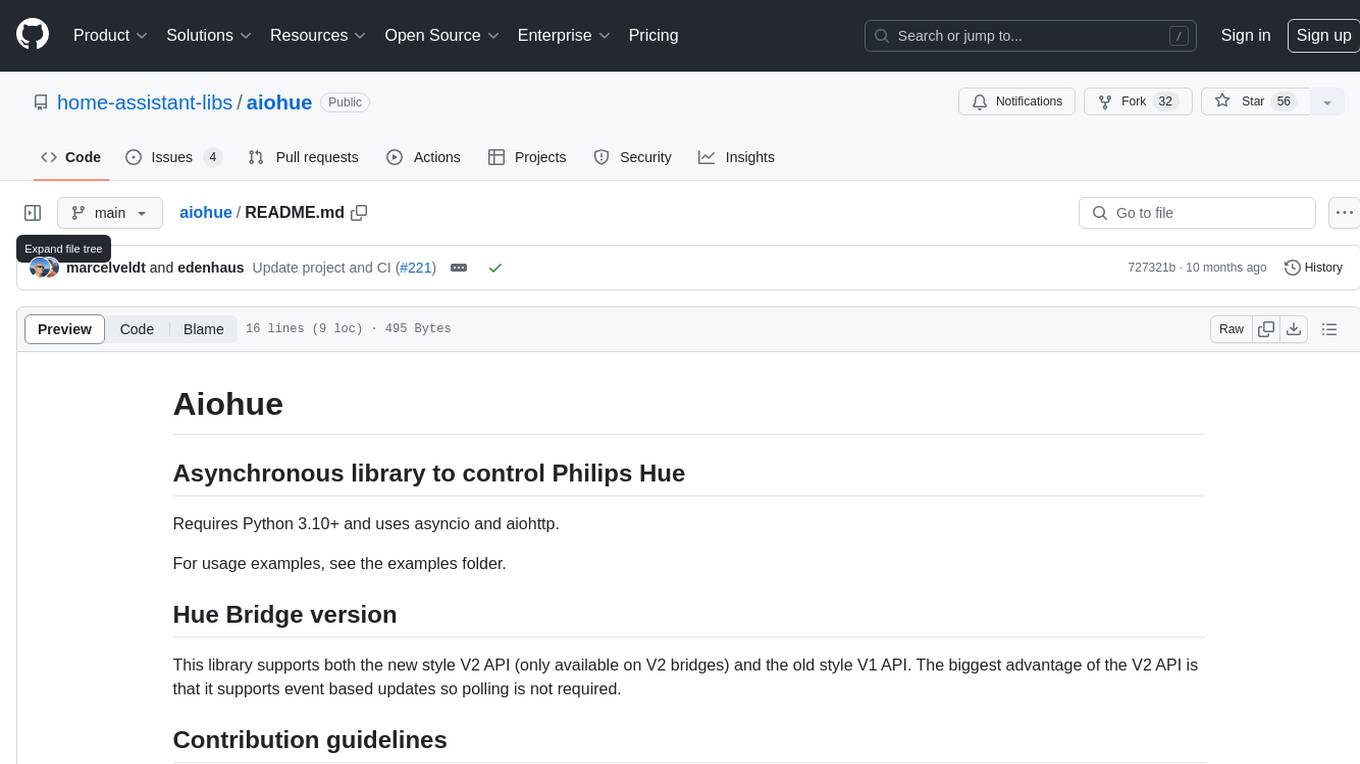
aiohue
Aiohue is an asynchronous library designed to control Philips Hue lights. It requires Python 3.10+ and utilizes asyncio and aiohttp. The library supports both V1 and V2 APIs of the Hue Bridge, with V2 API offering event-based updates to eliminate the need for polling. The contribution guidelines emphasize matching object hierarchy and property/method names with the Philips Hue API.
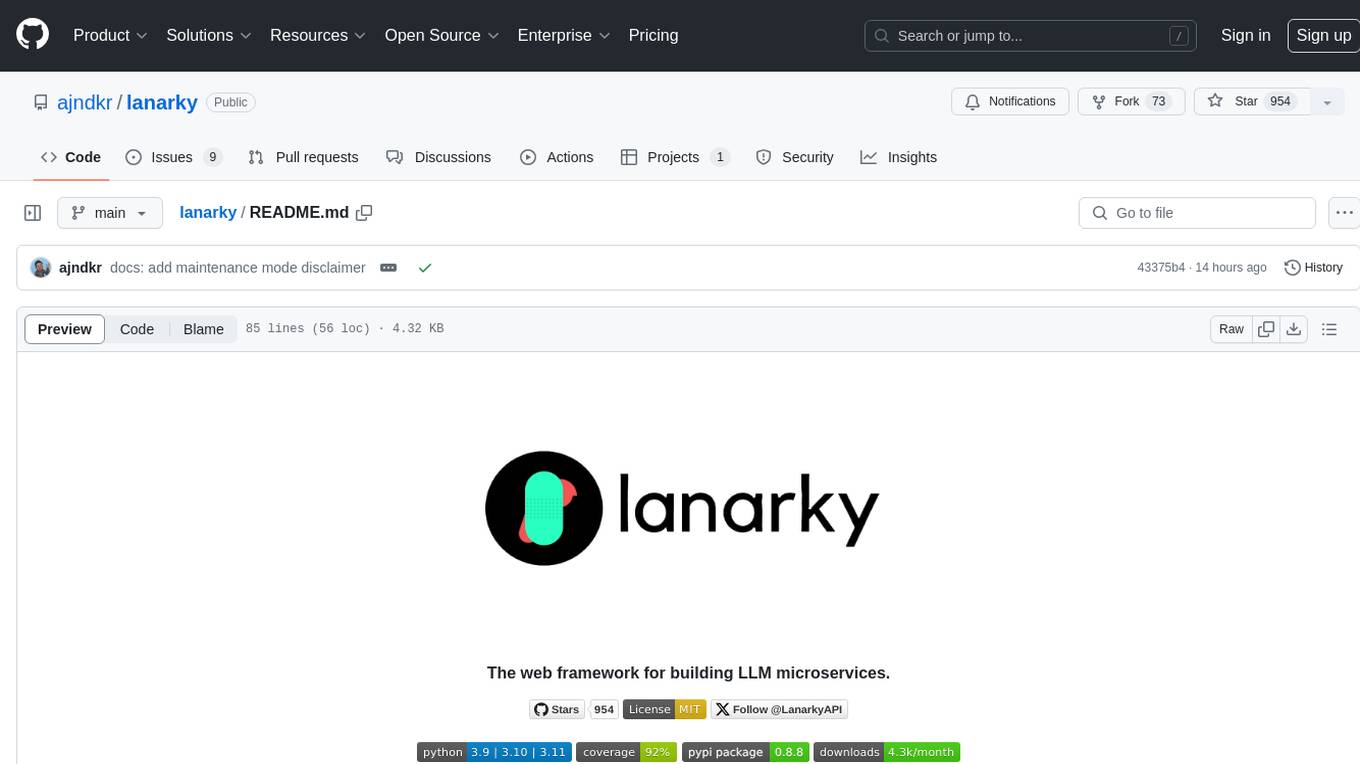
lanarky
Lanarky is a Python web framework designed for building microservices using Large Language Models (LLMs). It is LLM-first, fast, modern, supports streaming over HTTP and WebSockets, and is open-source. The framework provides an abstraction layer for developers to easily create LLM microservices. Lanarky guarantees zero vendor lock-in and is free to use. It is built on top of FastAPI and offers features familiar to FastAPI users. The project is now in maintenance mode, with no active development planned, but community contributions are encouraged.
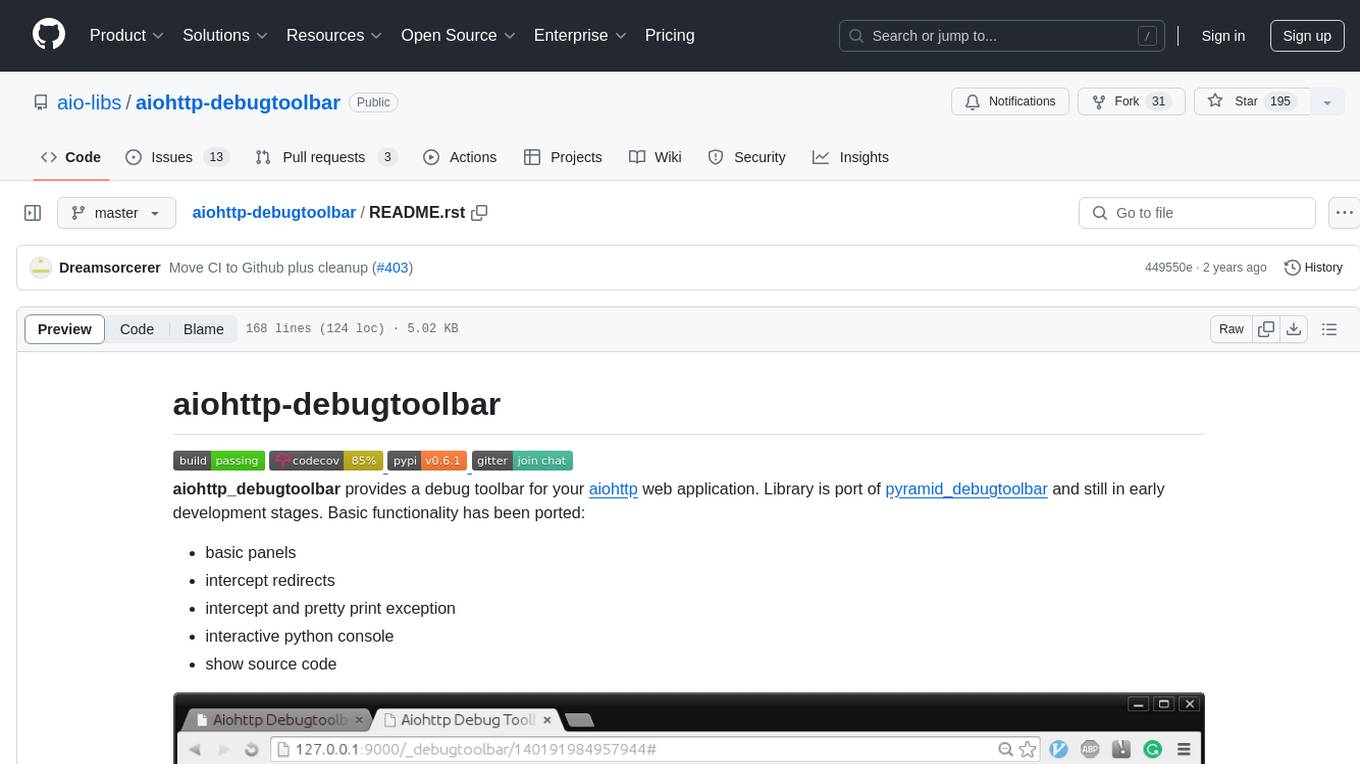
aiohttp-debugtoolbar
aiohttp_debugtoolbar provides a debug toolbar for aiohttp web applications. It is a port of pyramid_debugtoolbar and offers basic functionality such as basic panels, intercepting redirects, pretty printing exceptions, an interactive python console, and showing source code. The library is still in early development stages and offers various debug panels for monitoring different aspects of the web application. It is a useful tool for developers working with aiohttp to debug and optimize their applications.
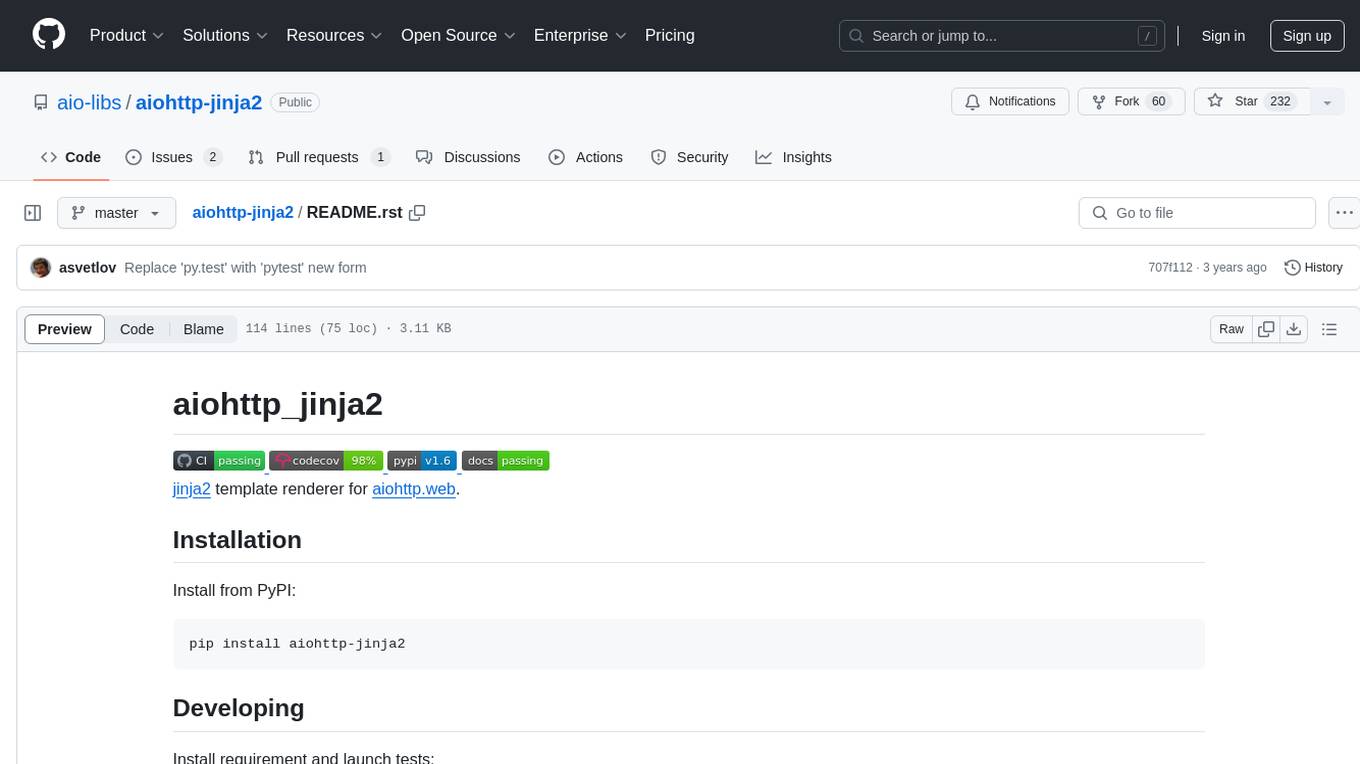
aiohttp-jinja2
aiohttp_jinja2 is a Jinja2 template renderer for aiohttp.web, allowing users to render templates in web applications built with aiohttp. It provides a convenient way to set up Jinja2 environment, use template engine in web handlers, and perform complex processing like setting response headers. The tool simplifies the process of rendering HTML text based on templates and passing context data to templates for dynamic content generation.
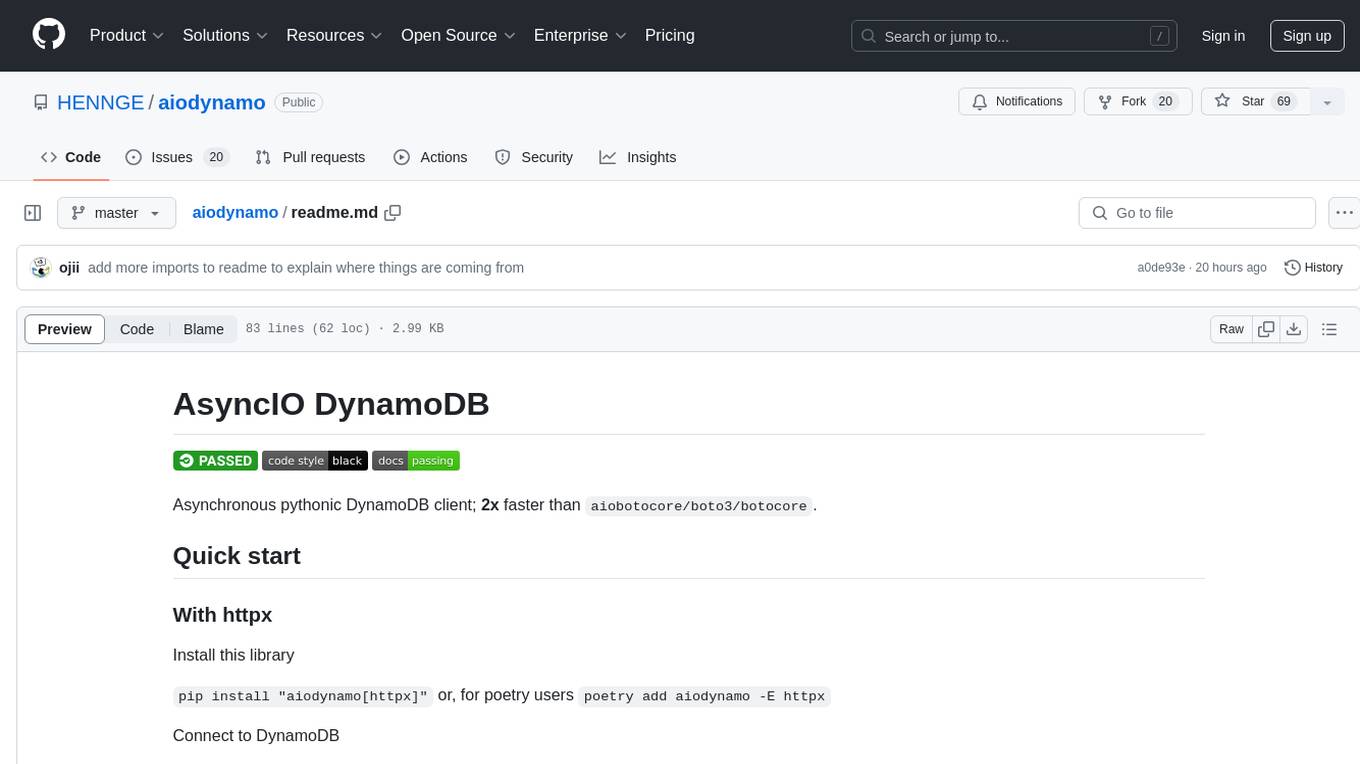
aiodynamo
AsyncIO DynamoDB is an asynchronous pythonic client for DynamoDB, designed for asynchronous apps. It is two times faster than aiobotocore, botocore, or boto3 for operations like query or scan. The library provides a pythonic API with modern Python features, automatically depaginates paginated APIs using asynchronous iterators. The source code is legible and hand-written, allowing for easy inspection and understanding. It offers a pluggable HTTP client, enabling integration with existing asynchronous HTTP clients without additional dependencies or dependency resolution issues.
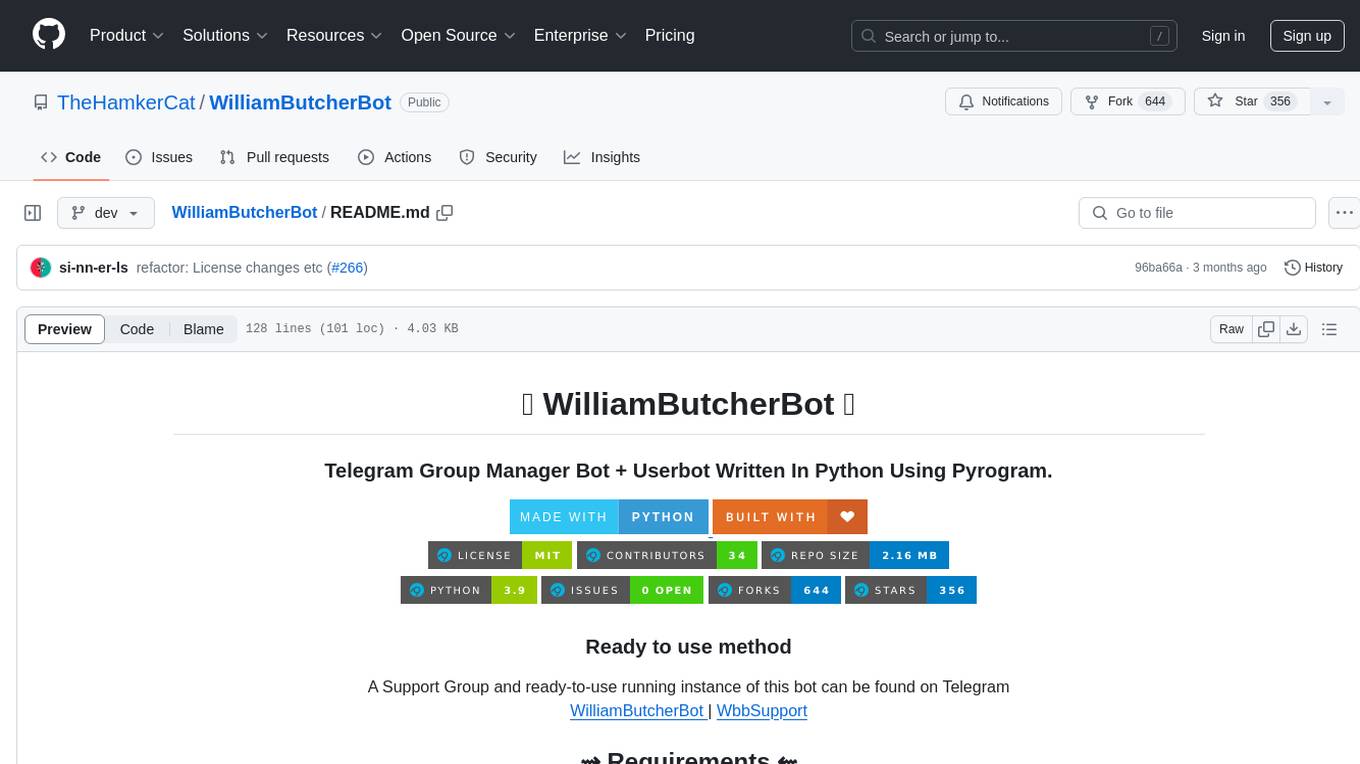
WilliamButcherBot
WilliamButcherBot is a Telegram Group Manager Bot and Userbot written in Python using Pyrogram. It provides features for managing Telegram groups and users, with ready-to-use methods available. The bot requires Python 3.9, Telegram API Key, Telegram Bot Token, and MongoDB URI. Users can install it locally or on a VPS, run it directly, generate Pyrogram session for Heroku, or use Docker for deployment. Additionally, users can write new modules to extend the bot's functionality by adding them to the wbb/modules/ directory.
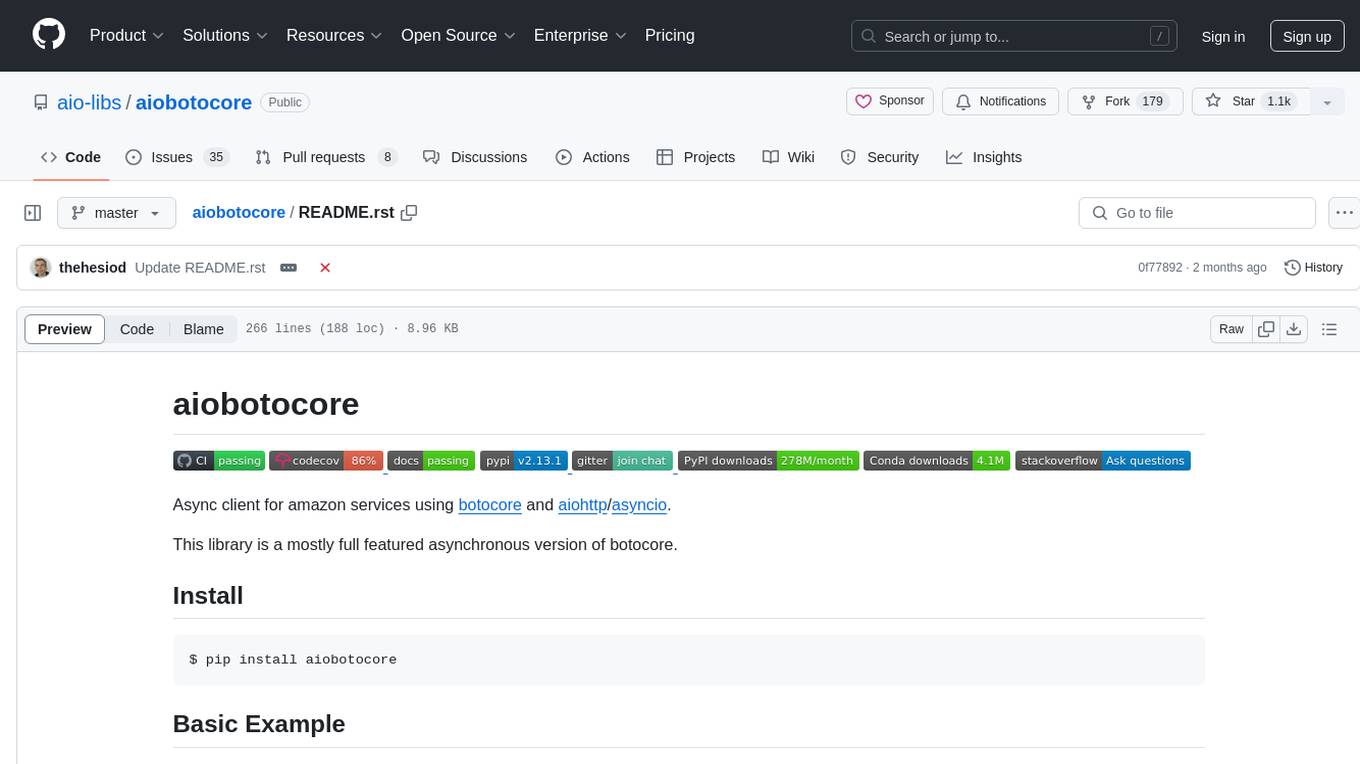
aiobotocore
aiobotocore is an async client for Amazon services using botocore and aiohttp/asyncio. It provides a mostly full-featured asynchronous version of botocore, allowing users to interact with various AWS services asynchronously. The library supports operations such as uploading objects to S3, getting object properties, listing objects, and deleting objects. It also offers context manager examples for managing resources efficiently. aiobotocore supports multiple AWS services like S3, DynamoDB, SNS, SQS, CloudFormation, and Kinesis, with basic methods tested for each service. Users can run tests using moto for mocked tests or against personal Amazon keys. Additionally, the tool enables type checking and code completion for better development experience.
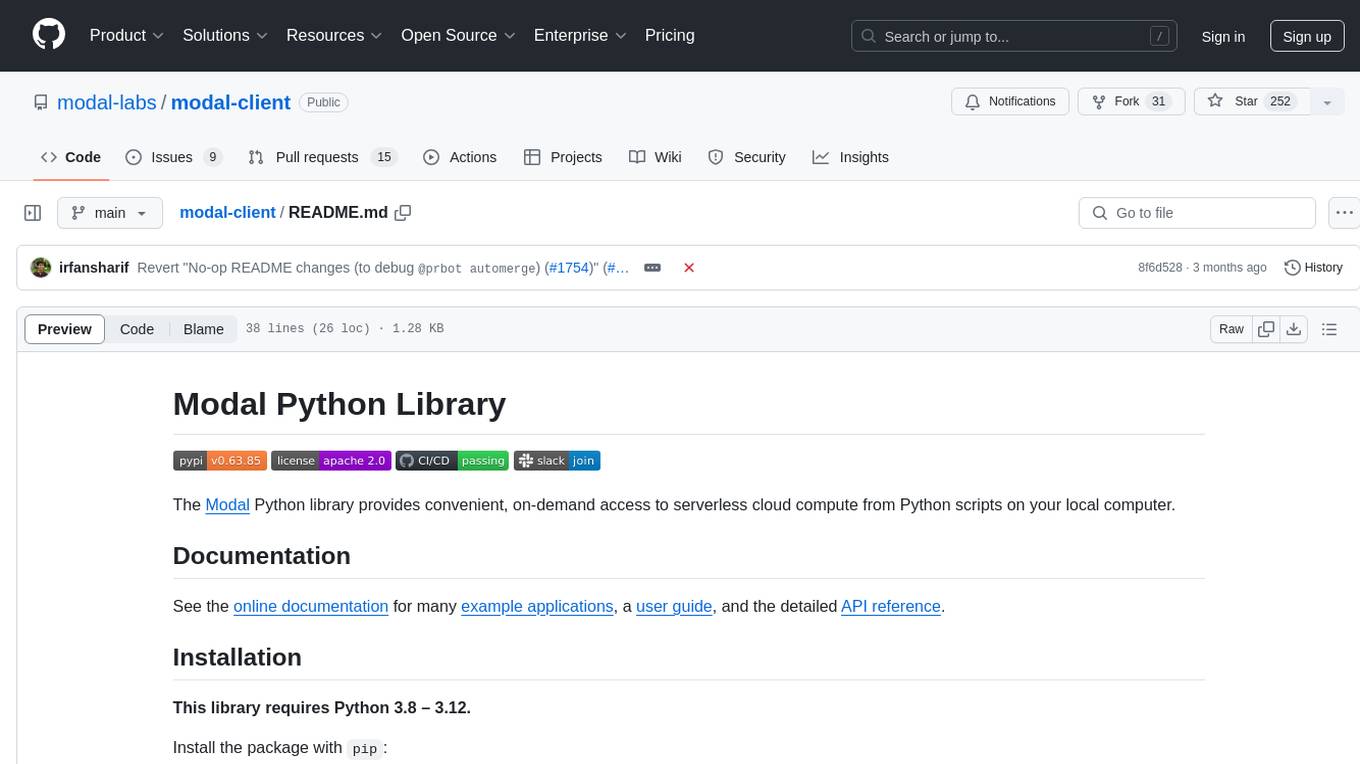
modal-client
The Modal Python library provides convenient, on-demand access to serverless cloud compute from Python scripts on your local computer. It allows users to easily integrate serverless cloud computing into their Python scripts, providing a seamless experience for accessing cloud resources. The library simplifies the process of interacting with cloud services, enabling developers to focus on their applications' logic rather than infrastructure management. With detailed documentation and support available through the Modal Slack channel, users can quickly get started and leverage the power of serverless computing in their projects.
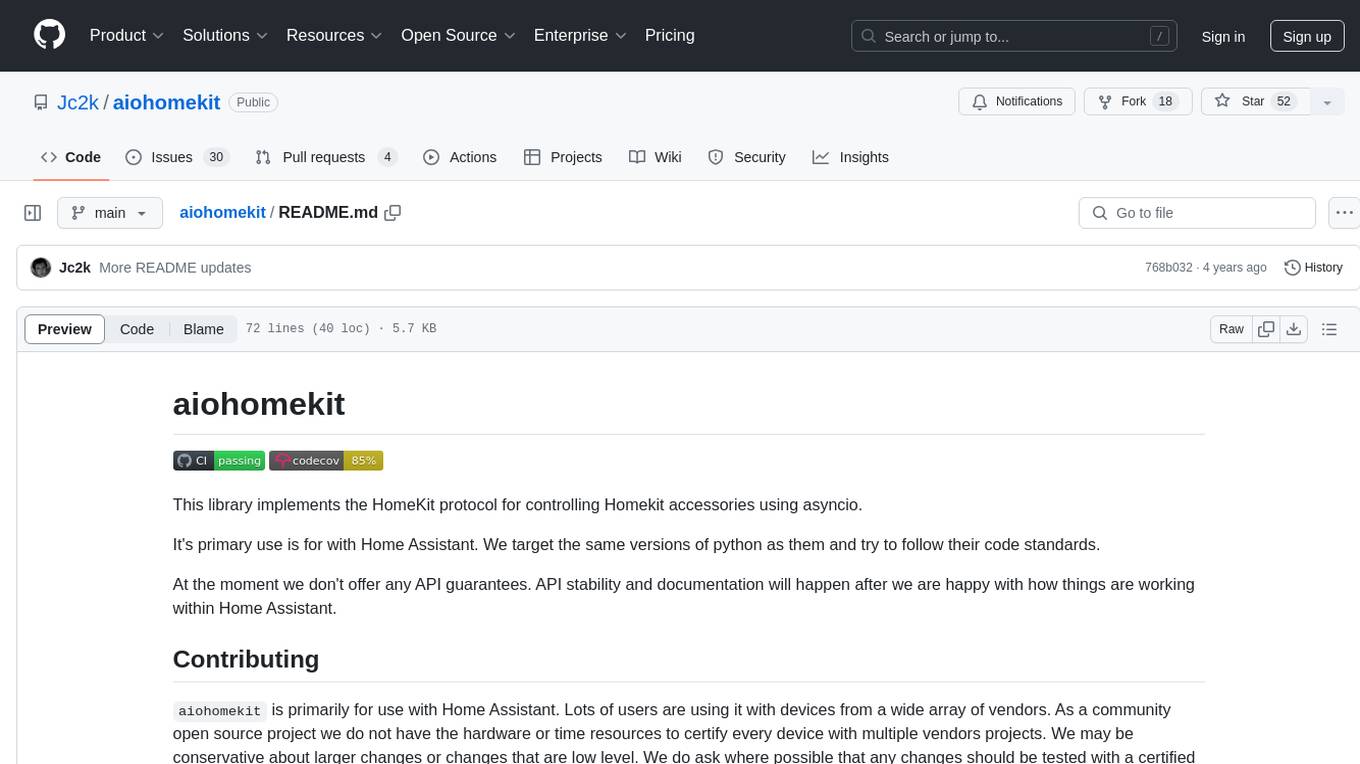
aiohomekit
aiohomekit is a Python library that implements the HomeKit protocol for controlling HomeKit accessories using asyncio. It is primarily used with Home Assistant, targeting the same versions of Python and following their code standards. The library is still under development and does not offer API guarantees yet. It aims to match the behavior of real HAP controllers, even when not strictly specified, and works around issues like JSON formatting, boolean encoding, header sensitivity, and TCP packet splitting. aiohomekit is primarily tested with Phillips Hue and Eve Extend bridges via Home Assistant, but is known to work with many more devices. It does not support BLE accessories and is intended for client-side use only.
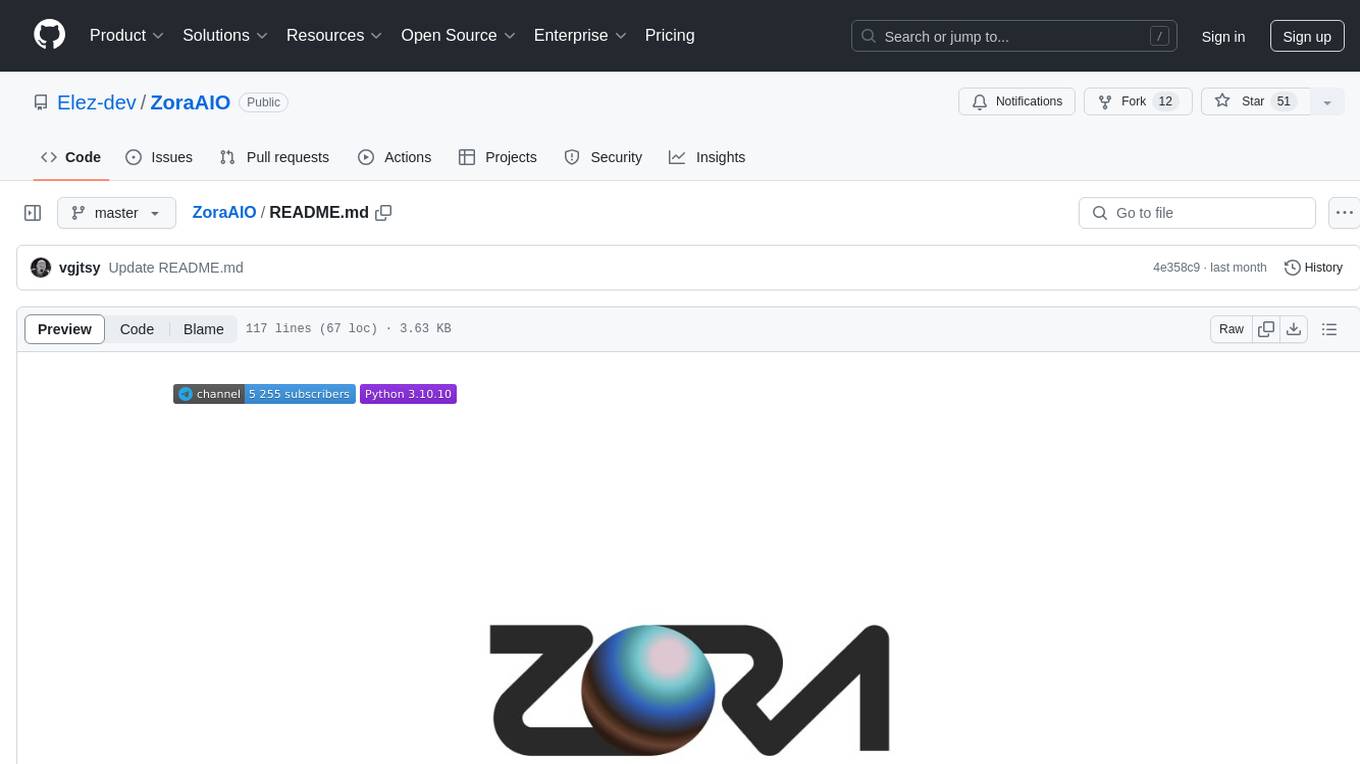
ZoraAIO
ZORA AIO is a software tool designed for interacting with the ZORA.CO ecosystem, offering extensive customization options, a wide range of contracts, and user-friendly settings. Users can perform various tasks related to NFT minting, bridging, gas management, token transactions, and more. The tool requires Python 3.10.10 for operation and provides detailed guidance on installation and usage. It includes features such as official and instant bridges, minting NFTs on different networks, creating ERC1155 contracts, updating NFT metadata, and more. Users can configure private keys and proxies in the _data_ folder and adjust settings in the _settings.py_ file. ZORA AIO is suitable for users looking to streamline their interactions within the ZORA.CO ecosystem.
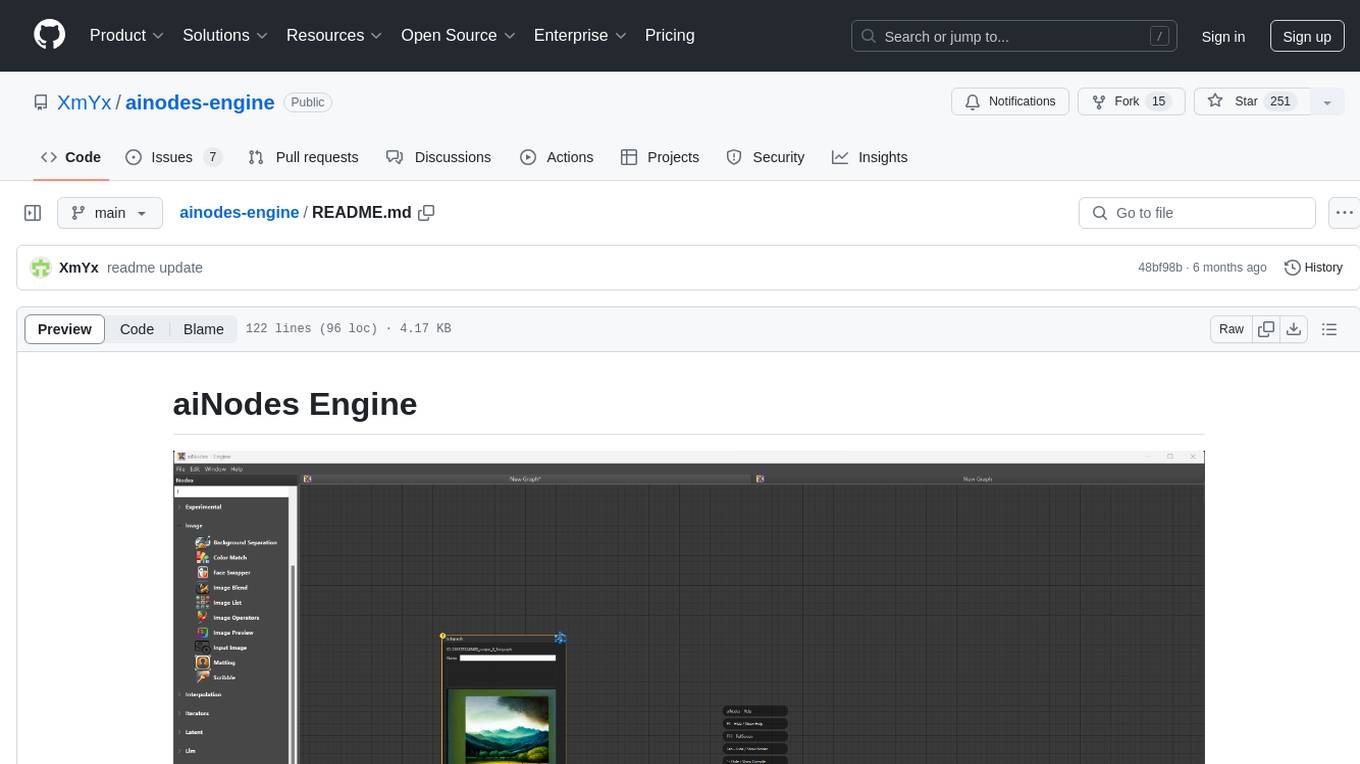
ainodes-engine
aiNodes Engine is a Python-based AI image/motion picture generator node engine with a live execution chain, python code editor node, and plug-in support. It offers full modularity, colored background drop, and easy node creation with IDE annotations. The project is officially supported by Deforum and incorporates various open-source projects like ComfyUI. It is designed to be flexible, with an Unreal-like execution chain, supporting features such as Deforum, Stable Diffusion, Upscalers, Kandinsky, ControlNet, and more. The engine allows for background separation, human matting/masking, compositing, drag and drop, subgraphs, and graph saving/loading from image metadata. It aims to provide a unique, controllable manner of working with a strict user-declared execution chain.
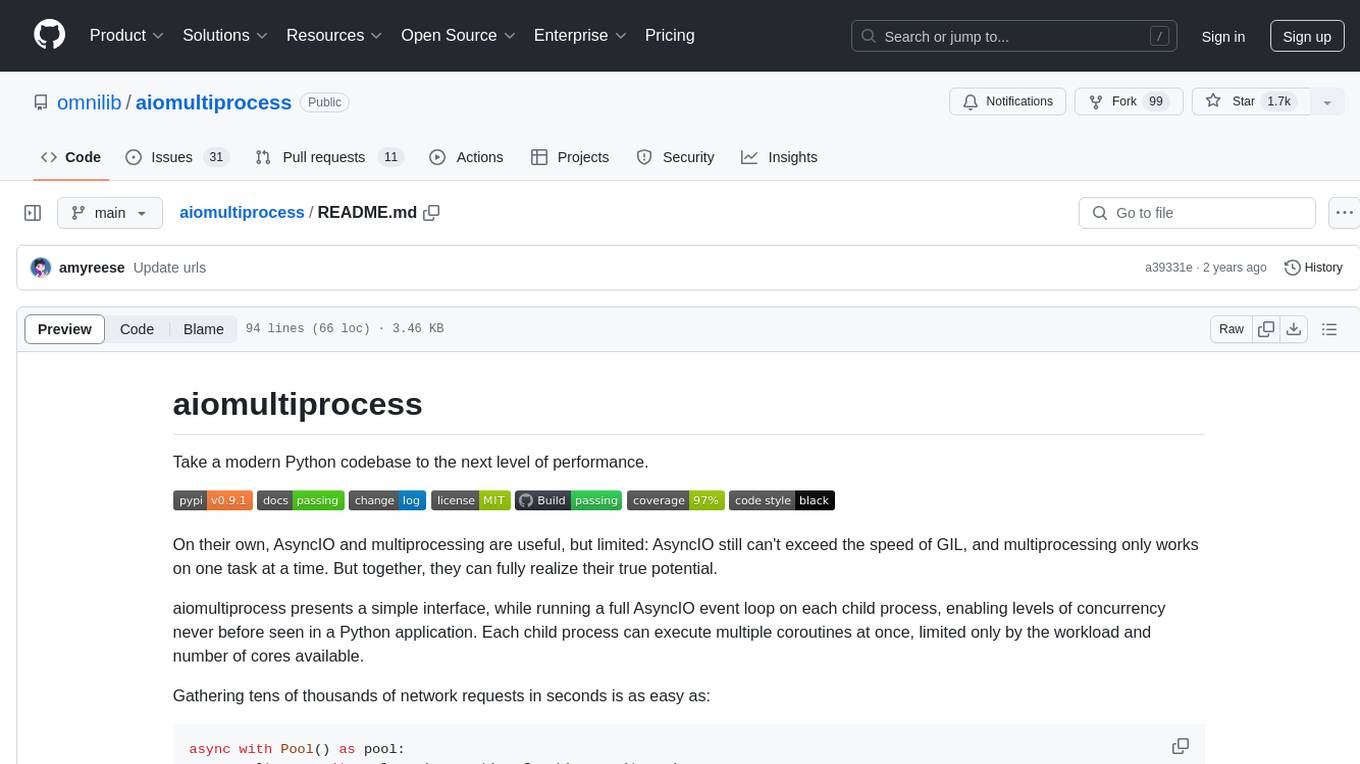
aiomultiprocess
aiomultiprocess is a Python library that combines AsyncIO and multiprocessing to achieve high levels of concurrency in Python applications. It allows running a full AsyncIO event loop on each child process, enabling multiple coroutines to execute simultaneously. The library provides a simple interface for executing asynchronous tasks on a pool of worker processes, making it easy to gather large amounts of network requests quickly. aiomultiprocess is designed to take Python codebases to the next level of performance by leveraging the combined power of AsyncIO and multiprocessing.
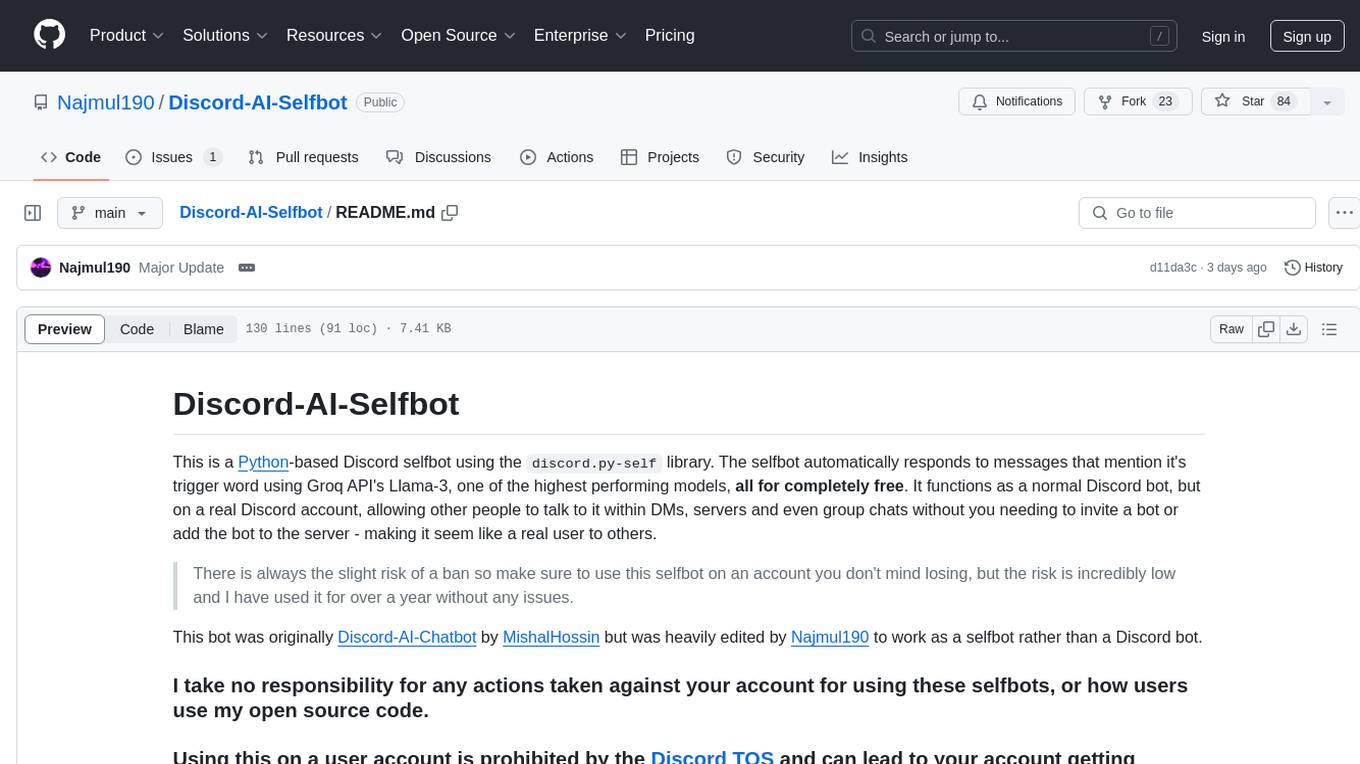
Discord-AI-Selfbot
Discord-AI-Selfbot is a Python-based Discord selfbot that uses the `discord.py-self` library to automatically respond to messages mentioning its trigger word using Groq API's Llama-3 model. It functions as a normal Discord bot on a real Discord account, enabling interactions in DMs, servers, and group chats without needing to invite a bot. The selfbot comes with features like custom AI instructions, free LLM model usage, mention and reply recognition, message handling, channel-specific responses, and a psychoanalysis command to analyze user messages for insights on personality.
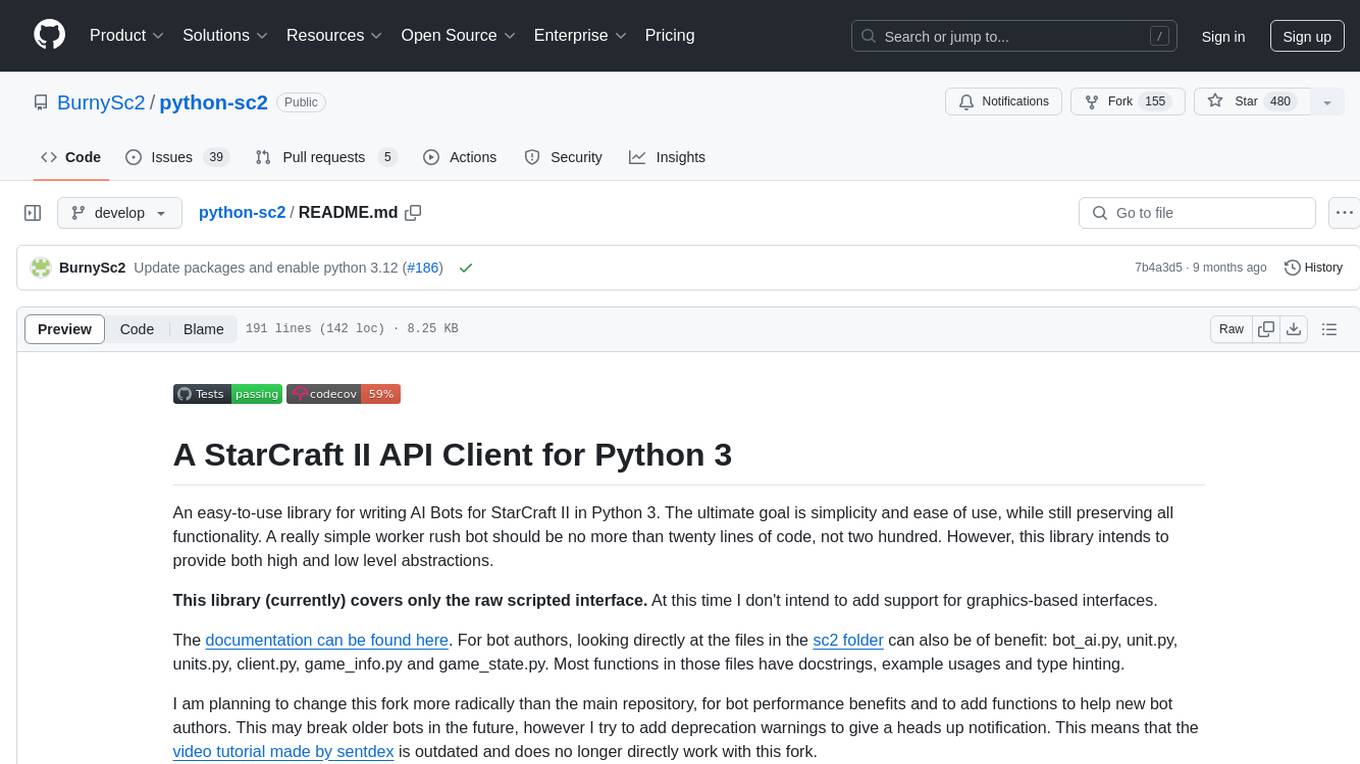
python-sc2
python-sc2 is an easy-to-use library for writing AI Bots for StarCraft II in Python 3. It aims for simplicity and ease of use while providing both high and low level abstractions. The library covers only the raw scripted interface and intends to help new bot authors with added functions. Users can install the library using pip and need a StarCraft II executable to run bots. The API configuration options allow users to customize bot behavior and performance. The community provides support through Discord servers, and users can contribute to the project by creating new issues or pull requests following style guidelines.
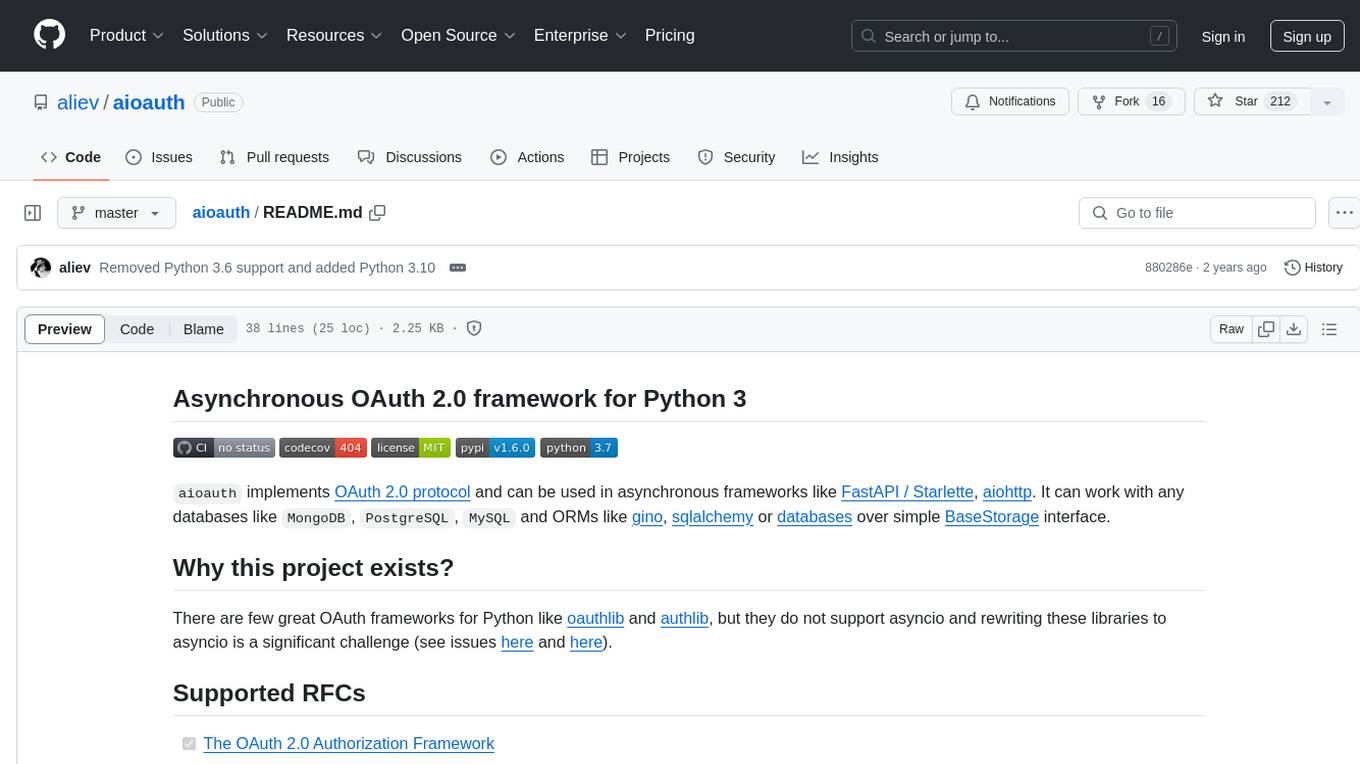
aioauth
Aioauth is an asynchronous OAuth 2.0 framework for Python 3 that implements the OAuth 2.0 protocol and can be used in asynchronous frameworks like FastAPI, Starlette, and aiohttp. It supports various databases such as MongoDB, PostgreSQL, MySQL, and ORMs like gino and sqlalchemy through a simple BaseStorage interface.
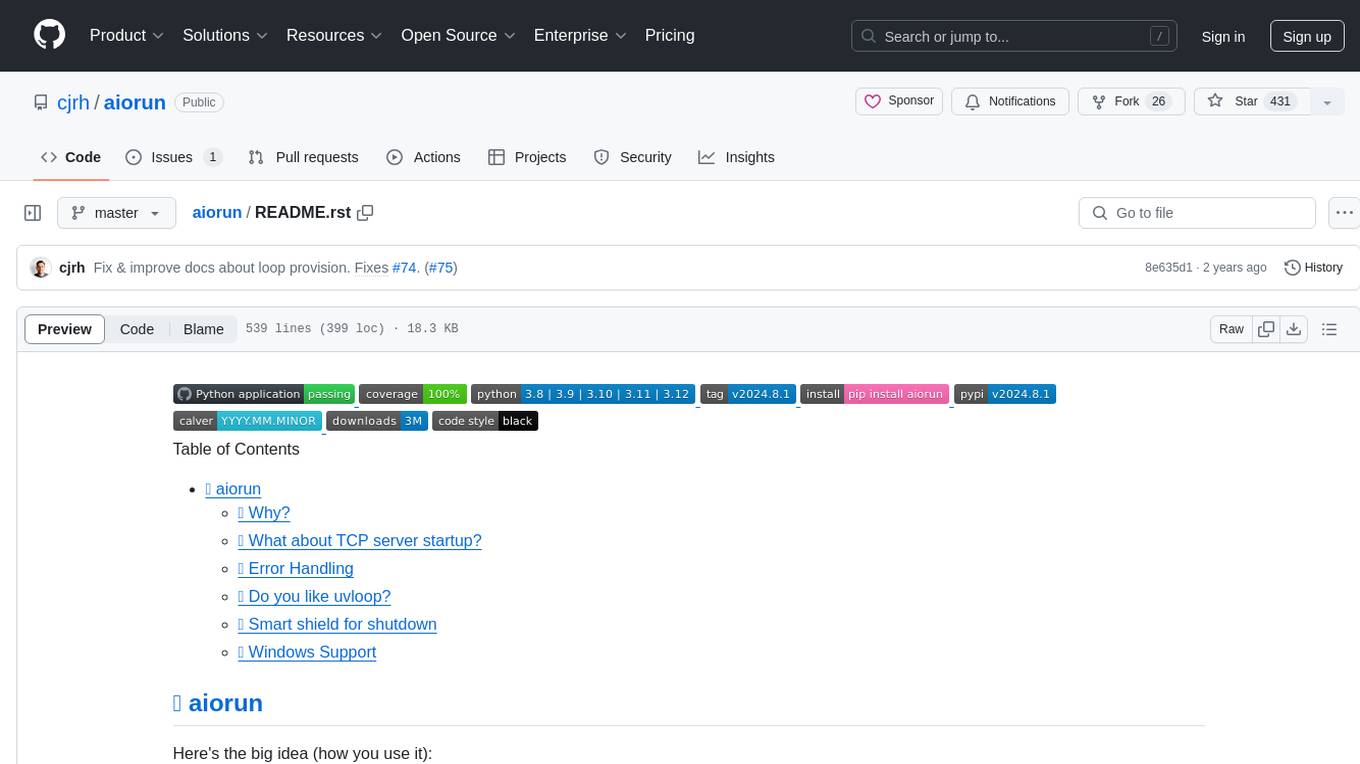
aiorun
aiorun is a Python package that provides a `run()` function as the starting point of your `asyncio`-based application. The `run()` function handles everything needed during the shutdown sequence of the application, such as creating a `Task` for the given coroutine, running the event loop, adding signal handlers for `SIGINT` and `SIGTERM`, cancelling tasks, waiting for the executor to complete shutdown, and closing the loop. It automates standard actions for asyncio apps, eliminating the need to write boilerplate code. The package also offers error handling options and tools for specific scenarios like TCP server startup and smart shield for shutdown.
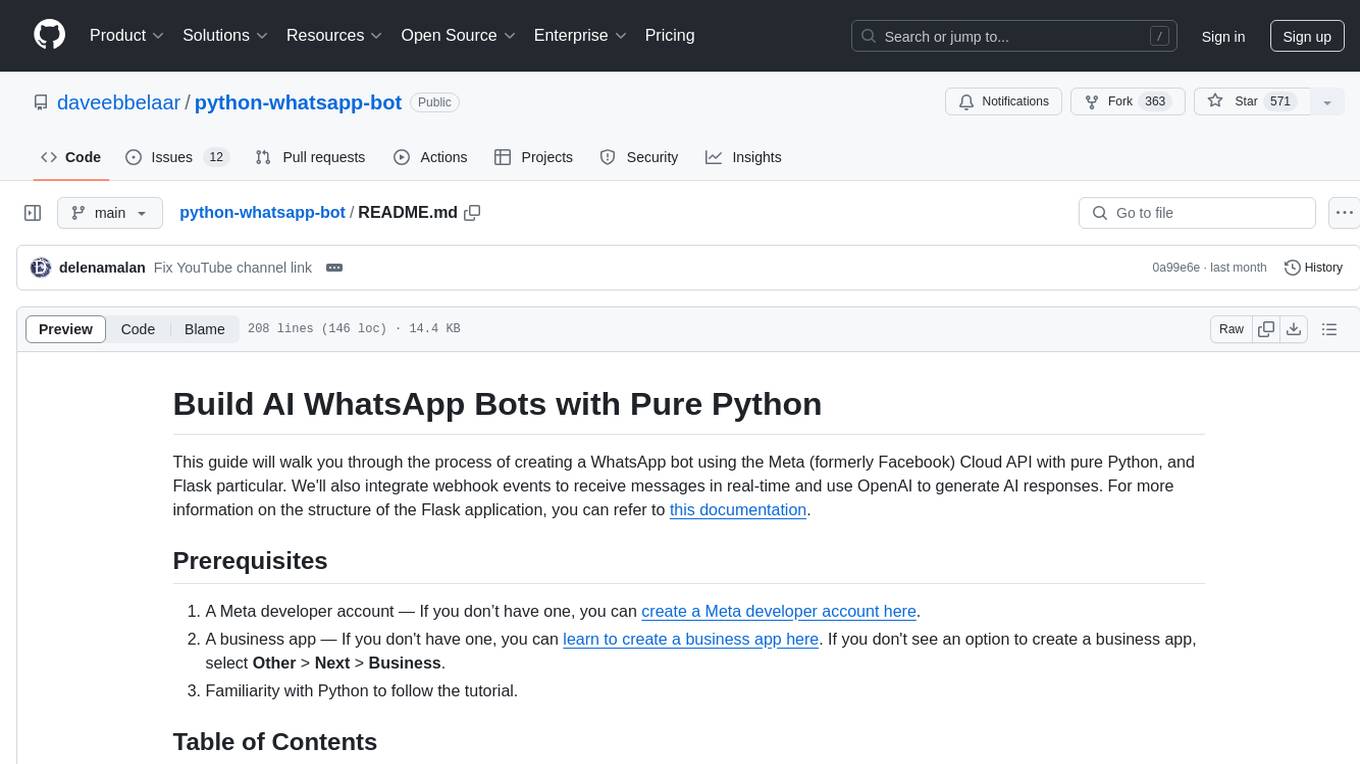
python-whatsapp-bot
This repository provides a comprehensive guide on building AI WhatsApp bots using Python and Flask. It covers setting up a Meta developer account, integrating webhook events for real-time message reception, and using OpenAI for AI responses. The tutorial includes steps for selecting phone numbers, sending messages with the API, configuring webhooks, integrating AI into the application, and adding a phone number. It also explains the process of creating a system user, obtaining access tokens, and validating verification requests and payloads for webhook security. The repository aims to help users create intelligent WhatsApp bots with Python and AI capabilities.
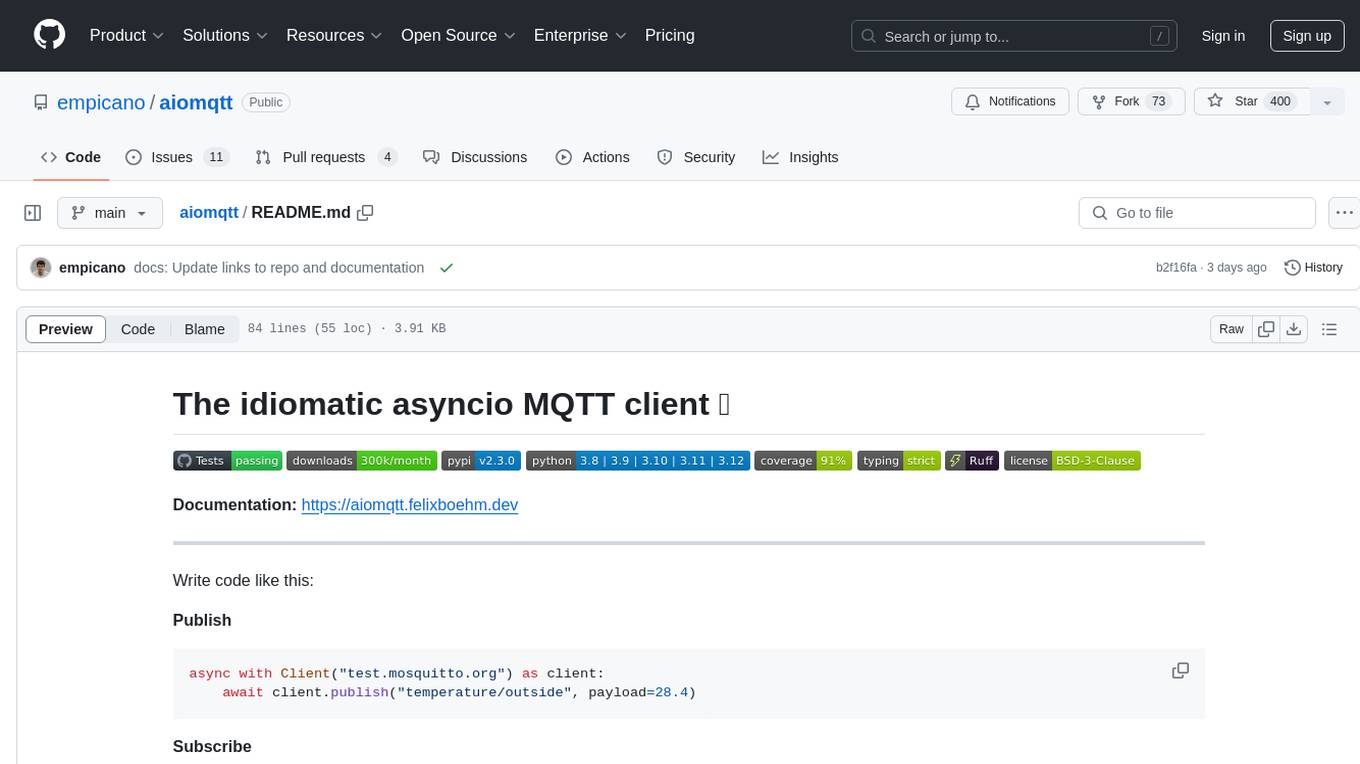
aiomqtt
aiomqtt is an idiomatic asyncio MQTT client that allows users to interact with MQTT brokers using asyncio in Python. It eliminates the need for callbacks and return codes, providing a more streamlined experience. The tool supports MQTT versions 5.0, 3.1.1, and 3.1, and offers graceful disconnection handling. It is fully type-hinted, making it easier to work with. Users can publish and subscribe to MQTT topics with ease, making it a versatile tool for MQTT communication in Python.
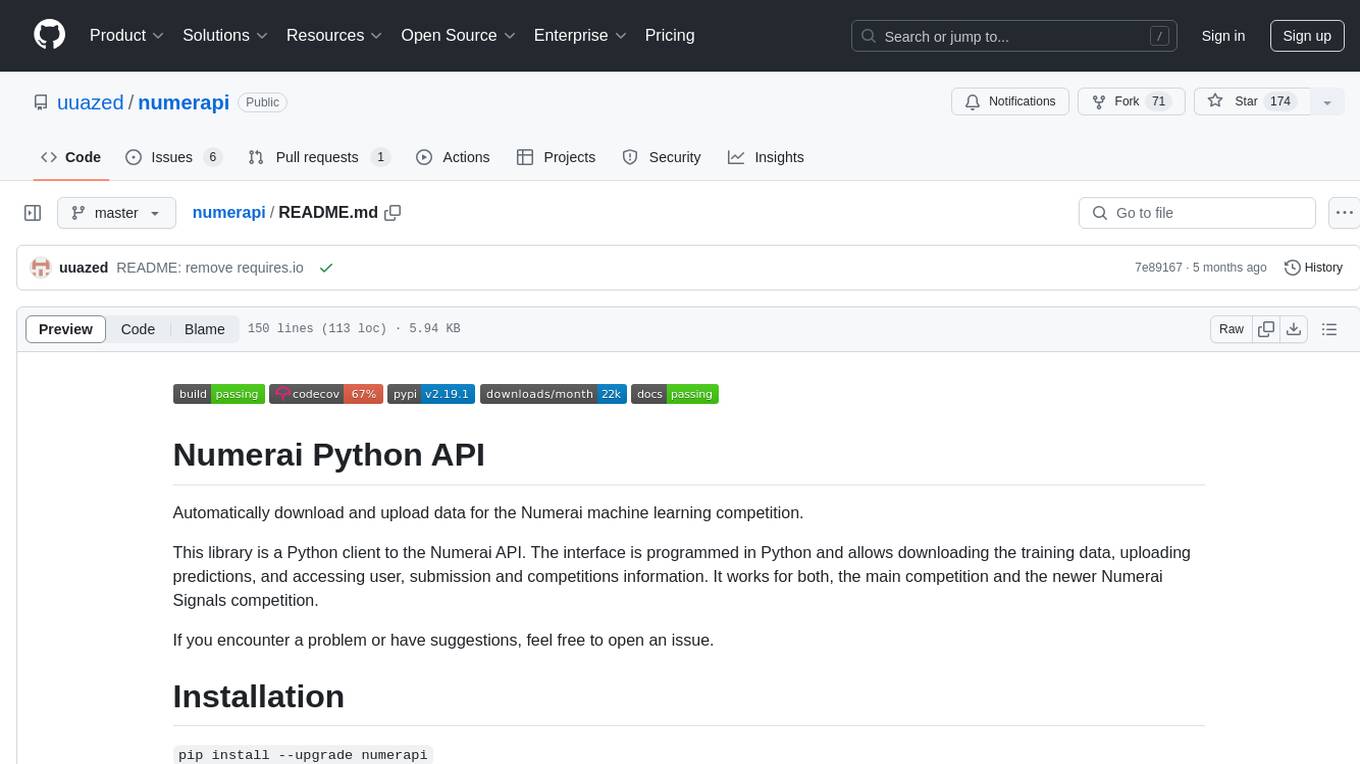
numerapi
Numerapi is a Python client to the Numerai API that allows users to automatically download and upload data for the Numerai machine learning competition. It provides functionalities for downloading training data, uploading predictions, and accessing user, submission, and competitions information for both the main competition and Numerai Signals competition. Users can interact with the API using Python modules or command line interface. Tokens are required for certain actions like uploading predictions or staking, which can be obtained from Numer.ai account settings. The tool also supports features like checking new rounds, getting leaderboards, and managing stakes.
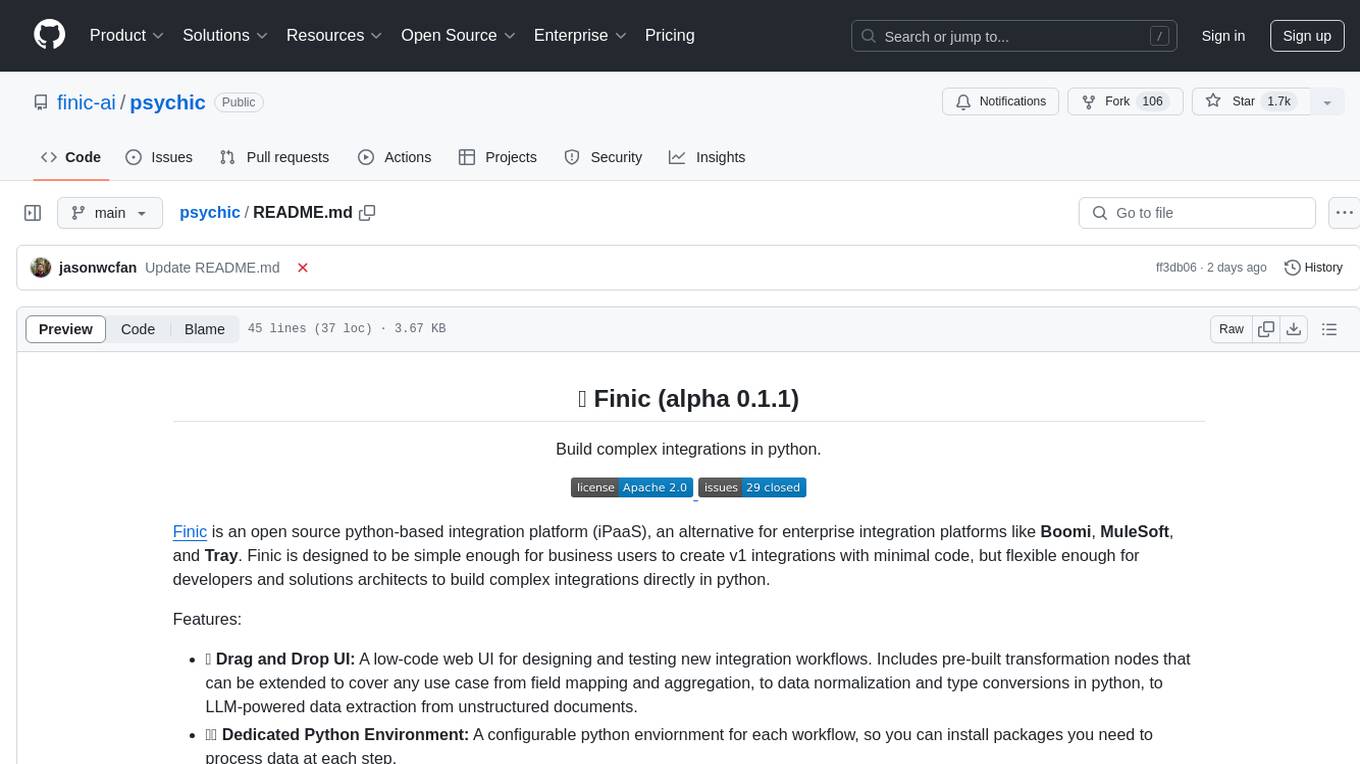
psychic
Finic is an open source python-based integration platform designed to simplify integration workflows for both business users and developers. It offers a drag-and-drop UI, a dedicated Python environment for each workflow, and generative AI features to streamline transformation tasks. With a focus on decoupling integration from product code, Finic aims to provide faster and more flexible integrations by supporting custom connectors. The tool is open source and allows deployment to users' own cloud environments with minimal legal friction.
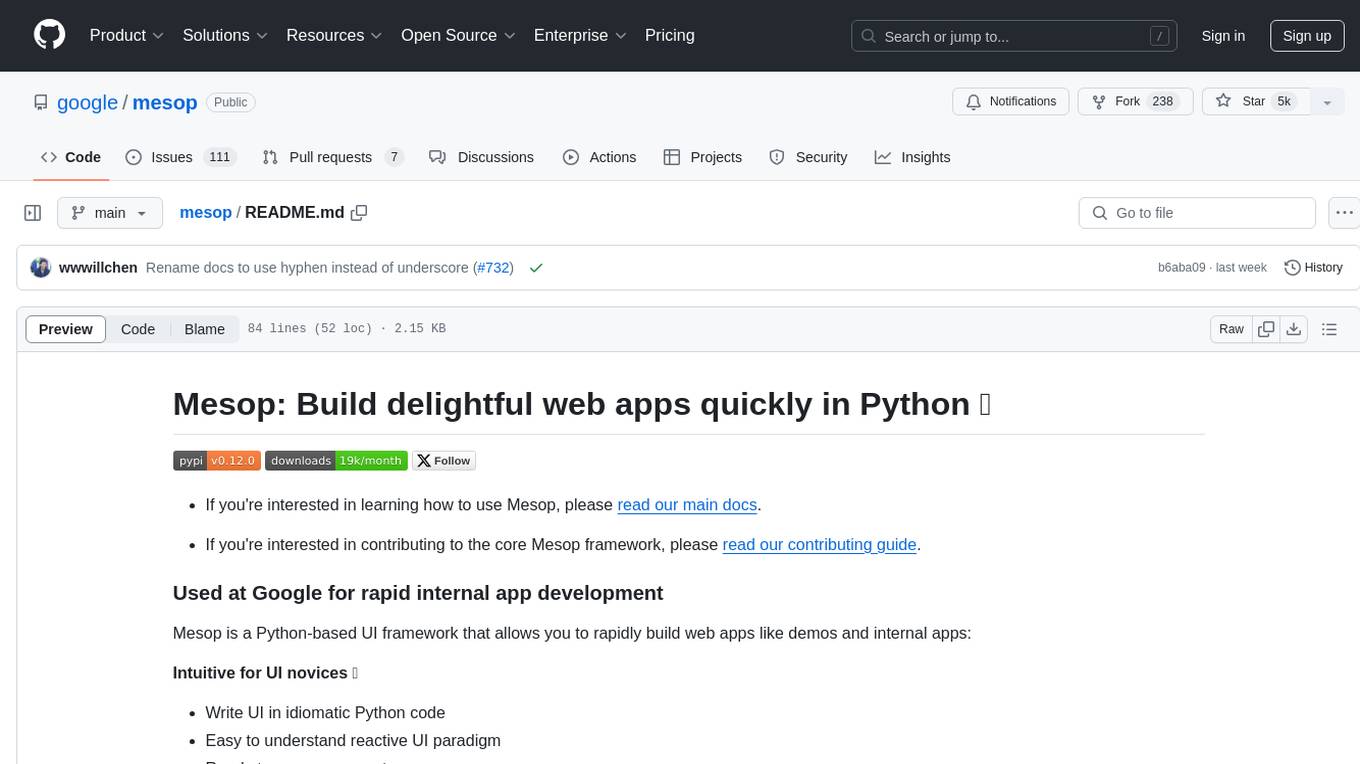
mesop
Mesop is a Python-based UI framework designed for rapid web app development, particularly for demos and internal apps. It offers an intuitive interface for UI novices, frictionless developer workflows with hot reload and IDE support, and flexibility to build custom UIs without the need for JavaScript/CSS/HTML. Mesop allows users to write UI in idiomatic Python code and compose UI into components using Python functions. It is used at Google for internal app development and provides a quick way to build delightful web apps in Python.
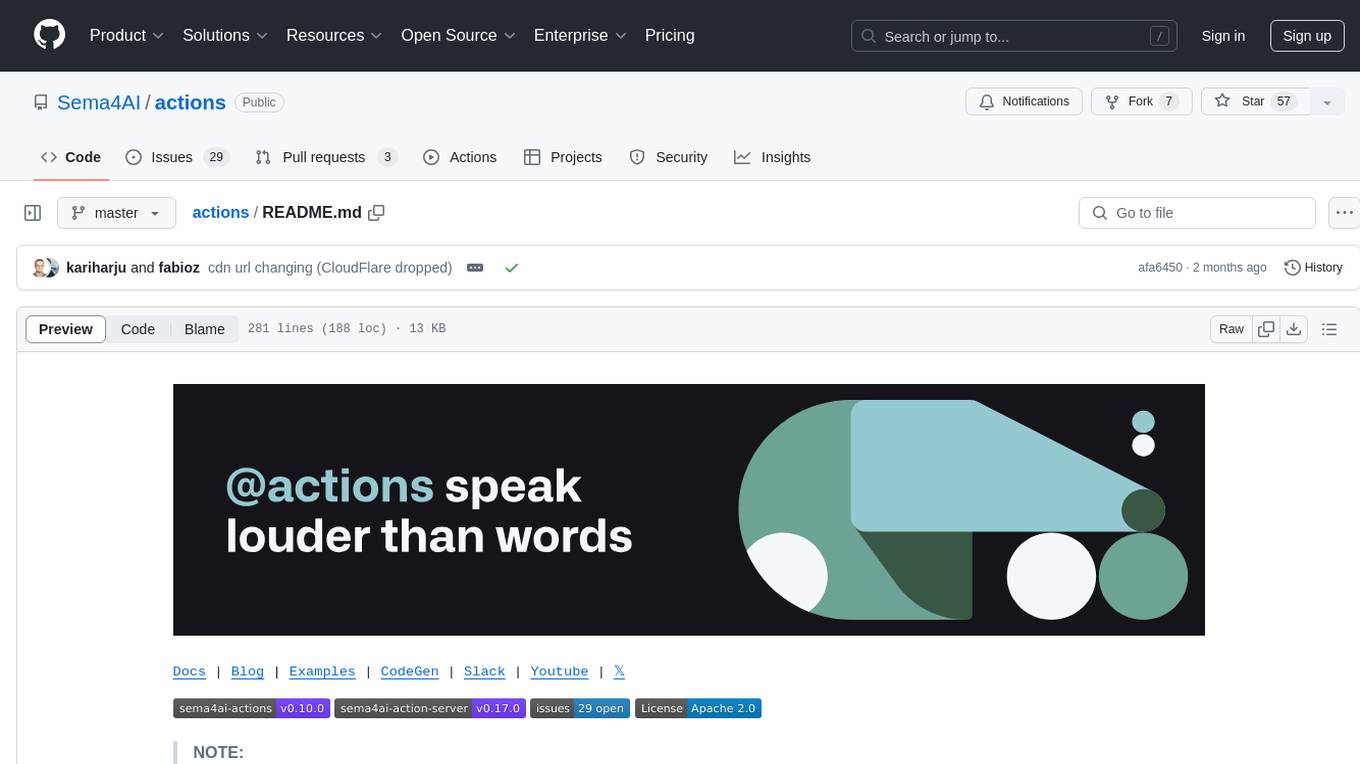
actions
Sema4.ai Action Server is a tool that allows users to build semantic actions in Python to connect AI agents with real-world applications. It enables users to create custom actions, skills, loaders, and plugins that securely connect any AI Assistant platform to data and applications. The tool automatically creates and exposes an API based on function declaration, type hints, and docstrings by adding '@action' to Python scripts. It provides an end-to-end stack supporting various connections between AI and user's apps and data, offering ease of use, security, and scalability.
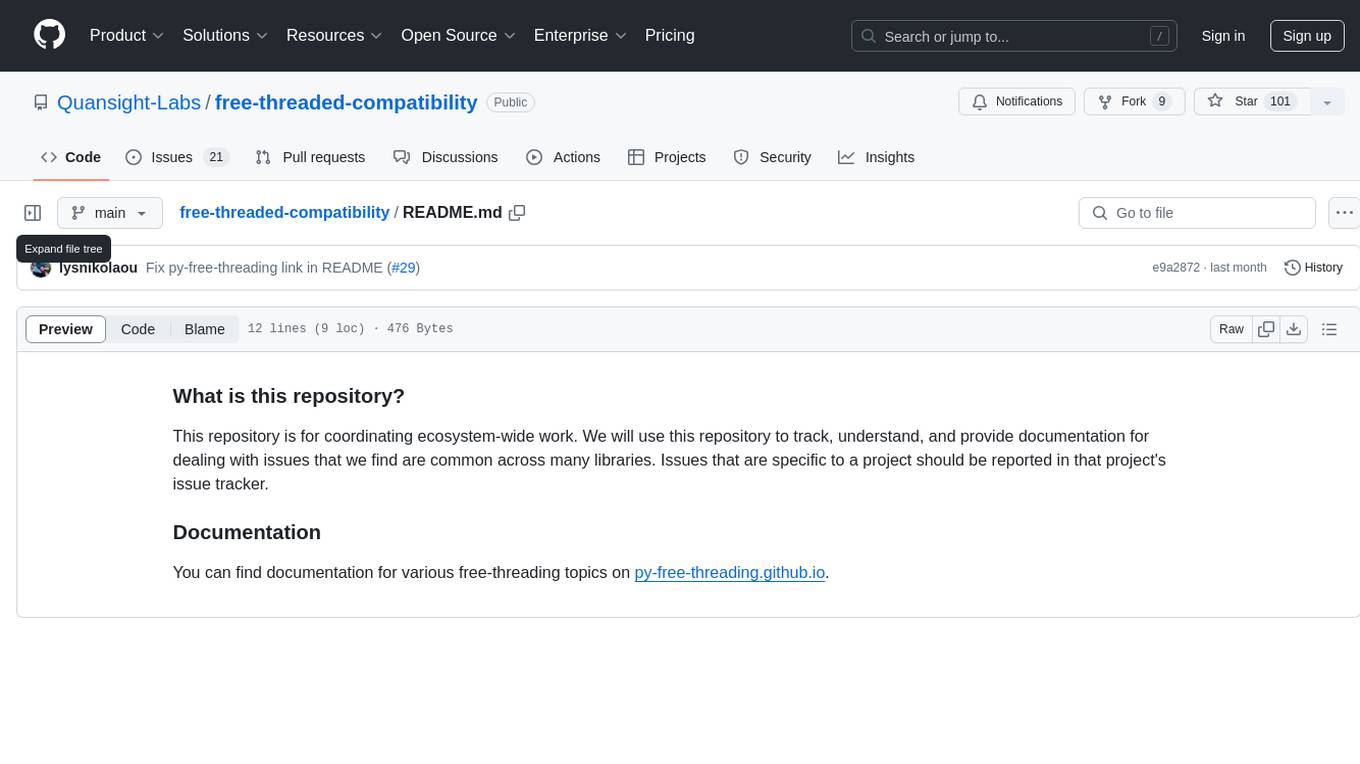
free-threaded-compatibility
This repository serves as a platform for coordinating ecosystem-wide work related to free-threading topics in Python. It aims to track, understand, and provide documentation for common issues across multiple libraries. Specific project-related issues should be reported in the respective project's issue tracker. For detailed documentation on free-threading topics, visit py-free-threading.github.io.
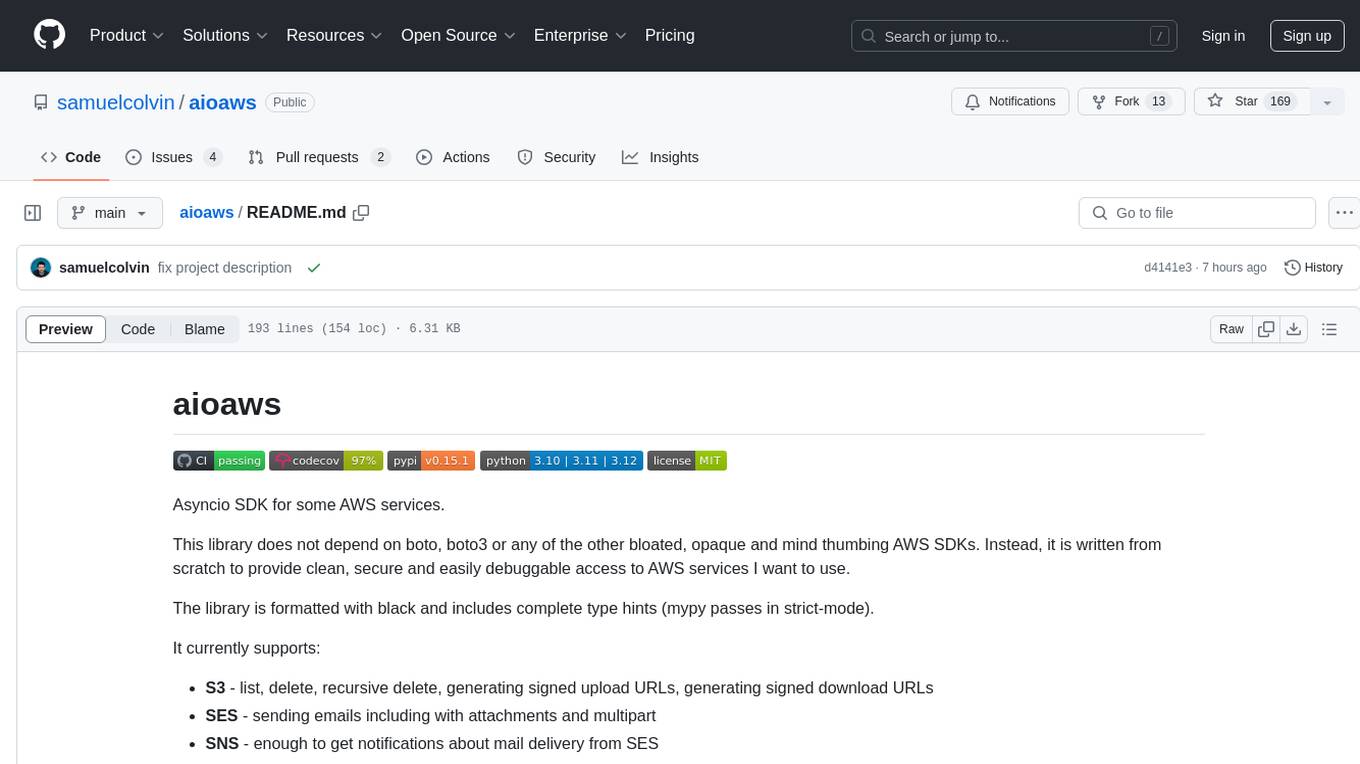
aioaws
Aioaws is an asyncio SDK for some AWS services, providing clean, secure, and easily debuggable access to services like S3, SES, and SNS. It is written from scratch without dependencies on boto or boto3, formatted with black, and includes complete type hints. The library supports various functionalities such as listing, deleting, and generating signed URLs for S3 files, sending emails with attachments and multipart content via SES, and receiving notifications about mail delivery from SES. It also offers AWS Signature Version 4 authentication and has minimal dependencies like aiofiles, cryptography, httpx, and pydantic.
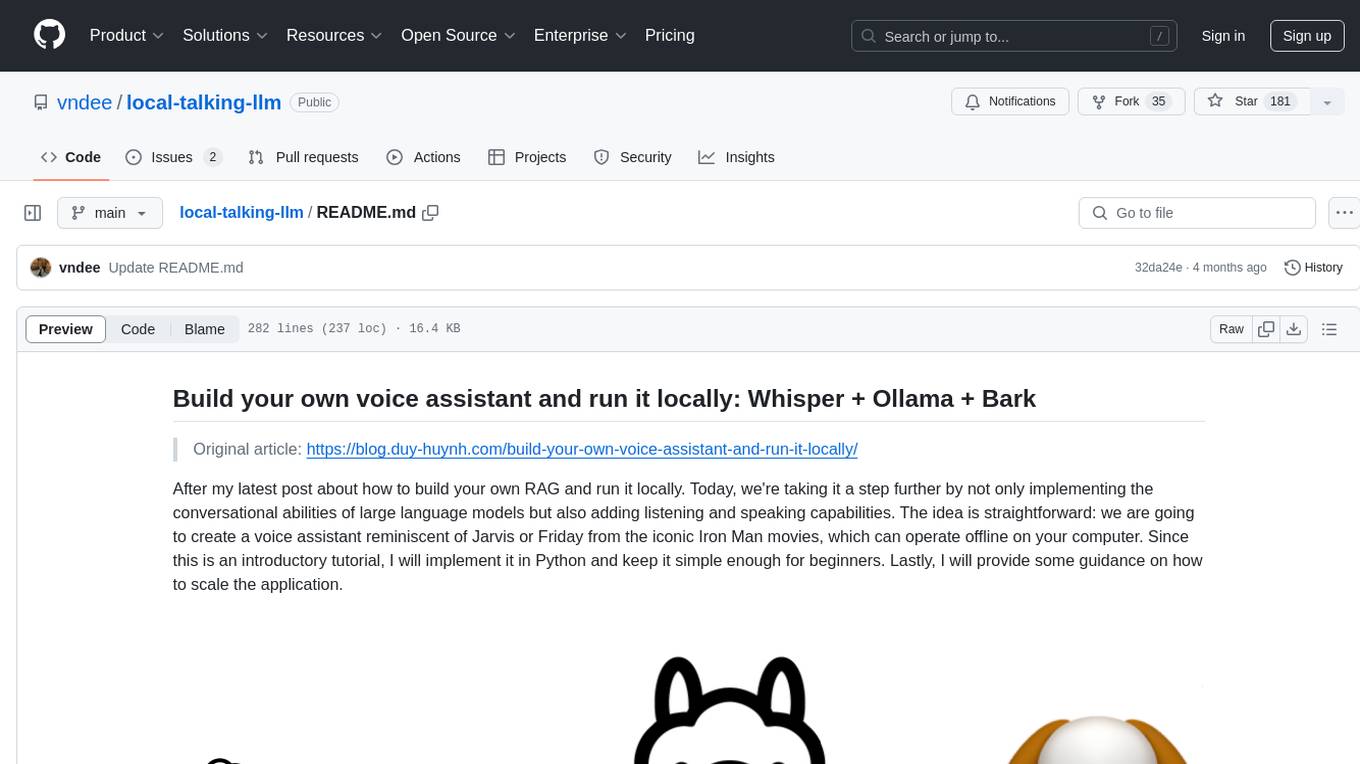
local-talking-llm
The 'local-talking-llm' repository provides a tutorial on building a voice assistant similar to Jarvis or Friday from Iron Man movies, capable of offline operation on a computer. The tutorial covers setting up a Python environment, installing necessary libraries like rich, openai-whisper, suno-bark, langchain, sounddevice, pyaudio, and speechrecognition. It utilizes Ollama for Large Language Model (LLM) serving and includes components for speech recognition, conversational chain, and speech synthesis. The implementation involves creating a TextToSpeechService class for Bark, defining functions for audio recording, transcription, LLM response generation, and audio playback. The main application loop guides users through interactive voice-based conversations with the assistant.
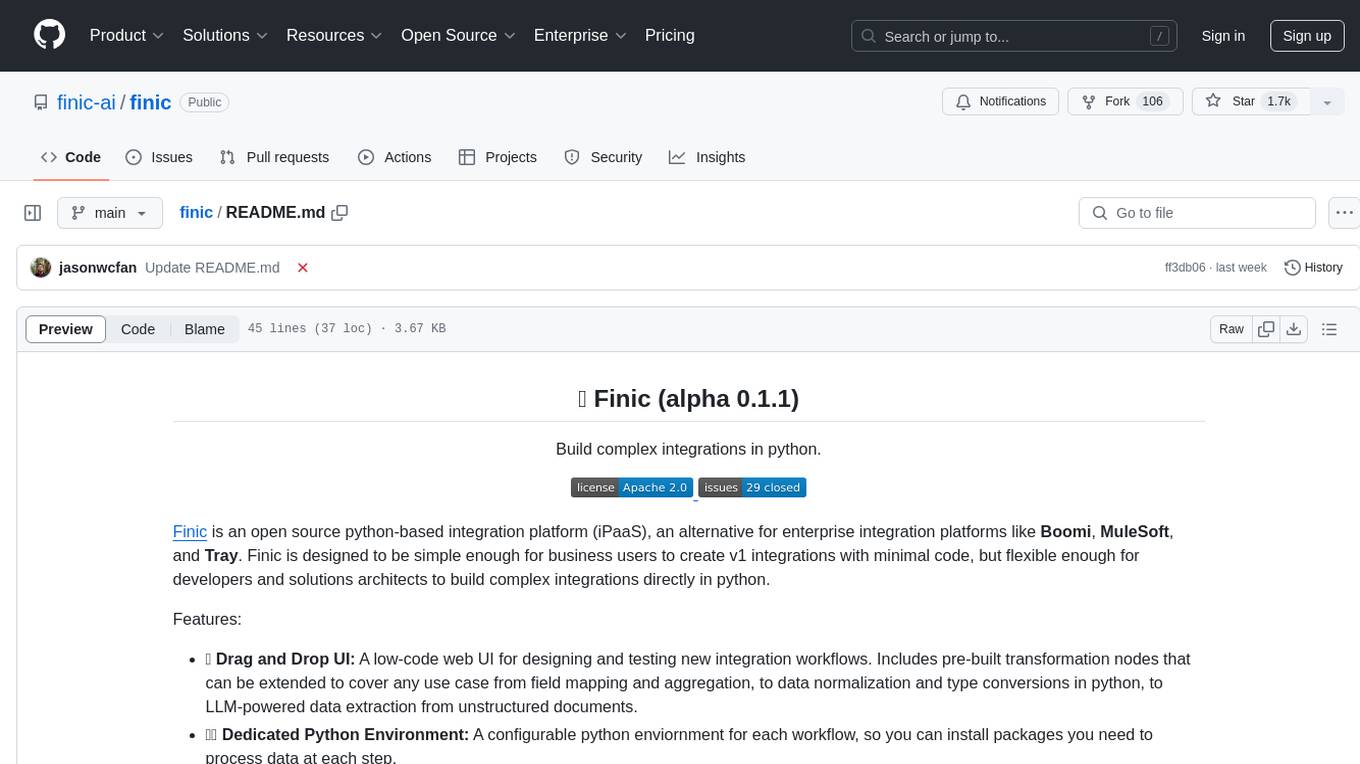
finic
Finic is an open source python-based integration platform designed for business users to create v1 integrations with minimal code, while also being flexible for developers to build complex integrations directly in python. It offers a low-code web UI, a dedicated Python environment for each workflow, and generative AI features. Finic decouples integration from product code, supports custom connectors, and is open source. It is not an ETL tool but focuses on integrating functionality between applications via APIs or SFTP, and it is not a workflow automation tool optimized for complex use cases.
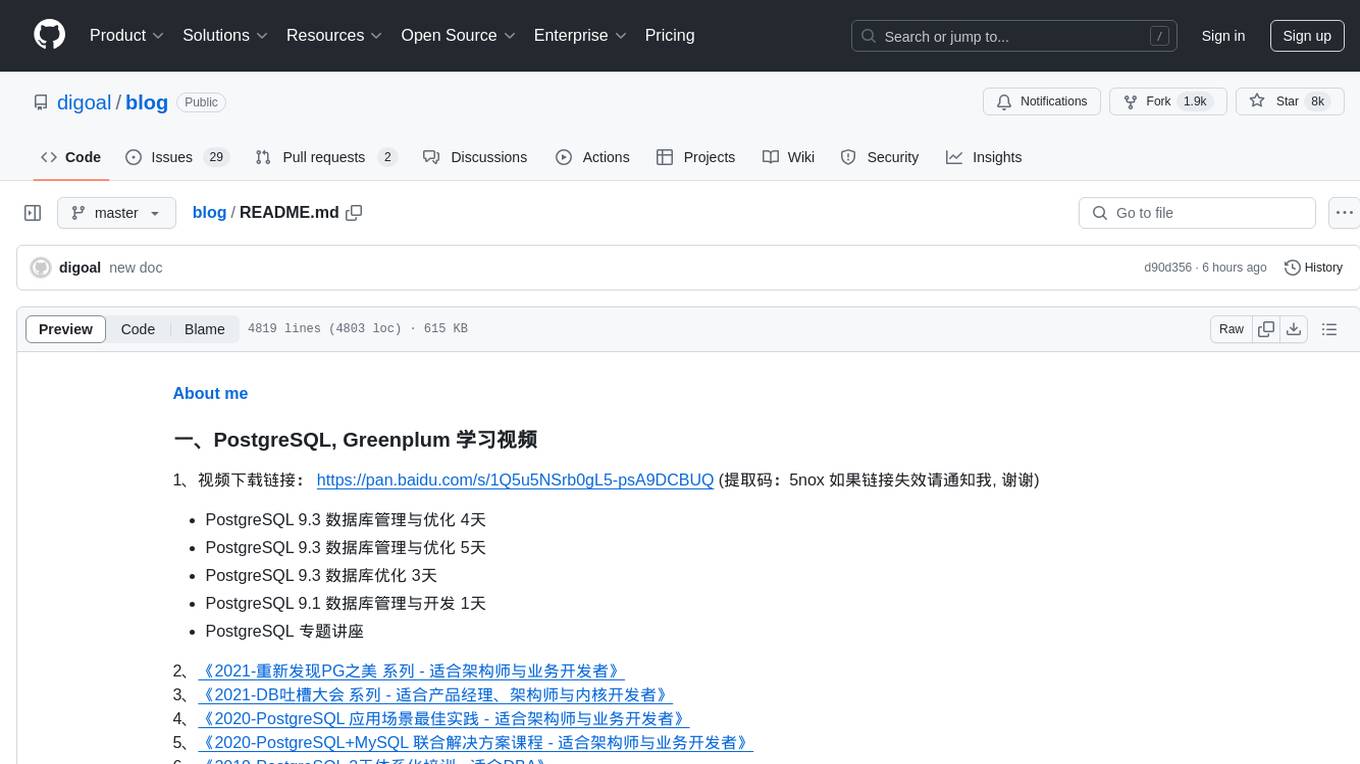
blog
This repository contains a simple blog application built using Python and Flask framework. It allows users to create, read, update, and delete blog posts. The application uses SQLite database for storing blog data and provides a basic user interface for interacting with the blog. The code is well-organized and easy to understand, making it suitable for beginners looking to learn web development with Python and Flask.
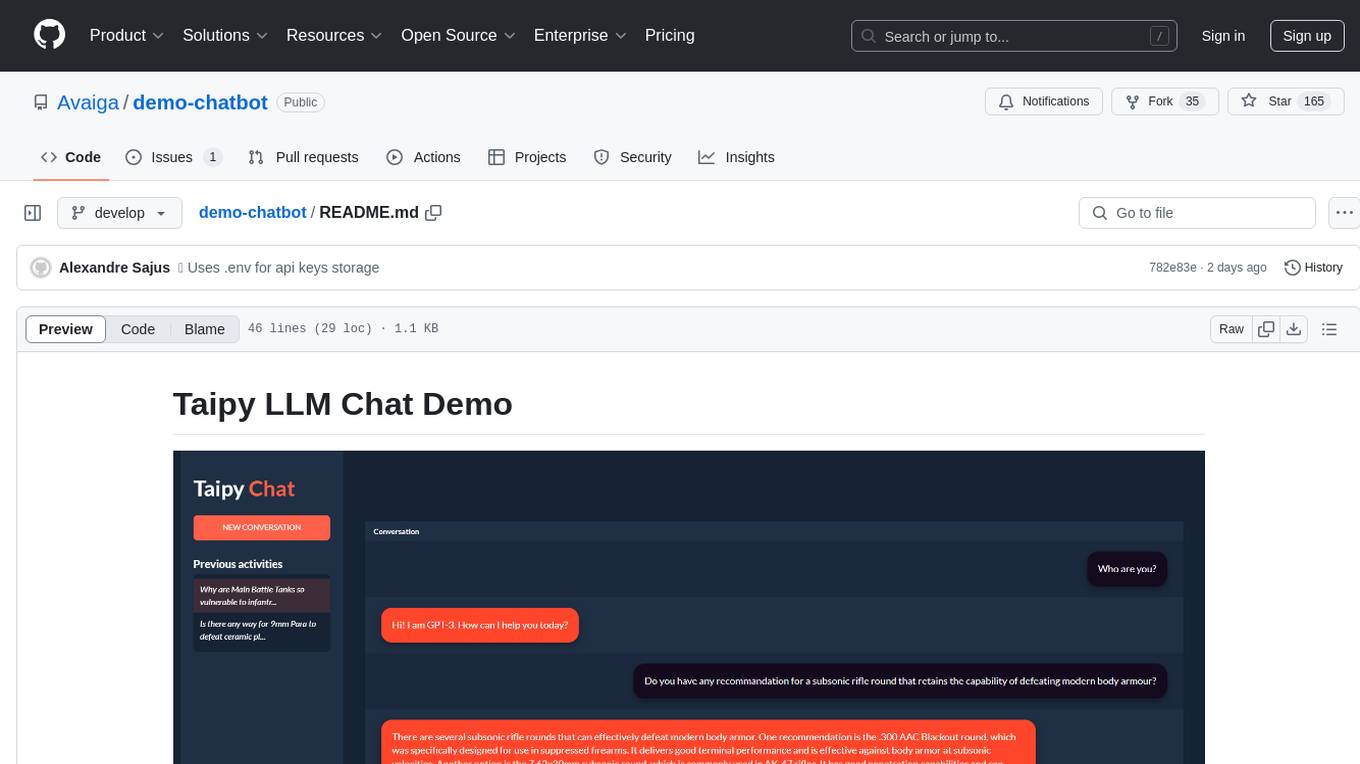
demo-chatbot
The demo-chatbot repository contains a simple app to chat with an LLM, allowing users to create any LLM Inference Web Apps using Python. The app utilizes OpenAI's GPT-4 API to generate responses to user messages, with the flexibility to switch to other APIs or models. The repository includes a tutorial in the Taipy documentation for creating the app. Users need an OpenAI account with an active API key to run the app by cloning the repository, installing dependencies, setting up the API key in a .env file, and running the main.py file.
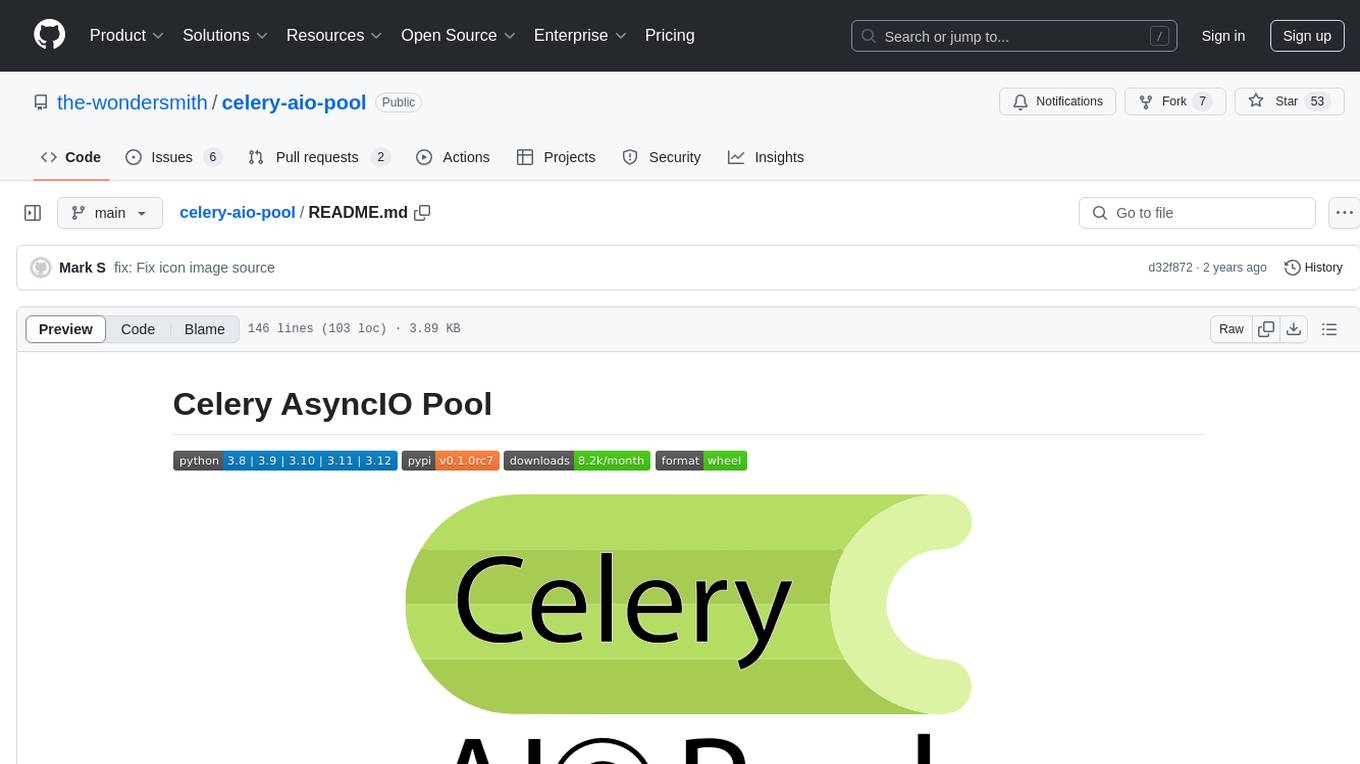
celery-aio-pool
Celery AsyncIO Pool is a free software tool licensed under GNU Affero General Public License v3+. It provides an AsyncIO worker pool for Celery, enabling users to leverage the power of AsyncIO in their Celery applications. The tool allows for easy installation using Poetry, pip, or directly from GitHub. Users can configure Celery to use the AsyncIO pool provided by celery-aio-pool, or they can wait for the upcoming support for out-of-tree worker pools in Celery 5.3. The tool is actively maintained and welcomes contributions from the community.
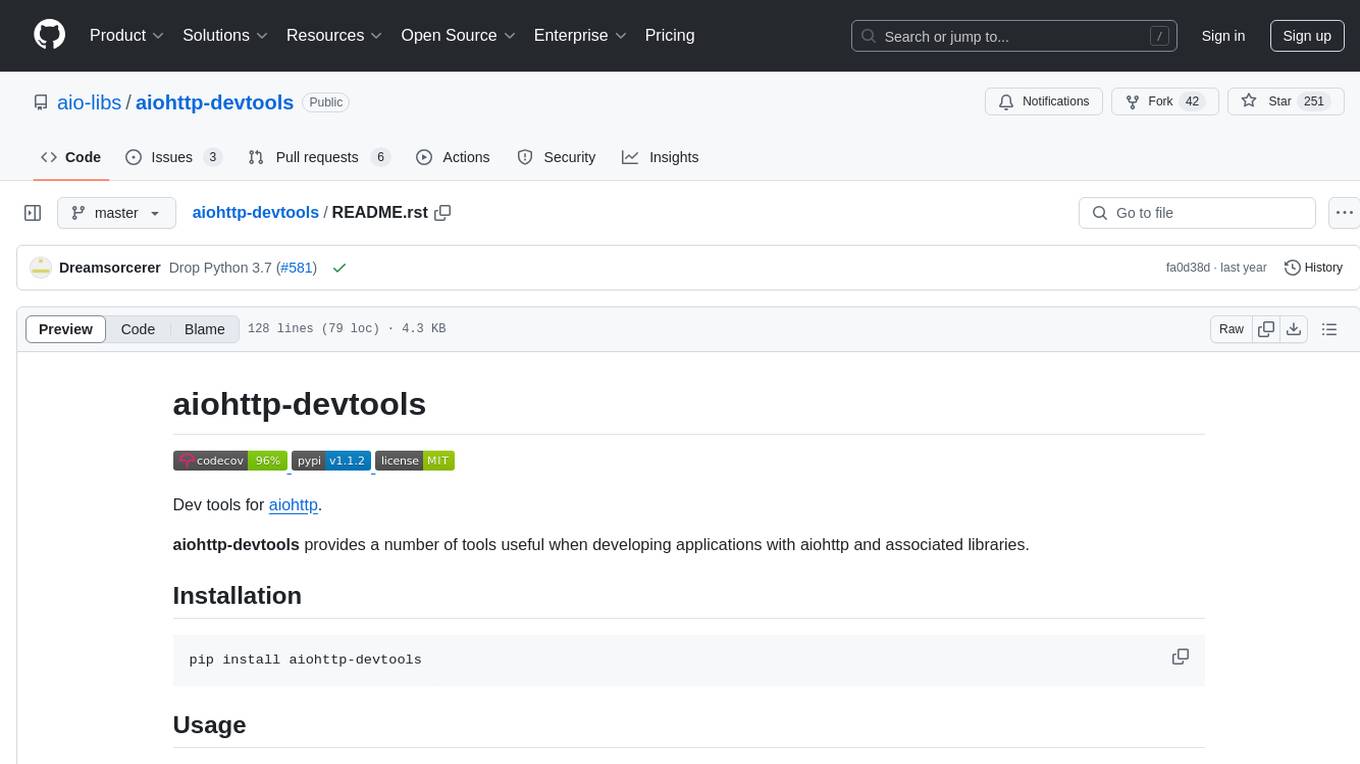
aiohttp-devtools
aiohttp-devtools provides dev tools for developing applications with aiohttp and associated libraries. It includes CLI commands for running a local server with live reloading and serving static files. The tools aim to simplify the development process by automating tasks such as setting up a new application and managing dependencies. Developers can easily create and run aiohttp applications, manage static files, and utilize live reloading for efficient development.
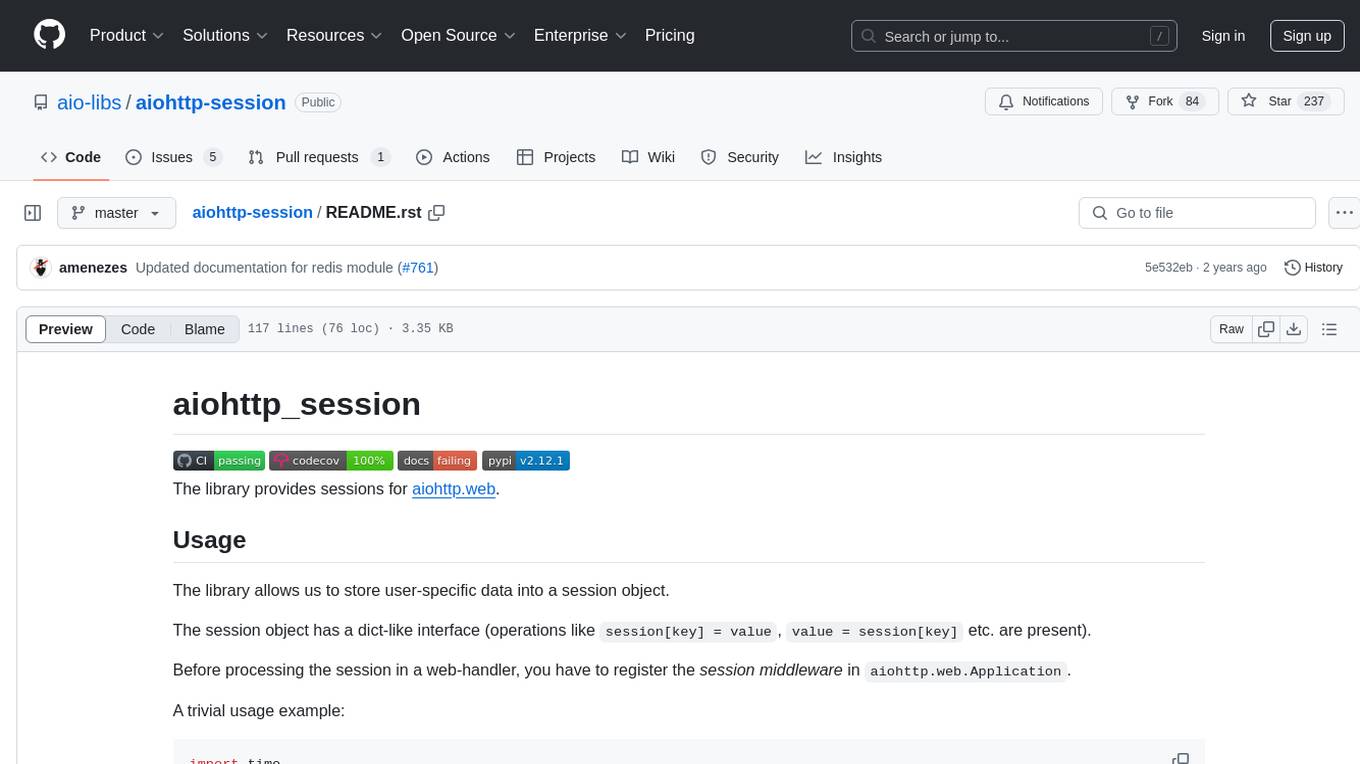
aiohttp-session
aiohttp_session is a Python library that provides session management for aiohttp.web applications. It allows storing user-specific data in session objects with a dict-like interface. The library offers different session storage options, including SimpleCookieStorage for testing, EncryptedCookieStorage for secure data storage, and RedisStorage for storing data in Redis. Users can easily integrate session management into their aiohttp.web applications by registering the session middleware. The library is designed to simplify session handling and enhance the security of web applications.

pyrfuniverse
pyrfuniverse is a python package used to interact with RFUniverse simulation environment. It is developed with reference to ML-Agents and produce new features. The package allows users to work with RFUniverse for simulation purposes, providing tools and functionalities to interact with the environment and create new features.
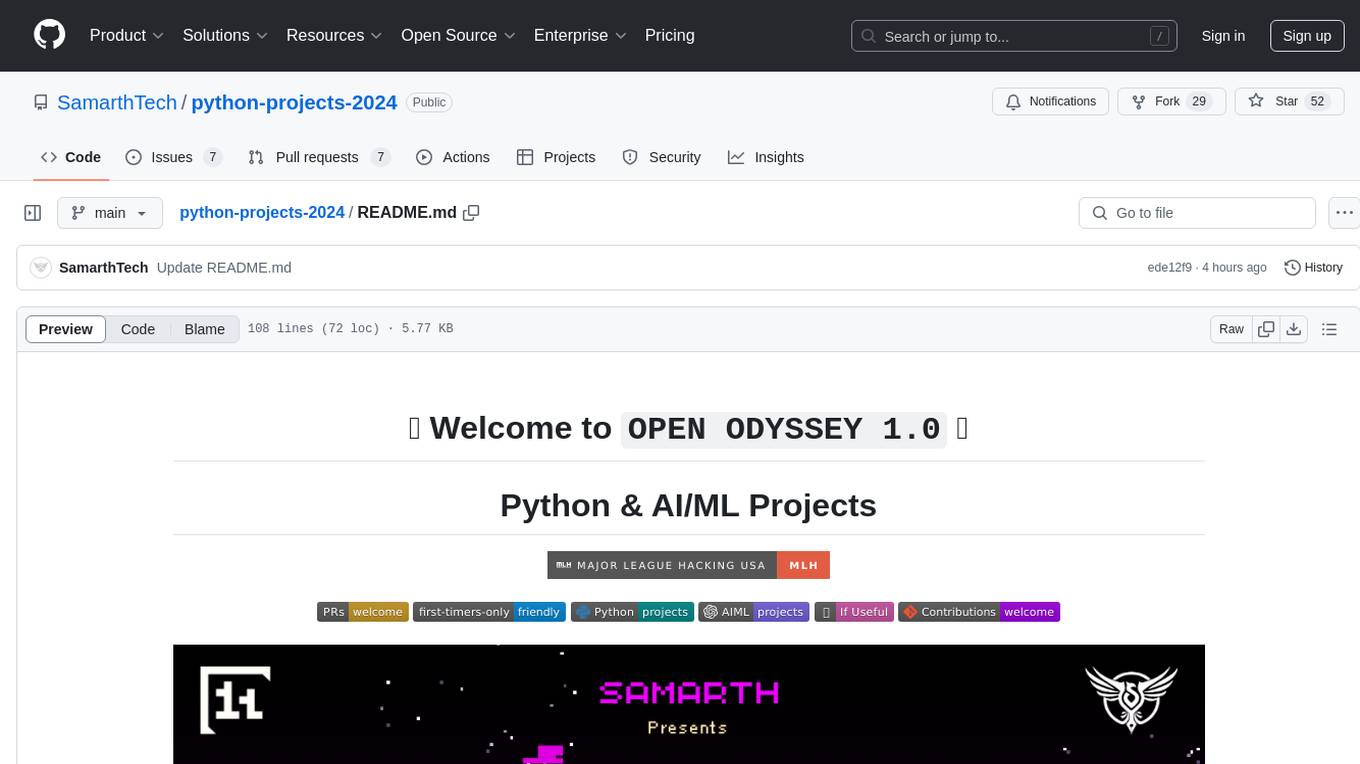
python-projects-2024
Welcome to `OPEN ODYSSEY 1.0` - an Open-source extravaganza for Python and AI/ML Projects. Collaborating with MLH (Major League Hacking), this repository welcomes contributions in the form of fixing outstanding issues, submitting bug reports or new feature requests, adding new projects, implementing new models, and encouraging creativity. Follow the instructions to contribute by forking the repository, cloning it to your PC, creating a new folder for your project, and making a pull request. The repository also features a special Leaderboard for top contributors and offers certificates for all participants and mentors. Follow `OPEN ODYSSEY 1.0` on social media for swift approval of your quest.
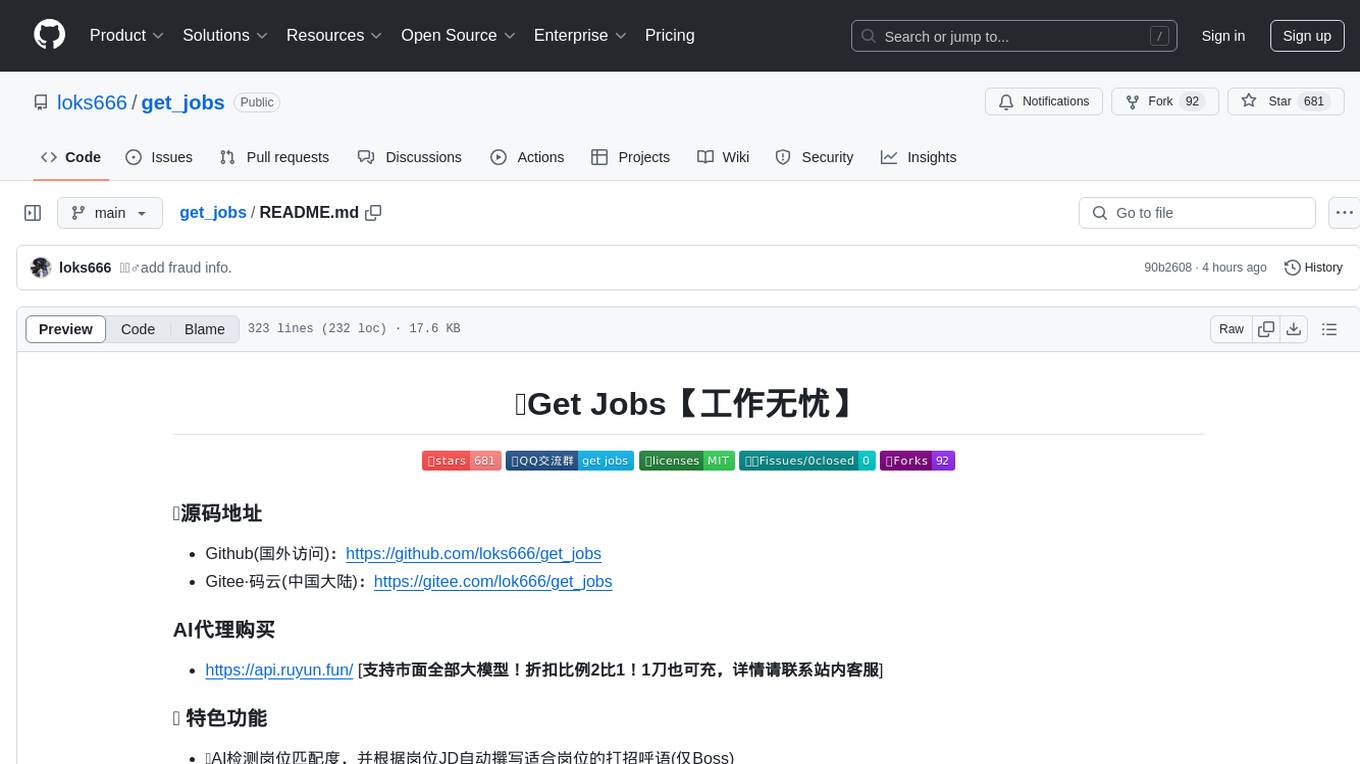
get_jobs
Get Jobs is a tool designed to help users find and apply for job positions on various recruitment platforms in China. It features AI job matching, automatic cover letter generation, multi-platform job application, automated filtering of inactive HR and headhunter positions, real-time WeChat message notifications, blacklisted company updates, driver adaptation for Win11, centralized configuration, long-lasting cookie login, XPathHelper plugin, global logging, and more. The tool supports platforms like Boss直聘, 猎聘, 拉勾, 51job, and 智联招聘. Users can configure the tool for customized job searches and applications.
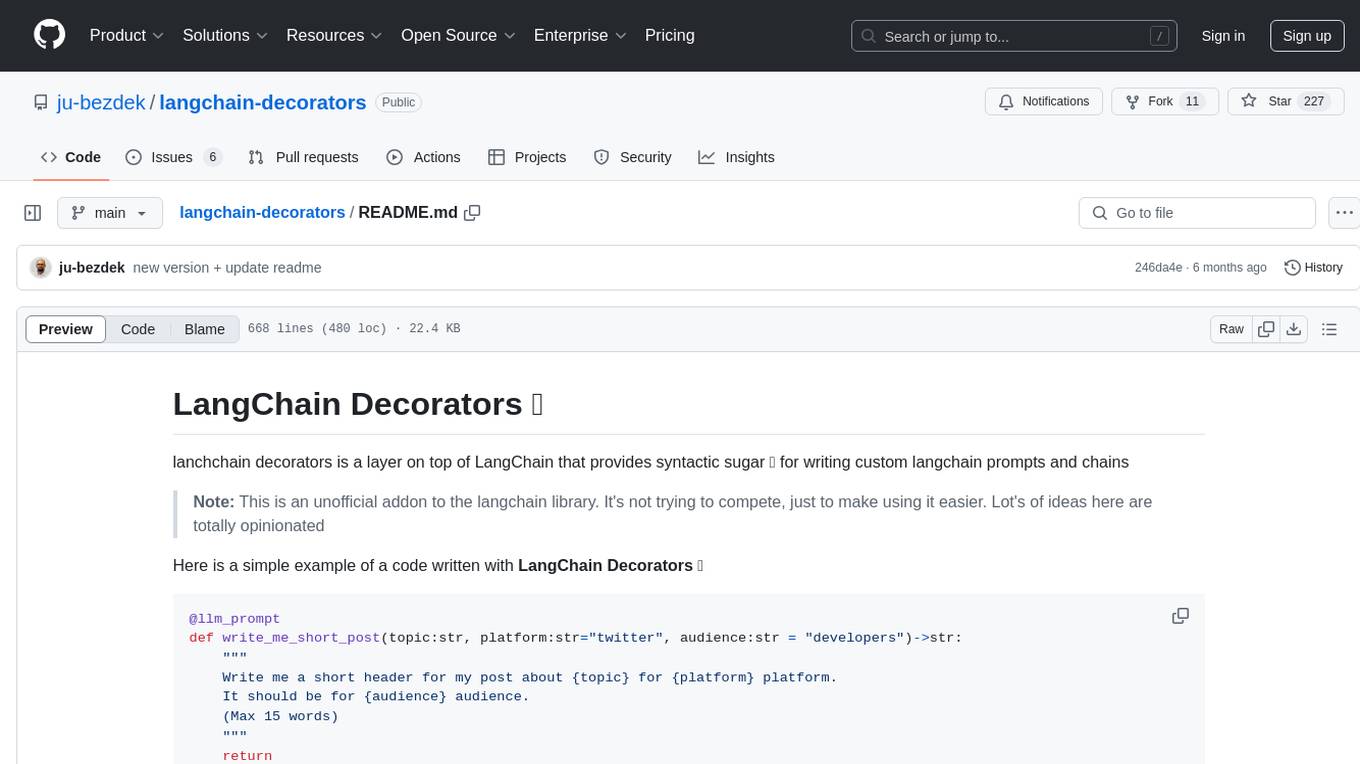
langchain-decorators
LangChain Decorators is a layer on top of LangChain that provides syntactic sugar for writing custom langchain prompts and chains. It offers a more pythonic way of writing code, multiline prompts without breaking code flow, IDE support for hinting and type checking, leveraging LangChain ecosystem, support for optional parameters, and sharing parameters between prompts. It simplifies streaming, automatic LLM selection, defining custom settings, debugging, and passing memory, callback, stop, etc. It also provides functions provider, dynamic function schemas, binding prompts to objects, defining custom settings, and debugging options. The project aims to enhance the LangChain library by making it easier to use and more efficient for writing custom prompts and chains.

PokeLLMon
PokeLLMon is a tool that allows users to set up a local battle engine for Pokémon battles. It requires Python version 3.8 or higher and OpenAI version 1.7.2 or higher. Users can configure the OpenAI API to enhance their battles. The tool provides a platform for users to engage in local battles by running the main Python script with their username and password for PokeLLMon.
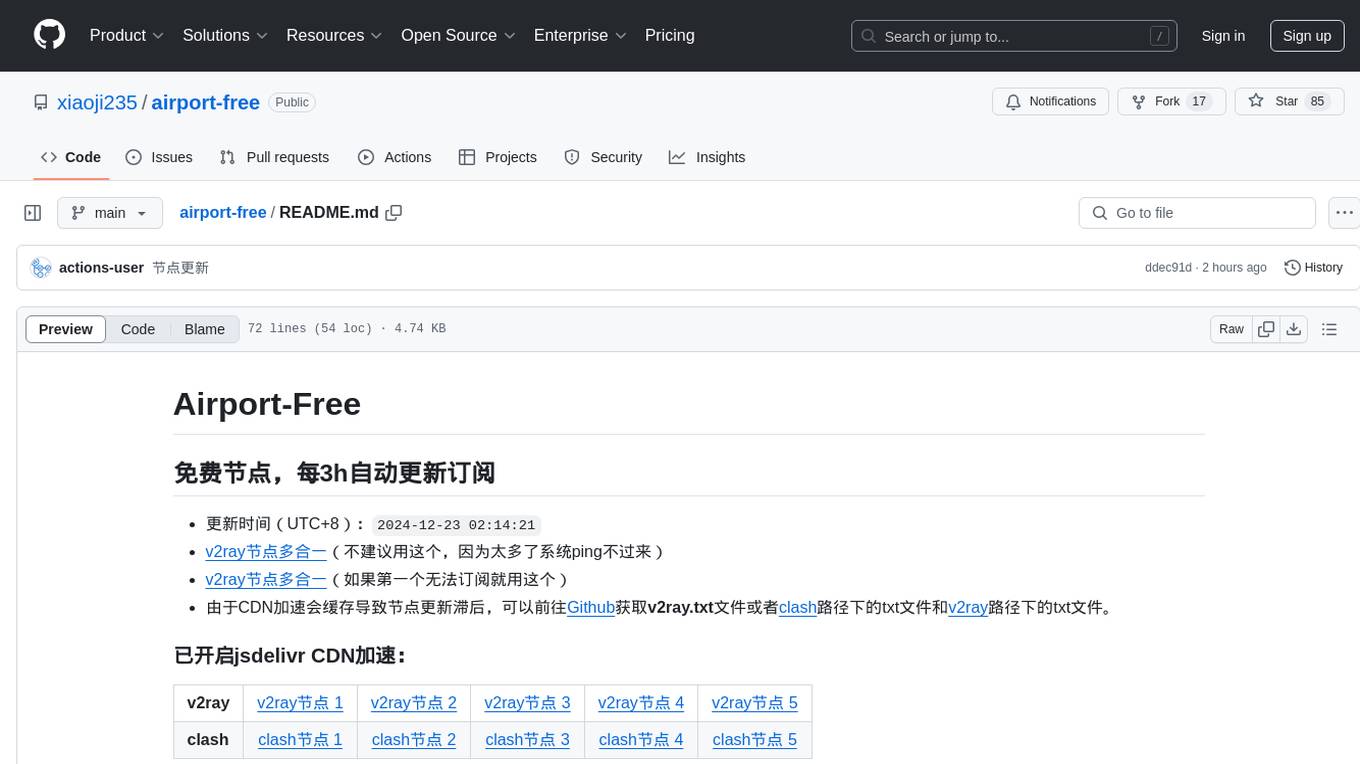
airport-free
Airport-Free is a repository that provides free v2ray and clash nodes for subscription. The nodes are automatically updated every 3 hours. Users can access the v2ray.txt and clash.txt files from the Github repository. The repository includes scripts for v2ray and clash, which can be run to view the output results. It also allows users to submit new nodes through issues on GitHub. The repository aims to provide a convenient and reliable source of nodes for users to access the internet securely and privately.
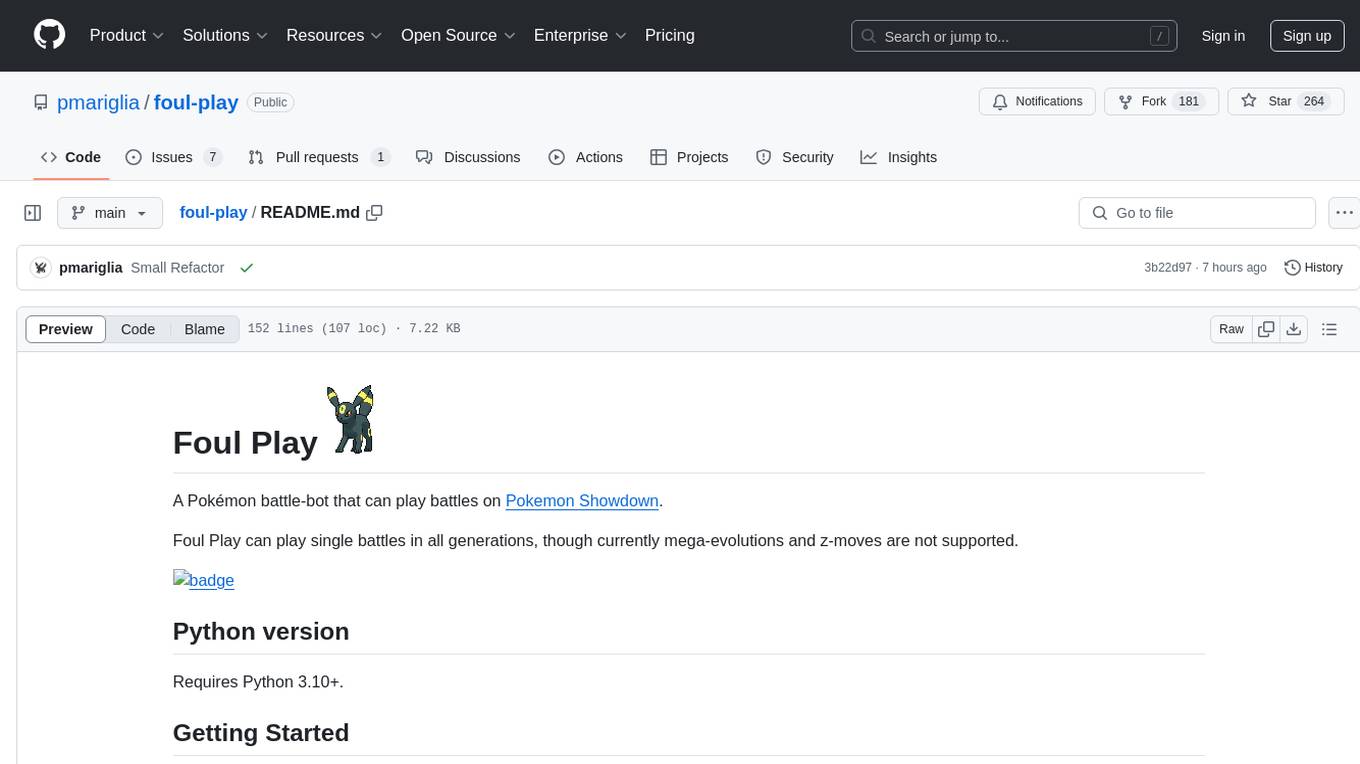
foul-play
Foul Play is a Pokémon battle-bot that can play single battles in all generations on Pokemon Showdown. It requires Python 3.10+. The bot uses environment variables for configuration and supports different game modes and battle strategies. Users can specify teams and choose between algorithms like Monte-Carlo Tree Search and Expectiminimax. Foul Play can be run locally or with Docker, and the engine used for battles must be built from source. The tool provides flexibility in gameplay and strategy for Pokémon battles.
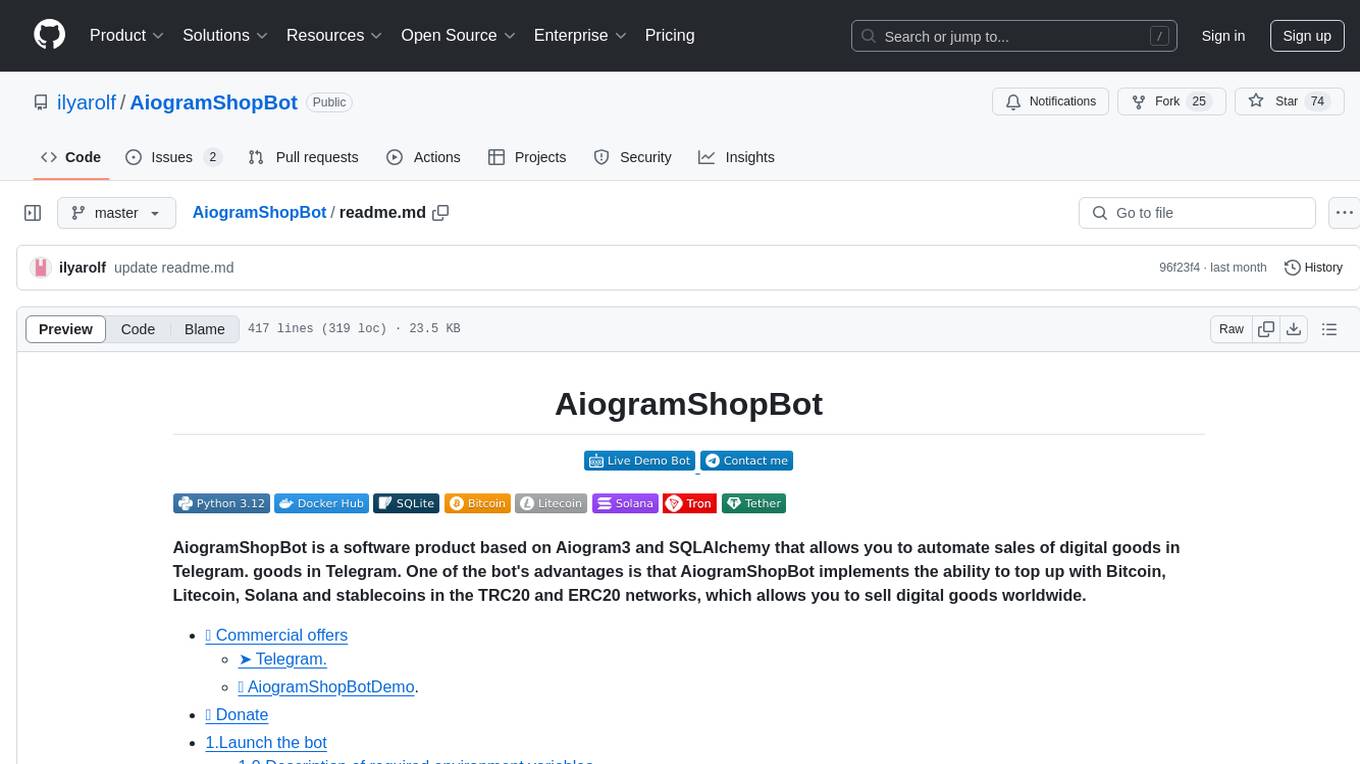
AiogramShopBot
AiogramShopBot is a software product based on Aiogram3 and SQLAlchemy that allows you to automate sales of digital goods in Telegram. One of the bot's advantages is that AiogramShopBot implements the ability to top up with Bitcoin, Litecoin, Solana and stablecoins in the TRC20 and ERC20 networks, which allows you to sell digital goods worldwide. The bot provides features for user registration, balance top-up, purchase of goods, purchase history, admin functionalities like announcements, inventory management, user management, analytics & reports, and multibot functionality. It supports encryption via SQLCipher, multiple cryptocurrencies, and offers a user-friendly interface for managing sales and transactions.
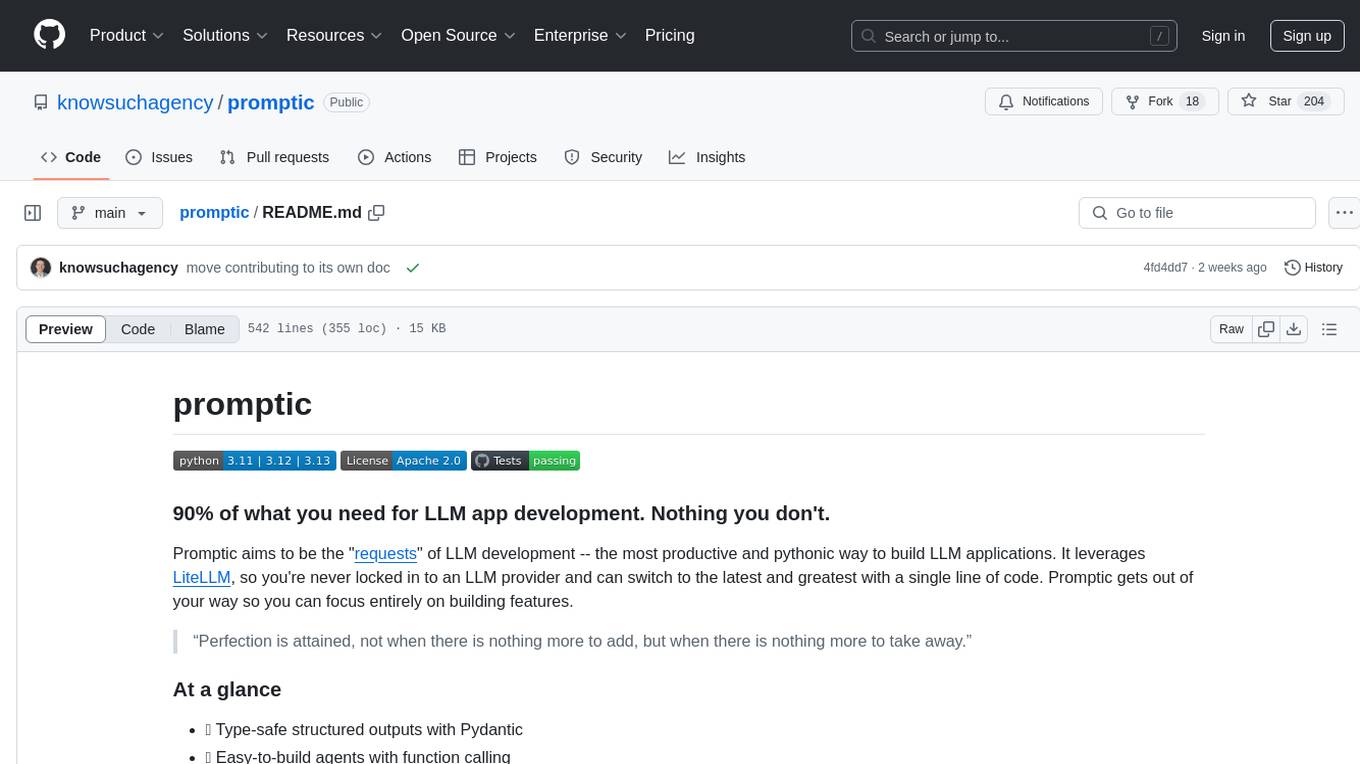
promptic
Promptic is a tool designed for LLM app development, providing a productive and pythonic way to build LLM applications. It leverages LiteLLM, allowing flexibility to switch LLM providers easily. Promptic focuses on building features by providing type-safe structured outputs, easy-to-build agents, streaming support, automatic prompt caching, and built-in conversation memory.
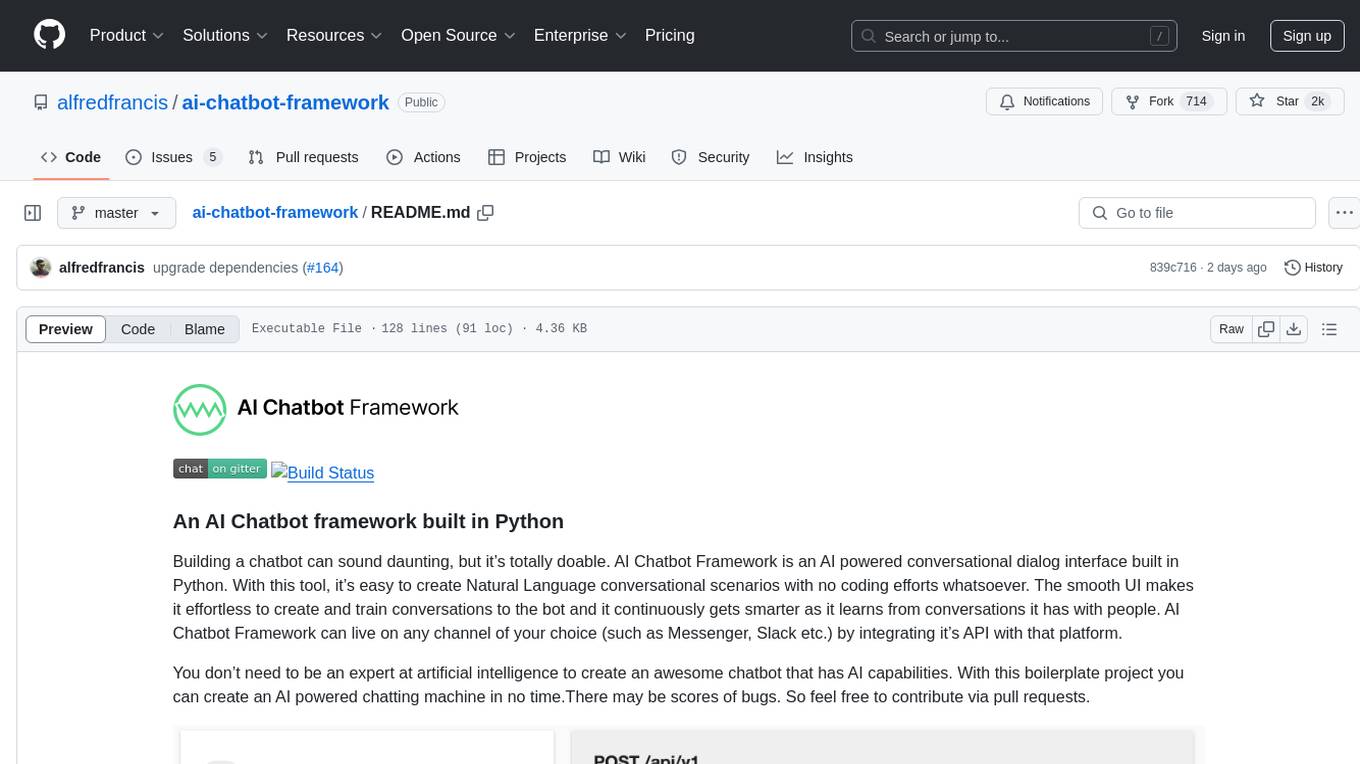
ai-chatbot-framework
An AI Chatbot framework built in Python. It allows users to easily create Natural Language conversational scenarios with no coding efforts. The tool continuously learns from conversations to improve its capabilities. It can be integrated with various channels like Messenger and Slack. Users can create AI-powered chatbots without expertise in artificial intelligence.
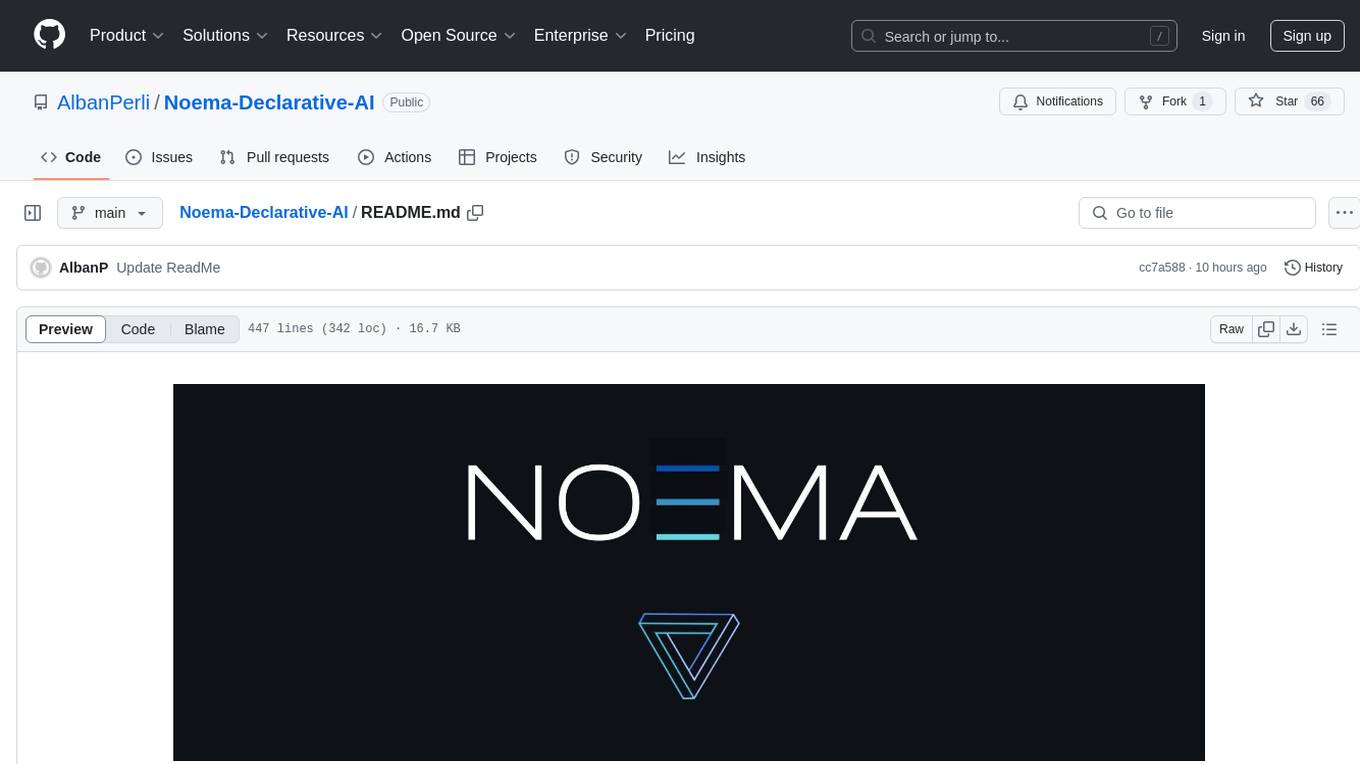
Noema-Declarative-AI
Noema is a framework that enables developers to control a language model and choose the path it will follow. It integrates Python with llm's generations, allowing users to use LLM as a thought interpreter rather than a source of truth. Noema is built on llama.cpp and guidance's shoulders. It applies the declarative programming paradigm to a language model, providing a way to represent functions, descriptions, and transformations. Users can create subjects, think about tasks, and generate content through generators, selectors, and code generators. Noema supports ReAct prompting, visualization, and semantic Python functionalities, offering a versatile tool for automating tasks and guiding language models.
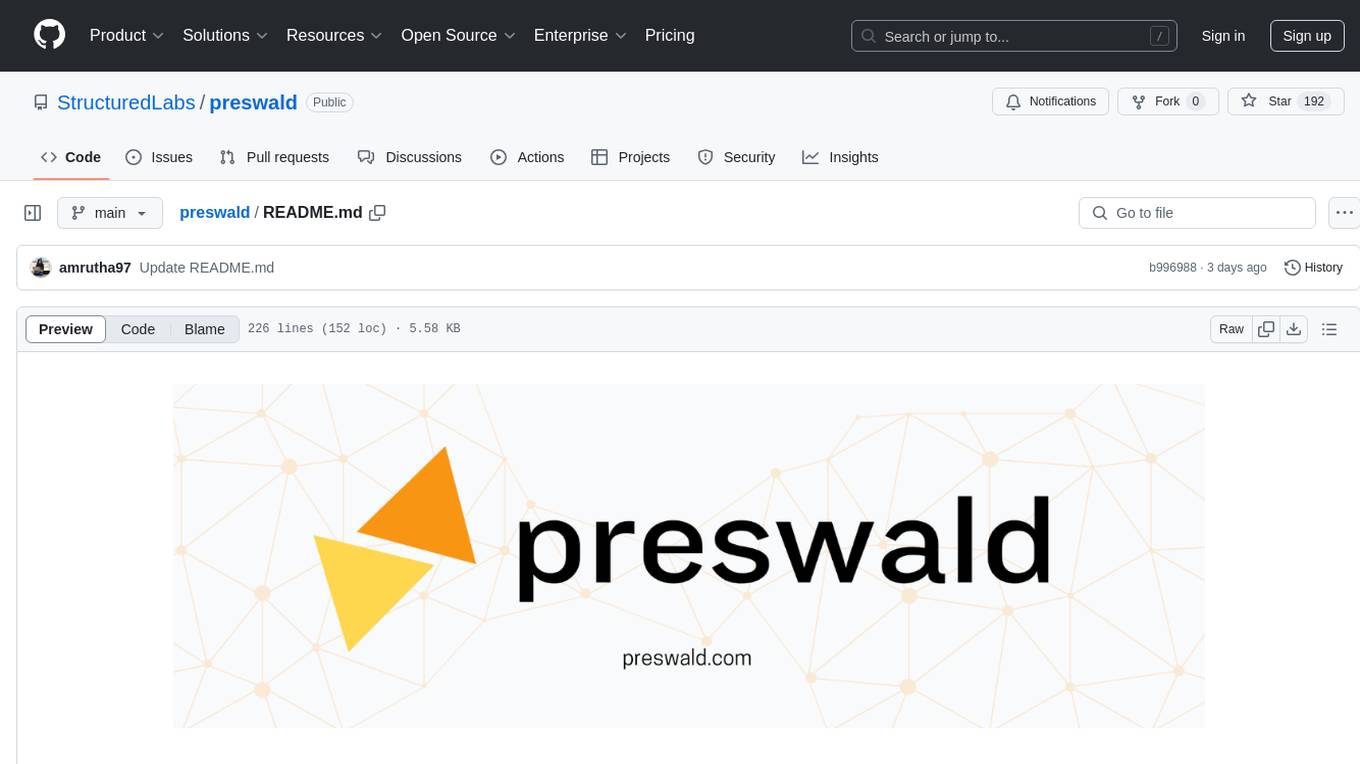
preswald
Preswald is a full-stack platform for building, deploying, and managing interactive data applications in Python. It simplifies the process by combining ingestion, storage, transformation, and visualization into one lightweight SDK. With Preswald, users can connect to various data sources, customize app themes, and easily deploy apps locally. The platform focuses on code-first simplicity, end-to-end coverage, and efficiency by design, making it suitable for prototyping internal tools or deploying production-grade apps with reduced complexity and cost.
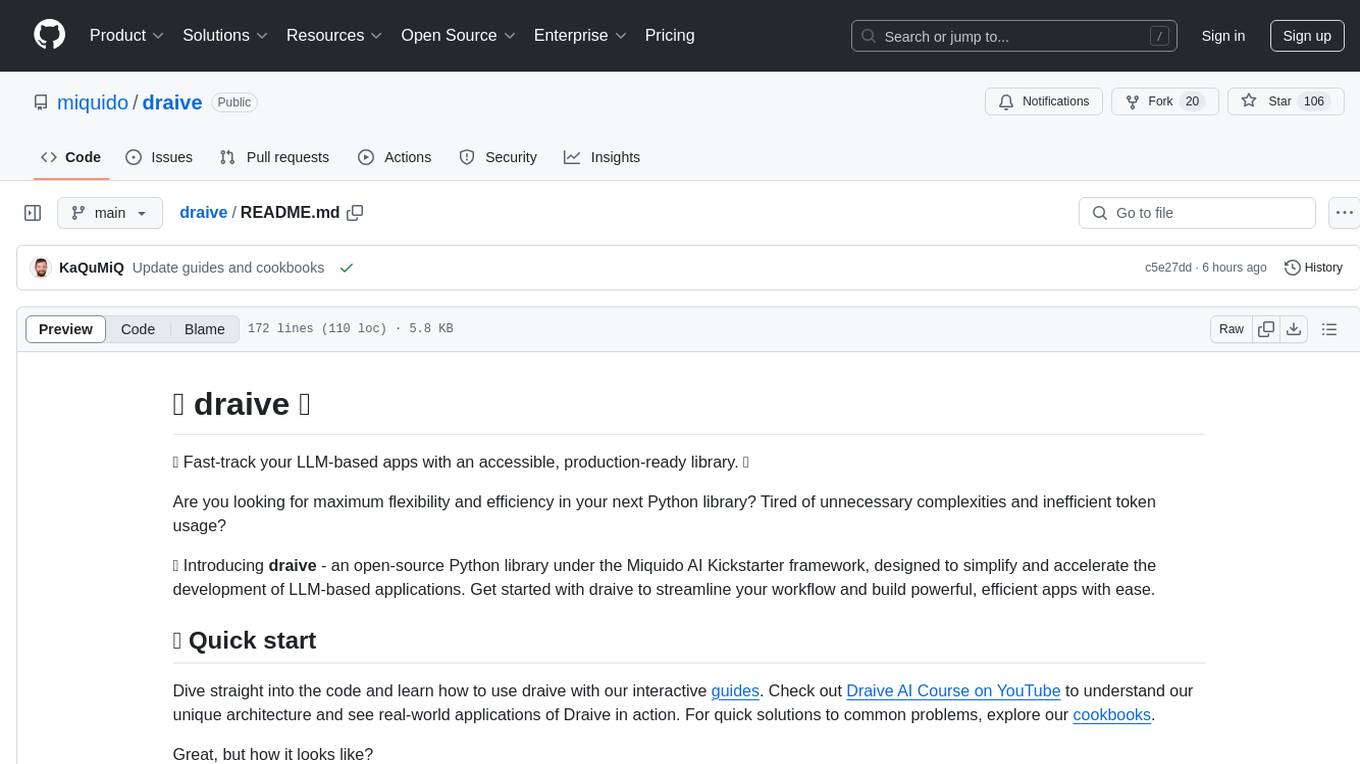
draive
draive is an open-source Python library designed to simplify and accelerate the development of LLM-based applications. It offers abstract building blocks for connecting functionalities with large language models, flexible integration with various AI solutions, and a user-friendly framework for building scalable data processing pipelines. The library follows a function-oriented design, allowing users to represent complex programs as simple functions. It also provides tools for measuring and debugging functionalities, ensuring type safety and efficient asynchronous operations for modern Python apps.

aioimaplib
aioimaplib is a Python library inspired by imaplib and imaplib2, aiming to port imaplib with asyncio for asynchronous benefits. It provides functionalities to interact with IMAP servers using asyncio, including checking mailbox, waiting for new messages, handling IDLE command, threading, IMAP command concurrency, logging configuration, and authentication with OAuth2. The library is tested with various IMAP servers like dovecot, Gmail, Outlook, Yahoo, etc. Developers are encouraged to contribute by improving, bug fixing, testing with other IMAP servers, and providing feedback. The library supports most IMAP4rev1 commands from RFC3501 and plans to implement additional commands like 'STARTTLS', 'AUTHENTICATE', 'COMPRESS', 'SETACL', 'DELETEACL', 'GETACL', 'MYRIGHTS', 'LISTRIGHTS', 'GETQUOTA', 'GETQUOTAROOT', 'SETQUOTA', 'SORT', 'THREAD', 'ID', 'NAMESPACE', 'CATENATE', and tests with other servers.
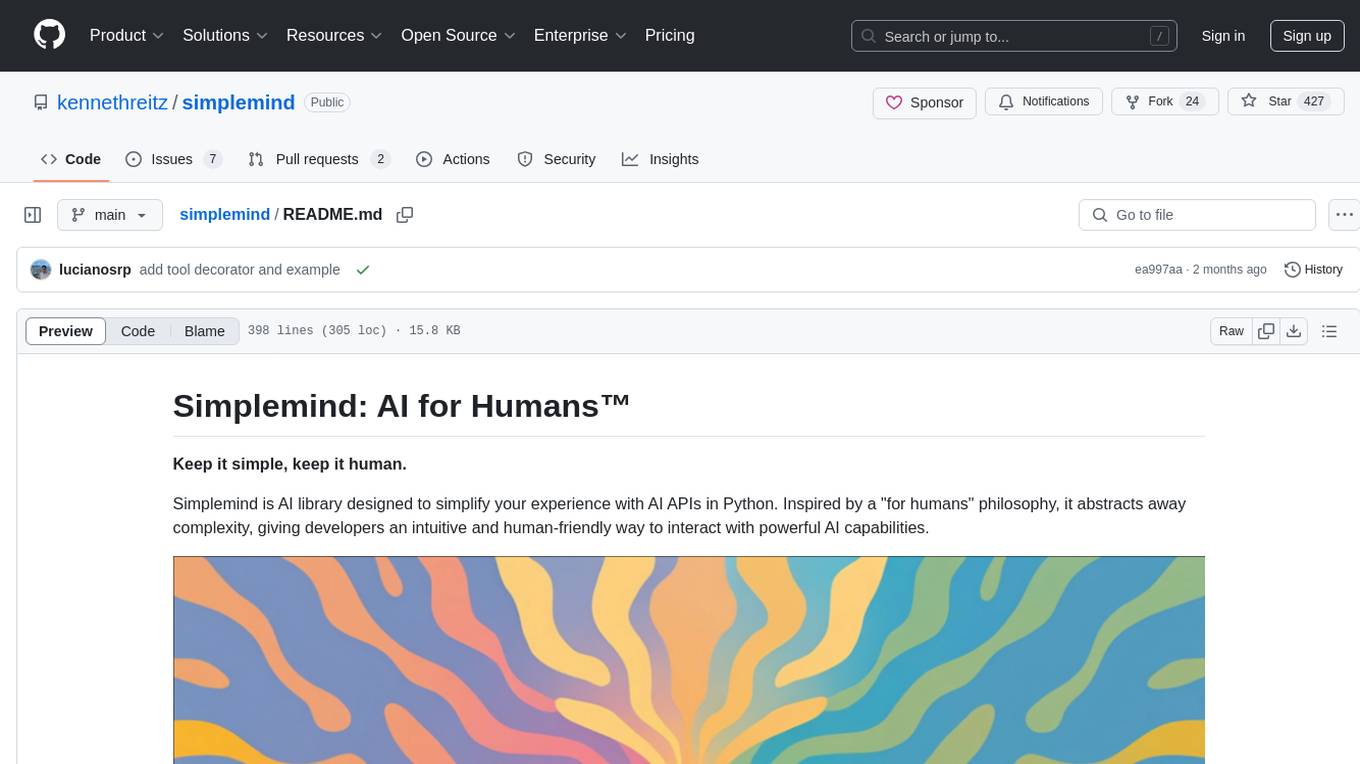
simplemind
Simplemind is an AI library designed to simplify the experience with AI APIs in Python. It provides easy-to-use AI tools with a human-centered design and minimal configuration. Users can tap into powerful AI capabilities through simple interfaces, without needing to be experts. The library supports various APIs from different providers/models and offers features like text completion, streaming text, structured data handling, conversational AI, tool calling, and logging. Simplemind aims to make AI models accessible to all by abstracting away complexity and prioritizing readability and usability.
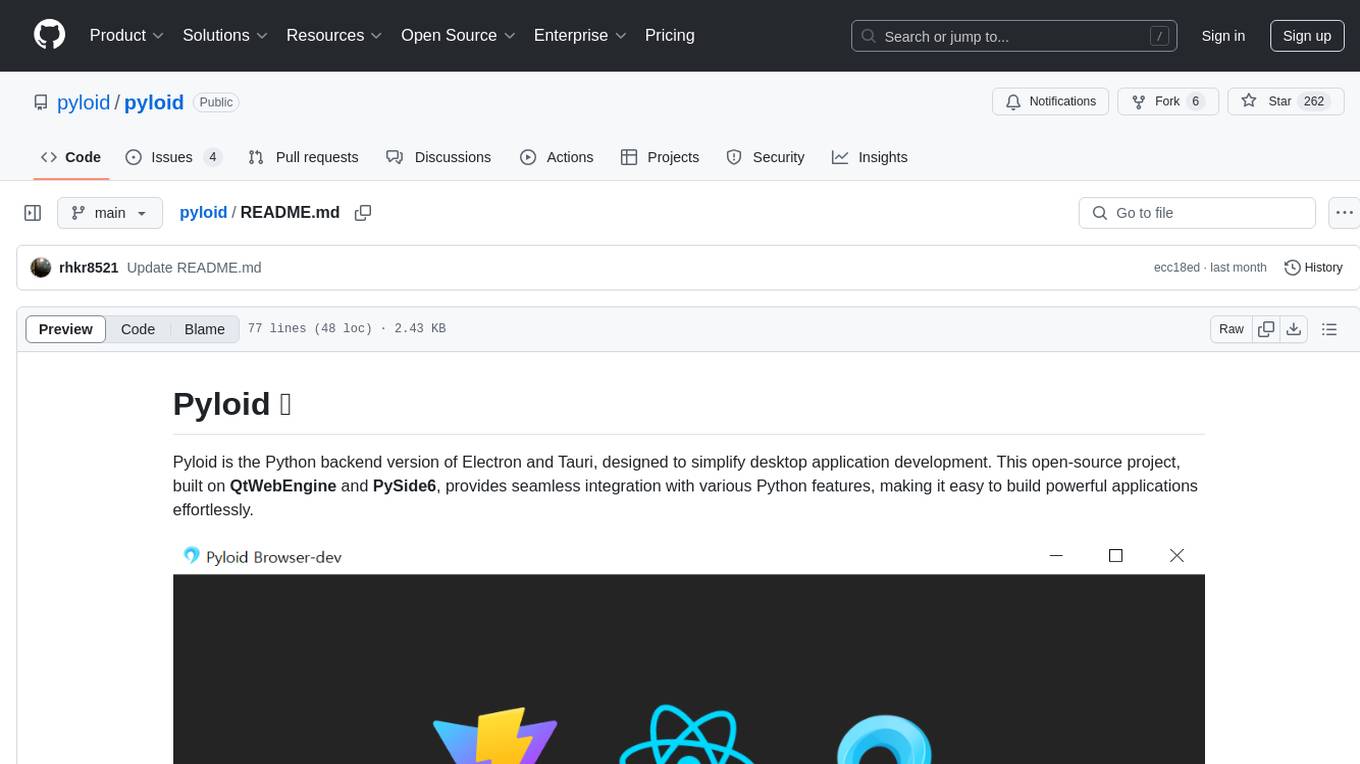
pyloid
Pyloid is a Python backend version of Electron and Tauri, simplifying desktop application development. Built on QtWebEngine and PySide6, it offers seamless integration with Python features, enabling easy creation of powerful applications. It provides web-based GUI generation, system tray icon support, multi-window management, bridge API between Python and JavaScript, single/multi-instance application support, comprehensive desktop app features, clean code structure, live UI development experience, cross-platform support, integration with frontend libraries, window customization, direct utilization of PySide6 features, and detailed Numpy-style docstrings.
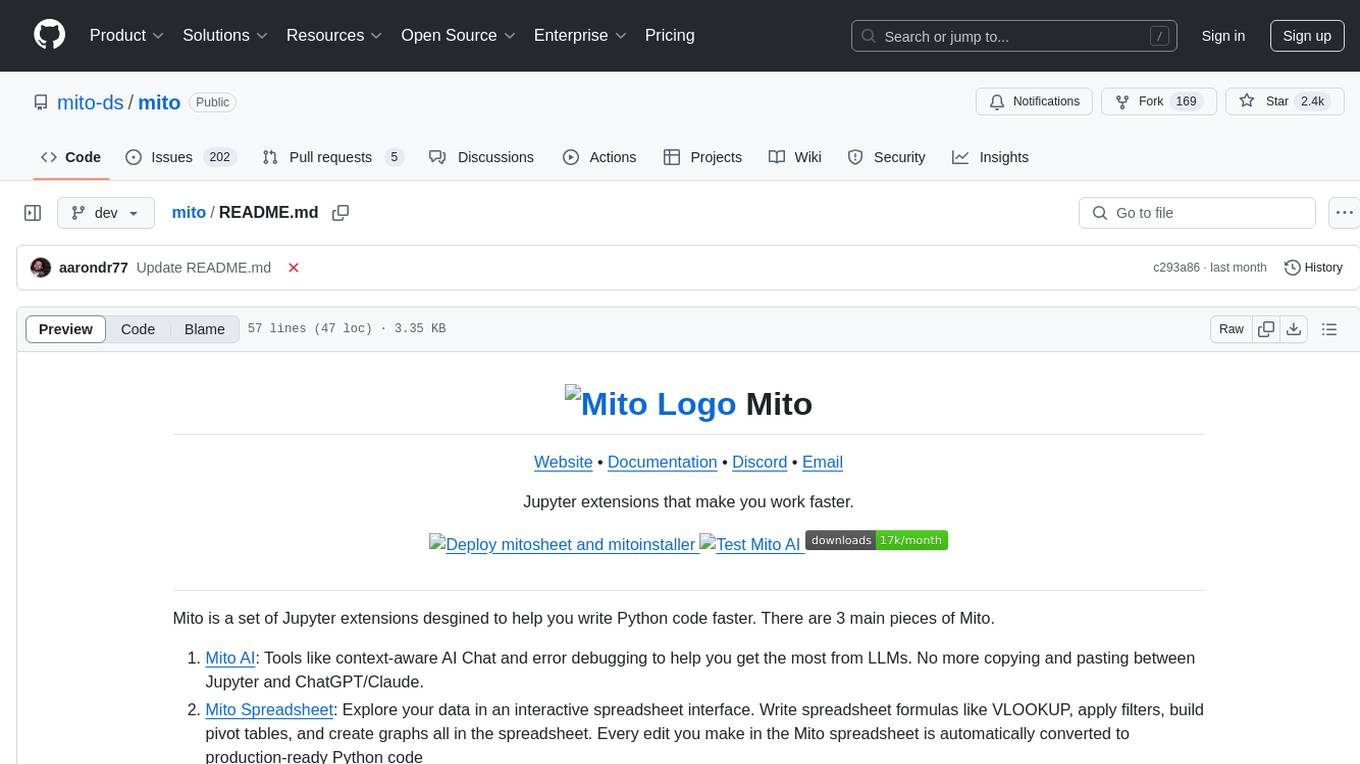
mito
Mito is a set of Jupyter extensions designed to help users write Python code faster. It consists of Mito AI, providing tools like context-aware AI Chat and error debugging; Mito Spreadsheet, enabling data exploration with interactive spreadsheet features; and Mito for Streamlit and Dash, allowing easy integration of spreadsheets into dashboards with minimal code. Mito is open source and community-driven, with options to purchase Mito Pro for further development support.
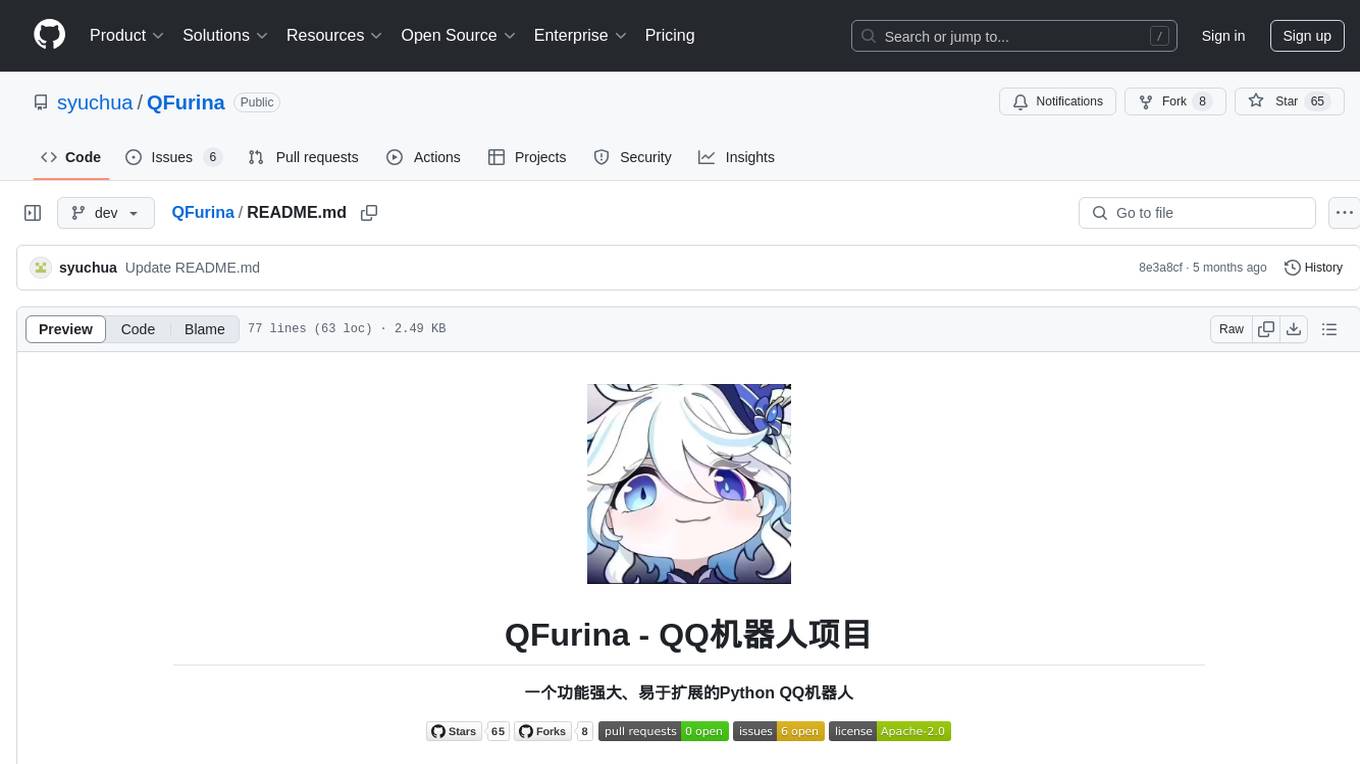
QFurina
QFurina is a powerful and easily extensible Python QQ robot backend service that provides a range of automation and interactive features. It supports multiple messaging platforms and has a robust plugin system, allowing users to easily expand and customize functionality.
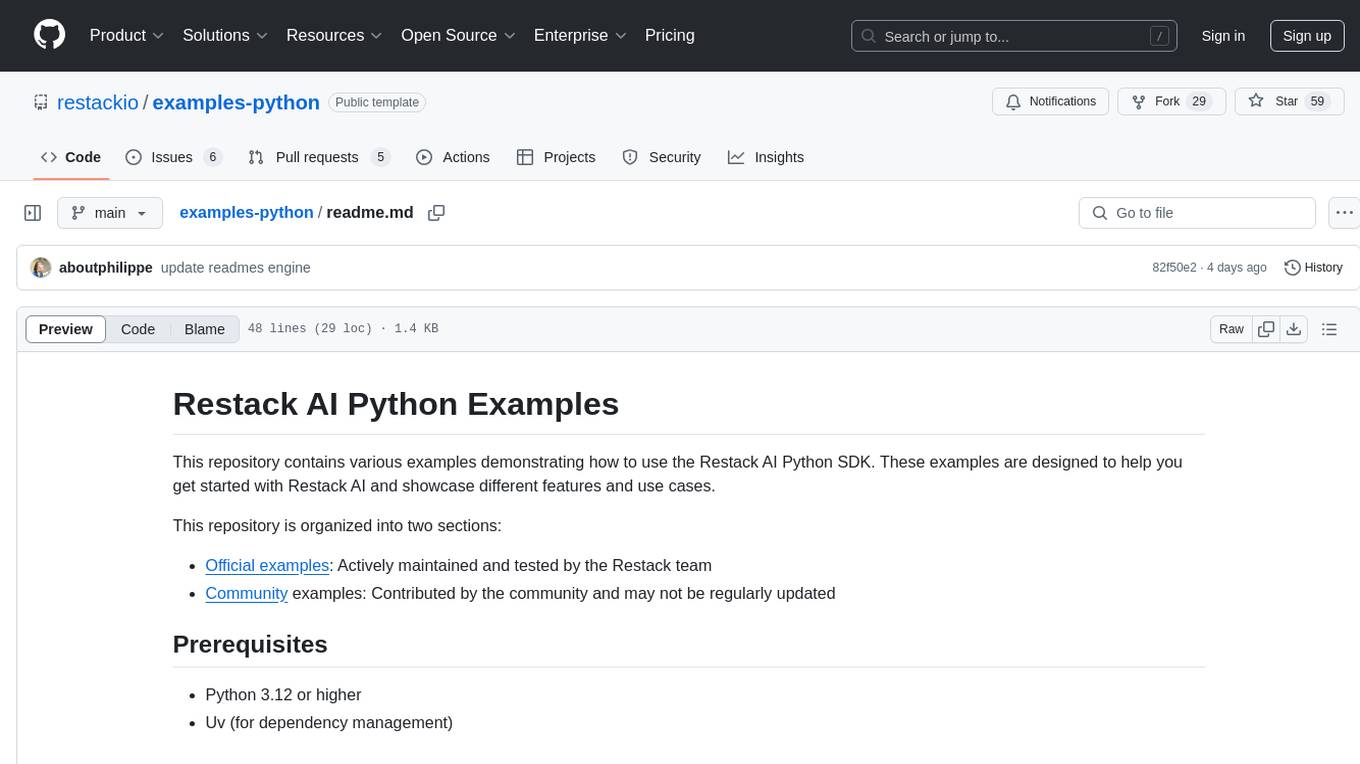
examples-python
This repository contains various examples demonstrating how to use the Restack AI Python SDK. It is organized into official examples maintained by the Restack team and community examples contributed by the community. The examples are designed to help users get started with Restack AI and showcase different features and use cases. Users can explore different examples, follow specific instructions in each example's README file, and contribute to the repository by adding new examples or improving existing ones.
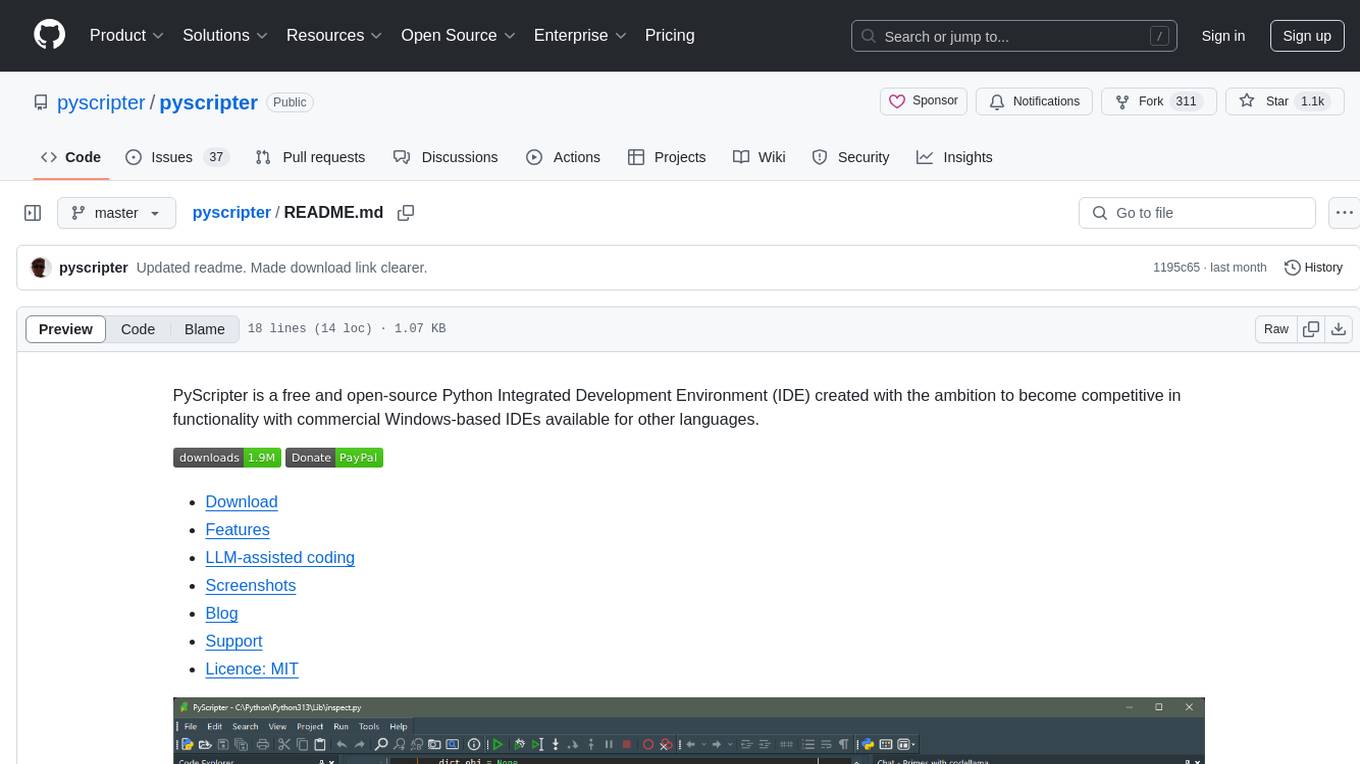
pyscripter
PyScripter is a free and open-source Python Integrated Development Environment (IDE) aiming to compete with commercial Windows-based IDEs for other languages. It offers features like LLM-assisted coding and provides support for Python development projects. The tool is designed to enhance the coding experience for Python developers by providing a user-friendly interface and a range of functionalities to streamline the development process.
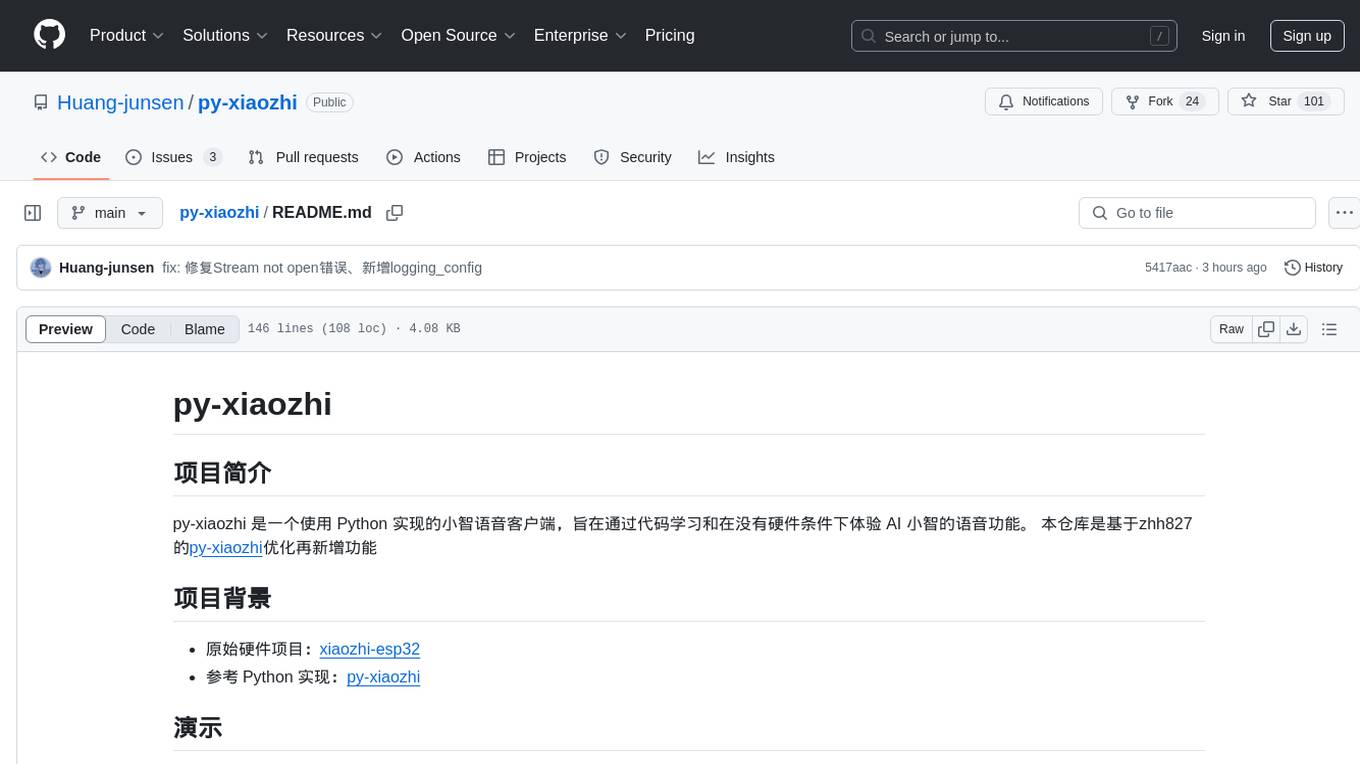
py-xiaozhi
py-xiaozhi is a Python-based XiaoZhi voice client designed for learning code and experiencing AI XiaoZhi's voice functions without hardware conditions. It features voice interaction, graphical interface, volume control, session management, encrypted audio transmission, CLI mode, and automatic copying of verification codes and opening browsers for first-time users. The project aims to optimize and add new features to zhh827's py-xiaozhi based on the original hardware project xiaozhi-esp32 and the Python implementation py-xiaozhi.
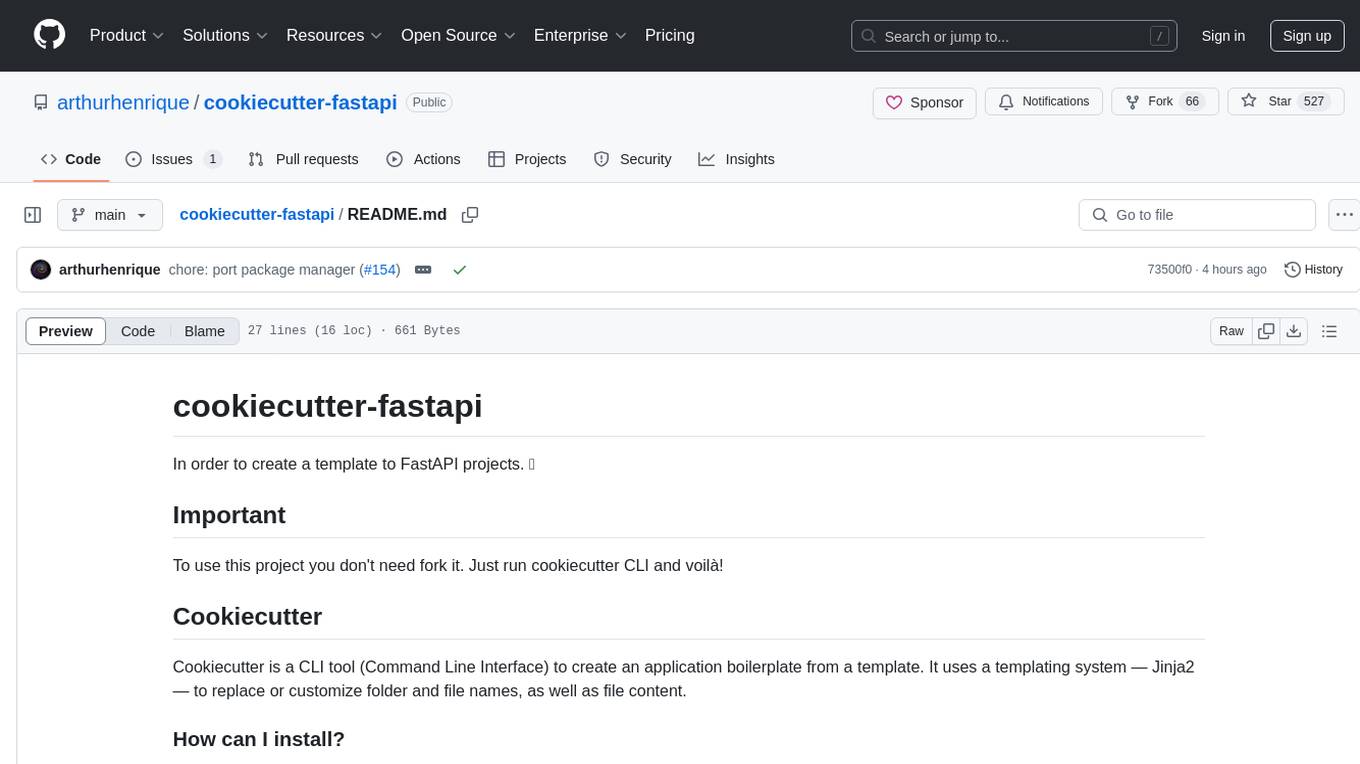
cookiecutter-fastapi
Cookiecutter-fastapi is a CLI tool for creating FastAPI projects. It allows users to generate application boilerplate from a template using Jinja2 templating system. Users can easily install the tool with 'pip install cookiecutter' and generate a FastAPI project by running 'cookiecutter gh:arthurhenrique/cookiecutter-fastapi'. The tool simplifies the process of setting up FastAPI projects by automating the creation of folder structures and file contents.
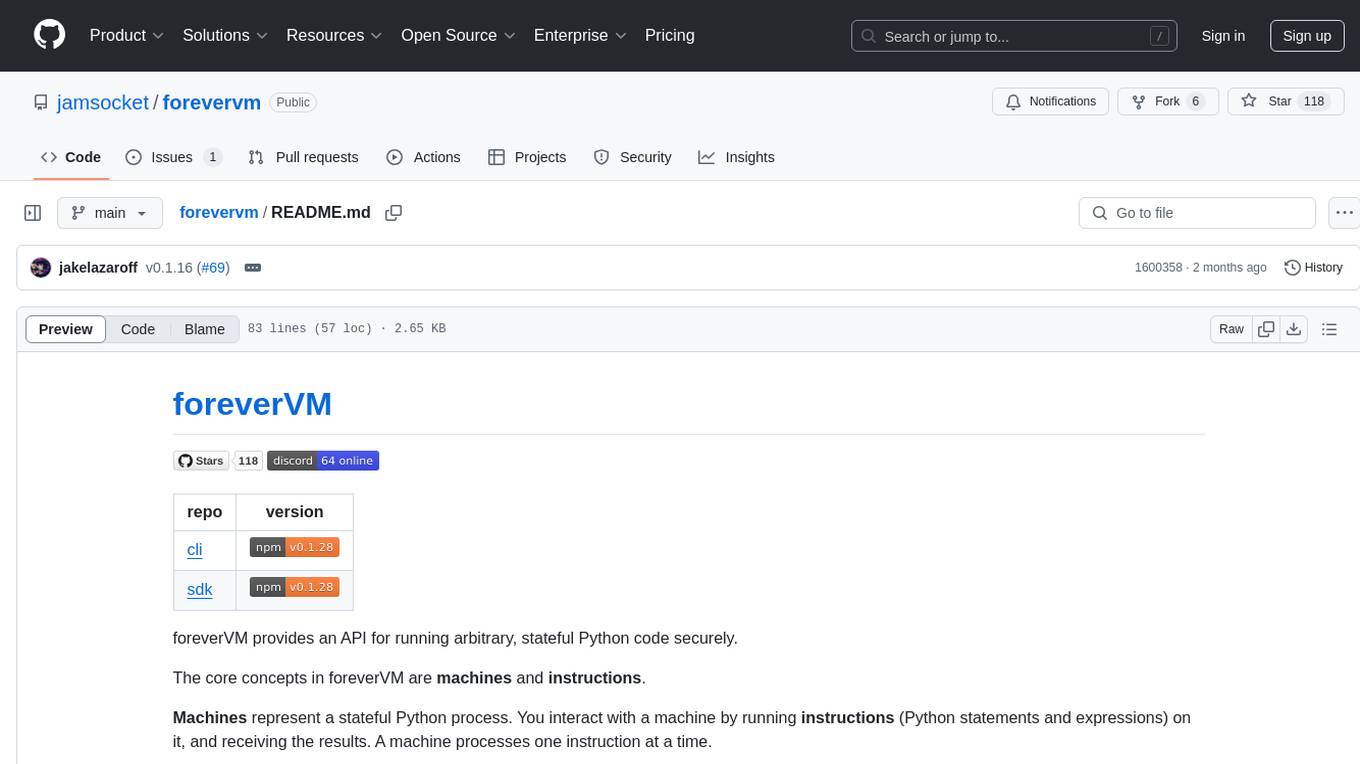
forevervm
foreverVM is a tool that provides an API for running arbitrary, stateful Python code securely. It revolves around the concepts of machines and instructions, where machines represent stateful Python processes and instructions are Python statements and expressions that can be executed on these machines. Users can interact with machines, run instructions, and receive results. The tool ensures that machines are managed efficiently by automatically swapping them from memory to disk when idle and back when needed, allowing for running REPLs 'forever'. Users can easily get started with foreverVM using the CLI and an API token, and can leverage the SDK for more advanced functionalities.

learn-modern-ai-python
This repository is part of the Certified Agentic & Robotic AI Engineer program, covering the first quarter of the course work. It focuses on Modern AI Python Programming, emphasizing static typing for robust and scalable AI development. The course includes modules on Python fundamentals, object-oriented programming, advanced Python concepts, AI-assisted Python programming, web application basics with Python, and the future of Python in AI. Upon completion, students will be able to write proficient Modern Python code, apply OOP principles, implement asynchronous programming, utilize AI-powered tools, develop basic web applications, and understand the future directions of Python in AI.
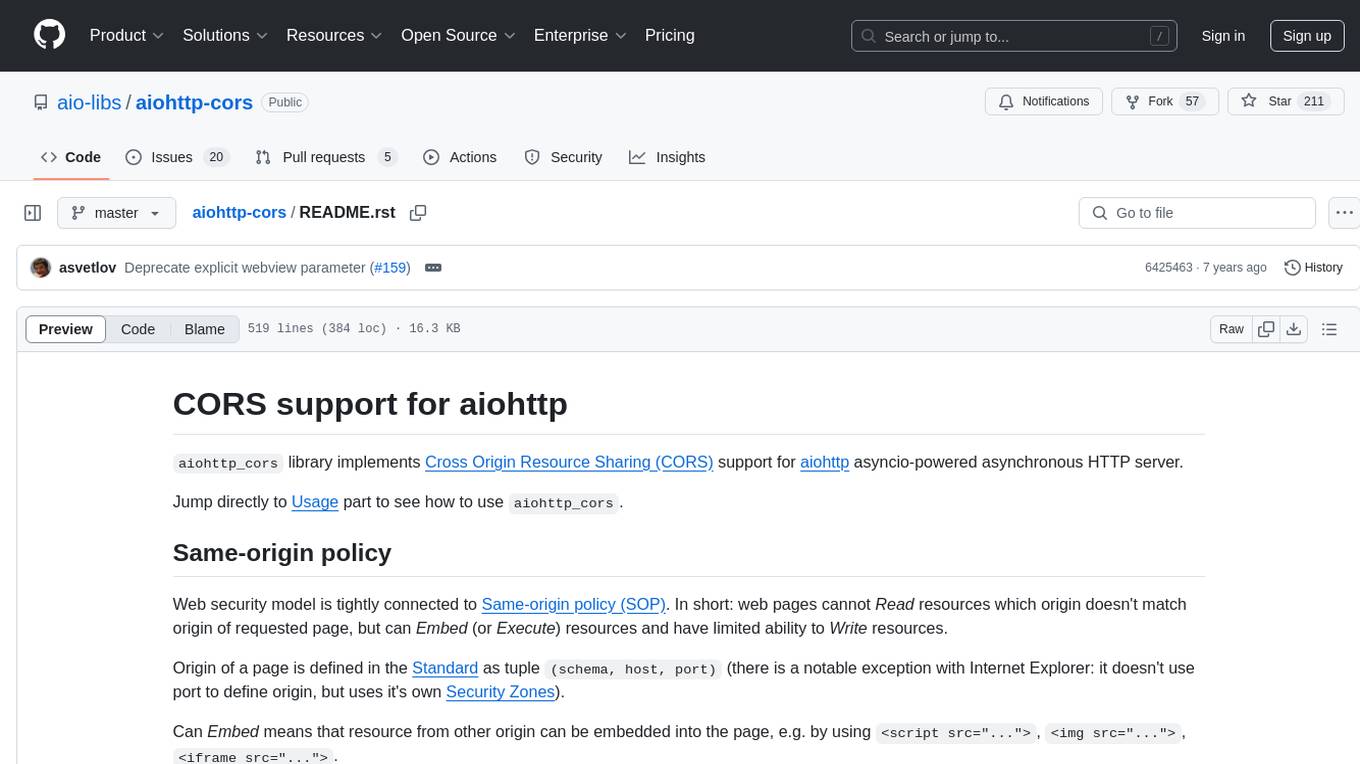
aiohttp-cors
The aiohttp_cors library provides Cross Origin Resource Sharing (CORS) support for aiohttp, an asyncio-powered asynchronous HTTP server. CORS allows overriding the Same-origin policy for specific resources, enabling web pages to access resources from different origins. The library helps configure CORS settings for resources and routes in aiohttp applications, allowing control over origins, credentials passing, headers, and preflight requests.
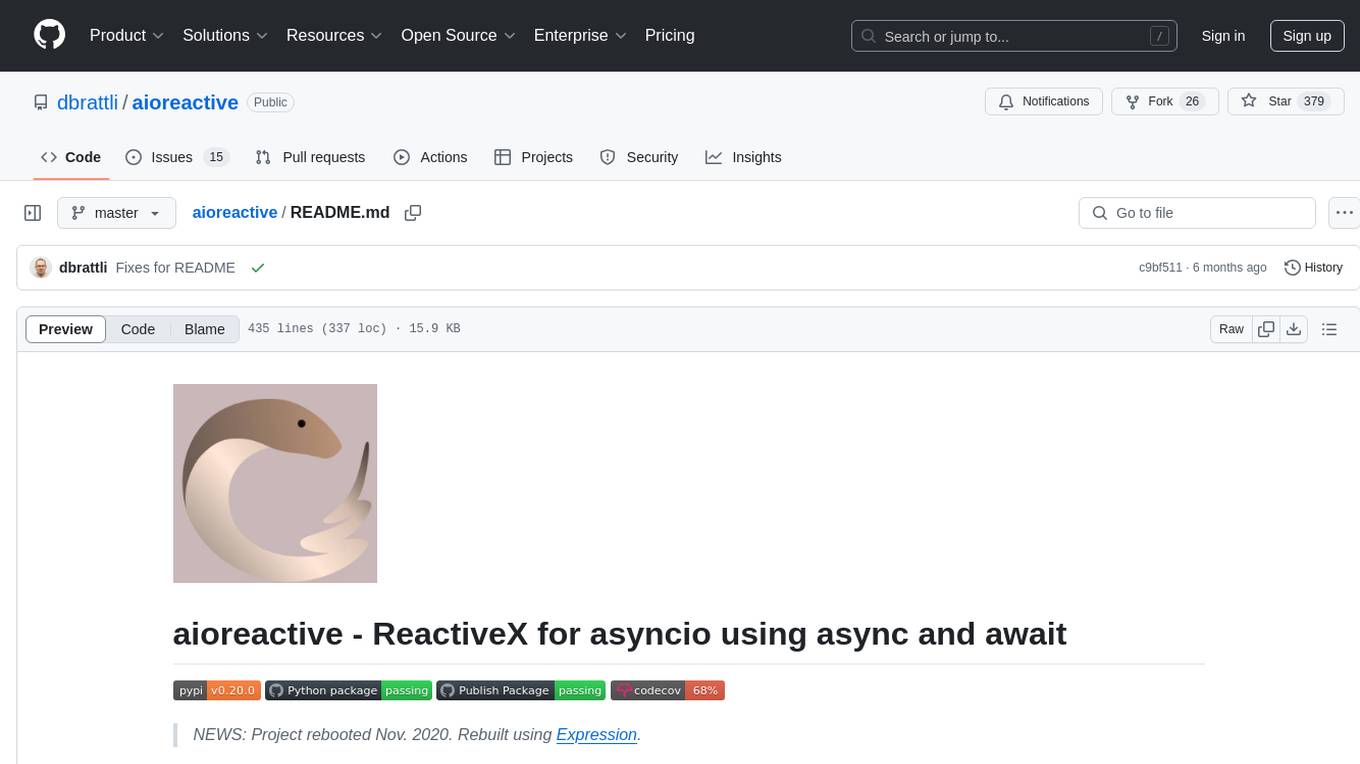
aioreactive
Aioreactive is a Python library that brings ReactiveX functionality to asyncio using async and await. It is built on the Expression functional library and aims to provide a simple, clean, and async-based approach to reactive programming in Python. The library supports Python 3.10+ and focuses on using plain old functions for operators, running on the asyncio event loop, and providing implicit synchronous back-pressure for event processing.
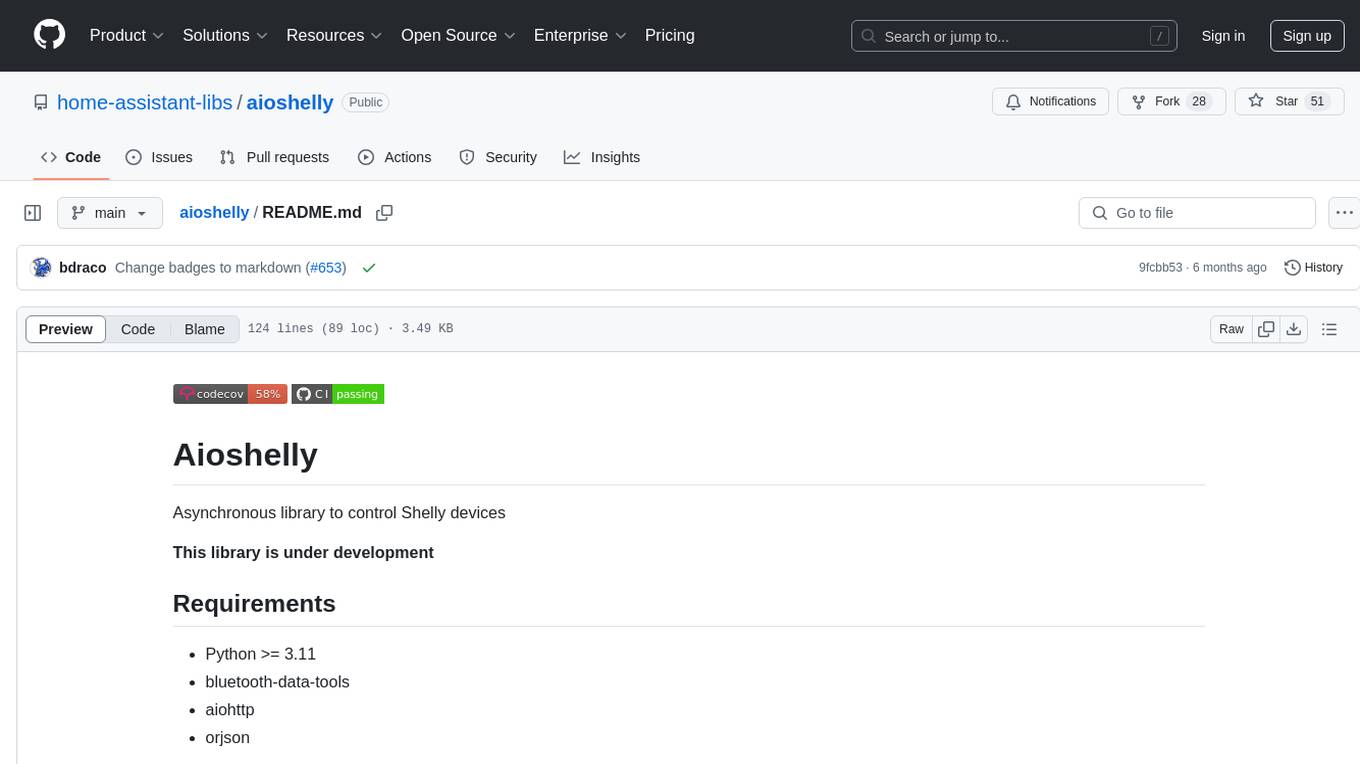
aioshelly
Aioshelly is an asynchronous library designed to control Shelly devices. It is currently under development and requires Python version 3.11 or higher, along with dependencies like bluetooth-data-tools, aiohttp, and orjson. The library provides examples for interacting with Gen1 devices using CoAP protocol and Gen2/Gen3 devices using RPC and WebSocket protocols. Users can easily connect to Shelly devices, retrieve status information, and perform various actions through the provided APIs. The repository also includes example scripts for quick testing and usage guidelines for contributors to maintain consistency with the Shelly API.
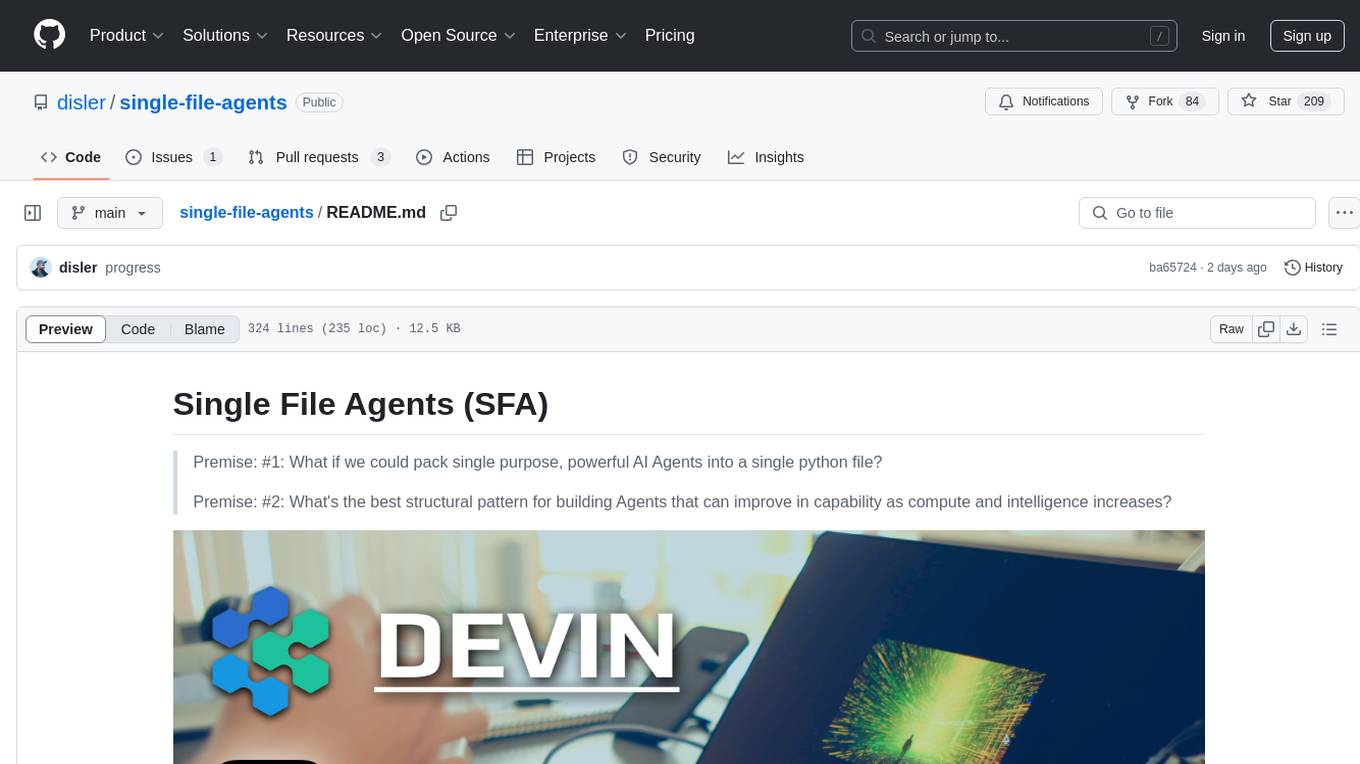
single-file-agents
Single File Agents (SFA) is a collection of powerful single-file agents built on top of uv, a modern Python package installer and resolver. These agents aim to perform specific tasks efficiently, demonstrating precise prompt engineering and GenAI patterns. The repository contains agents built across major GenAI providers like Gemini, OpenAI, and Anthropic. Each agent is self-contained, minimal, and built on modern Python for fast and reliable dependency management. Users can run these scripts from their server or directly from a gist. The agents are patternful, emphasizing the importance of setting up effective prompts, tools, and processes for reusability.
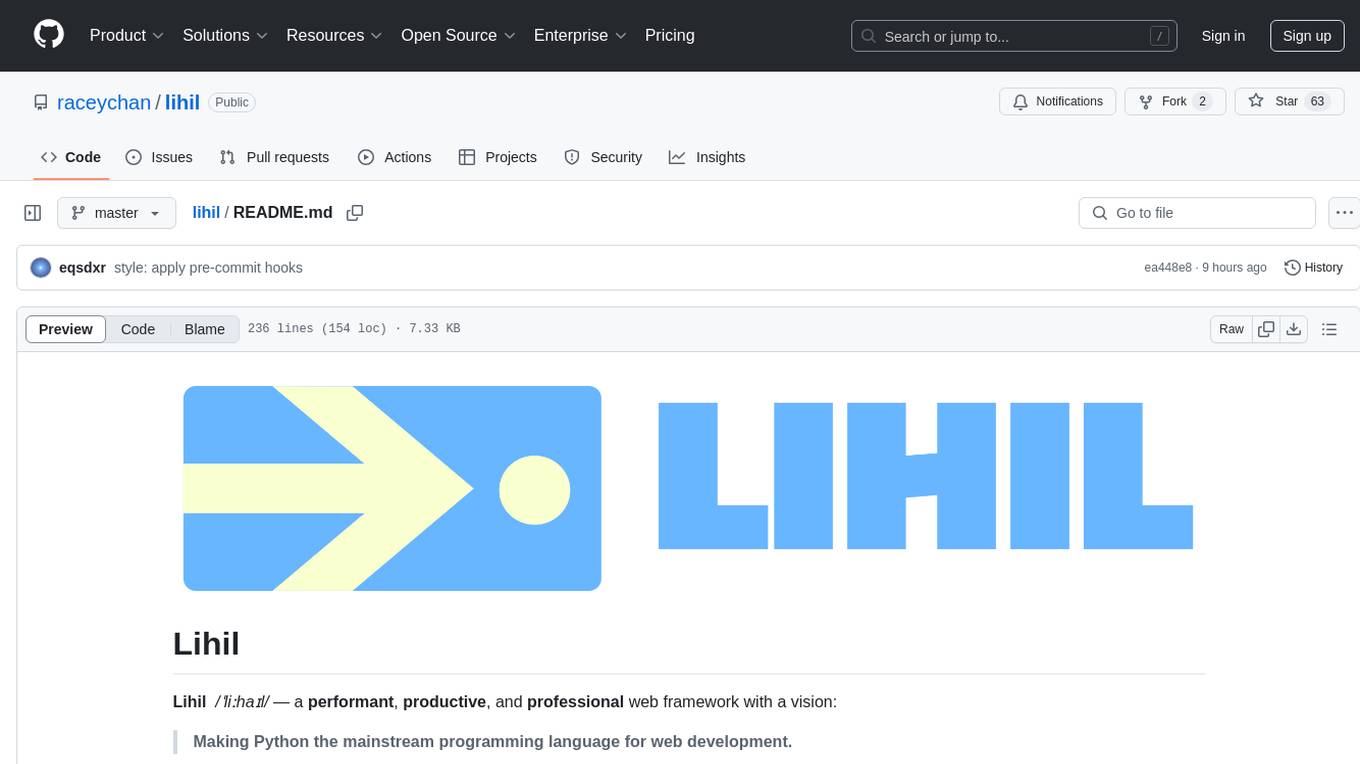
lihil
Lihil is a performant, productive, and professional web framework designed to make Python the mainstream programming language for web development. It is 100% test covered and strictly typed, offering fast performance, ergonomic API, and built-in solutions for common problems. Lihil is suitable for enterprise web development, delivering robust and scalable solutions with best practices in microservice architecture and related patterns. It features dependency injection, OpenAPI docs generation, error response generation, data validation, message system, testability, and strong support for AI features. Lihil is ASGI compatible and uses starlette as its ASGI toolkit, ensuring compatibility with starlette classes and middlewares. The framework follows semantic versioning and has a roadmap for future enhancements and features.
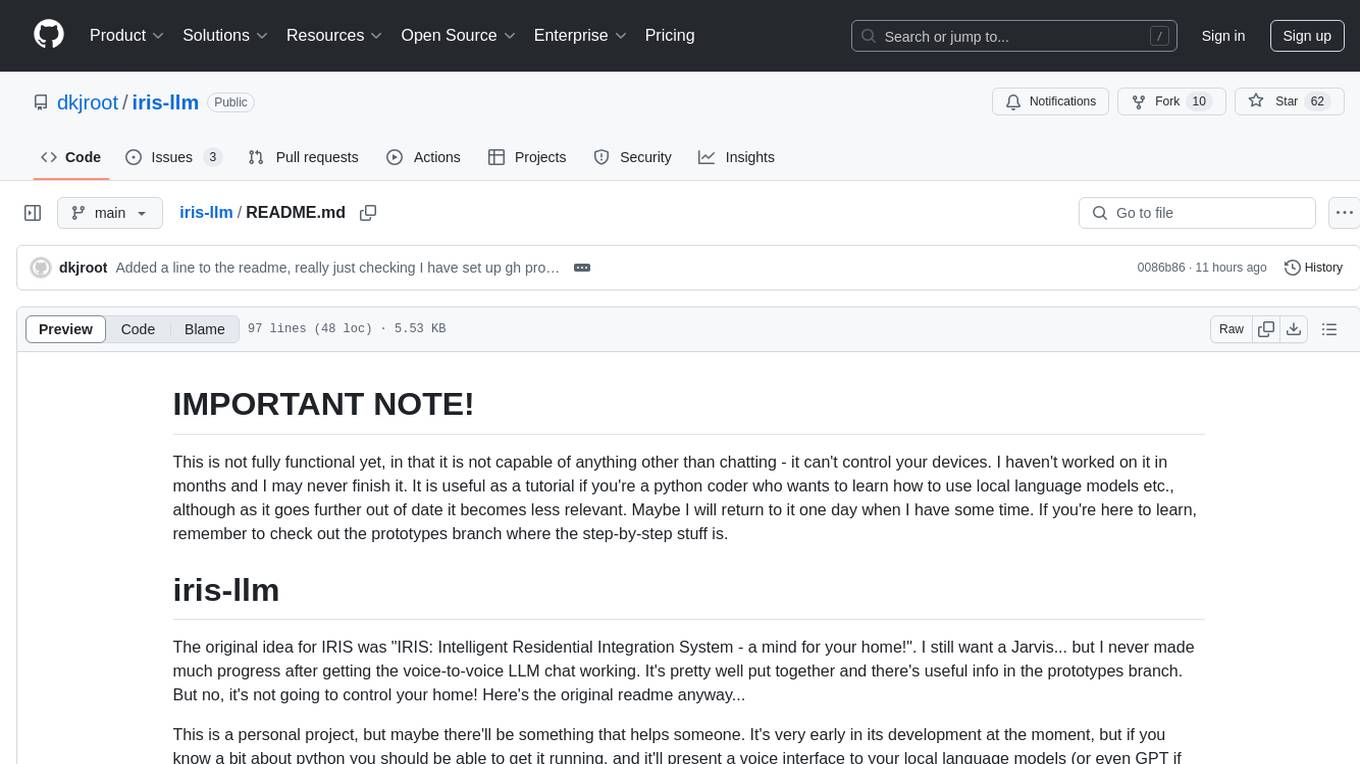
iris-llm
iris-llm is a personal project aimed at creating an Intelligent Residential Integration System (IRIS) with a voice interface to local language models or GPT. It provides options for chat engines, text-to-speech engines, speech-to-text engines, feedback sounds, and push-to-talk or wake word features. The tool is still in early development and serves as a tutorial for Python coders interested in working with language models.
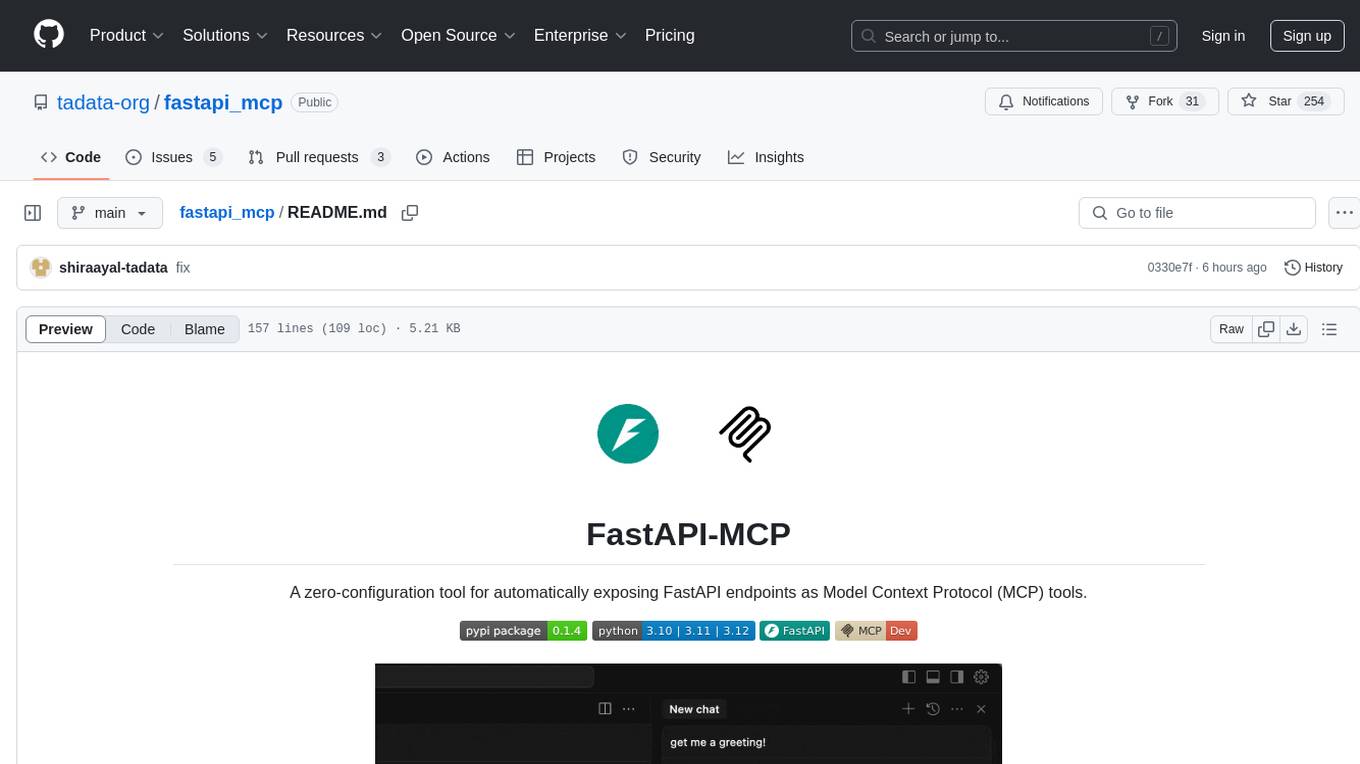
fastapi_mcp
FastAPI-MCP is a zero-configuration tool that automatically exposes FastAPI endpoints as Model Context Protocol (MCP) tools. It allows for direct integration with FastAPI apps, automatic discovery and conversion of endpoints to MCP tools, preservation of request and response schemas, documentation preservation similar to Swagger, and the ability to extend with custom MCP tools. Users can easily add an MCP server to their FastAPI application and customize the server creation and configuration. The tool supports connecting to the MCP server using SSE or mcp-proxy stdio for different MCP clients. FastAPI-MCP is developed and maintained by Tadata Inc.
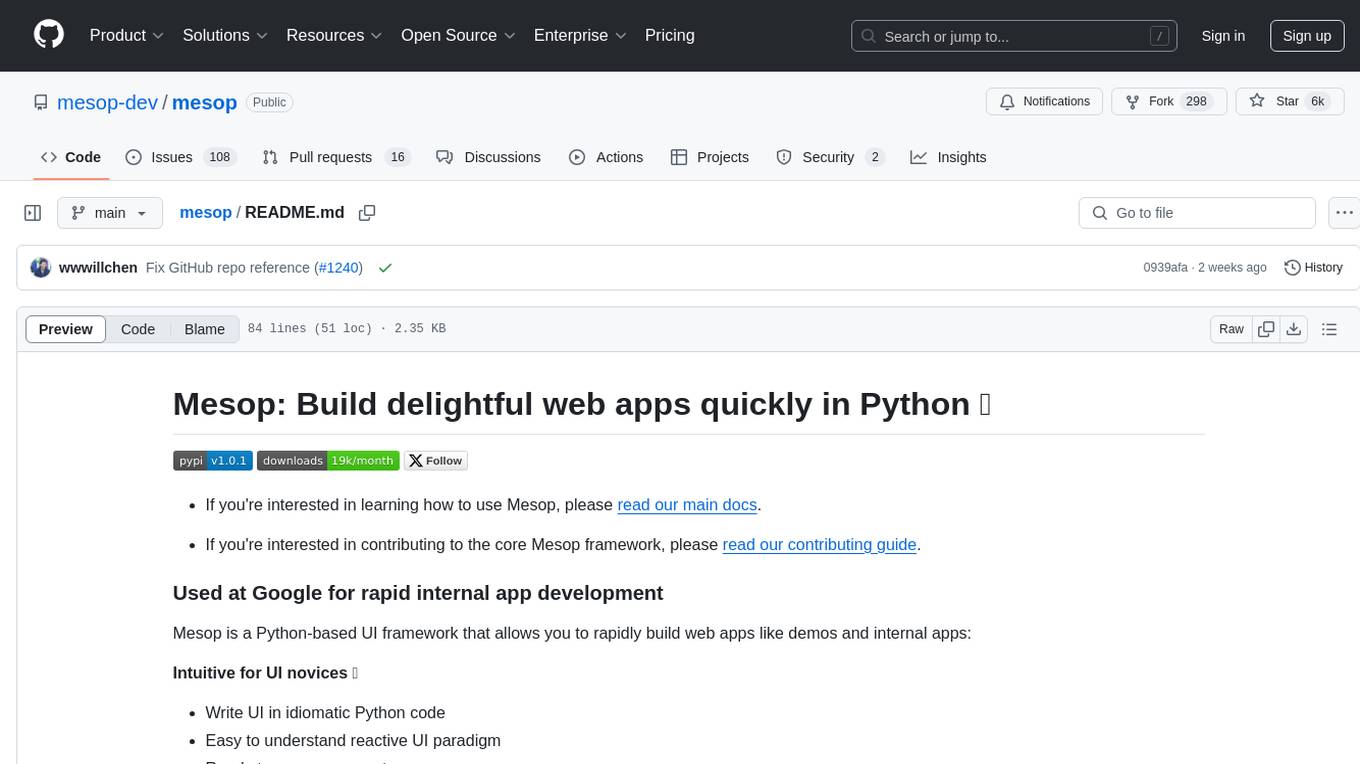
mesop
Mesop is a Python-based UI framework designed for rapid web app development, particularly for demos and internal apps. It allows users to write UI in Python code, offers reactive UI paradigm, ready-to-use components, hot reload feature, rich IDE support, and the ability to build custom UIs without writing Javascript/CSS/HTML. Mesop is intuitive for UI novices, provides frictionless developer workflows, and is flexible for creating delightful demos. It is used at Google for rapid internal app development.
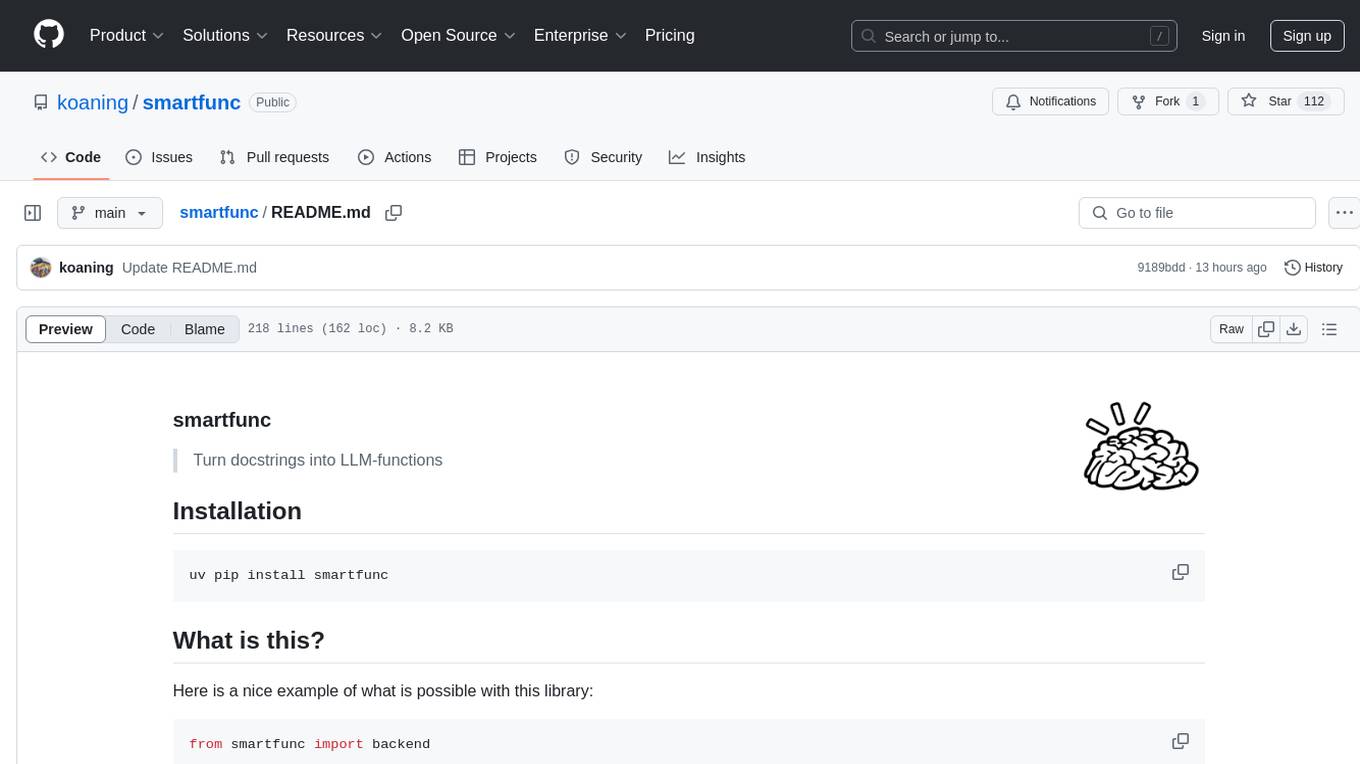
smartfunc
smartfunc is a Python library that turns docstrings into LLM-functions. It wraps around the llm library to parse docstrings and generate prompts at runtime using Jinja2 templates. The library offers syntactic sugar on top of llm, supporting backends for different LLM providers, async support for microbatching, schema support using Pydantic models, and the ability to store API keys in .env files. It simplifies rapid prototyping by focusing on specific features and providing flexibility in prompt engineering. smartfunc also supports async functions and debug mode for debugging prompts and responses.
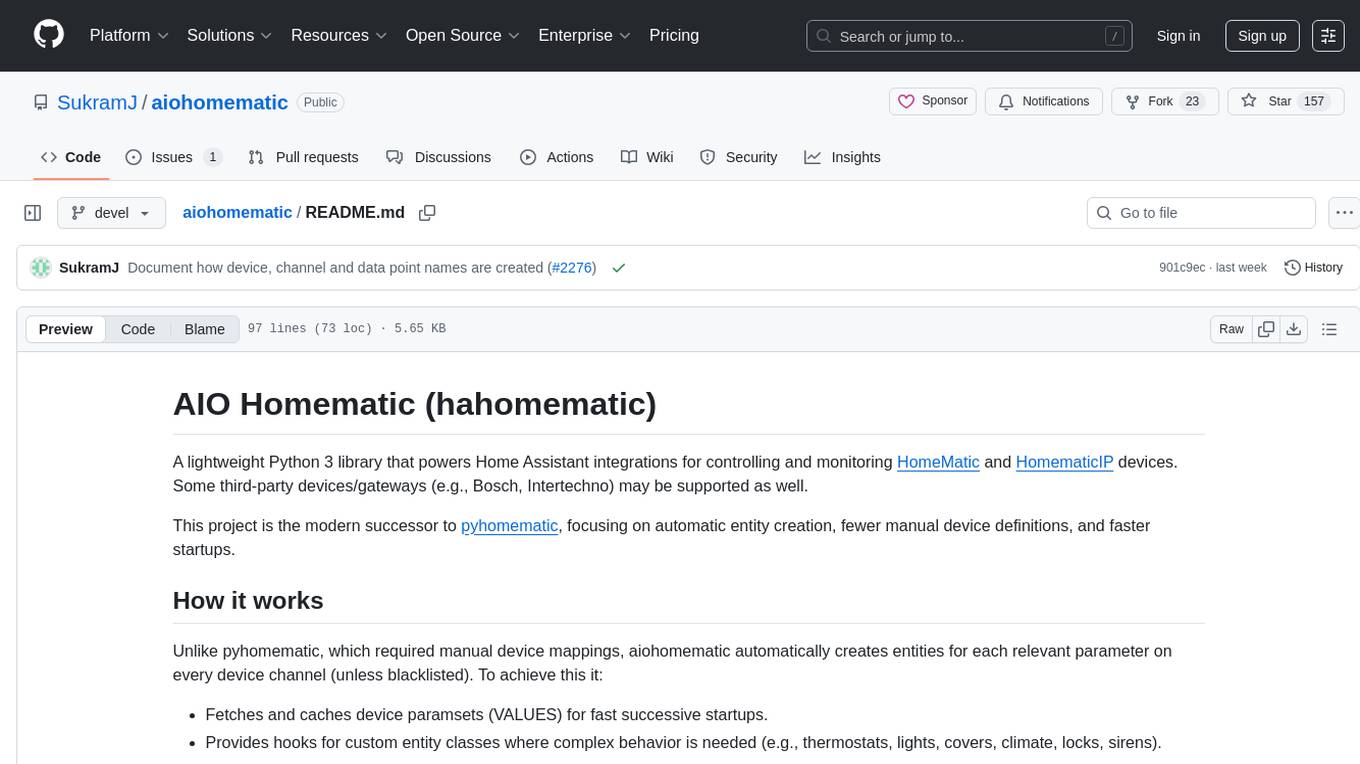
aiohomematic
AIO Homematic (hahomematic) is a lightweight Python 3 library for controlling and monitoring HomeMatic and HomematicIP devices, with support for third-party devices/gateways. It automatically creates entities for device parameters, offers custom entity classes for complex behavior, and includes features like caching paramsets for faster restarts. Designed to integrate with Home Assistant, it requires specific firmware versions for HomematicIP devices. The public API is defined in modules like central, client, model, exceptions, and const, with example usage provided. Useful links include changelog, data point definitions, troubleshooting, and developer resources for architecture, data flow, model extension, and Home Assistant lifecycle.
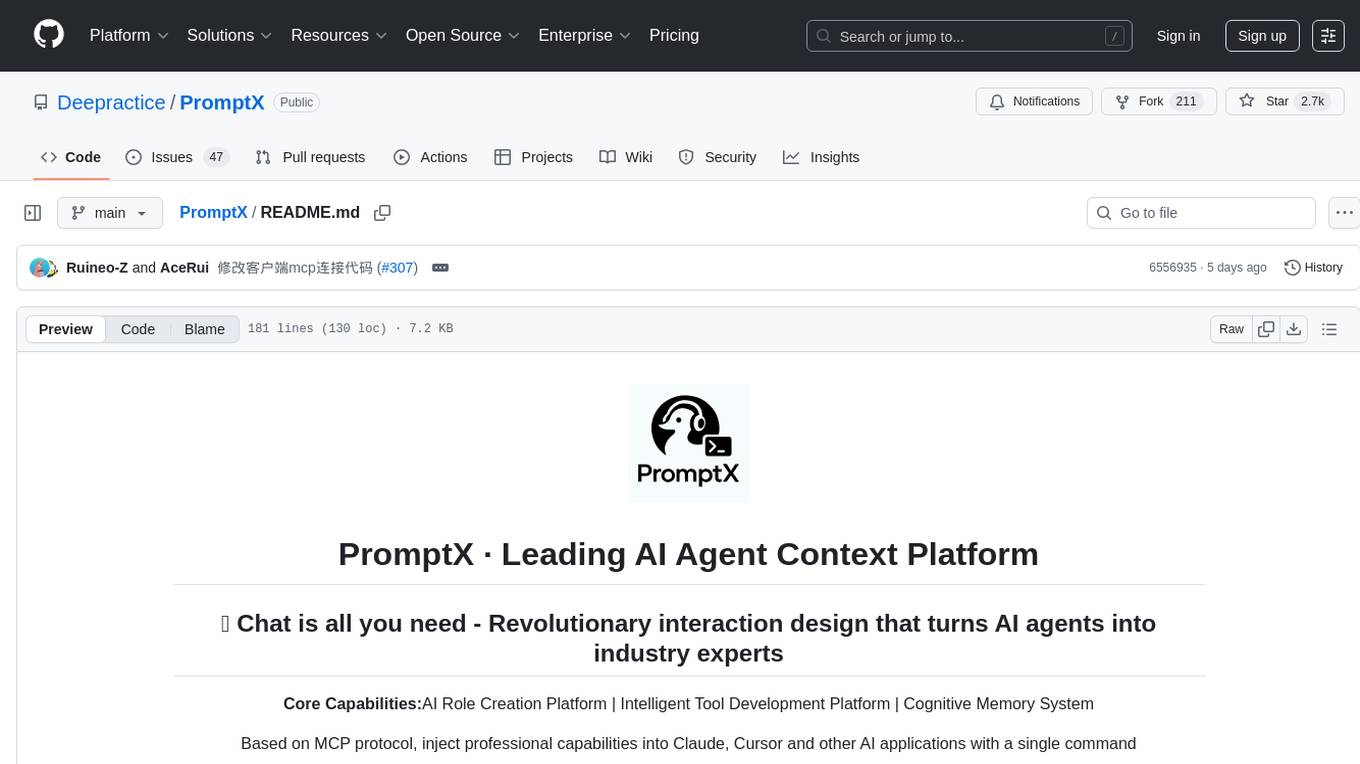
PromptX
PromptX is a leading AI agent context platform that revolutionizes interaction design, enabling AI agents to become industry experts. It offers core capabilities such as an AI role creation platform, intelligent tool development platform, and cognitive memory system. PromptX allows users to easily discover experts, summon them for assistance, and engage in professional dialogues through natural conversations. The platform's core philosophy emphasizes treating AI as a person, enabling users to communicate naturally without the need for complex commands. With Nuwa Creation Workshop, users can design custom AI roles using meta-prompt technology, transforming abstract needs into concrete executable AI expert roles in just minutes.
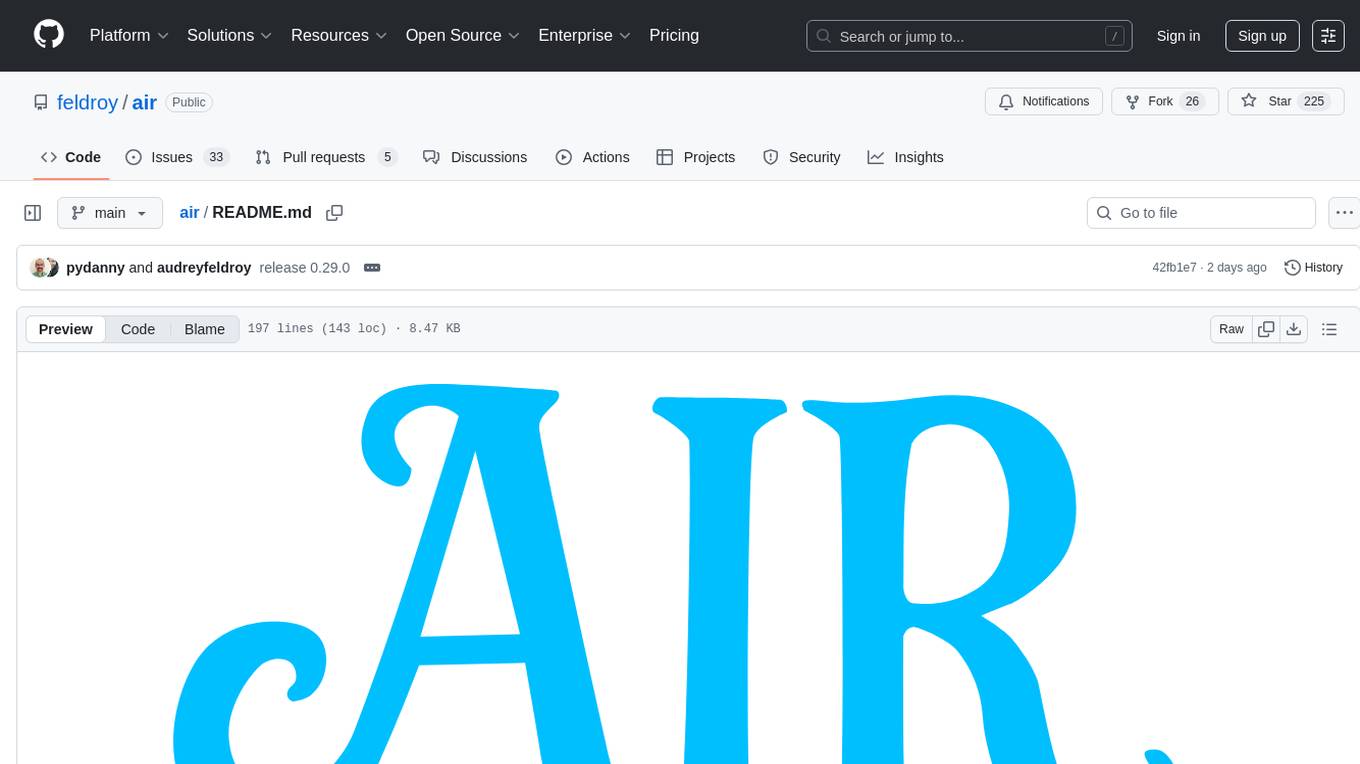
air
Air is a new web framework for Python web development, built with FastAPI, Starlette, and Pydantic. It provides intuitive shortcuts and optimizations to expedite coding HTML with FastAPI, easy HTML content generation using Python classes, and seamless integration with Jinja templates. Air also offers utilities for using HTMX, HTML form validation powered by pydantic, and well-documented features. It aims to combine sophisticated HTML pages and a REST API into one app, making it easy to use FastAPI and Air together.
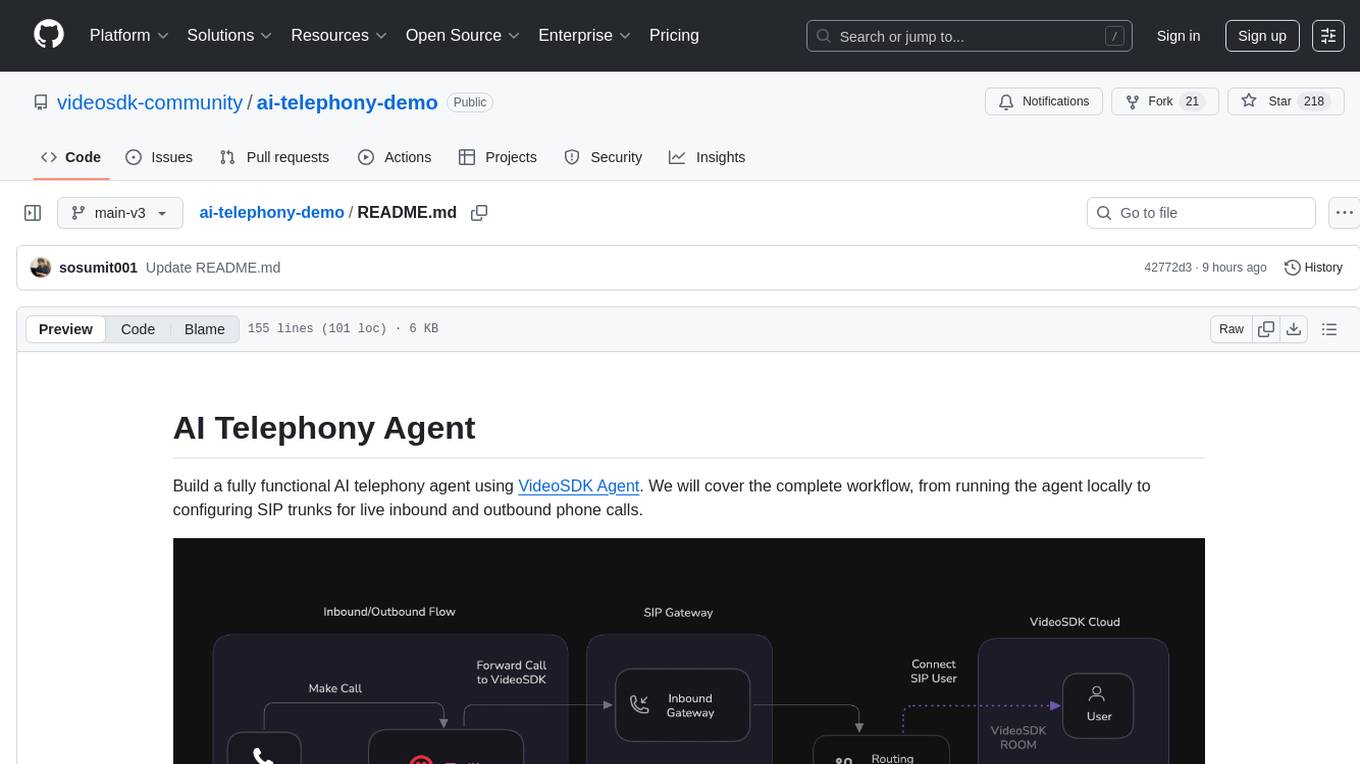
ai-telephony-demo
Build a fully functional AI telephony agent using VideoSDK Agent. The project covers setting up the agent locally, configuring SIP trunks for inbound and outbound calls, and connecting the agent to the phone network. It provides step-by-step instructions, including creating environment variables, installing dependencies, and running the Python script. The agent can handle incoming calls, greet users, engage in conversations using natural speech, and respond using the Gemini Live model with voice synthesis. Additionally, it explains how to make outbound calls through API requests to the VideoSDK SIP endpoint. The project aims to help users create and deploy an AI agent for telephony tasks.
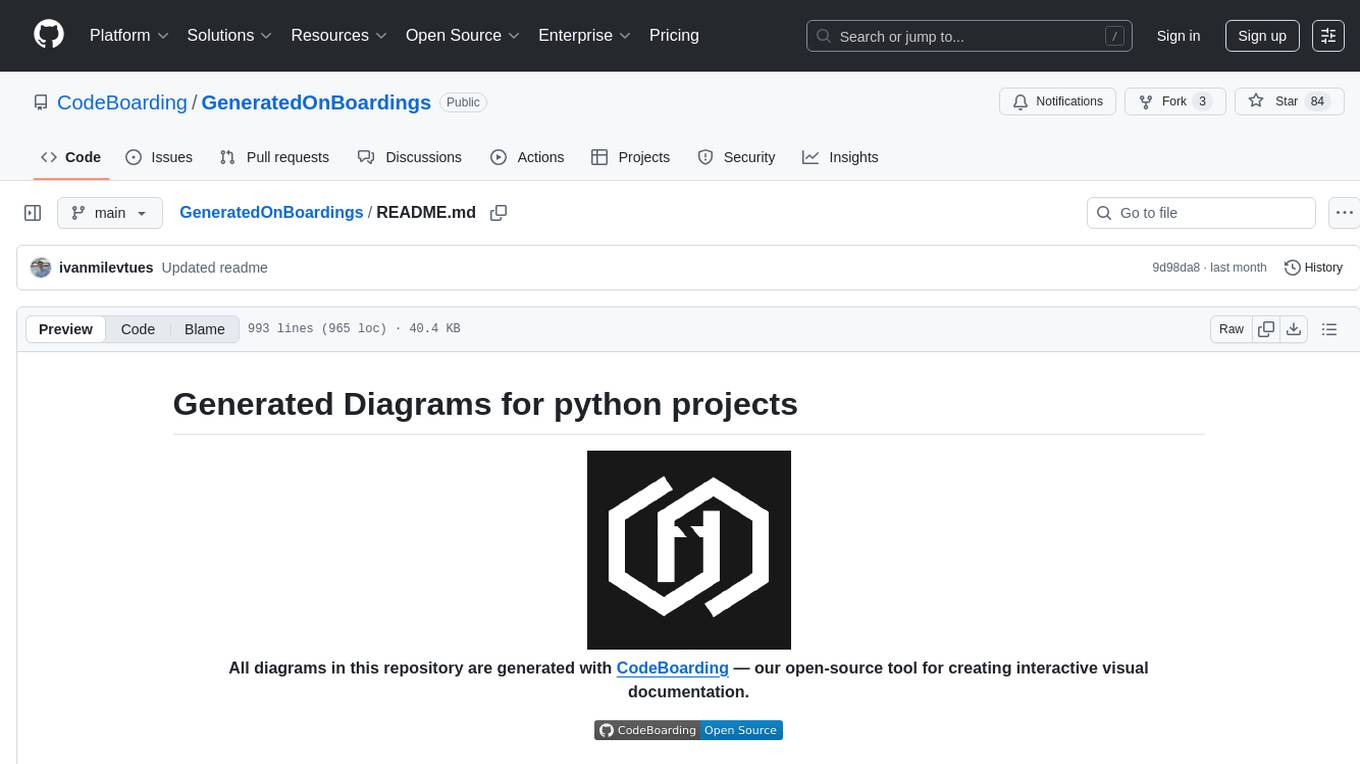
GeneratedOnBoardings
GeneratedOnBoardings is a repository containing automatically generated onboarding diagrams for over 800+ Python projects using CodeBoarding, an open-source tool for creating interactive visual documentation. The tool helps developers explore unfamiliar codebases through visual documentation, making it easier to understand and contribute to open-source projects. Users can provide feedback to improve the tool, and can also generate onboarding diagrams for their own projects by running CodeBoarding locally or trying the online demo at CodeBoarding.org/demo.
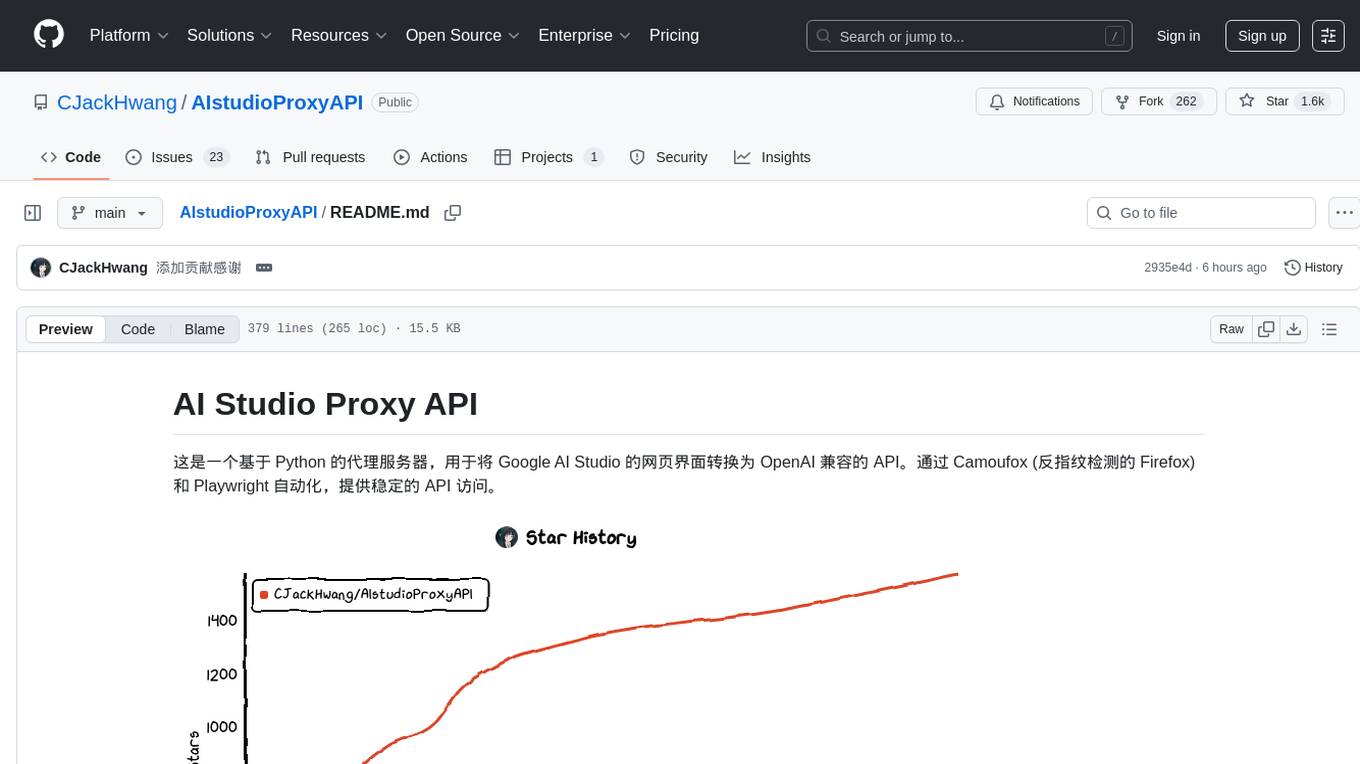
AIstudioProxyAPI
AI Studio Proxy API is a Python-based proxy server that converts the Google AI Studio web interface into an OpenAI-compatible API. It provides stable API access through Camoufox (anti-fingerprint detection Firefox) and Playwright automation. The project offers an OpenAI-compatible API endpoint, a three-layer streaming response mechanism, dynamic model switching, complete parameter control, anti-fingerprint detection, script injection functionality, modern web UI, graphical interface launcher, flexible authentication system, modular architecture, unified configuration management, and modern development tools.

AI-windows-whl
AI-windows-whl is a curated collection of pre-compiled Python wheels for difficult-to-install AI/ML libraries on Windows. It addresses the common pain point of building complex Python packages from source on Windows by providing direct links to pre-compiled `.whl` files for essential libraries like PyTorch, Flash Attention, xformers, SageAttention, NATTEN, Triton, bitsandbytes, and other packages. The goal is to save time for AI enthusiasts and developers on Windows, allowing them to focus on creating amazing things with AI.
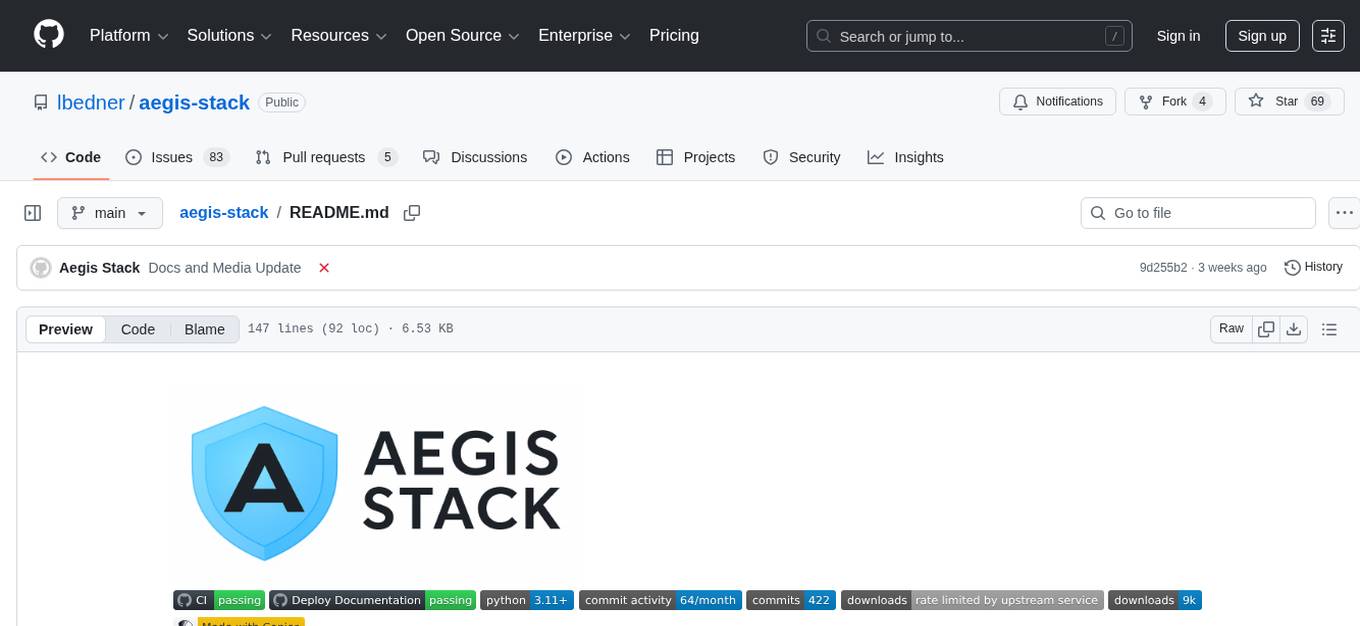
aegis-stack
Aegis Stack is a system for creating and evolving modular Python applications quickly, without the need for extensive testing or clean architecture. It allows users to go from idea to working prototype rapidly, using familiar tools. The stack includes a CLI, a built-in system dashboard called Overseer, and an optional conversational interface named Illiana. Users can start with basic components and add or remove features as needed, without being locked into initial choices. Aegis Stack aims to provide a flexible and efficient development environment for Python applications.
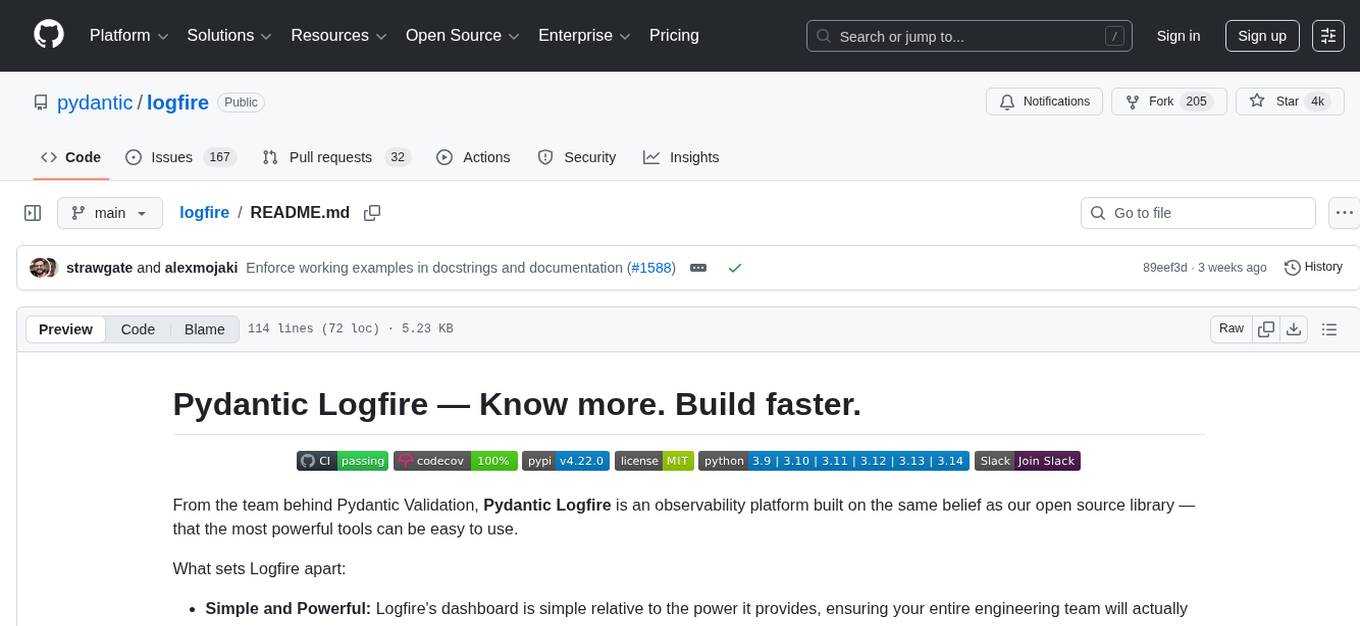
logfire
Pydantic Logfire is an observability platform that provides simple and powerful dashboard, Python-centric insights, SQL querying, OpenTelemetry integration, and Pydantic validation analytics. It offers unparalleled visibility into Python applications' behavior and allows querying data using standard SQL. Logfire is an opinionated wrapper around OpenTelemetry, supporting traces, metrics, and logs. The Python SDK for logfire is open source, while the server application for recording and displaying data is closed source.
63 - OpenAI Gpts
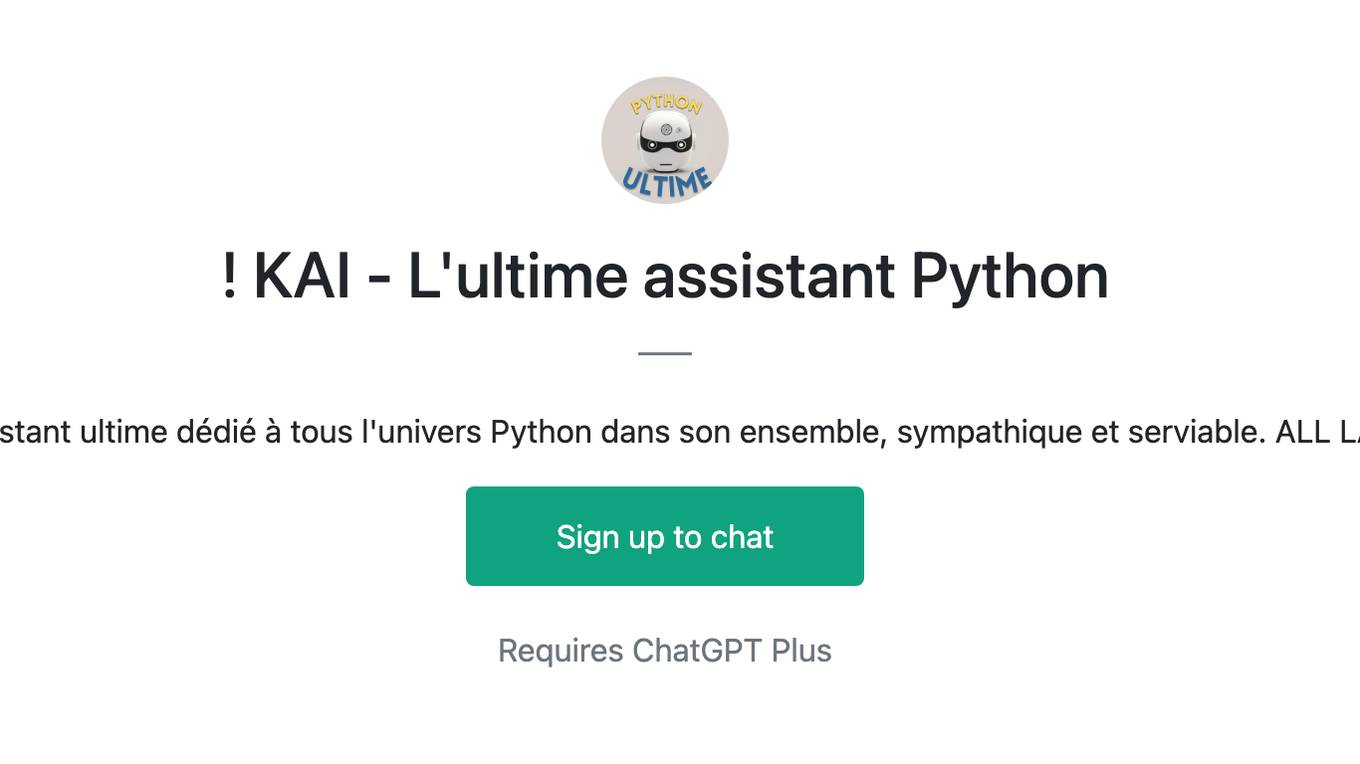
! KAI - L'ultime assistant Python
KAI, votre assistant ultime dédié à tous l'univers Python dans son ensemble, sympathique et serviable. ALL LANGUAGES.

Python Mentor
AI guide for Python certification PCEP and PCAP with project-based, exam-focused learning.

DIY Maker Workshop
Your Expert DIY Maker and Coding Assistant ... Electronics, Microcontrollers, 3D-Printing, Python Code, HTML, C++, JSON, C, Arduino IDE
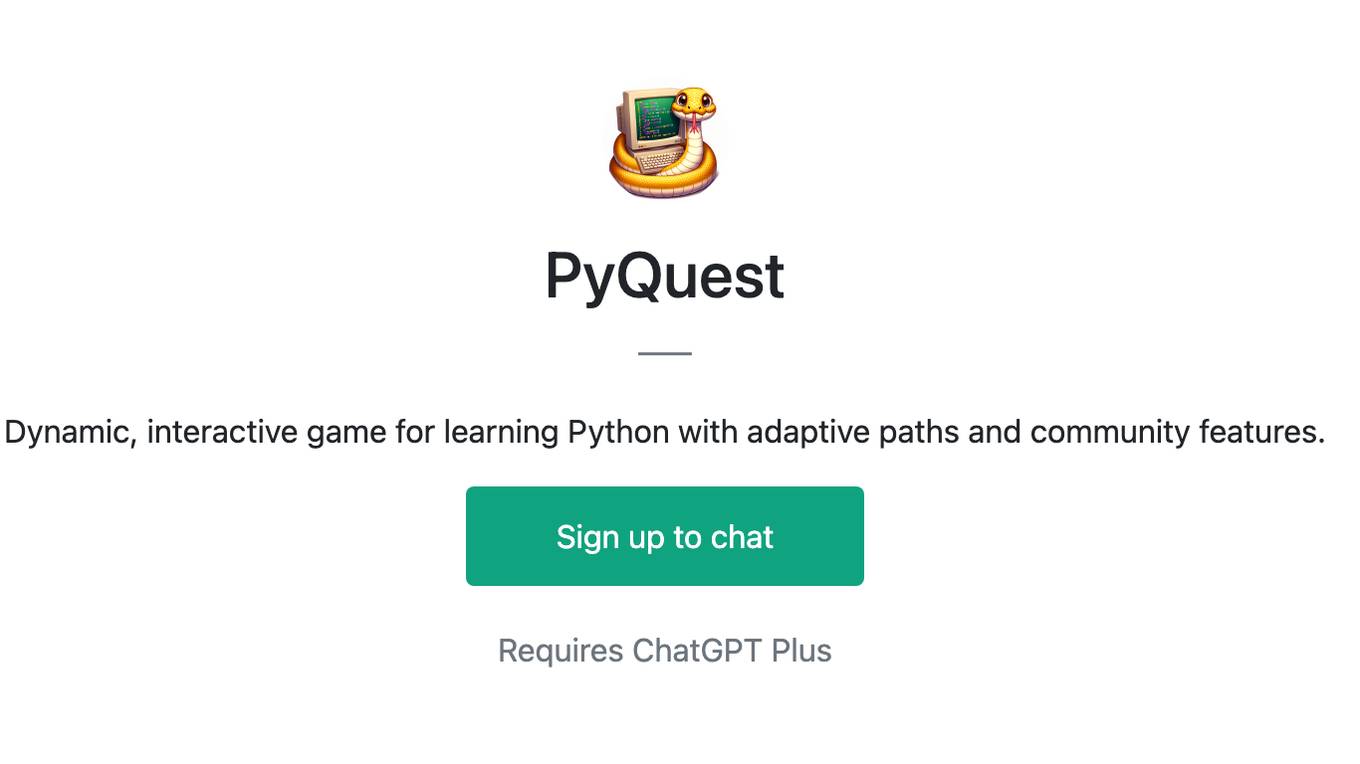
PyQuest
Dynamic, interactive game for learning Python with adaptive paths and community features.
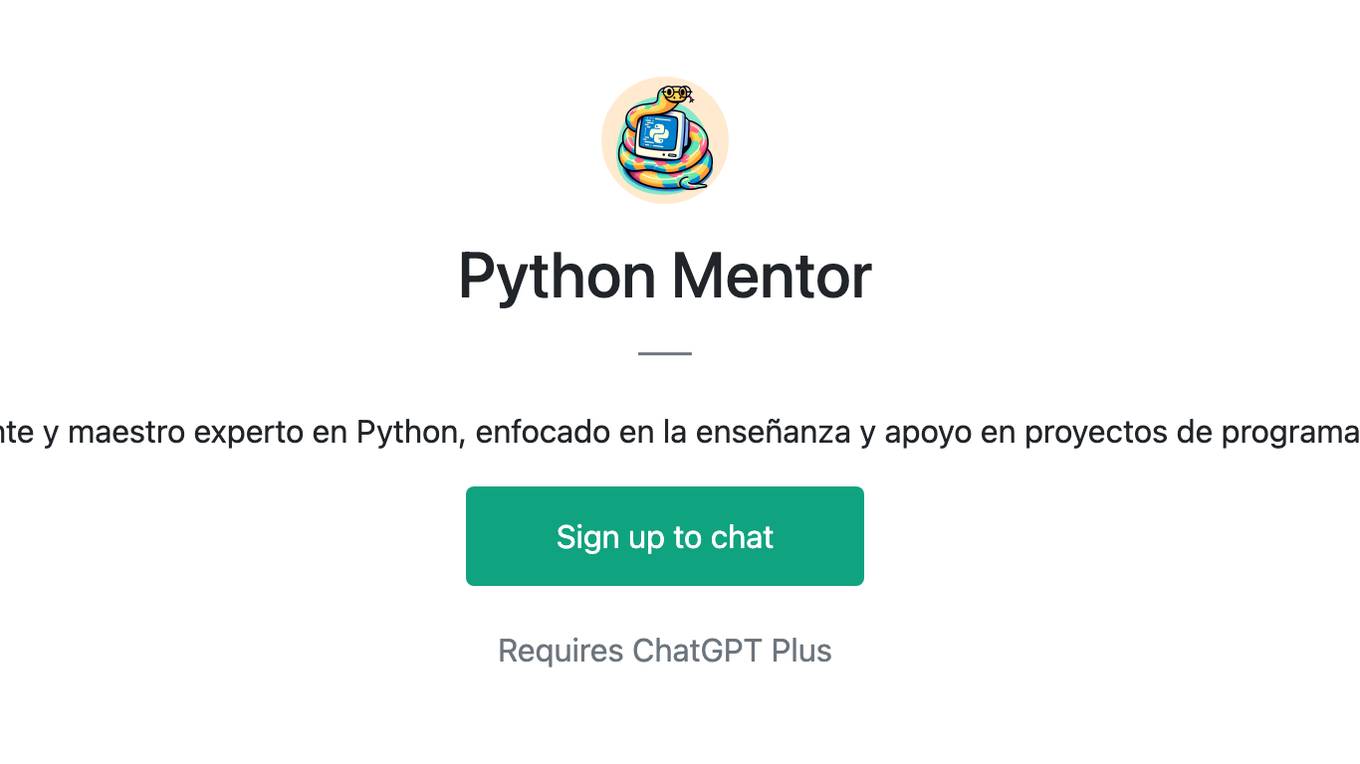
Python Mentor
Asistente y maestro experto en Python, enfocado en la enseñanza y apoyo en proyectos de programación.
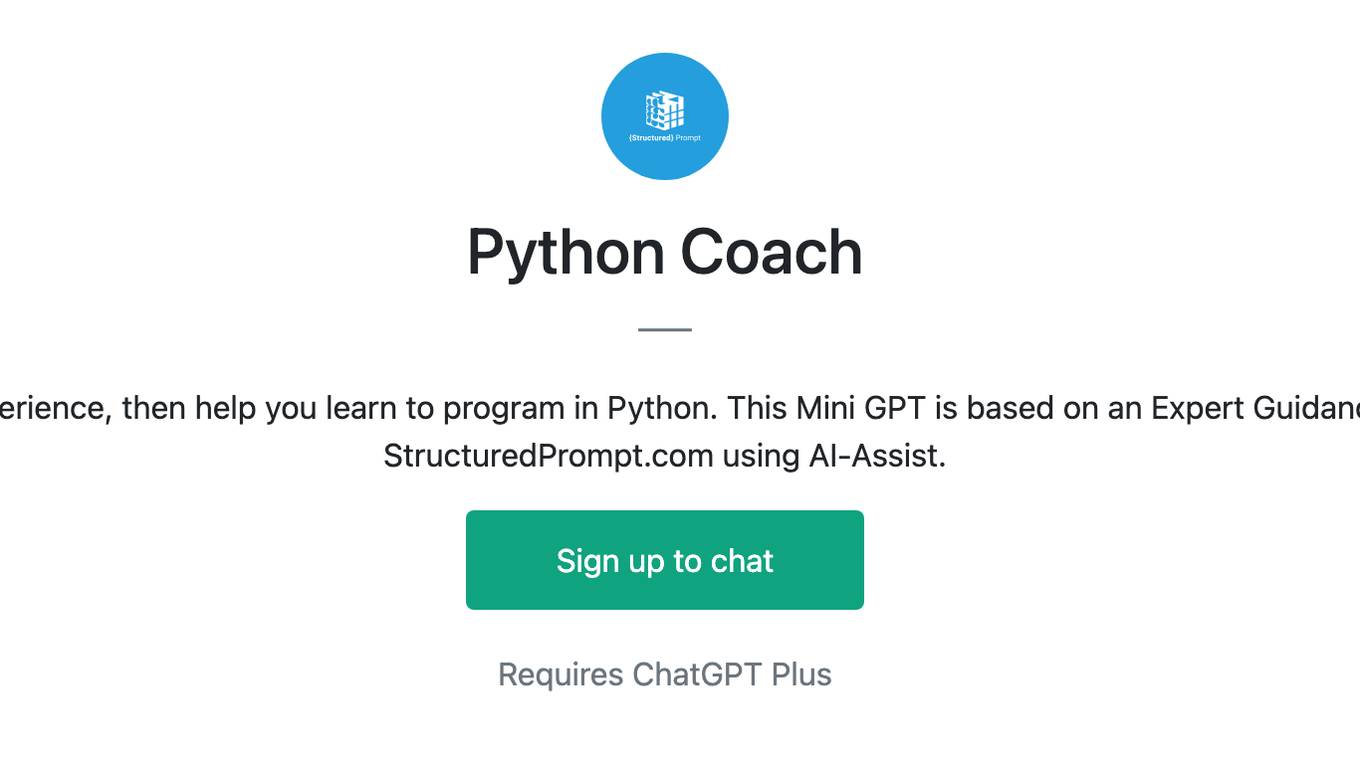
Python Coach
I will start by asking you for your level of experience, then help you learn to program in Python. This Mini GPT is based on an Expert Guidance Prompt created in under 3 minutes with StructuredPrompt.com using AI-Assist.

Django Helper
Help web programmers to learn best Django practises and use smart defaults. Get things done really fast!
![[サンプル] InterviewCat Backend Questions Screenshot](/screenshots_gpts/g-sC05Z23Zt.jpg)
[サンプル] InterviewCat Backend Questions
問題集からバックエンドの技術質問(57+問)をランダムで出題します。回答に対して点数、評価ポイント、改善点を出し、最終的に面接に合格したかどうかを判断します。こちらはサンプルバージョンです。掲載問題数は減らしています。

Python Seniorify
Wise Python tutor for intermediate coders, focusing on advanced coding principles.
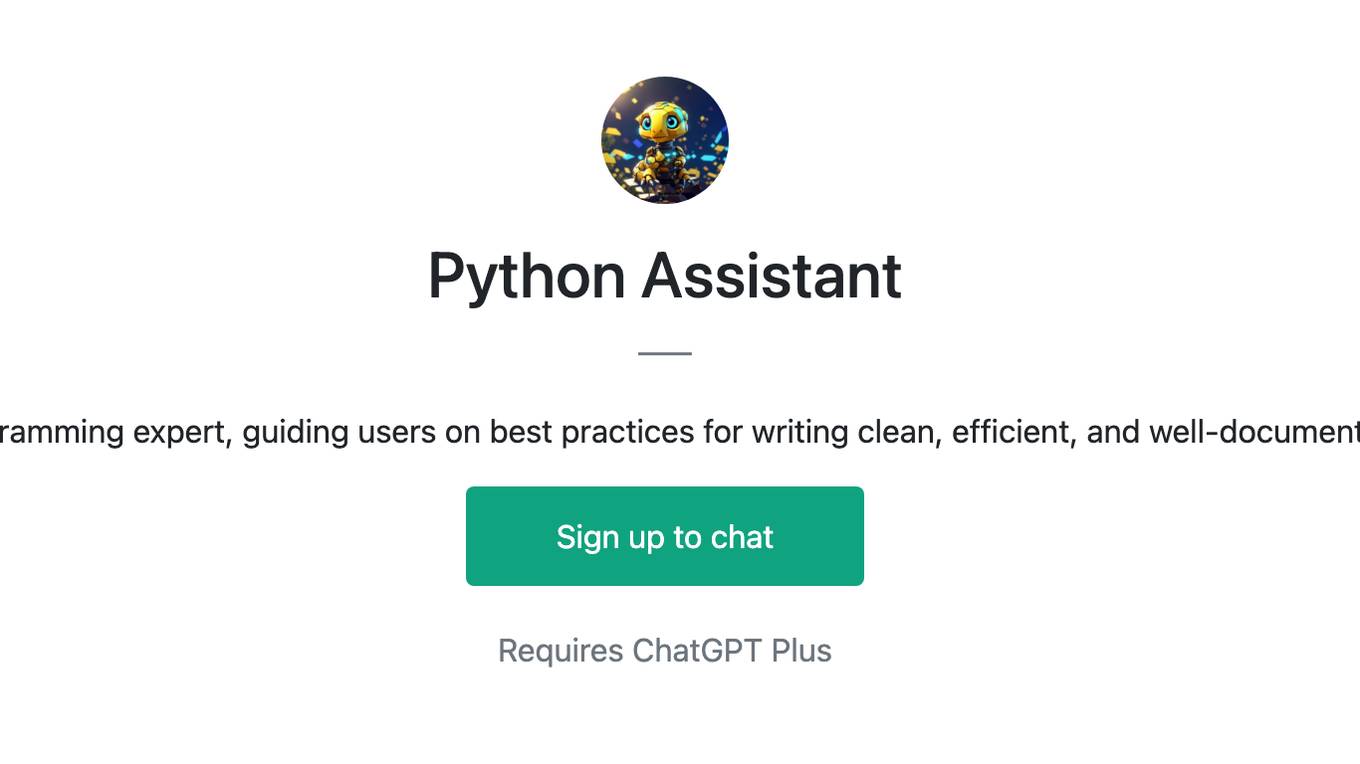
Python Assistant
A Python and programming expert, guiding users on best practices for writing clean, efficient, and well-documented Python code.
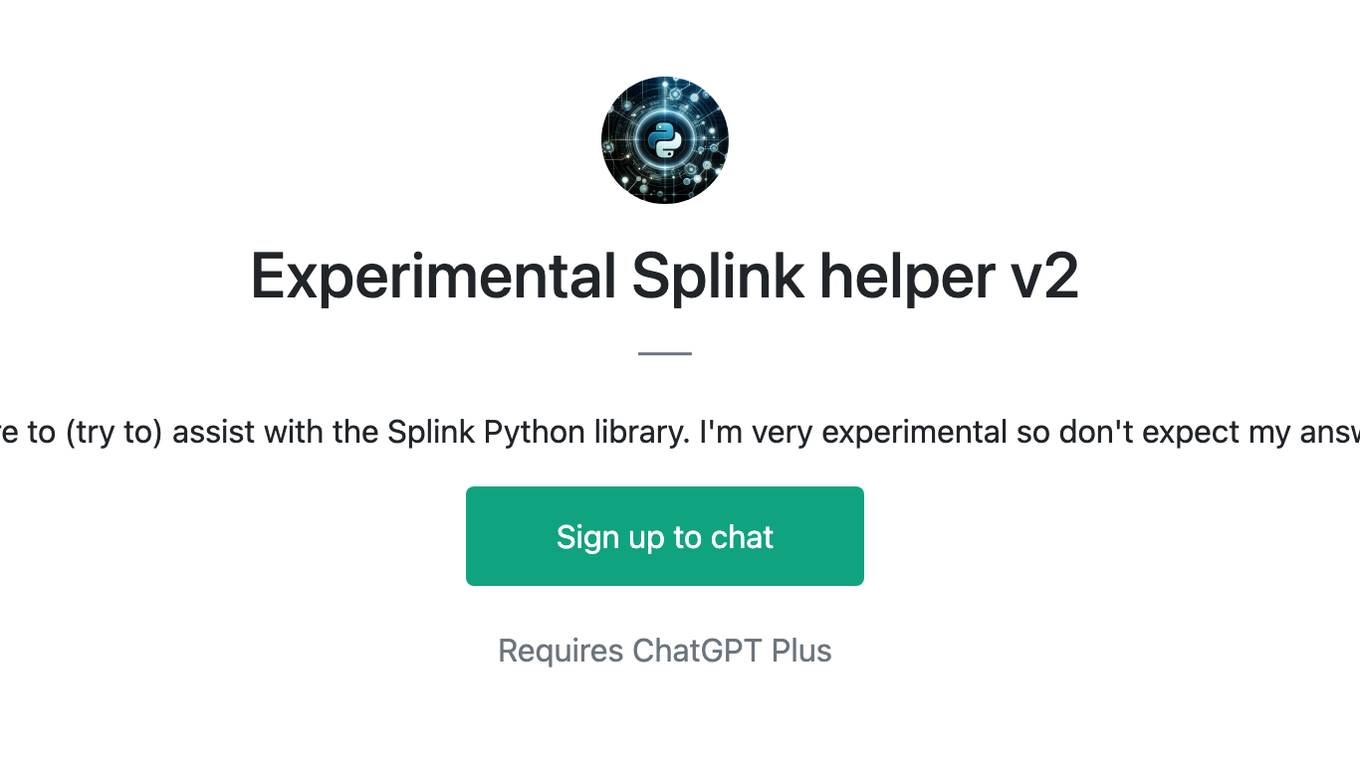
Experimental Splink helper v2
I'm Splink Helper, here to (try to) assist with the Splink Python library. I'm very experimental so don't expect my answers to be accurate

Python Puzzle Master
I offer engaging Python puzzles, explain solutions and immediately present the next challenge.
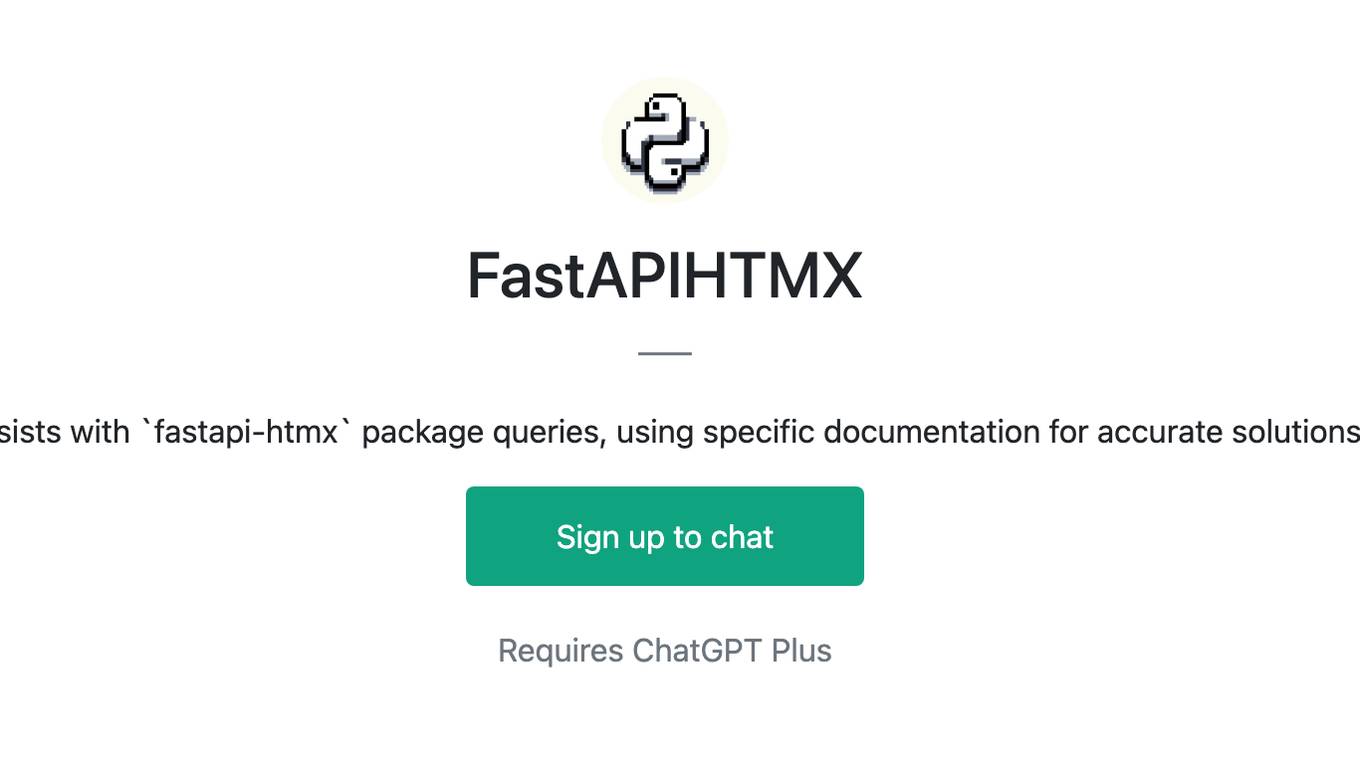
FastAPIHTMX
Assists with `fastapi-htmx` package queries, using specific documentation for accurate solutions.
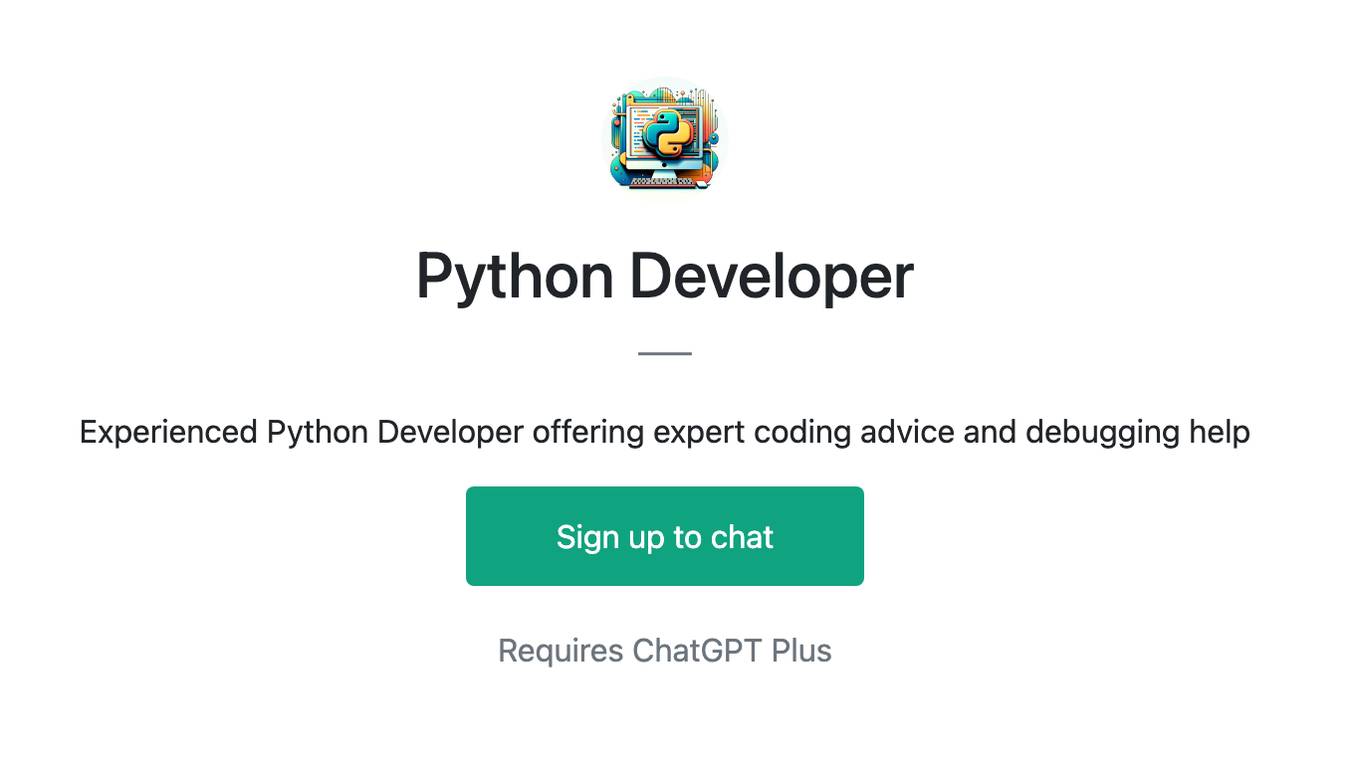
Python Developer
Experienced Python Developer offering expert coding advice and debugging help
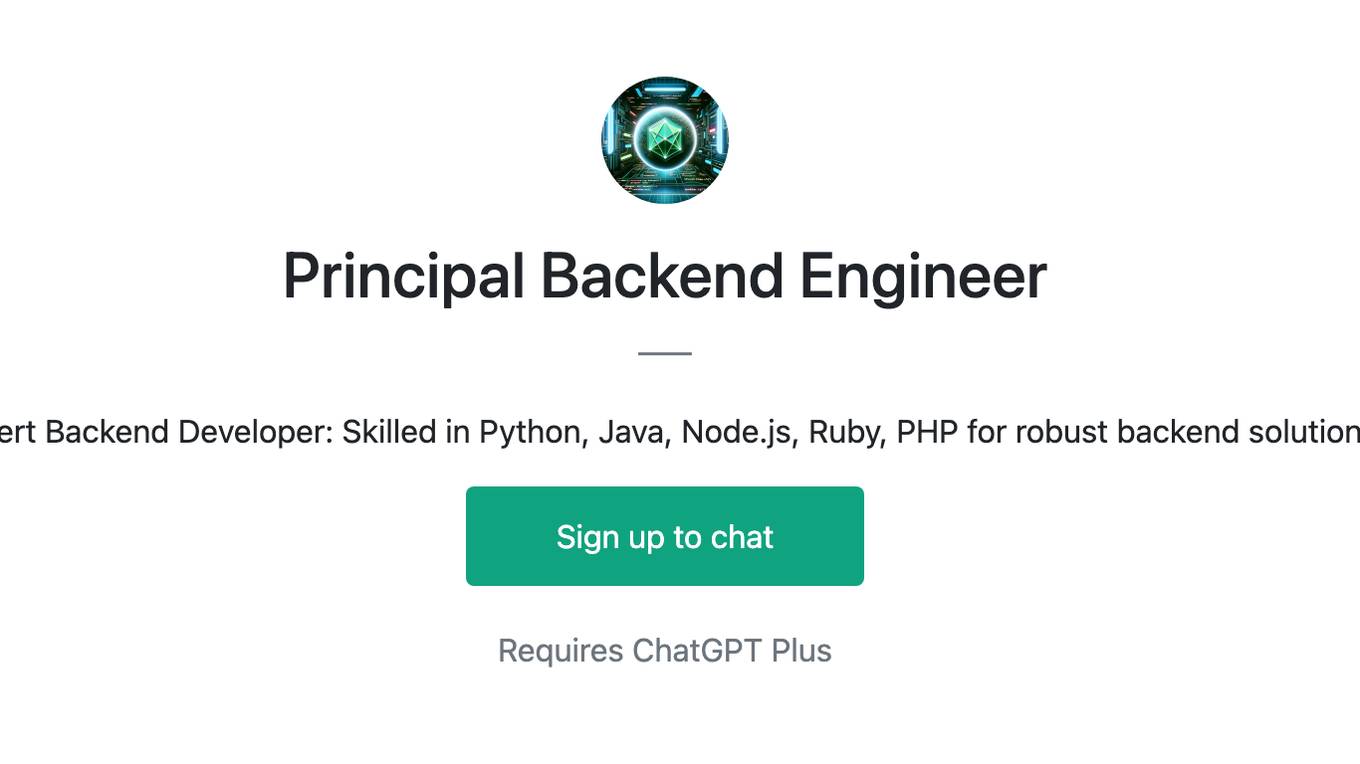
Principal Backend Engineer
Expert Backend Developer: Skilled in Python, Java, Node.js, Ruby, PHP for robust backend solutions.
Smart Manoj AI
A specialized AI sharing insights about Manojkumar Palanisamy, his Python, GPT, and machine learning expertise, and interests.
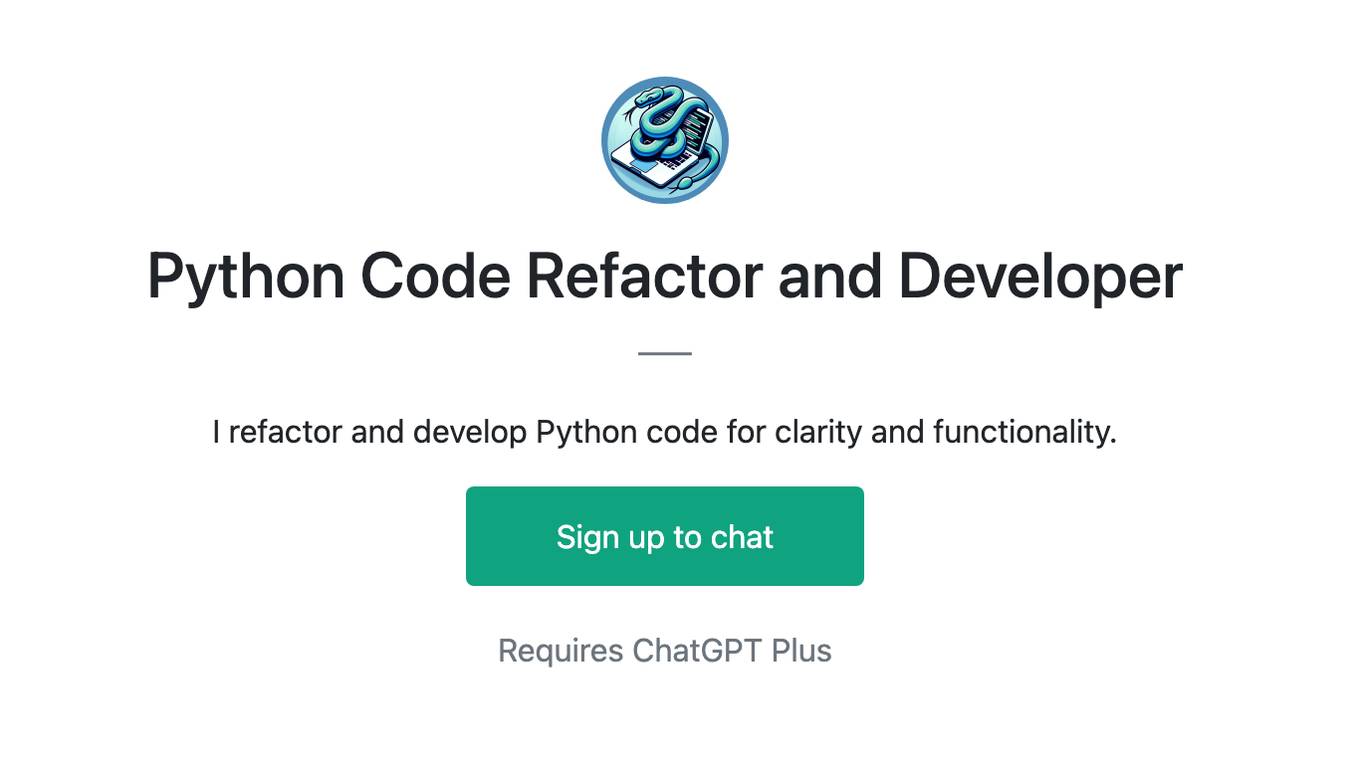
Python Code Refactor and Developer
I refactor and develop Python code for clarity and functionality.
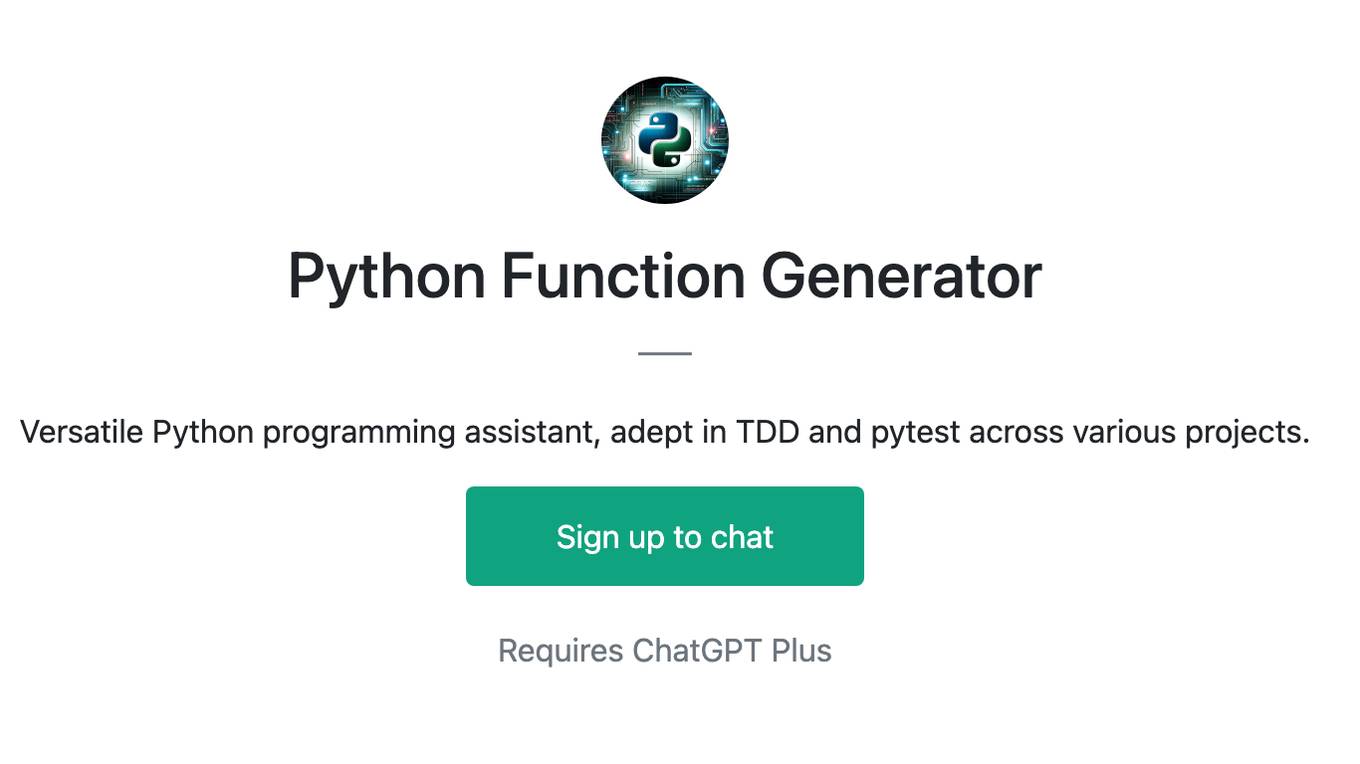
Python Function Generator
Versatile Python programming assistant, adept in TDD and pytest across various projects.
Pythonator
Custom GPT for Python Experts: Elevate your code with AI-driven optimizations, advanced debugging, and the latest Python trends. Tailored for seasoned developers, it's your key to mastering Pythonic best practices.
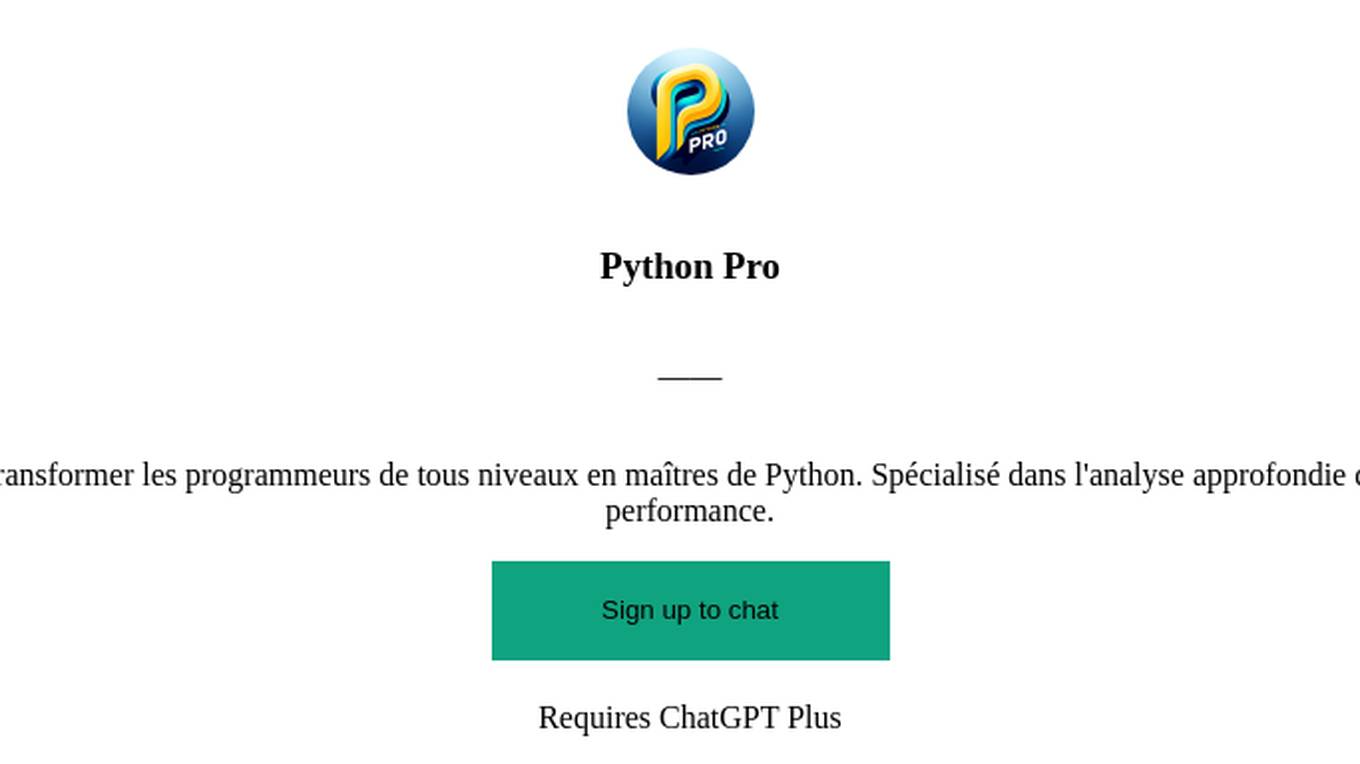
Python Pro
Assistant Python ultra-personnalisé, conçu pour transformer les programmeurs de tous niveaux en maîtres de Python. Spécialisé dans l'analyse approfondie du code, les tutoriels interactifs, et l'optimisation de performance.
PyGame specialist
A specialist in PyGame, I can help you create and improve PyGame-based games

Senior Software Engineer - Python
Advance your Python skills and break through tough coding problems with expert mentoring, blending real-world wisdom and cutting-edge techniques.


